
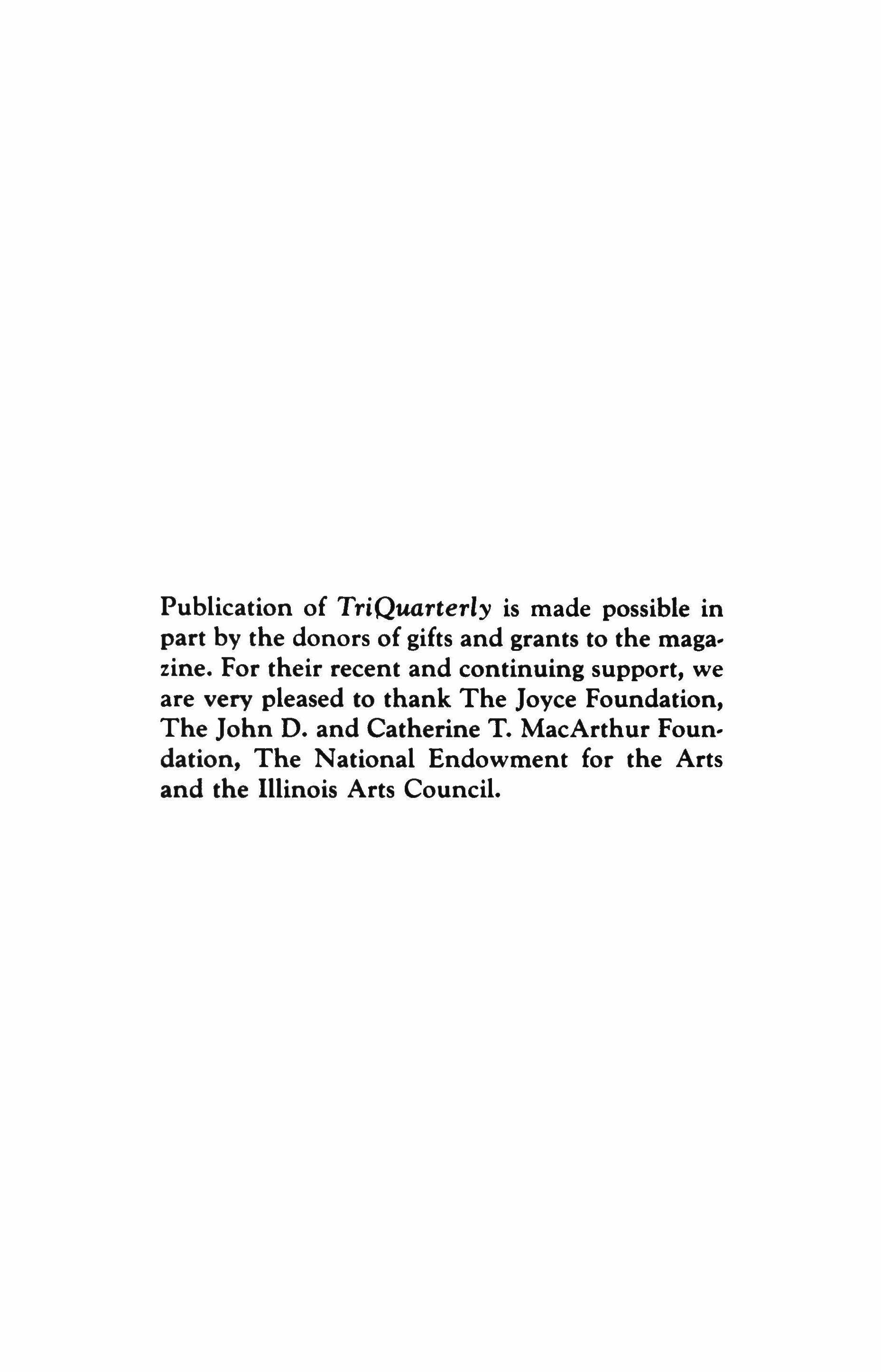
Publication of TriQuarterly is made possible in part by the donors of gifts and grants to the maga zine. For their recent and continuing support, we are very pleased to thank The Joyce Foundation, The John D. and Catherine T. MacArthur Foun dation, The National Endowment for the Arts and the Illinois Arts Council.


Associate Editor Susan Hahn

Editor
Reginald Gibbons
Managing Editor Janet Vander Kelen
Special Projects Editor Fred Shafer
Assistant to the Editor
Janet E. Geovanis
Editorial Assistants
Executive Editor Bob Perlongo
Design Director Gini Kondziolka
TriQuarterly Fellow Cynthia M. Gould
Catherine Ferreira, W. Douglas Fitzsimmons, Amy Rosenzweig, Jo Anne Ruvoli
Advisory Editors
Robert Alter, Michael Anania, Elliott Anderson, Gloria Emerson, Richard Ford, George Garrett, Gerald Graff, Francine du Plessix Gray, Michael S. Harper, David Hayman, Bill Henderson, Maxine Kumin, Elizabeth Pochoda, Michael Ryan
TRIQUARTERLY IS AN INTERNATIONAL JOURNAL OF WRITING, ART AND CULTURAL INQUIRY PUBLISHED IN THE FALL, WINTER AND SPRING AT NORTHWESTERN UNIVERSITY.
Subscription rates-Individuals: one year $18; two years $32; life $150. Institutions: one year $26; two years $44; life $300. Foreign subscriptions $4 per year additional. Price of single copies varies. Sample copies $4. Correspondence and subscriptions should be addressed to TriQuarterly, NORTHWESTERN UNIVERSITY, 2020 Ridge Avenue, Evanston, IL 60208. Phone: (312) 491· 3490. The editors invite submissions of fiction, poetry and literary essays, which must be received bet 'e -n October 1 and May 31; manuscripts received between June 1 and September 30 will not be read. No manuscripts will be returned unless accompanied by a stamped, self-addressed envelope. All manuscripts accepted for publication become the property of TriQuarterly, unless otherwise indicated. Copyright © 1988 by TriQuarterly. No part of this volume may be reproduced in any manner without written permission. The views expressed in this magazine are to be attributed to the writers, not the editors or sponsors. Printed in the United States of America by ThomsonShore, typeset by Sans Serif.
National distributor to retail trade: B. Deboer, 113 East Centre Street-Rear, Nutley, NJ 07110 (201·667·9300). Distributor for West Coast trade: Bookpeople, 2929 Fifth Street, Berkeley, CA 94710 (415·549·3030). Midwest: Bookslinger, 213 East Fourth Street, St. Paul, MN 55101 (612·221·0429); and Ingram Periodicals, 347 Reedwood Drive, Nashville, TN 37217 (615·793·5000).
Reprints of issues # 1-15 of TriQuarterly are available in full format from Kraus Reprint Company, Route 100, Millwood, NY 10546, and all issues in microfilm from University Microfilms International, 300 North Zeeb Road, Ann Arbor, MI 48106. ISSN: 0041·3097.
•
Winter 1988
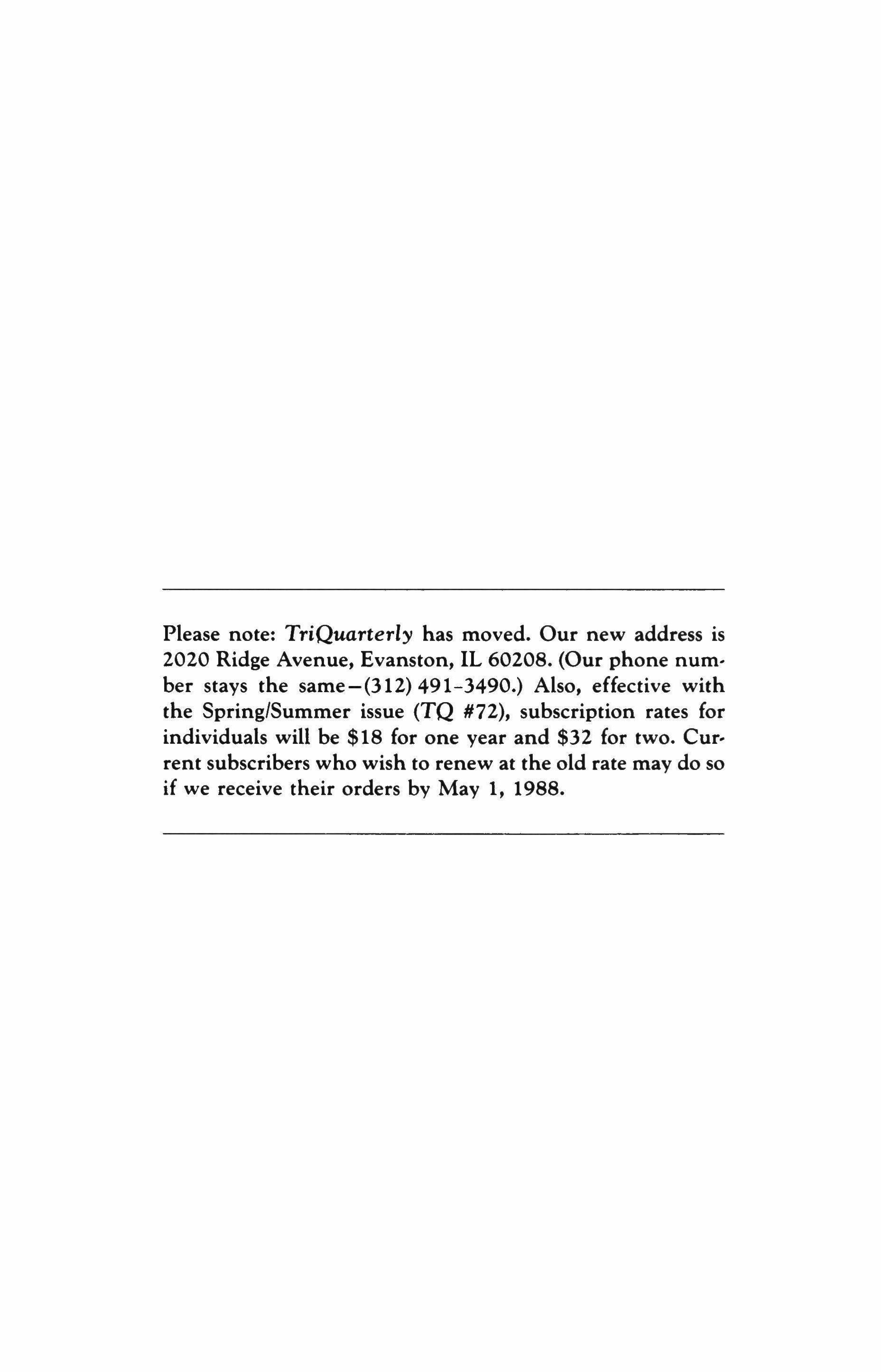
Please note: TriQuarterly has moved. Our new address is 2020 Ridge Avenue, Evanston, IL 60208. (Our phone number stays the same-(312) 491-3490.) Also, effective with the Spring/Summer issue (TQ #72), subscription rates for individuals will be $18 for one year and $32 for two. Current subscribers who wish to renew at the old rate may do so if we receive their orders by May 1, 1988.

Contents FICTION Broder's Loves Sidney Sulkin 7 On Day X 24 Marie Luise Kaschnitz (with Translator's Afterword by Katie Trumpener) Buddah 33 Susan Straight Something Big Robert S. Nelsen 46 Frog Acts 53 Stephen Dixon The Curate: A Chapter from a Novel-in-Progress 65 Timothy Dekin Foreigner 83 Susan Kerslake Forty-Hour Devotion Mark Costello 86 POETRY Billboard: Portrait of a Lady; Four Chinatown Figures 109 Garrett Kaoru Hongo Rent House; Digression on the Nuclear Age 113 Betty Adcock Poems from The Little Seafarer 118 Odysseus Elytis The Fates 127 John Haines Distance 130 Cai Qi-jiao 3

Autumn Eros Mary Kinzie 132 * * * SOME RECENT POETRY FROM POLAND: When Death Came; September Afternoon in the Abandoned Barracks; Alma Mater 139 Adam Zagajewski To Grazyna; After Gloria Was Done •••..••.• 143 Stanislaw Baranczak Archaeology; Hitler's First Photograph; Funeral 147 Wislawa Szymborska At the Cave; What Does the Political Scientist Know 151 Artur Mi�dzYrzecki In Your Eyes; But Of Course 153 Julia Hartwig Roommates 155 Wiktor WoroszYlski [Untitled] •.••••..••••.••••..•••..••••.. 157 Bronislaw Maj * * * Mid-Canal, Antwerp; The Storm. 159 Clair Berg Me and Hitler at the Rhine .......•.....••• 162 Bruce Guernsey The Two Doors at Either End of the Hall; Who Wakes Up? 163 Meredith Briggs Skeath Dialetical Poem #1; Capitalist Poem #25 167 Campbell McGrath Victory Celebration; Scheherazade 171 John Dickson Easter •...........•.•.......•.........• 175 Tony Hoagland 4
SPECIAL SECTION: MEREDITH STEINBACH
Two Chapters from Teiresias:

REVIEWS: Notes on Recent Books, Reginald Gibbons
A Note in Memoriam: Terrence Des Pres.
Reginald Gibbons
Cover design by Gini Kondziolka Woodcuts on cover and inside pages by Naul Ojeda
The Death of
177 The Birth of the World
It 194
Narkissos
As We Know
215
CONTRIBUTORS. 233
230
5
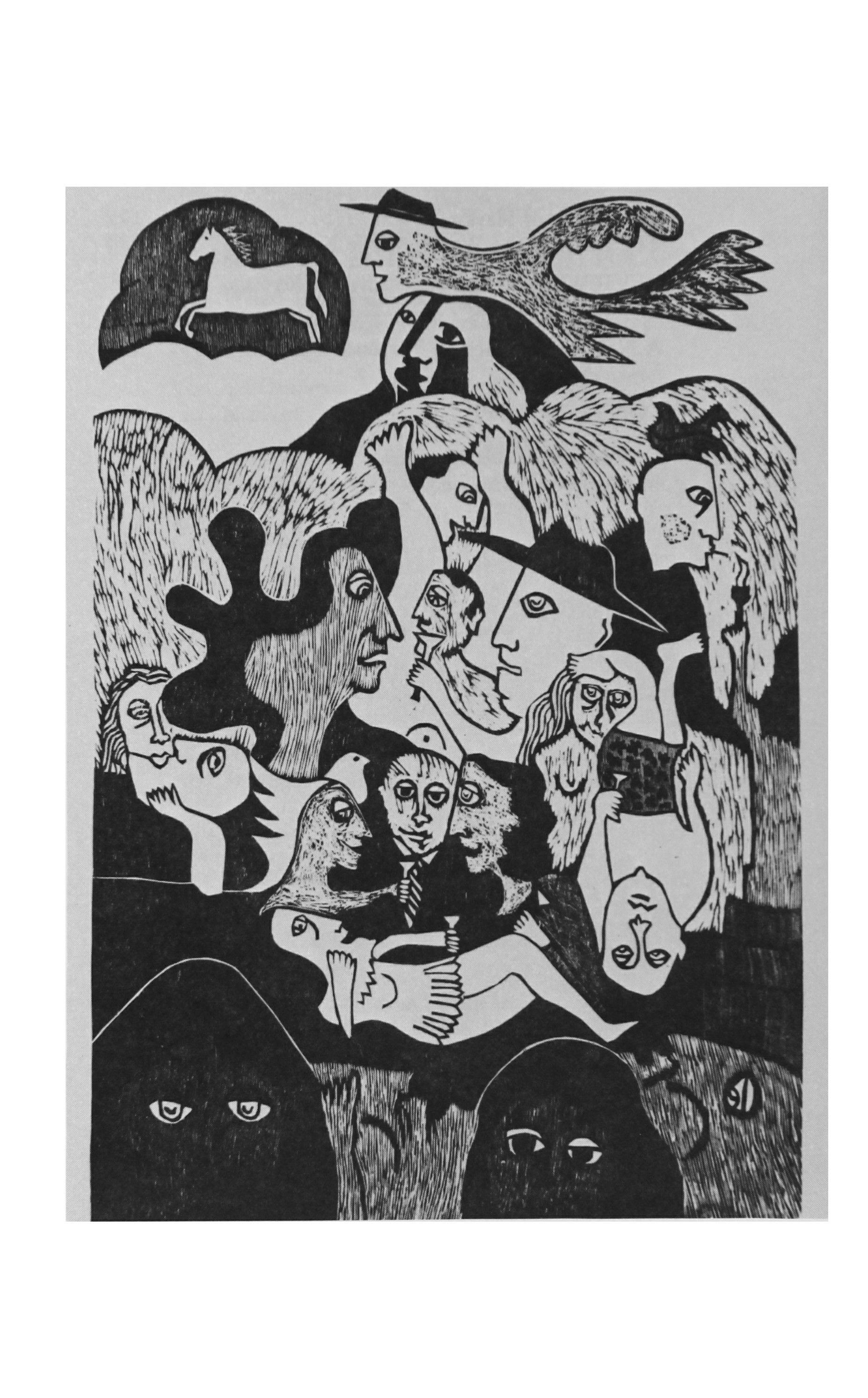
Broder's Loves
Sidney Sulkin

Muttering to himself in fake argument to avoid cracked-coconut goodmorning smiles, Milford Broder, seventy-three but dapper still, unlike the gaping carcasses all about him, propelled his chair toward the crossroads of the corridors and found the nurse he was looking for perched on the hall desk talking earnestly, somewhat heatedly, into the telephone. Her small chest, white and puffed as a dove's breast in the snug uniform, lifted and subsided. "I told you about him, Richard. Yes, I did. Well, you try." Broder pulled back and braked. Her voice, lowered, had the husky whisper of a brush on metal. "Very old. And alone. Remember? Yes, nice, very nice. And rich." A laugh, pebbles jostling, and she hung up and sat for a meditative moment on the corner of the desk swinging a white-stockinged leg.
Broder waited, a couple of systolic beats, and then rolled around to encounter her as if by chance. "Good morning." He detected an exhalation as of weariness as she turned. She was extremely young, yet often, fleetingly, appeared old, fatigued with the living still to come. Glitter entered the eyes as she recognized him and smiled. "The bed has another lump," he said. "The one in green wanted to fix it. I told her never mind."
The eyes creased at him, mocking. "You look to me like you had a fine night's sleep." She tapped his wrist - "I'll come look at it in a little while" - and tripped off, the pliant soles of her white wedge shoes sighing along the corridor.
Broder, disgusted with himself, swung in an arc and wheeled back toward his room. Milford Broder, whiner. Crude gambit out of distant schoolboyhood-"My book has a torn page," holding up the volume to lure lilac-fragrant Miss Rooney close for the sperm-stirring brush of flesh
7
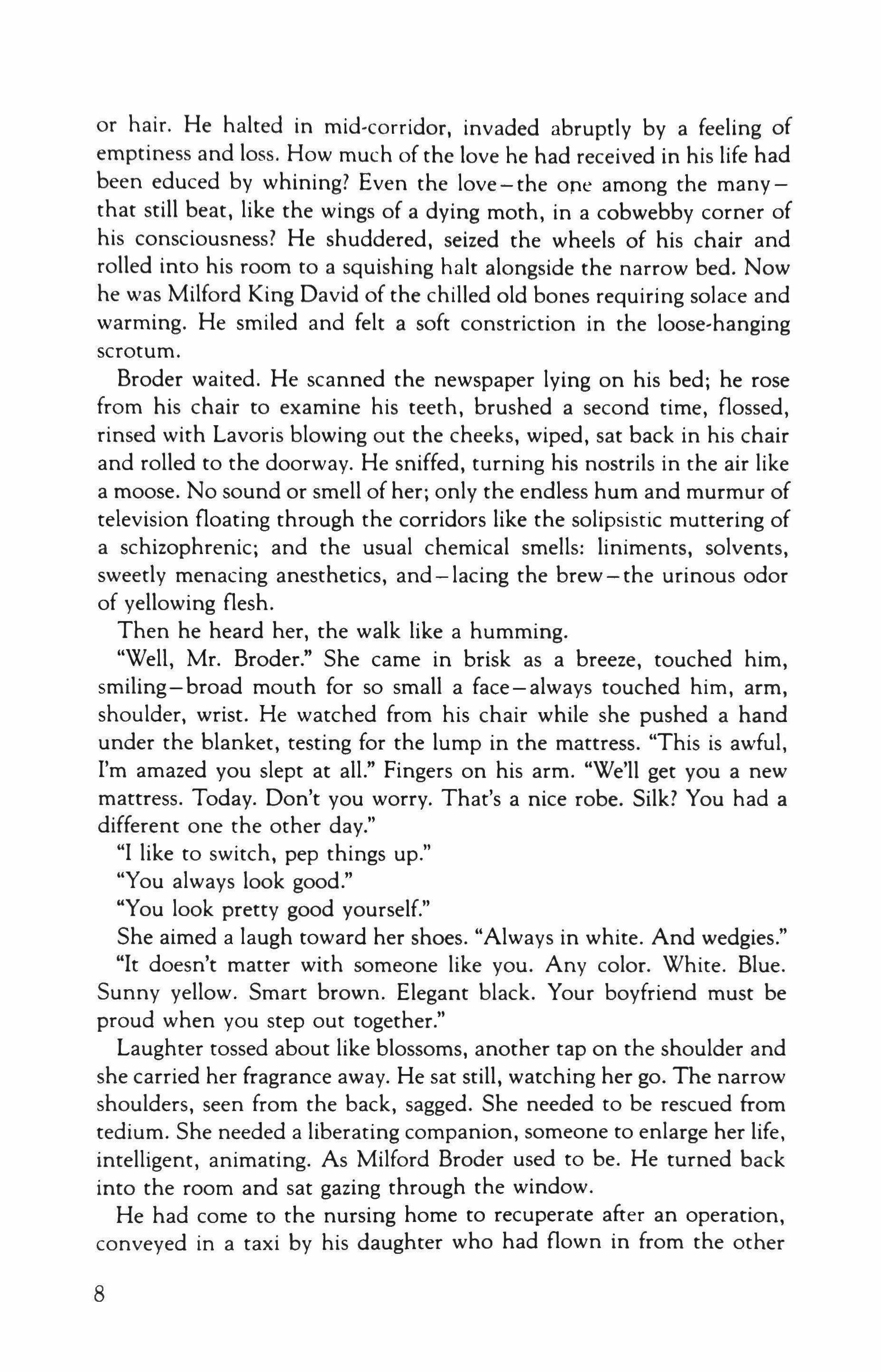
or hair. He halted in mid-corridor, invaded abruptly by a feeling of emptiness and loss. How much of the love he had received in his life had been educed by whining? Even the love-the one among the manythat still beat, like the wings of a dying moth, in a cobwebby corner of his consciousness? He shuddered, seized the wheels of his chair and rolled into his room to a squishing halt alongside the narrow bed. Now he was Milford King David of the chilled old bones requiring solace and warming. He smiled and felt a soft constriction in the loose-hanging scrotum.
Broder waited. He scanned the newspaper lying on his bed; he rose from his chair to examine his teeth, brushed a second time, flossed, rinsed with Lavoris blowing out the cheeks, wiped, sat back in his chair and rolled to the doorway. He sniffed, turning his nostrils in the air like a moose. No sound or smell of her; only the endless hum and murmur of television floating through the corridors like the solipsistic muttering of a schizophrenic; and the usual chemical smells: liniments, solvents, sweetly menacing anesthetics, and -lacing the brew - the urinous odor of yellowing flesh.
Then he heard her, the walk like a humming.
"Well, Mr. Broder." She came in brisk as a breeze, touched him, smiling-broad mouth for so small a face-always touched him, arm, shoulder, wrist. He watched from his chair while she pushed a hand under the blanket, testing for the lump in the mattress. "This is awful, I'm amazed you slept at all." Fingers on his arm. "We'll get you a new mattress. Today. Don't you worry. That's a nice robe. Silk? You had a different one the other day."
"I like to switch, pep things up."
"You always look good."
"You look pretty good yourself."
She aimed a laugh toward her shoes. "Always in white. And wedgies."
"It doesn't matter with someone like you. Any color. White. Blue. Sunny yellow. Smart brown. Elegant black. Your boyfriend must be proud when you step out together."
Laughter tossed about like blossoms, another tap on the shoulder and she carried her fragrance away. He sat still, watching her go. The narrow shoulders, seen from the back, sagged. She needed to be rescued from tedium. She needed a liberating companion, someone to enlarge her life, intelligent, animating. As Milford Broder used to be. He turned back into the room and sat gazing through the window.
He had come to the nursing home to recuperate after an operation, conveyed in a taxi by his daughter who had flown in from the other
8

coast to perform the minimum obligatory attendance and flown back at once to resume her frantic pursuit of tranquility. His son had telephoned from Mexico to express filial concern and explain in a voice cheerful with dissemblement that he could not possibly come at this time, perhaps later. What was he involved in down there-marijuana? opium? Perhaps he was in jail. Broder stared out at the heavy clouds racing steadily away, always away, into nothing. He had come to stay until the wound in his stomach, jagged as a coastal map, healed; soon he would return to his small apartment and settle back into the placid existence he had become used to: read, listen to his beloved Mozart, observe, ponder and molder. And now, suddenly, astonishingly, in this place, the nearly forgotten sensation of the genitals stirring. Phoenix rising from the ashes. Broder erupted a grin toward the fleeing clouds, swung his chair and headed down the corridor.
There she was shining in the hall light, floating from side to side, a white-and-yellow butterfly, pausing to touch, quip, laugh along the column of ambulators that shuffled up and down the corridors like a passeggiata of the damned. Dr. Bracken, pink lips showing moistly through his beard, stopped to joke with her; the husky laugh broke from her and her hand went to his arm. The stethoscope on his chest glittered. But it was Broder she would come to in the end: her eyes squinted down the hall toward him and she waved and he knew that it would be so. She would come and they would smile, secret with understanding, and go into his room. And then. But all things slowly.
It was some hours before she appeared; she came to inquire whether the new mattress had arrived-it had, surprisingly-and lingered to adjust the blind, shift the water pitcher, glance at the book on his tableTales of Edgar Allan Poe-straighten the blankets. He began to talk.
"I read Poe long ago. He had deep psychological understanding, a brilliant mind, perhaps a little bit cracked, maybe that's where the genius flows through." He looked at her to see if she was listening and saw the deep-set eyes, suddenly familiar, gazing at him and a tremor of recollected joy and of guilt passed through him; her gaze shifted.
She rubbed the silk piping of his robe. "Another one," she teased.
"Lovely."
"I confess. Extravagance. A weakness." Her fingers, just below his lips, moved sensuously on the blue silk. "I'll tell you a secret. Every time I spend five hundred dollars on myself I send twenty-five dollars to the Children's Hospital or the Old Folks' Home or the Society Against Torture in a Civilized World. Not fifty dollars, I admit, twenty-five. Still. Appeasement of the conscience, the soul, whatever it is that sits deep
9
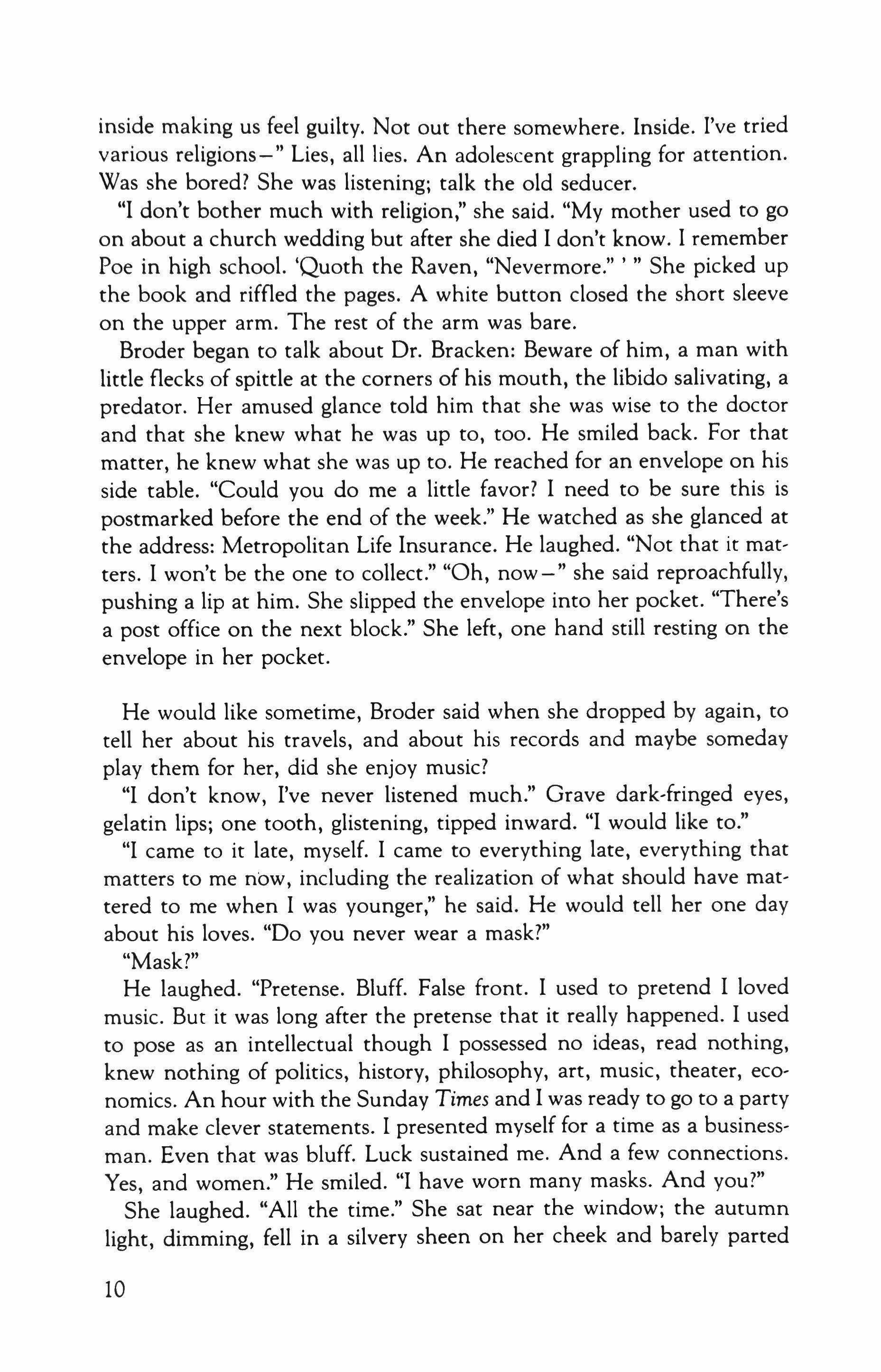
inside making us feel guilty. Not out there somewhere. Inside. I've tried various religions -" Lies, all lies. An adolescent grappling for attention. Was she bored? She was listening; talk the old seducer.
"I don't bother much with religion," she said. "My mother used to go on about a church wedding but after she died I don't know. I remember Poe in high school. 'Quoth the Raven, "Nevermore." She picked up the book and riffled the pages. A white button closed the short sleeve on the upper arm. The rest of the arm was bare.
Broder began to talk about Dr. Bracken: Beware of him, a man with little flecks of spittle at the corners of his mouth, the libido salivating, a predator. Her amused glance told him that she was wise to the doctor and that she knew what he was up to, too. He smiled back. For that matter, he knew what she was up to. He reached for an envelope on his side table. "Could you do me a little favor? I need to be sure this is postmarked before the end of the week." He watched as she glanced at the address: Metropolitan Life Insurance. He laughed. "Not that it matters. I won't be the one to collect." "Oh, now-" she said reproachfully, pushing a lip at him. She slipped the envelope into her pocket. "There's a post office on the next block." She left, one hand still resting on the envelope in her pocket.
He would like sometime, Broder said when she dropped by again, to tell her about his travels, and about his records and maybe someday play them for her, did she enjoy music?
"I don't know, I've never listened much." Grave dark-fringed eyes, gelatin lips; one tooth, glistening, tipped inward. "I would like to."
"I came to it late, myself. I came to everything late, everything that matters to me now, including the realization of what should have mattered to me when I was younger," he said. He would tell her one day about his loves. "Do you never wear a mask?"
"Mask?"
He laughed. "Pretense. Bluff. False front. I used to pretend I loved music. But it was long after the pretense that it really happened. I used to pose as an intellectual though I possessed no ideas, read nothing, knew nothing of politics, history, philosophy, art, music, theater, economics. An hour with the Sunday Times and I was ready to go to a party and make clever statements. I presented myself for a time as a businessman. Even that was bluff. Luck sustained me. And a few connections. Yes, and women." He smiled. "I have worn many masks. And you?"
She laughed. "All the time." She sat near the window; the autumn light, dimming, fell in a silvery sheen on her cheek and barely parted
10

lips-a figure, contemplative, contented, in one of the lovely Dutch pictures that he had come to enjoy; he had melted the weariness from her.
She dropped in at every possible moment, it appeared, and he found himself talking without stop; and pretty soon she was talking, too; and it seemed to him that he was in a continuous state of excitation. She would like to read, she said, if only she had the time, and to do things like go to museums, perhaps. But she was always exhausted, she confided, laughing. "My boyfriend is-you know-very demanding." She eyed him. "Does it shock you?" Broder wet his lips. Would it shock her, he asked, to hear that even in his day they did such things? In fact, he plunged, he had celebrated the noble conjunction with all his wives before marriage, and indeed with many another without marriage, loved and unloved. "It begins early, much earlier than we like to admit, and never stops even in old age. You may not believe it but it's true. Stokowski. Picasso. Justice Douglas. Casals. King David." She smiled. "I believe it."
She was small, small-boned but full-fleshed, with light amber hair, thick, cut short and worn airily loose; the mouth broad and sensual; the eyes, under strong brows, deep-set and close to the nose-bridge, brown, flecked with sunlight; the skin sun-warmed. He had guessed, perhaps because of her name- Wennerman, Lissa Wennerman-that she was out of Netherlander forebears, perhaps she had said something. When she was nearby he saw her precisely; no detail, it seemed to him, escaped his absorption of her; the slope of the narrow shoulders (the fatigue, he came to believe, was partly bad posture; perhaps in time he would be able to clasp the upper arms affectionately-resilient flesh through the soft dress, the bird-like bones within - and show her before a mirror what bearing, as if a vase were being carried on the head, could accomplish); the one eyelid slightly lower than the other; the moist, nearly pouting underlip; the rhythmic movement of the narrow hips, the small buttocks. When she was not present he sketched her to himself as if she were an amalgam of recollected images bringing back bits and pieces of all his other women now refocused in fading light: the pointed chin of one, the mobile eyebrows of another-one a perfect tulip, straight, firm, polished; another the wounded swallow, defeated, weary, tempting the hawk. And Carla. Broder contemplated the water glass, the vials of pills, on his nightstand. Deep-eyed Carla, most loved and most lost as if she had floated in and out of his life on a breeze or a fantasy.
11
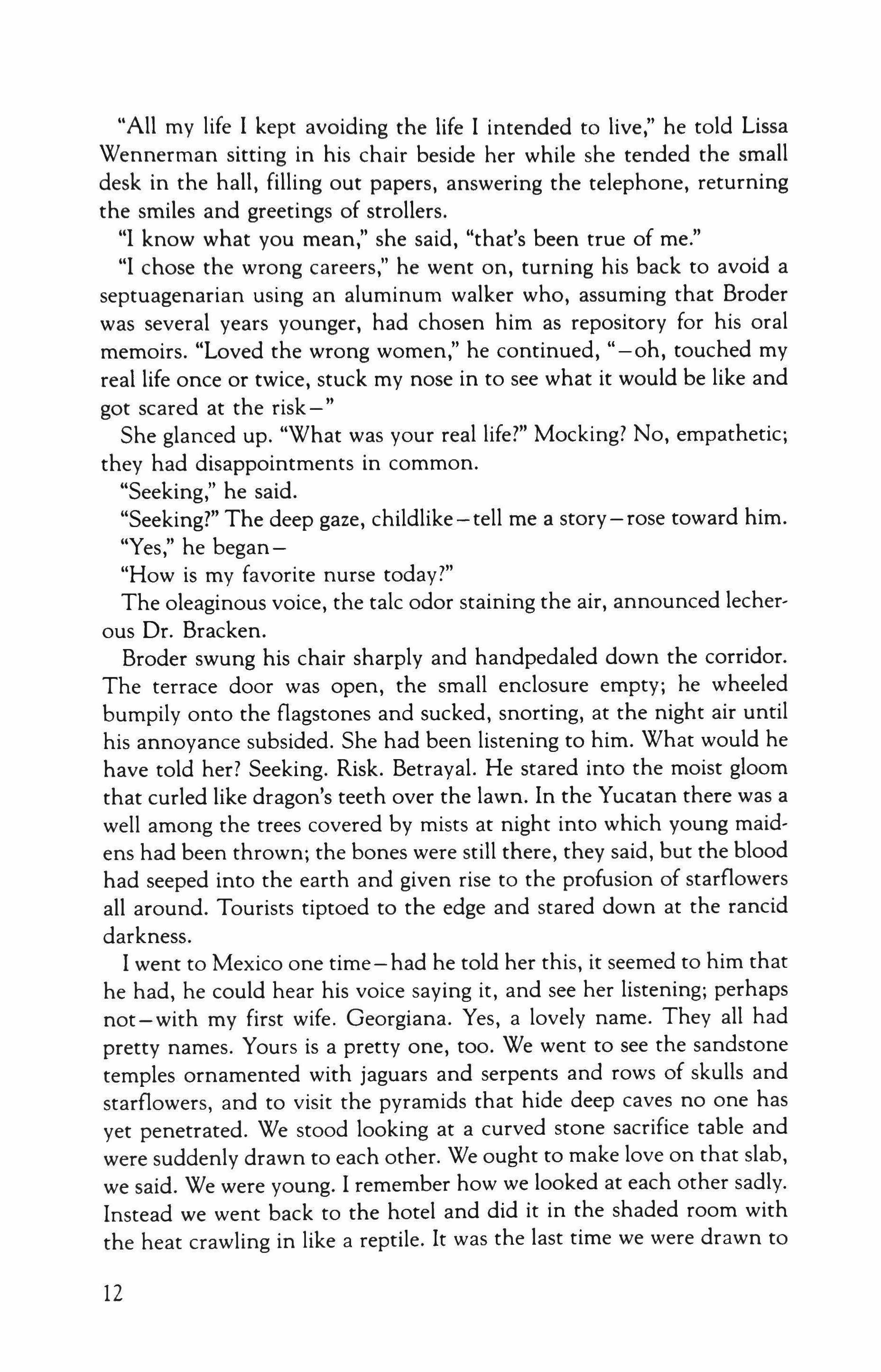
"All my life I kept avoiding the life I intended to live," he told Lissa Wennerman sitting in his chair beside her while she tended the small desk in the hall, filling out papers, answering the telephone, returning the smiles and greetings of strollers.
"I know what you mean," she said, "that's been true of me."
"I chose the wrong careers," he went on, turning his back to avoid a septuagenarian using an aluminum walker who, assuming that Broder was several years younger, had chosen him as repository for his oral memoirs. "Loved the wrong women," he continued, "-oh, touched my real life once or twice, stuck my nose in to see what it would be like and got scared at the risk -"
She glanced up. "What was your real life?" Mocking? No, empathetic; they had disappointments in common.
"Seeking," he said.
"Seeking?" The deep gaze, childlike - tell me a story - rose toward him.
"Yes," he began-
"How is my favorite nurse today?"
The oleaginous voice, the talc odor staining the air, announced lecherous Dr. Bracken.
Broder swung his chair sharply and handpedaled down the corridor. The terrace door was open, the small enclosure empty; he wheeled bumpily onto the flagstones and sucked, snorting, at the night air until his annoyance subsided. She had been listening to him. What would he have told her? Seeking. Risk. Betrayal. He stared into the moist gloom that curled like dragon's teeth over the lawn. In the Yucatan there was a well among the trees covered by mists at night into which young maidens had been thrown; the bones were still there, they said, but the blood had seeped into the earth and given rise to the profusion of starflowers all around. Tourists tiptoed to the edge and stared down at the rancid darkness.
I went to Mexico one time- had he told her this, it seemed to him that he had, he could hear his voice saying it, and see her listening; perhaps not-with my first wife. Georgiana. Yes, a lovely name. They all had pretty names. Yours is a pretty one, too. We went to see the sandstone temples ornamented with jaguars and serpents and rows of skulls and starflowers, and to visit the pyramids that hide deep caves no one has yet penetrated. We stood looking at a curved stone sacrifice table and were suddenly drawn to each other. We ought to make love on that slab, we said. We were young. I remember how we looked at each other sadly. Instead we went back to the hotel and did it in the shaded room with the heat crawling in like a reptile. It was the last time we were drawn to
12
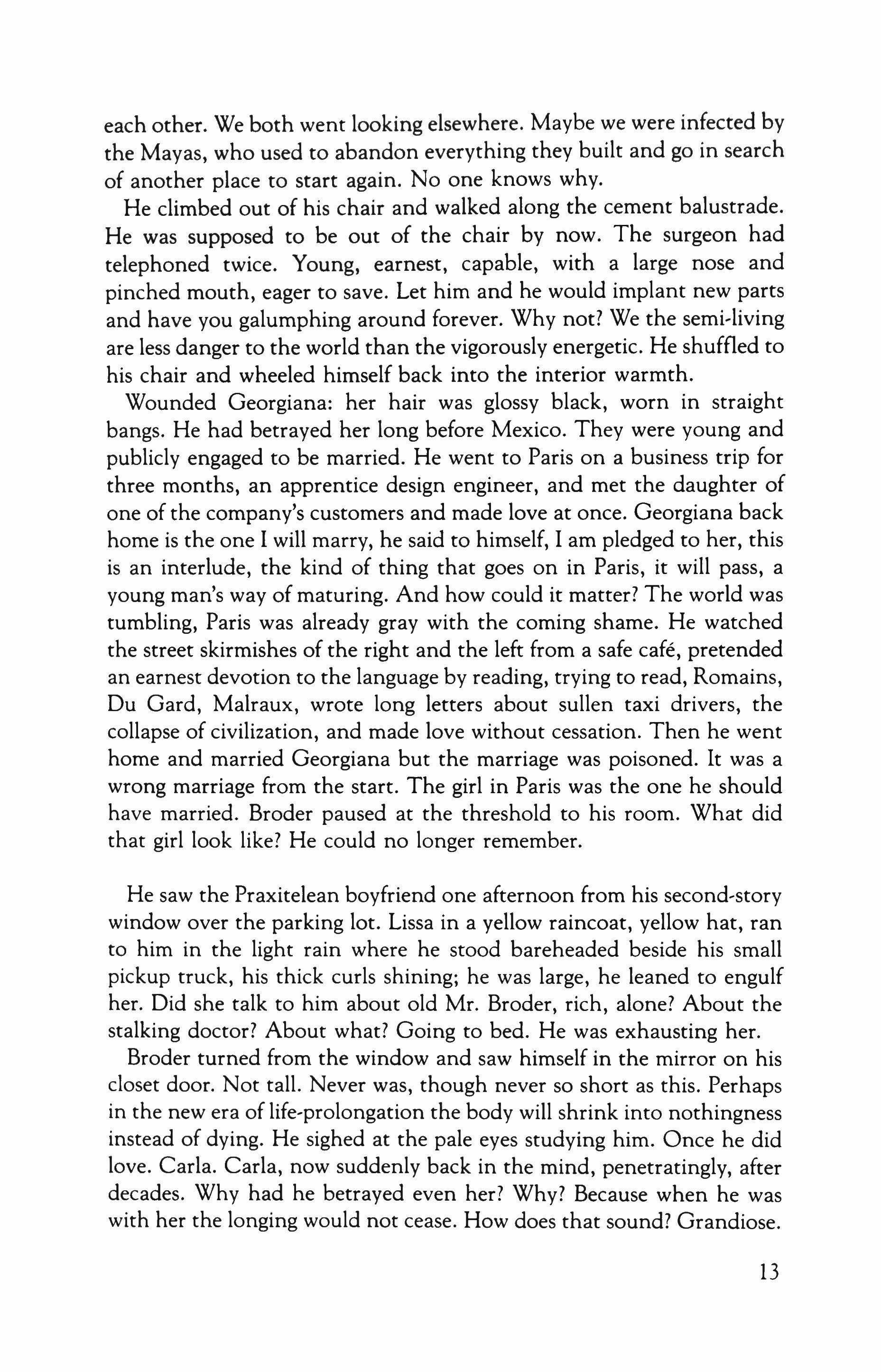
each other. We both went looking elsewhere. Maybe we were infected by the Mayas, who used to abandon everything they built and go in search of another place to start again. No one knows why.
He climbed out of his chair and walked along the cement balustrade. He was supposed to be out of the chair by now. The surgeon had telephoned twice. Young, earnest, capable, with a large nose and pinched mouth, eager to save. Let him and he would implant new parts and have you galumphing around forever. Why not? We the semi-living are less danger to the world than the vigorously energetic. He shuffled to his chair and wheeled himself back into the interior warmth.
Wounded Georgiana: her hair was glossy black, worn in straight bangs. He had betrayed her long before Mexico. They were young and publicly engaged to be married. He went to Paris on a business trip for three months, an apprentice design engineer, and met the daughter of one of the company's customers and made love at once. Georgiana back home is the one I will marry, he said to himself, I am pledged to her, this is an interlude, the kind of thing that goes on in Paris, it will pass, a young man's way of maturing. And how could it matter? The world was tumbling, Paris was already gray with the coming shame. He watched the street skirmishes of the right and the left from a safe cafe, pretended an earnest devotion to the language by reading, trying to read, Romains, Du Gard, Malraux, wrote long letters about sullen taxi drivers, the collapse of civilization, and made love without cessation. Then he went home and married Georgiana but the marriage was poisoned. It was a wrong marriage from the start. The girl in Paris was the one he should have married. Broder paused at the threshold to his room. What did that girl look like? He could no longer remember.
He saw the Praxitelean boyfriend one afternoon from his second-story window over the parking lot. Lissa in a yellow raincoat, yellow hat, ran to him in the light rain where he stood bareheaded beside his small pickup truck, his thick curls shining; he was large, he leaned to engulf her. Did she talk to him about old Mr. Broder, rich, alone? About the stalking doctor? About what? Going to bed. He was exhausting her. Broder turned from the window and saw himself in the mirror on his closet door. Not tall. Never was, though never so short as this. Perhaps in the new era of life-prolongation the body will shrink into nothingness instead of dying. He sighed at the pale eyes studying him. Once he did love. Carla. Carla, now suddenly back in the mind, penetratingly, after decades. Why had he betrayed even her? Why? Because when he was with her the longing would not cease. How does that sound? Grandiose.
13

But it's true. Do you know the poem Ich weiss niche was soil es bedeuten das ich so ttaurig bin -I don't know what has come over me that makes me so melancholy? When I was in high school we used to recite it to each other. The vision of the siren combing her golden hair, drawing men toward her. Even when I was with Carla-and she had golden hair, like yours, lighter, with a little red in it, yours has some too-even then I felt that melancholy. Perhaps it was because she possessed something she would not surrender. Would it be different today, with young people able to release themselves to each other without inhibition or taboo? But what was taboo between Carla and him except duplicity?
Broder, gazing disapprovingly at himself in the mirror, pushed his narrow shoulders back, hollow chest out. The cranium was large for the frail body; a noble head, Roman: strong cheekbones and jaw, high temples made higher by the bald skull, pinkish but blotched; small ears; small fish-like mouth, too small for the head - the weakness showed there, the unreliability, and showed in the gray eyes, once clear and lively, now vacant like the eyes of one of those seated old men on a Roman gravestone. The hair had been luxuriant and was now almost gone except for the feathery gray collar at the back and above the ears. Nothing prepossessing here. And yet he had been attractive to women once, a slim blondish young man, always young-looking even with the moustache that he wore for some years, straw-colored and thick. Women saw promise in me; I made promises to them. Now the faces came crowding back, all of them, like old letters floating down on him out of a forgotten closet.
What I told you about Carla is a lie. I was faithless to her not because of Heine's poem but because there is a beast in us, men and women, that betrays. Yes, we long for and need and love each other; and we lie to and betray each other. And we do worse, much much worse. Don't we? Why do I say we? I. I.
"I don't see anybody visiting you," Lissa said. "Don't you have anyone?"
He took her gaze: the eyes were innocent.
"No one I care about."
"I'm sorry."
"No, it's all right. They've written me off, and I've written them off." Broder looked down at his small fingers. "I'm an independent man. Comfortably situated. And without encumbrances. It's a good way to be." He shrugged. "Pretty soon I'll go back to my apartment and resume a
14

pleasant enough life. A bit lonely, I admit -" He smiled at her. "After all, most of my life I have had the company of pretty women."
"I don't think you ever stay lonely very long. You're too interesting."
"Well, thank you. I'll return the compliment. You are too pretty and gentle not to have many suitors. I hope you have picked one who will be good to you. You deserve it."
"This has been a flattery contest," she laughed.
"I am serious," he said. "I know what life can be."
I see all my life in you, he went on, thought he did, or was it another day? I see all I have loved and been loved by and all I have ruined, and the latter far outweighs the former. It happened often that he spoke and realized afterwards that it had been only to himself while she was talking about something else, or that he had been speaking to the clouds from the terrace or to the television screen while it maundered on about football and denture cleansers or simpered that the next question would bring the jackpot if the contestant could say-listen carefully- What comes after here? Giggle. The answer is after. Hereafter, get it? Screaming laughter, dollars spilling. And now, he thought, the question is where. Where is hereafter? In the grave. Yes, in the grave to which the animals carry the corpse of the hunter while gypsies play the heart-riven composer's sad sardonic tunes.
Did the composer break his own heart? I did mine. Broder looked out at a stone sky.
We met, Carla and I, and immediately others began pairing us. We belonged together. We became one of those couples in the movies running in the fields, splashing through water-though I think we were too old for that kind of bubbling. She was serious, and at the same time exuberant; she used to gaze at me for long moments as if in disbelief of her happiness, and then burst into talk and laughter. We loved, had sex. And immediately-why?-I began to look around restlessly; held her hand, kissed her and began thinking of I don't know what. We got married. Success began. We were both working. We went together to buy fashionable clothes, admiring each other, forcing extensions of ourselves onto each other. She was lovely: golden hair pulled straight back from the forehead and coiled; thin nose, oval face. I was trained as an industrial engineer- I won't go into all the doubts to do with that. She was a teacher in a small private school. She was pleased with her work; she loved teaching young people. It was a prosperous time. The big war, the good war, was over. We had looked at the pictures of the camps and shuddered and murmured, "My God, my God," and begun to hide the ghastly details away in some untroubled part of ourselves. I had had two
15
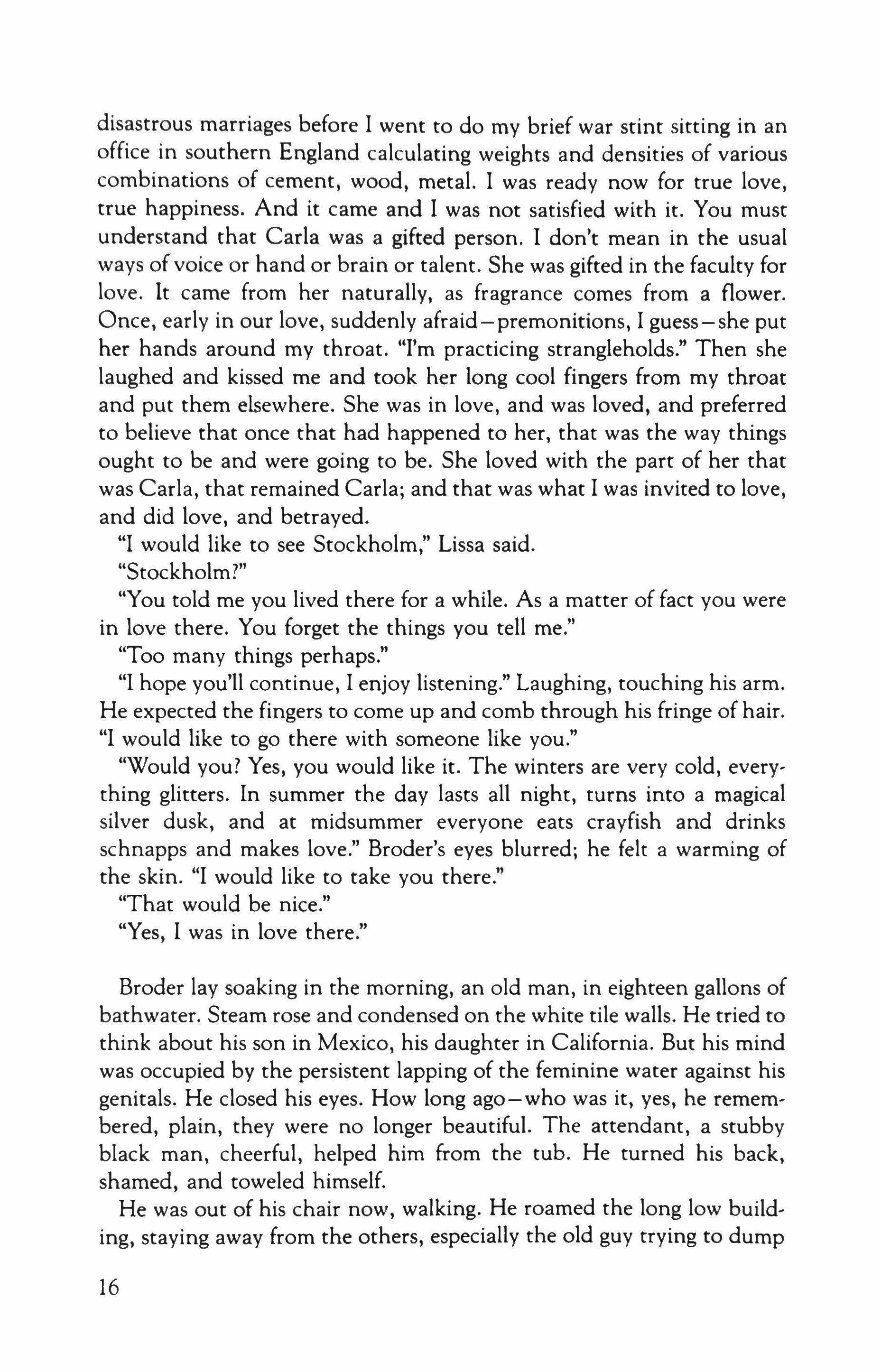
disastrous marriages before I went to do my brief war stint sitting in an office in southern England calculating weights and densities of various combinations of cement, wood, metal. I was ready now for true love, true happiness. And it came and I was not satisfied with it. You must understand that Carla was a gifted person. I don't mean in the usual ways of voice or hand or brain or talent. She was gifted in the faculty for love. It came from her naturally, as fragrance comes from a flower. Once, early in our love, suddenly afraid-premonitions, I guess-she put her hands around my throat. "I'm practicing strangleholds." Then she laughed and kissed me and took her long cool fingers from my throat and put them elsewhere. She was in love, and was loved, and preferred to believe that once that had happened to her, that was the way things ought to be and were going to be. She loved with the part of her that was Carla, that remained Carla; and that was what I was invited to love, and did love, and betrayed.
"I would like to see Stockholm," Lissa said.
"Stockholm?"
"You told me you lived there for a while. As a matter of fact you were in love there. You forget the things you tell me."
"Too many things perhaps."
"I hope you'll continue, I enjoy listening." Laughing, touching his arm. He expected the fingers to come up and comb through his fringe of hair. "I would like to go there with someone like you."
"Would you? Yes, you would like it. The winters are very cold, everything glitters. In summer the day lasts all night, turns into a magical silver dusk, and at midsummer everyone eats crayfish and drinks schnapps and makes love." Broder's eyes blurred; he felt a warming of the skin. "I would like to take you there."
"That would be nice."
"Yes, I was in love there."
Broder lay soaking in the morning, an old man, in eighteen gallons of bathwater. Steam rose and condensed on the white tile walls. He tried to think about his son in Mexico, his daughter in California. But his mind was occupied by the persistent lapping of the feminine water against his genitals. He closed his eyes. How long ago-who was it, yes, he remembered, plain, they were no longer beautiful. The attendant, a stubby black man, cheerful, helped him from the tub. He turned his back, shamed, and toweled himself.
He was out of his chair now, walking. He roamed the long low building, staying away from the others, especially the old guy trying to dump
16

his memoirs on him. There would soon be no excuse for staying. Come home with me. We will have pleasant times together. I am still vigorous, as you see, and there is something in you that responds. You are young and will still be young when I am gone. What I have will be left to you. What would she say? Blue mists curled over the lawn.
The calculating doctor was closing on her. Maybe they had already had a rendezvous. He saw them laughing down near the laundry. She was sizing him up, a better catch certainly than her curly-haired boyfriend, if he wasn't already married.
She spoke abruptly one day about her boyfriend. She hadn't cared for him at the start, he was too handsome, the body too perfect-ah, she sees that. But he was not a conceited young man, in fact he pitied himself, his good looks had isolated him and that had drawn her to him. Now she was unsure. He was weak, often changed jobs, talked very little-she smiled at that; all he seemed to know about was hunting and sex. He spent money on guns and boots. What would life be like with him? He really was not very interesting, nice as he was.
"Do you find Dr. Bracken interesting?"
"No," she laughed, "the most interesting person I know is you."
"Is that so?"
"Yes, it is. Really."
"In that case, I ought to be your boyfriend."
"All right, you are." She came toward him laughing and he lifted his face. But it was the top of his forehead that she kissed.
"1 can't stay," she said moving to the door, "they watch me, they say I spend too much time with patients. They mean you. We ought to run away to Stockholm."
He saw her again with the blond giant. They stood in the parking lot looking back toward his window. Talking about him? Plotting? And if it was a plot what would it matter? If she came to him once, just once. Who was the old king who offered his kingdom?
Broder walked in the far corners of the building, alone, shambling, feeling the pull of the wound in his belly. A heavy loneliness opened in him.
Yes, he had been in love in Stockholm. "They were doing interesting things in design in Scandinavia," he told Lissa, "and I was sent to learn about it." Had he told her everything? Carla was to come a couple of months later to join me after arranging for a leave of absence from her job. We had been married about a year, much in love, as I told you, happy. Two weeks after 1 arrived-low skies, long double ranks of firelogs lining the streets, ice floes already visible from the quais - I fell in
17
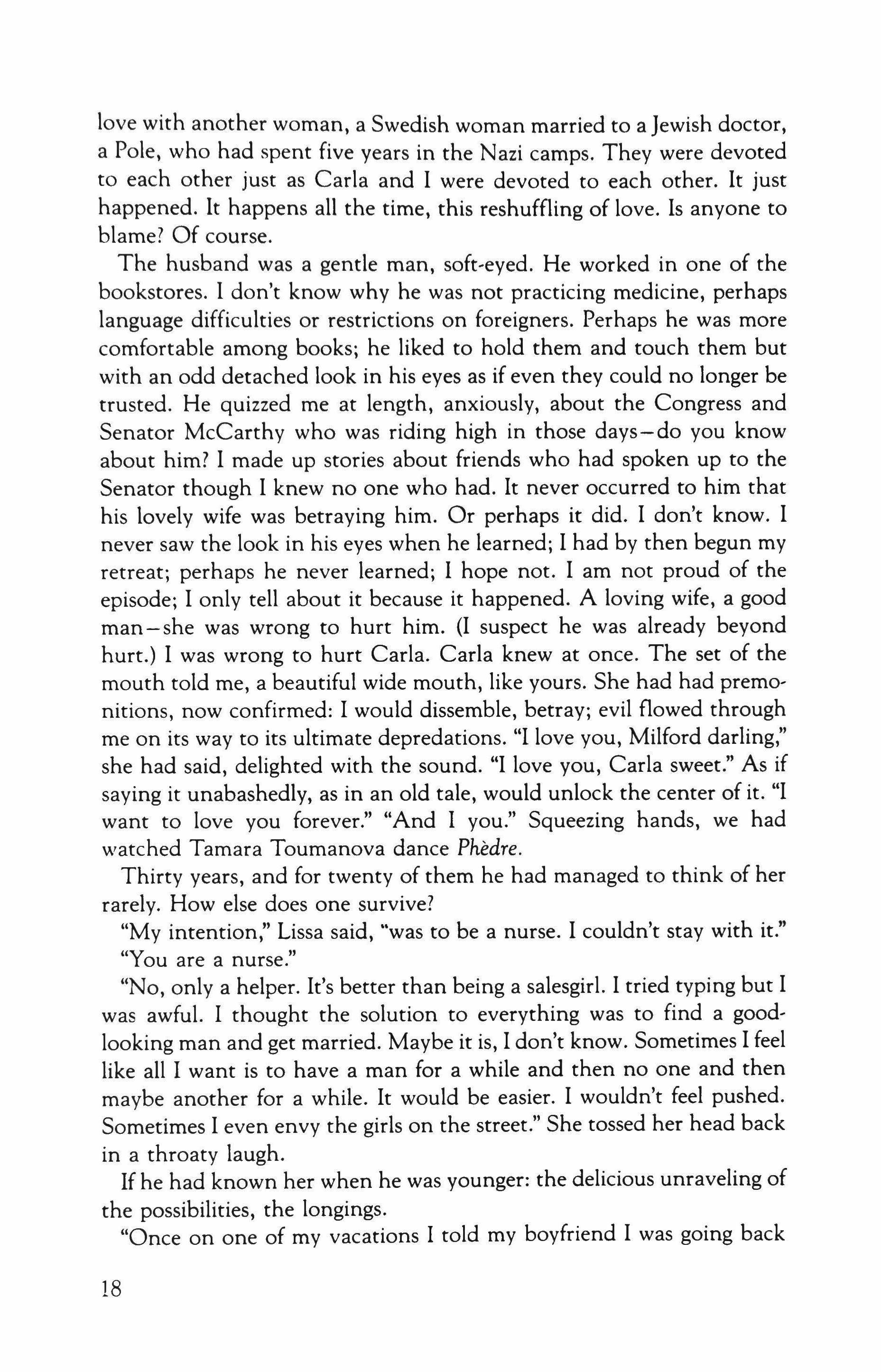
love with another woman, a Swedish woman married to a Jewish doctor, a Pole, who had spent five years in the Nazi camps. They were devoted to each other just as Carla and I were devoted to each other. It just happened. It happens all the time, this reshuffling of love. Is anyone to blame? Of course.
The husband was a gentle man, soft-eyed. He worked in one of the bookstores. I don't know why he was not practicing medicine, perhaps language difficulties or restrictions on foreigners. Perhaps he was more comfortable among books; he liked to hold them and touch them but with an odd detached look in his eyes as if even they could no longer be trusted. He quizzed me at length, anxiously, about the Congress and Senator McCarthy who was riding high in those days-do you know about him? I made up stories about friends who had spoken up to the Senator though I knew no one who had. It never occurred to him that his lovely wife was betraying him. Or perhaps it did. I don't know. I never saw the look in his eyes when he learned; I had by then begun my retreat; perhaps he never learned; I hope not. I am not proud of the episode; I only tell about it because it happened. A loving wife, a good man - she was wrong to hurt him. (I suspect he was already beyond hurt.) I was wrong to hurt Carla. Carla knew at once. The set of the mouth told me, a beautiful wide mouth, like yours. She had had premonitions, now confirmed: I would dissemble, betray; evil flowed through me on its way to its ultimate depredations. "I love you, Milford darling," she had said, delighted with the sound. "I love you, Carla sweet." As if saying it unabashedly, as in an old tale, would unlock the center of it. "I want to love you forever." "And I you." Squeezing hands, we had watched Tamara Toumanova dance Phedre.
Thirty years, and for twenty of them he had managed to think of her rarely. How else does one survive?
"My intention," Lissa said, "was to be a nurse. I couldn't stay with it."
"You are a nurse."
"No, only a helper. It's better than being a salesgirl. I tried typing but I was awful. I thought the solution to everything was to find a goodlooking man and get married. Maybe it is, I don't know. Sometimes I feel like all I want is to have a man for a while and then no one and then maybe another for a while. It would be easier. I wouldn't feel pushed. Sometimes I even envy the girls on the street." She tossed her head back in a throaty laugh.
If he had known her when he was younger: the delicious unraveling of the possibilities, the longings.
"Once on one of my vacations I told my boyfriend I was going back
18
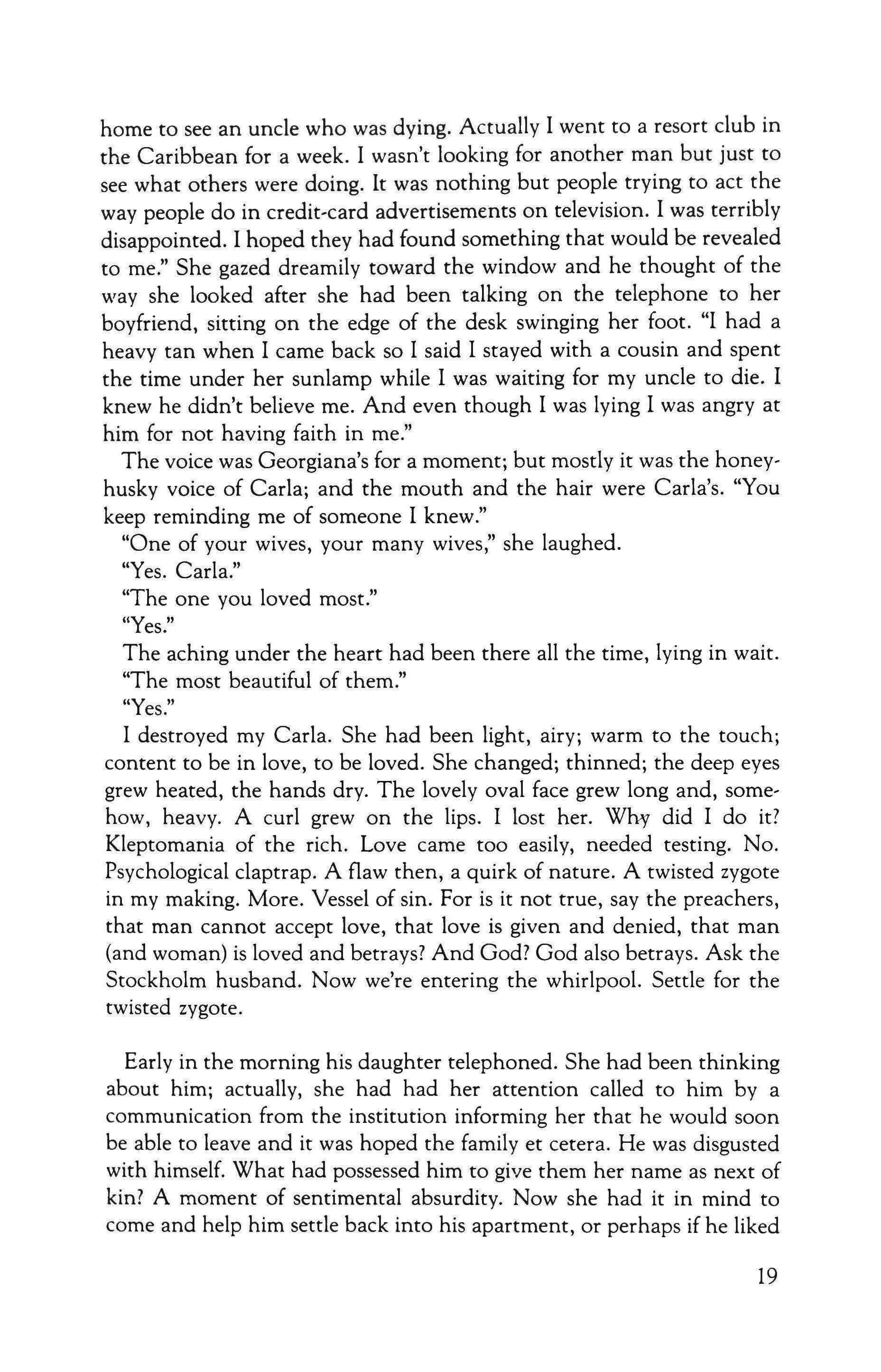
home to see an uncle who was dying. Actually I went to a resort club in the Caribbean for a week. I wasn't looking for another man but just to see what others were doing. It was nothing but people trying to act the way people do in credit-card advertisements on television. I was terribly disappointed. I hoped they had found something that would be revealed to me." She gazed dreamily toward the window and he thought of the way she looked after she had been talking on the telephone to her boyfriend, sitting on the edge of the desk swinging her foot. "I had a heavy tan when I came back so I said I stayed with a cousin and spent the time under her sunlamp while I was waiting for my uncle to die. I knew he didn't believe me. And even though I was lying I was angry at him for not having faith in me."
The voice was Georgiana's for a moment; but mostly it was the honeyhusky voice of Carla; and the mouth and the hair were Carla's. "You keep reminding me of someone I knew."
"One of your wives, your many wives," she laughed. "Yes. Carla."
"The one you loved most."
"Yes."
The aching under the heart had been there all the time, lying in wait. "The most beautiful of them."
"Yes."
I destroyed my Carla. She had been light, airy; warm to the touch; content to be in love, to be loved. She changed; thinned; the deep eyes grew heated, the hands dry. The lovely oval face grew long and, somehow, heavy. A curl grew on the lips. I lost her. Why did I do it? Kleptomania of the rich. Love came too easily, needed testing. No. Psychological claptrap. A flaw then, a quirk of nature. A twisted zygote in my making. More. Vessel of sin. For is it not true, say the preachers, that man cannot accept love, that love is given and denied, that man {and woman} is loved and betrays? And God? God also betrays. Ask the Stockholm husband. Now we're entering the whirlpool. Settle for the twisted zygote.
Early in the morning his daughter telephoned. She had been thinking about him; actually, she had had her attention called to him by a communication from the institution informing her that he would soon be able to leave and it was hoped the family et cetera. He was disgusted with himself. What had possessed him to give them her name as next of kin? A moment of sentimental absurdity. Now she had it in mind to come and help him settle back into his apartment, or perhaps if he liked
19

she could take him to California with her, it was a place devoted to giving solace to the body, not to speak of the spirit. She went on and on. She must have risen at dawn to beat the daytime rates. Perhaps she had been having an all-night session with her swami or preceptor or rnystagogue or priest, he was not sure what kind of soul-washing rituals she was engaged in these days. She had been married twice, or was it three times, it was not quite clear whether the third was ever a marriage or whether she was still with him, or, considering the fashion, was it a her?
In many ways she was not unlike her father with his multiple marriages. It was the second of his that produced her and her brother, quickly, as if the union had a desperate need to justify itself, had to atone for the catastrophe of the first marriage (Georgiana) and to accomplish something productive before it, too, collapsed. After it was loudly over, the wounded wife, Andrea, poor bleeding Andrea - beautiful, they were all beautiful, she as a Dresden figurine, same glaze, same impenetrability, except for the nursed vulnerability under the sheen-conveniently, blessedly, died. It was hard to believe that he had been to bed with her at all, let alone twice, the fired hardness of that flesh. One thing the daughter copied from the mother, the little self-congratulatory smile: La Gioconda, thought the mother; Buddha, dreamed the daughter.
The bread-soft voice on the telephone continued; the guru had certainly been stirring among the ashes last night. "You still have many years, Father," she said. Father? A new word in her mouth. Perhaps it had suddenly occurred to her that he might still have some money. "Peace and quiet and love," she said. If he made no response maybe she would run out of sentiment and that would be the end of it. He examined his fingers curled around the telephone. Absurd little fingers. He had more than once pressed them against Georgiana's mouth to silence her, in vain. Georgiana, too, used to talk feeling to death. "I am sorry for you, Milford, I wish I could forgive you, I wish I could have seen earlier what was happening." "My God," he told her, "you talk like an English novel." "That's too bad, it's my feelings I'm talking about." ''They don't exist." "You strangled them," she bleated. "Oh my God, now we're writing a play." Later, with Carla, none of the foolish things they said to each other seemed artificial.
My first wife Georgiana looked a little bit like you, he told Lissa, the very fine skin and small bones. "I could do nothing with her, we never connected. We tried traveling. It was a failure. So we quit. Then, at once, I tumbled into the second marriage, anxious, I suppose, to show I could make something work. It didn't. Having children made it worse
20

than the other. The third, to Carla, was the best but I destroyed-" no, he didn't put it like that to Lissa - "it failed, too."
After Carla he was a loose-roaming bachelor, perhaps in penance; also a hard-driving careerist, perhaps to conceal hurt: long hours, sharp deals, fast trips, conspicuous spending, exhausting and exhausted couplings. For a time, Broder became an ambitious reader: Mann, James, Wilson, Sartre. ("Am I not myself a wave of chilled air? To have neither blood, nor lymph, nor flesh. To be only part of the cold.")
Henrietta appeared; slim, proficient in bed, considerate; and still, though he was given everything he needed or ought to need, he commenced at once to look around and found someone else, and then someone else again-Gilda, Zoe, Charlotte. And Henrietta, betrayed, caring no longer, faded, a tulip in winter, and the zest was gone even out of faithlessness. And he grew old.
The telephone wire, Broder realized, had fallen silent. "I'm going to stay here," he said. "I have friends. There is no need for you to come. You can't afford it and I certainly cannot. I appreciate your offer." As a matter of fact, I have met someone who will take good care of me and for whom I, for my part, care a good deal. My body has come alive again since I first saw her; and, if I may say so, I think she too, especially her mind, but also the body, I believe, in spite ofthe great difference of ageall history, after all, all literature is replete with examples-she too has come alive since she met me. Had he said that? Would it bring the bornagain daughter running to save the old man from folly? But the line was dead. Perhaps she had concluded long ago that he had hung up and had done the same.
The boyfriend appeared twice in the lot standing beside his small blue pickup truck - "TOYOTA" emblazoned on its front and back like a football jersey-gazed up toward the building for long moments, and went away; the eyes, Broder guessed, hot with anger and longing and guilt, the male self-exiled, abandoned.
"I saw your boyfriend looking for you and leave without you. Twice."
"He'll be all right. He has his hunting. He'll be going to the woods soon. North Carolina. Ducks, I think. Someone has a hunting cabin. They drink and play cards and bring in girls."
"Have you given him up?"
"I thought it would be good to calm down for a little while and see."
"Reassessment."
"Yes."
21

"He won't want to lose you. You're a very attractive woman. But he's a handsome and virile young man. Aren't you afraid of losing him?"
Silence. "Yes, 1 am." Pause. "Maybe I will."
"And then?"
And then all possibility. She was smiling. "1 don't know. Perhaps I'll find another boyfriend. I think 1 would like a little time. Maybe I could spend an hour or two at night reading. Or listening to music." Laughing now at her own pretensions. "I'd like to leave this place."
She was standing near the window in his room. The pale, dusty rose lips. A moist expectancy in the eyes. It could happen, she wished it. She wished to be lifted into his fullness. A rippling passed over his skin; his bones, it seemed to him, were dissolving. Broder sat down.
"I leave here myself in a few days," he said.
"1 know."
"Perhaps you. I would like."
"If 1 can help."
Were they saying it? Adolescents stumbling.
"Yes. I. Yes. If you would be willing. I will pay."
"Oh no, not pay."
It was happening. Was it possible? Or was the boyfriend out there -? No, she had fallen in love with the wise old man. A few life-enhancing years. How could the mind-impoverished duck-hunter compare? Or the talc-smelling doctor with the goat eyes? A sweet exultation flowed through Broder.
She had come to stand near him, fingering his collar. "I do like this robe especially." A fragrance, as of spices, settled over him; the remembered pangs of love passed searing through him.
"Then you will come," Broder said to the beautiful woman smiling at him. He began to rise; he would, at her Yes, brush with his lips the parting of the silken hair.
Her fingers lay on his sleeve. "You'll be fine, once you've settled in, I know you will. You have lots of interests, and friends, too, I'm sure."
"You."
"I'm going home for a little while." She laughed tapping his arm. "To see an uncle."
The sky, thick as ice, came crashing through the window at him. "I thought." His throat clogged. "I have a little money." A noise like the shuffling of a thousand slippered feet crowded his ears. "Records. Books." Was she listening? Mocking? "You would like the records. And the books. There's a little restaurant. Did I tell you? Fixed up with bric a brae of Normandy. Sole a Dieppoise. Not real, not the real thing, but
22

they try. An occasional film. A concert. Insurance. Something to leave." The cave of his chest filled, he was drowning; in his abdomen, in the lower colon, a vengeful aching spread. He had been betrayed, she had been leading him on. All she had meant was kindness.
"Maybe I won't let him go to North Carolina," she said from the doorway, winking, and disappeared, leaving behind the tintinnabulation of her laugh.
He saw her with the doctor. He saw her below his window racing across the lot to the armspreading charioteer with the golden curls.
She came to bid him farewell and offered to accompany him to the taxi and to telephone him at home from time to time to see if he was comfortable but he declined.
Broder climbed the dim-lit stairwell to his tiny apartment: a sittmg room, a sleeping alcove, a sink and a couple of cooking coils, a dripping shower, a toilet with cracked seat. On one wall shelves supported by brackets held a couple of dozen books, a dozen records, a turntable, two speakers; opposite hung a photograph of Broder standing alone before the ruins at Selinunte, and over the sofa a reproduction of the Window at Collioure of Matisse, its warm oranges and pinks emitting the only color in the room.
Broder laid out his medicines alongside the sink. He examined his supply of canned soups. He boiled water and made himself a cup of instant decaffeinated coffee and sat at his own window and looked out at the gray skyless street. On her upper arm, the small white button closing the sleeve against the flesh. He smiled. He rose and put on one of his bathrobes and placed a flute quartet on the turntable and sat and listened. A haze grew in the room; and now he felt them all around him, all the lovely women he had known, like flights ofbirds gusting from the trees at dusk, brushing against him, murmuring his name, accusing and forgiving.
23
On Day X
Marie Luise Kaschnitz

You already know which day I mean. X stands for E. E as in "End," not quite the end of the world but something like it, our city gone, all the houses, schools, libraries, all the men and women and children, every' thing we've lived for. Afterwards there might be a few human beings still crawling around somewhere, but not for long, and those still to be born already destroyed in the womb.
Day X preoccupies me, I think about it. But of all my family and friends, I'm the only one to think such thoughts. I'm not allowed to talk about it either. "Oh stop it," they say right away. "It won't come to that. And if it does we'll hear about it soon enough." So since I can't say anything I have to write it down; I have to describe Day X, which of course begins like any day and passes, too, like any day, you'll see. I can't know, of course, what the weather is like that day. But suppose that the weather is good, suppose that summer is just ending, the sunflowers in bloom. We're not totally unprepared. There's an atmosphere of crisis, of political crisis, the kind we've had-especially this time of year-the kind we've had so often before.
I wake up early that day, see the clear September sky through a gap between the curtains. It's only seven. I could let my husband sleep for another half hour but because I have a distinct premonition, I don't. Instead I wake him up gently and say, "It's still early, you don't have to get up yet. But what about the children? Should they go to school today or not?"
My husband sits up in bed and rubs his eyes. "Why not?" he asks. "Why shouldn't they go to school? Are they sick? Is there some kind of epidemic? Why didn't you say something yesterday? You didn't say anything."
24

"Because," I answer, "there's no epidemic, and the children aren't sick, and because yesterday I didn't know what I know now: today is our last day, and I think we should be together."
"Our last day," my husband repeats, astonished. "What do you mean?" And then starts to laugh and says, "Don't let it get to you, it will all sort itself out. After all everyone knows it wouldn't solve anything, and that in the end there would be no winners and no losers."
"So you always say," I reply, as I sit on the edge of the bed and pull on my socks. Maybe it's true. I mean that everyone knows it and acts accordingly, but maybe it's not. This is finally it, today, it's our last day."
My husband gives me an affectionate glance and then suggests bringing the newspaper in from the mailbox, and I already know the paper won't back me up, since after all as long as "it" hasn't happened, nothing has happened, and because no newspaper in the world would ever write: you have to die, get ready.
"Well, there you go," says my husband after he's brought in the paper and read me several articles from it, about telegrams and even telephone calls between the superpowers. "They'll see a way out, they'll find it. Anyway I've already woken the children."
"But they're still not going to school," I say, "and for my sake, you'll stay home too, won't you?"
"I'm going to work of course," says my husband, who works for the railroad, "and the children are going too. What would you tell them otherwise?" And with that he plugs in his electric razor, the razor hums loudly and I know he can't understand me anymore.
Now I've finished dressing. I go into the children's room, where at this time of morning there's usually an atmosphere of gloom. The children are either still lying in bed and have to have the covers pulled off them or they're already dressed without having washed first, and they've opened their spelling books or their math books and they say, "leave us alone, we don't have time for breakfast today." The children, ten and twelve, both boys, are not very affectionate, like all at that age. I can't count on a kiss in the morning anymore. It breaks my heart that on the day I'm talking about they rush up and hug me.
"Why did you get up?" I ask breathlessly. "You don't have school to go to today."
"No schoo!?" says the oldest, "You must be out of your mind!" Those are the very words he uses, and even taps his finger on his forehead. And then it comes out that today in his class they're showing two hours of films, while in the youngest's class something else is going on, a
25
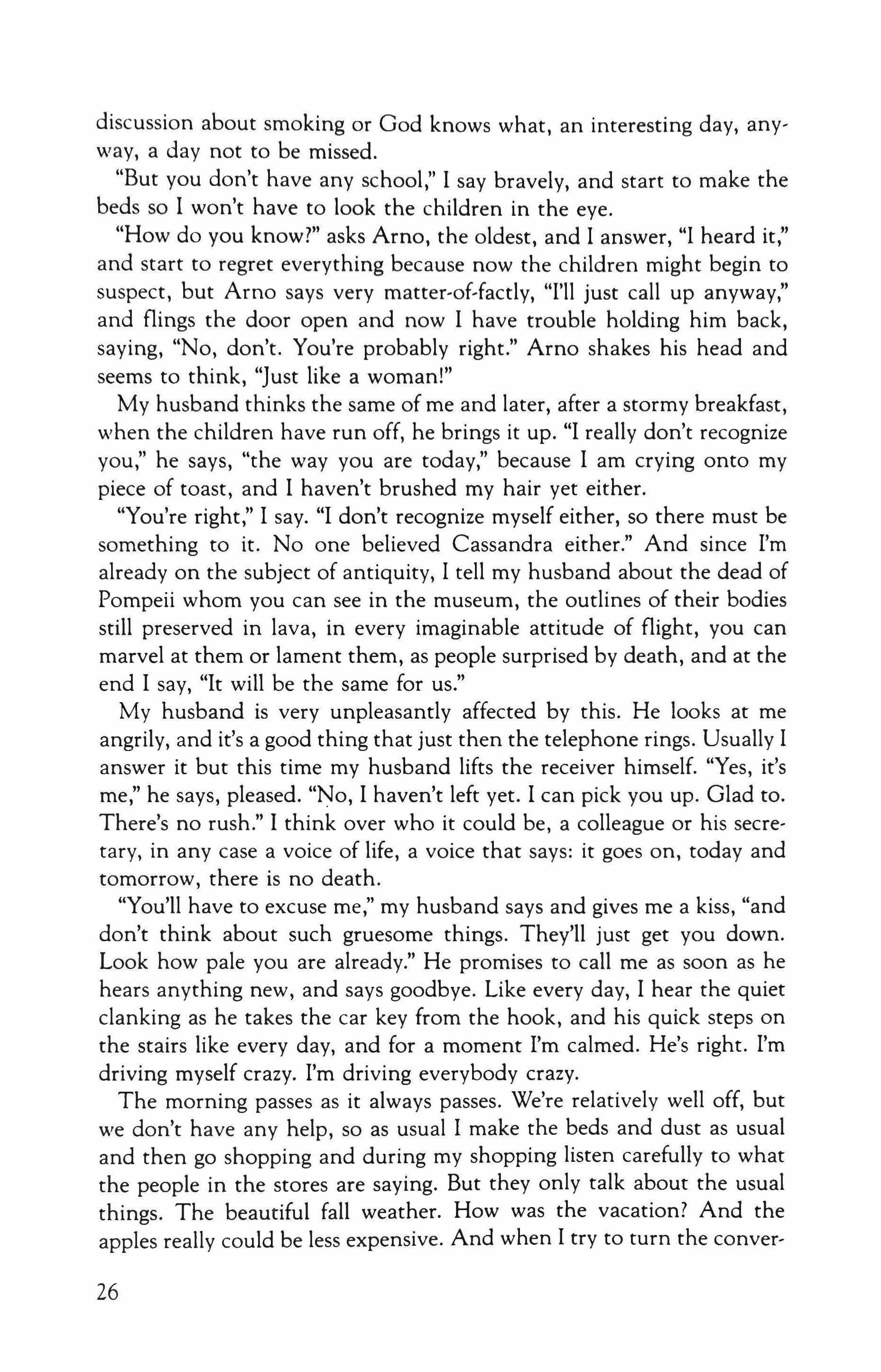
discussion about smoking or God knows what, an interesting day, anyway, a day not to be missed.
"But you don't have any school," I say bravely, and start to make the beds so I won't have to look the children in the eye.
"How do you know?" asks Arno, the oldest, and I answer, "I heard it," and start to regret everything because now the children might begin to suspect, but Arno says very rnatrer-of-factlv, "I'll just call up anyway," and flings the door open and now I have trouble holding him back, saying, "No, don't. You're probably right." Arno shakes his head and seems to think, "Just like a woman!"
My husband thinks the same of me and later, after a stormy breakfast, when the children have run off, he brings it up. "I really don't recognize you," he says, "the way you are today," because I am crying onto my piece of toast, and I haven't brushed my hair yet either.
"You're right," I say. "I don't recognize myself either, so there must be something to it. No one believed Cassandra either." And since I'm already on the subject of antiquity, I tell my husband about the dead of Pompeii whom you can see in the museum, the outlines of their bodies still preserved in lava, in every imaginable attitude of flight, you can marvel at them or lament them, as people surprised by death, and at the end I say, "It will be the same for us."
My husband is very unpleasantly affected by this. He looks at me angrily, and it's a good thing that just then the telephone rings. Usually I answer it but this time my husband lifts the receiver himself. "Yes, it's me," he says, pleased. "No, I haven't left yet. I can pick you up. Glad to. There's no rush." I think over who it could be, a colleague or his secretary, in any case a voice of life, a voice that says: it goes on, today and tomorrow, there is no death.
"You'll have to excuse me," my husband says and gives me a kiss, "and don't think about such gruesome things. They'll just get you down. Look how pale you are already." He promises to call me as soon as he hears anything new, and says goodbye. Like every day, I hear the quiet clanking as he takes the car key from the hook, and his quick steps on the stairs like every day, and for a moment I'm calmed. He's right. I'm driving myself crazy. I'm driving everybody crazy.
The morning passes as it always passes. We're relatively well off, but we don't have any help, so as usual I make the beds and dust as usual and then go shopping and during my shopping listen carefully to what the people in the stores are saying. But they only talk about the usual things. The beautiful fall weather. How was the vacation? And the apples really could be less expensive. And when I try to turn the conver-
26
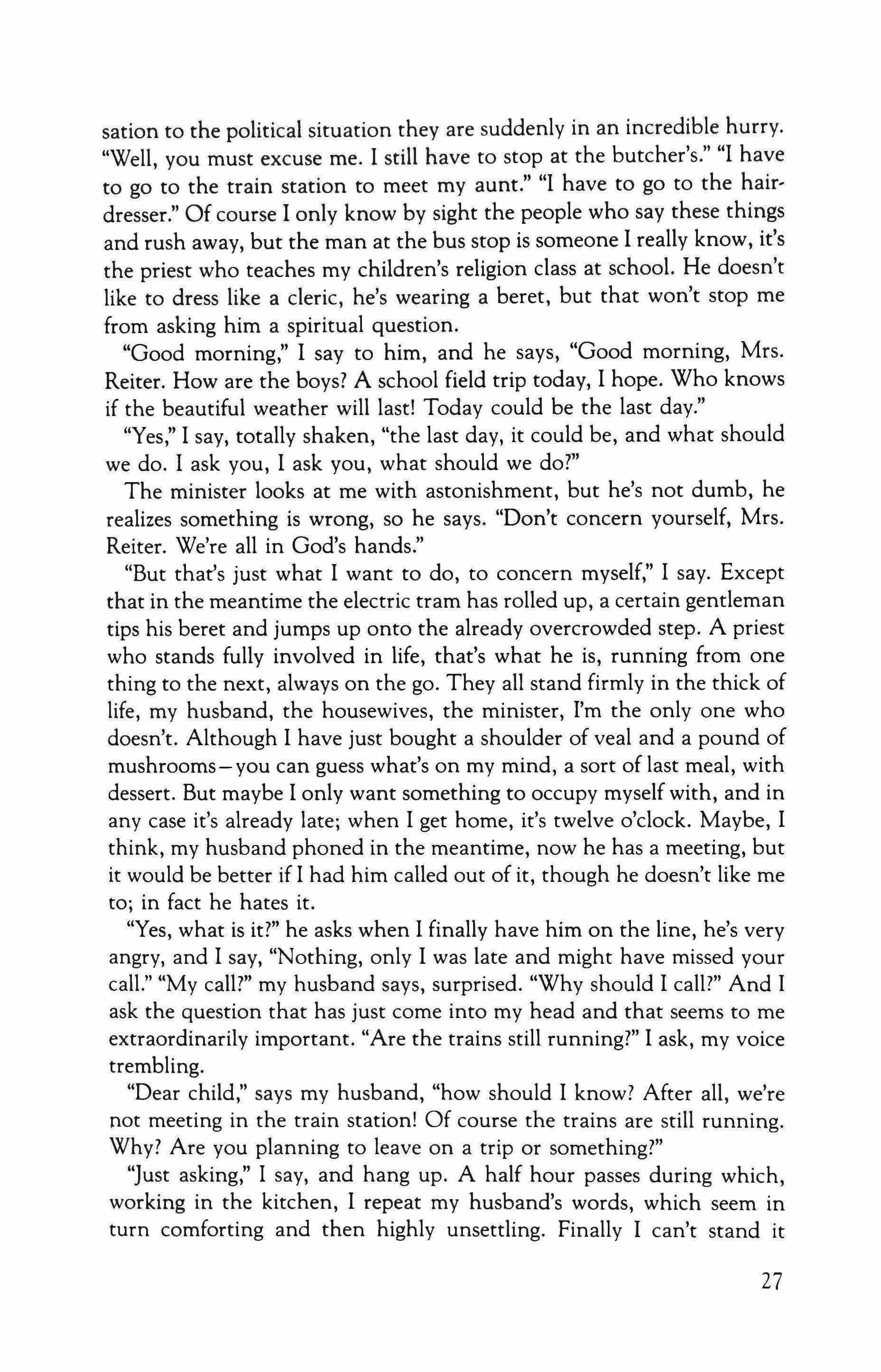
sation to the political situation they are suddenly in an incredible hurry. "Well, you must excuse me. I still have to stop at the butcher's." "I have to go to the train station to meet my aunt." "I have to go to the hairdresser." Of course I only know by sight the people who say these things and rush away, but the man at the bus stop is someone I really know, it's the priest who teaches my children's religion class at school. He doesn't like to dress like a cleric, he's wearing a beret, but that won't stop me from asking him a spiritual question.
"Good morning," I say to him, and he says, "Good morning, Mrs. Reiter. How are the boys? A school field trip today, I hope. Who knows if the beautiful weather will last! Today could be the last day."
"Yes," I say, totally shaken, "the last day, it could be, and what should we do. I ask you, I ask you, what should we do?"
The minister looks at me with astonishment, but he's not dumb, he realizes something is wrong, so he says. "Don't concern yourself, Mrs. Reiter. We're all in God's hands."
"But that's just what I want to do, to concern myself," I say. Except that in the meantime the electric tram has rolled up, a certain gentleman tips his beret and jumps up onto the already overcrowded step. A priest who stands fully involved in life, that's what he is, running from one thing to the next, always on the go. They all stand firmly in the thick of life, my husband, the housewives, the minister, I'm the only one who doesn't. Although I have just bought a shoulder of veal and a pound of mushroomsyou can guess what's on my mind, a sort of last meal, with dessert. But maybe I only want something to occupy myself with, and in any case it's already late; when I get home, it's twelve o'clock. Maybe, I think, my husband phoned in the meantime, now he has a meeting, but it would be better if I had him called out of it, though he doesn't like me tOj in fact he hates it.
"Yes, what is it?" he asks when I finally have him on the line, he's very angry, and I say, "Nothing, only I was late and might have missed your call." "My call?" my husband says, surprised. "Why should I call?" And I ask the question that has just come into my head and that seems to me extraordinarily important. "Are the trains still running?" I ask, my voice trembling.
"Dear child," says my husband, "how should I know? After all, we're not meeting in the train station! Of course the trains are still running. Why? Are you planning to leave on a trip or something?"
"Just asking," I say, and hang up. A half hour passes during which, working in the kitchen, I repeat my husband's words, which seem in turn comforting and then highly unsettling. Finally I can't stand it
27
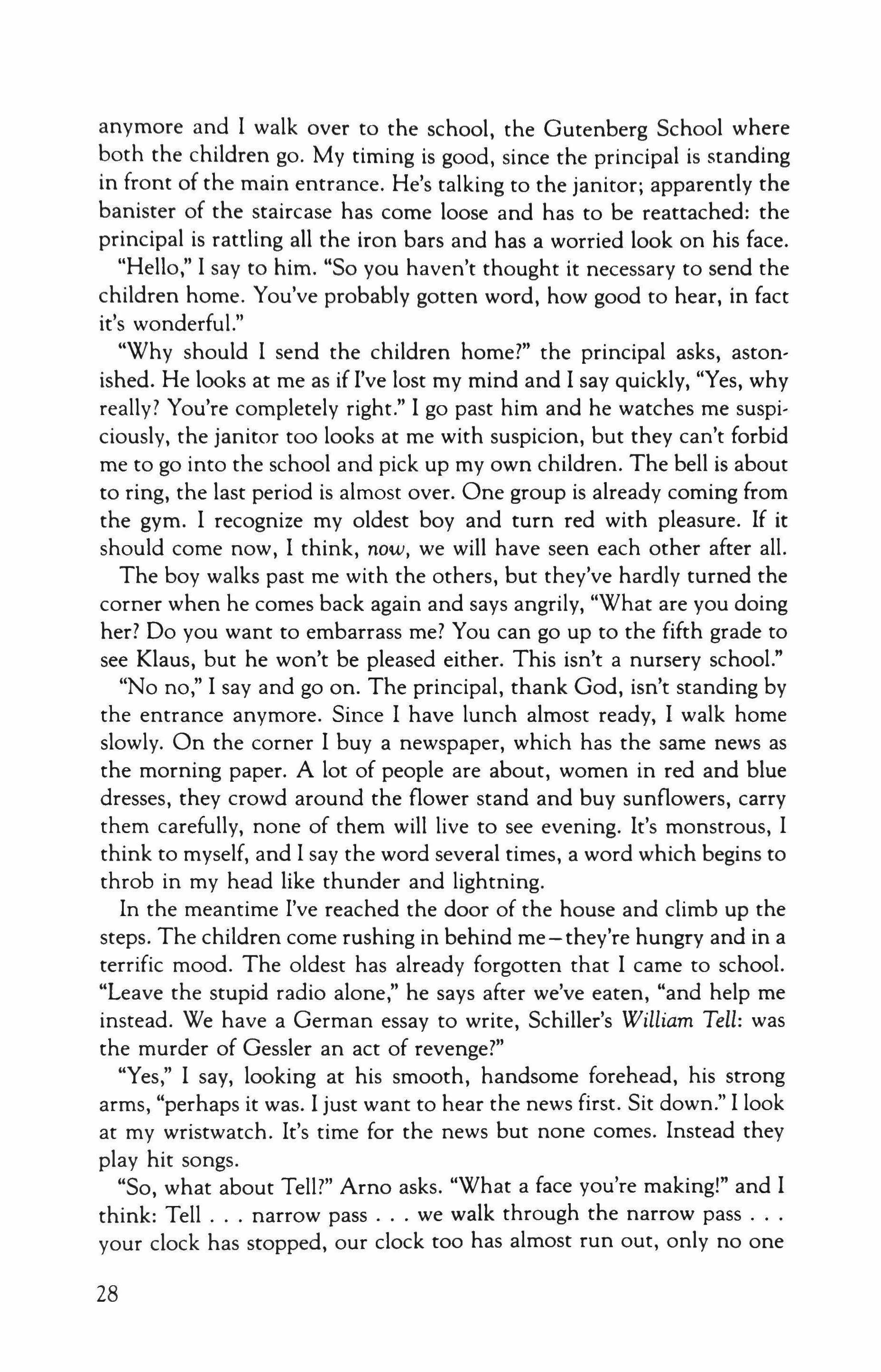
anymore and I walk over to the school, the Gutenberg School where both the children go. My timing is good, since the principal is standing in front of the main entrance. He's talking to the janitor; apparently the banister of the staircase has come loose and has to be reattached: the principal is rattling all the iron bars and has a worried look on his face.
"Hello," I say to him. "So you haven't thought it necessary to send the children home. You've probably gotten word, how good to hear, in fact it's wonderful."
"Why should I send the children home?" the principal asks, astonished. He looks at me as if I've lost my mind and I say quickly, "Yes, why really? You're completely right." I go past him and he watches me suspiciously, the janitor too looks at me with suspicion, but they can't forbid me to go into the school and pick up my own children. The bell is about to ring, the last period is almost over. One group is already coming from the gym. I recognize my oldest boy and turn red with pleasure. If it should come now, I think, now, we will have seen each other after all.
The boy walks past me with the others, but they've hardly turned the corner when he comes back again and says angrily, "What are you doing her? Do you want to embarrass me? You can go up to the fifth grade to see Klaus, but he won't be pleased either. This isn't a nursery school."
"No no," I say and go on. The principal, thank God, isn't standing by the entrance anymore. Since I have lunch almost ready, I walk home slowly. On the corner I buy a newspaper, which has the same news as the morning paper. A lot of people are about, women in red and blue dresses, they crowd around the flower stand and buy sunflowers, carry them carefully, none of them will live to see evening. It's monstrous, I think to myself, and I say the word several times, a word which begins to throb in my head like thunder and lightning.
In the meantime I've reached the door of the house and climb up the steps. The children come rushing in behind me - they're hungry and in a terrific mood. The oldest has already forgotten that I came to school. "Leave the stupid radio alone," he says after we've eaten, "and help me instead. We have a German essay to write, Schiller's William Tell: was the murder of Gessler an act of revenge?"
"Yes," I say, looking at his smooth, handsome forehead, his strong arms, "perhaps it was. I just want to hear the news first. Sit down." I look at my wristwatch. It's time for the news but none comes. Instead they play hit songs.
"So, what about Tell?" Arno asks. "What a face you're making!" and I think: Tell narrow pass we walk through the narrow pass your clock has stopped, our clock too has almost run out, only no one
28
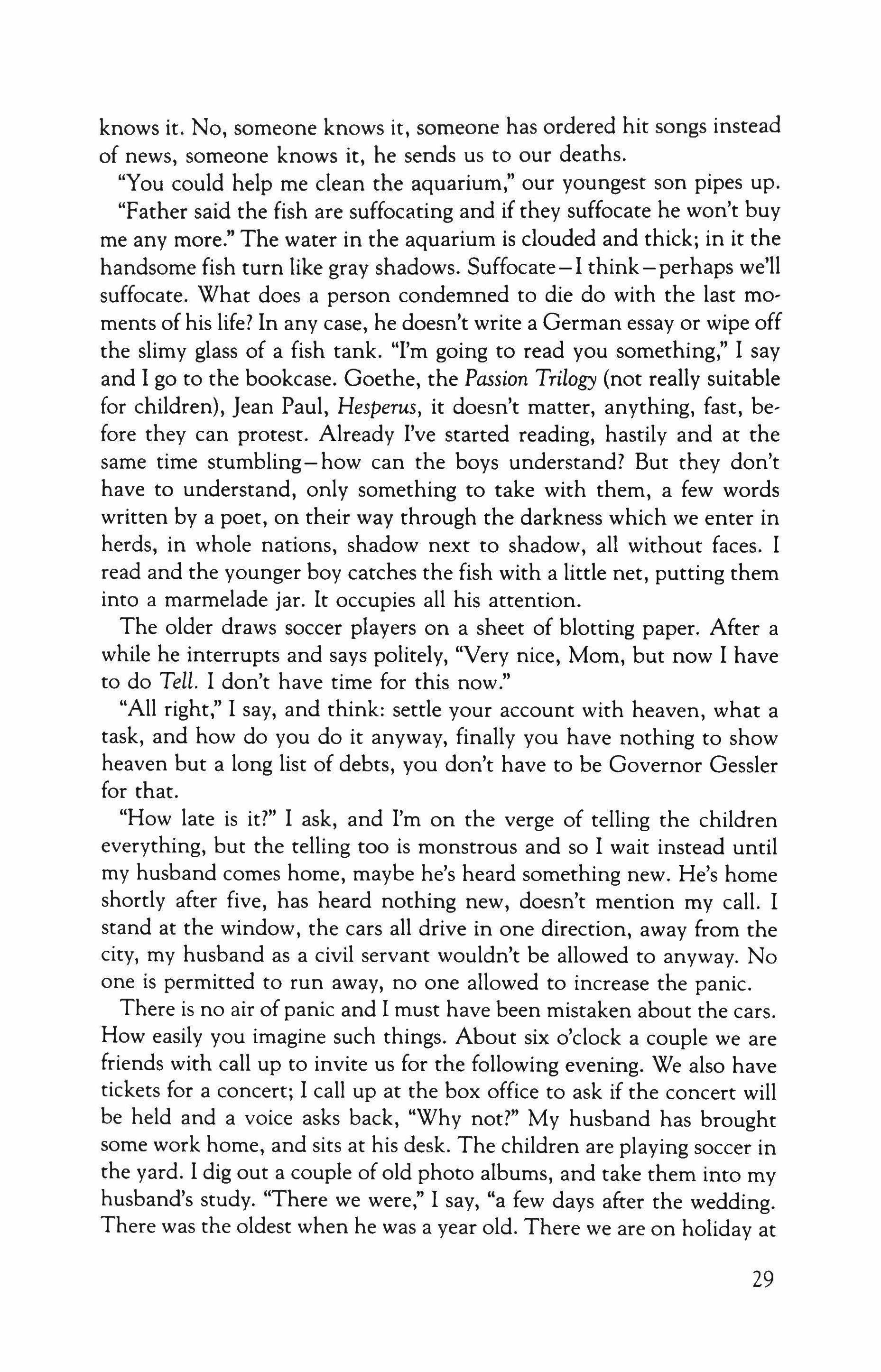
knows it. No, someone knows it, someone has ordered hit songs instead of news, someone knows it, he sends us to our deaths.
"You could help me clean the aquarium," our youngest son pipes up.
"Father said the fish are suffocating and if they suffocate he won't buy me any more." The water in the aquarium is clouded and thick; in it the handsome fish turn like gray shadows. Suffocate-I think-perhaps we'll suffocate. What does a person condemned to die do with the last moments of his life? In any case, he doesn't write a German essay or wipe off the slimy glass of a fish tank. "I'm going to read you something," I say and I go to the bookcase. Goethe, the Passion Trilogy (not really suitable for children), Jean Paul, Hesperus, it doesn't matter, anything, fast, be, fore they can protest. Already I've started reading, hastily and at the same time stumbling- how can the boys understand? But they don't have to understand, only something to take with them, a few words written by a poet, on their way through the darkness which we enter in herds, in whole nations, shadow next to shadow, all without faces. I read and the younger boy catches the fish with a little net, putting them into a marmelade jar. It occupies all his attention.
The older draws soccer players on a sheet of blotting paper. After a while he interrupts and says politely, "Very nice, Mom, but now I have to do Tell. I don't have time for this now."
"All right," I say, and think: settle your account with heaven, what a task, and how do you do it anyway, finally you have nothing to show heaven but a long list of debts, you don't have to be Governor Gessler for that.
"How late is it?" I ask, and I'm on the verge of telling the children everything, but the telling too is monstrous and so I wait instead until my husband comes home, maybe he's heard something new. He's home shortly after five, has heard nothing new, doesn't mention my call. I stand at the window, the cars all drive in one direction, away from the city, my husband as a civil servant wouldn't be allowed to anyway. No one is permitted to run away, no one allowed to increase the panic.
There is no air of panic and I must have been mistaken about the cars. How easily you imagine such things. About six o'clock a couple we are friends with call up to invite us for the following evening. We also have tickets for a concerti I call up at the box office to ask if the concert will be held and a voice asks back, "Why not?" My husband has brought some work home, and sits at his desk. The children are playing soccer in the yard. I dig out a couple of old photo albums, and take them into my husband's study. "There we were," I say, "a few days after the wedding. There was the oldest when he was a year old. There we are on holiday at
29

Positano. Just look! There we're climbing the rocks, there we're riding in the boat. Everyone of the little pasted-in pictures summons up a host of memoriesscenery, conversations, arguments, intimacies, days and nights, they can bring a whole life back again and that's what I want, I can't tell my husband that I love him, but I can show him this, a life full of love, on our last day. Very cautiously I slide the first album across the papers that my husband has spread out in front of him.
"Oh yes," he says politely, and looks at a few of the old pictures. But then he looks at the clock. "Couldn't we do it this evening or Sunday? I still have things to do."
I've looked at the clock too, it's almost seven, couvte-jeu, the Angelus, the sun has gone down, the day is over. But of course I know it's not over yet and that it can all still happen. A half hour more, then my husband calls the children for supper and because of course they don't appear right away there are angry words and arguing before the meal, between the boys too, fathers and sons, Cain and Abel, so we all perish, with these words on our lips, with the world's old hatred.
We always eat a cold supper, and naturally we don't say grace before the meal, so when I stay standing behind my chair the children are astonished and my husband looks at me disapprovingly.
But I try it anyway, I say a little prayer that we learned as children, and then I say all sorts of other things, confusedly, blushing; I give thanks for our lives and ask for a merciful death. I've already sensed that my husband wants to interrupt me and of course he does interrupt, saying in a firm voice, "Now let's eat," and he sits down. The children are relieved and ask whether we'll play with them after dinner, for example the card game with the different models of cars, the game I find so stupid, but my husband says yes. "We'll listen to the news first," he says, glancing at me. Probably he thinks: it will calm her, who knows what else she may do, she's having a bad day.
"Yes," I say, "we can try, but it's useless. At noon there was no news either, instead they played hit songs, a song in Italian too, 'Florence in a Mantle of Stars,' but no news."
"We'll see about that," says my husband. It's just eight, and now we all go into the living room, where the radio cabinet is. We sit down to wait till the little light goes green and the well-known voice begins to speak. The light does go green but no voice comes, instead a noise, a wailing roar, totally indescribable, that rises and falls like a siren but different, and maybe it's not even coming from the radio but from outside and it drives you mad. I look at my husband. He is bent over the radio cabinet, turning the knobs; his hands are all white and his veins stand out in his
30
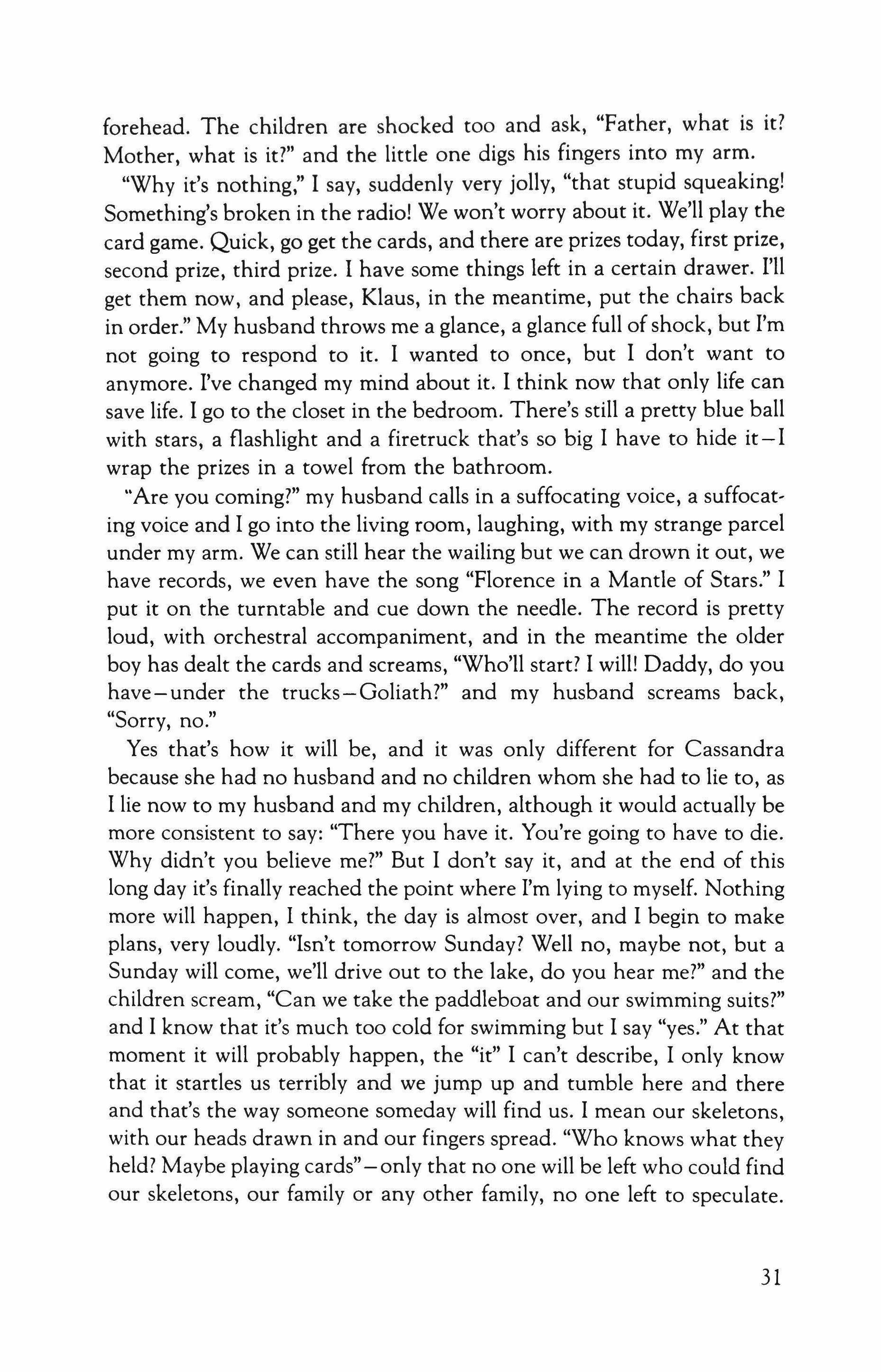
forehead. The children are shocked too and ask, "Father, what is it? Mother, what is it?" and the little one digs his fingers into my arm.
"Why it's nothing," I say, suddenly very jolly, "that stupid squeaking! Something's broken in the radio! We won't worry about it. We'll play the card game. Quick, go get the cards, and there are prizes today, first prize, second prize, third prize. I have some things left in a certain drawer. I'll get them now, and please, Klaus, in the meantime, put the chairs back in order." My husband throws me a glance, a glance full of shock, but I'm not going to respond to it. I wanted to once, but I don't want to anymore. I've changed my mind about it. I think now that only life can save life. I go to the closet in the bedroom. There's still a pretty blue ball with stars, a flashlight and a firetruck that's so big I have to hide it-I wrap the prizes in a towel from the bathroom.
"Are you coming?" my husband calls in a suffocating voice, a suffocating voice and I go into the living room, laughing, with my strange parcel under my arm. We can still hear the wailing but we can drown it out, we have records, we even have the song "Florence in a Mantle of Stars." I put it on the turntable and cue down the needle. The record is pretty loud, with orchestral accompaniment, and in the meantime the older boy has dealt the cards and screams, "Who'll start? I will! Daddy, do you have-under the trucks-Goliath?" and my husband screams back, "Sorry, no."
Yes that's how it will be, and it was only different for Cassandra because she had no husband and no children whom she had to lie to, as I lie now to my husband and my children, although it would actually be more consistent to say: "There you have it. You're going to have to die. Why didn't you believe me?" But I don't say it, and at the end of this long day it's finally reached the point where I'm lying to myself. Nothing more will happen, I think, the day is almost over, and I begin to make plans, very loudly. "Isn't tomorrow Sunday? Well no, maybe not, but a Sunday will come, we'll drive out to the lake, do you hear me?" and the children scream, "Can we take the paddleboat and our swimming suits?" and I know that it's much too cold for swimming but I say "yes." At that moment it will probably happen, the "it" I can't describe, I only know that it startles us terribly and we jump up and tumble here and there and that's the way someone someday will find us. I mean our skeletons, with our heads drawn in and our fingers spread. "Who knows what they held? Maybe playing cards" - only that no one will be left who could find our skeletons, our family or any other family, no one left to speculate.
31

Translator's Afterword-
"On Day Xu: The Excavation of the Nuclear Age
The "nuclear family," as Marie-Luise Kaschnitz's 1963 story "On Day X" convincingly demonstrates, is a pre-war as well as a post-war phenomenon. Educated women are kept in the house; their potential for political action is effectively eliminated, and their daily task - to provide a "small safe world" into which husbands and children can nightly withdrawdecisively strengthens and unifies the social structure which imprisons them. For it is precisely the emphasized contrast between the sexes, between the spheres of women and men, the apparent possibility of retreat offered by the figure of the wife and mother, which can lead men to put aside political and social concerns the minute their workday is over.
In the "tranquilized fifties" art itself seems to play much the same function. If the radio play becomes an important new genre in post-war Germany, reaching unprecedented mass audiences, such art shares the same airwaves, the same medium as "government programming"; the play of voices which fill the existentially empty air above the city, the hit songs which take the place of political information and lull people to their deaths, the "well-known voice" which provides - in a format welldefined, short, and with a deceptive appearance of separateness from the real day it comments on and closes-the official nightly link between the invisible totality of the "nation" and its discrete units, the million small family circles of listeners, each barricaded cozily into its own living room. Any art which attempts to demystify rather than reproduce social relations is condemned as defeatist and disruptive ("the telling too is monstrous"), while the art of the past, with its humanist goal of aesthetic eduction, seems inaccessible and irrelevant.
Like the records which one has to turn up louder and louder to drown out the wailing outside, aesthetic pleasure is depicted within Kaschnitz's narrative as designed to anesthetize its audience to death. In an age of mechanical destruction, the work of art would seem to run the constant danger either of aiding the destructive forces or of self-destructing. Kaschnitz's story itself necessarily fails to achieve narrative closure, can end only in pointing out the limits of an art powerless to create the conditions in which its own survival and preservation are assured. - Katie Trumpener
32
Buddah
Susan Straight

"Look at this little Buddha-head dude, man," one of them said. He pushed closer. "He got them Chinese eyes."
"He got a big old head, too, man. I think we should make him say somethin. He don't respect us," another voice said from behind him. Buddah kept his lips pressed warm together and felt the voices slide forward, tighter, taking away the air. He couldn't breathe, and woke from the dream with the dry heat pressing through the walls; hot air seemed to waft into the room as if a giant mouth were hovering around it. A tickle of sweat curled around the skin behind his ear. He lay still, listening for the snores of Rodriguez and Sotelo, the two boys who shared his room. But their beds were empty, he saw, and fear pulled at his ribs. Did Gaines and TC make them guys leave so they could jump me? he thought, and when he turned his head and felt the rough pillowcase against his neck he remembered that Sotelo and Rodriguez had gone home to L.A. on a week pass.
It was his seventh day. I can't go on home pass till I been in this place for a month, he said to himself. They gon talk me to death, bout behavior and pattern of your life, and them Crips gon try and dog me every time I turn around. He opened the door and looked out at the bare land, the stiff yellow grass like dog fur in patches, that surrounded St. Jude's School for Boys. Now everybody on they home pass, and ain't nobody left but me and them guys that messed up or don't got nowhere to go, he thought. The gray-green weeds close to the fence shivered in the wind. Every day he thought of the miles of desert and boulders he had seen when the social worker drove him in from L.A. "Your program is six months," the man had said.
No one else was awake yet; none of the other boys were roaming the
33

walks in front of the buildings, hanging over the balconies, waiting for an overheated car to pull in off the highway. If a woman ever got out to look for help, they would swarm like dust toward her. Buddah listened to the wind. Must be lettin us sleep cause nobody goin home. He looked down the railing to the other end of the building to see if Jesse, the counselor for the thirteen-to-fifteen-vear-olds, was awake, but his door was still closed. A long row of doorknobs glinted in the sun. Third door Gaines and TC. Sotelo said they ain't got no home pass. They gon be on me all the time, talkin bout am I gon buy Gaines some pants with my state money. Am I gon give up the ducats.
He thought of the dream, the shapes pressing forward, and he touched the trunk on the floor by his bed. That circle of voices was how he had gotten his name, months ago. A delegation of Bounty Hunters stood around him when he neared the project. "Fuckin Buddha-head, can't even see out them eyes, they so slanty." He'd been waiting for it, and had gifts ready for them: a car stereo, sunglasses from the Korean store, and himself. "I can pull for you," he whispered to them.
At St. Jude's, he had covered the scarred top of his trunk with a sheet of white paper, the way the others had, and written his name in curved letters:
BUDDAH SOUL GARDENS BOUNTY HUNTER'S
He thought the name might protect him here, but it had been a mistake. He wanted to be left alone, to collect his things invisibly, not to speak. That first night, when they were asked, Sotelo and Rodriguez read the trunk and told the other boys, "New baby? He's red, man." Bounty Hunters wore red bandannas, called each other "Blood." Crips were blue-raggers, and shouted "Cuzz" before they shot someone.
But there were only two other red rags at St. Jude's, and they were in the oldest group. In Buddah's group there were two Crips. Gaines and TC Harris had flashed their hands at him, their fingers and thumbs contorted in the signals Buddah had always run from. Gaines fanned his fingers out over his biceps and said, "Oh, yeah."
Now it ain't nobody in the room but me, six more days. Buddah looked at the low wide windows and imagined the shapes he would see at night, blocking the light from the parking lot when they walked past the curtains; he saw the room as dark and gold-toned as if it were night now, and the crack of light that would cut in as they opened the door.
He let the lock clink against the metal edging of the trunk. It con-
34

tained everything he had at St. Jude's: the jeans, white Tshirts and cheap canvas shoes Jesse took him to buy with part of the state money. "You got to lock your shit up all the time if you want to keep it," Jesse had said, and Buddah laughed through his nose. Locks ain't about nothin. Shit. They tellin me bout locks.
Buddah opened Sotelo's nightstand and saw only paper covered with drawings of heavy-eyed girls. He bent and looked under Sotelo's bed; he'd seen him drop something behind the head one night. This was the first time he been alone, able to look. He saw a blunt shape against the wall, lying in the folds of green bedspread. It was a short length of pipe, dull heavy iron. Shit, everybody must got one a these, he thought. He bent to Rodriguez's side and heard Jesse's voice, heard him banging on doors with the flat of his hand, calling, "Get up, hardheads, we got places to go."
Montoya's clipped words came from the doorway next to Buddah's. "Hey, man, Jesse, you wake up so early? You miss me already, man?"
"Yeah, Montoya, I couldn't wait," Jesse said. "Get ready for breakfast."
Buddah slipped to his trunk quickly and dropped the pipe behind it. He heard it land, muffled, on the edge of his bedspread, and then Jesse swung open the door, saying, "Five minutes, Smith. How you like this heat?"
Buddah looked at Jesse's long feet on the hump of the doorway. Ain't here to be likin it.
"Still can't speak, huh?" Jesse said. "Maybe you'll talk at the beach if we cool you off." He turned and Buddah saw the flash of a bird diving to the parking lot for potato-chip crumbs.
They waited for Jesse near the long white van. Montoya, his hair combed smooth and feather-stiff, walked his boxer's walk in baggy cholo khakis. Carroll, a white boy, leaned against the van, arms folded under the "Highway to Hell" that crossed his T-shirt. Buddah stood apart from them, in the shade of a squat palm tree, preparing to be invisible. His arms were folded too, and he pushed down on his feet, feeling the long muscles in his thighs tighten. The ghostly bushes past the fence turned in the wind.
Won't nobody see me. Them Crips be busy talkin shit to Jesse, and I ain't gotta worry bout nobody else. l'ma get me somethin at the beach. It'll be somethin there.
The sound of electric drums, sharp as gunfire, came from the balcony. Buddah waited until they approached. TC wore new razor-creased Levis and a snow-white T-shirt, a blue cap set high and slanted on his sun-
35

glasses. He carried the radio, a box of cassettes and a can of soda, singing loudly, "It shoulda been blue" over the words of the woman who sang, "It shoulda been you."
Gaines followed him, pointing at Buddah when TC sang "blue." "If we was at home, nigger, it be a .357 to the membrane," he whispered to Buddah, taking the pointing finger and running it around his ear.
Buddah pulled in the sides of his cheeks, soft and slippery when he bit them with his back teeth. Yeah, but I wouldn't be wearin no red rag, cause I ain't no Bounty Hunter. I'm a independent. Red, blue, ain't about shit to me. He was careful not to let his lips move; he had to be conscious of it, because when he spoke to himself, he would feel his lips touching each other sometimes and falling away as soft and slight as tiny bubbles popping. Probably look like I'm fixin to cry, he thought.
No bandannas were allowed at St. Jude's, no careless hand signals, nothing to spark gang fights. Gaines looked carefully for Jesse, and smiled close to Buddah's face. "The red rag is stained with the blood of disrespectful Hunters, slob. You gon respect us." He got one a them devil peaks, Buddah thought, like Mama say when people's hair all in a point on they forehead. Mama say them some evil people with peaks. He glanced away, at Te, who was uninterested, popping his fingers and singing.
You don't never stop talkin. You always runnin your mouth, that way everybody look at you, know where you are. He saw Jesse appear from the office, and Gaines moved away. Not like me. I'm bad cause you don't see me.
It was easy because he was so small and quiet; he walked into the stores imagining that everything in his face blended together, skin, lips, eyes all the same color. He wasn't hungry with hard rings around his stomach, like when he didn't eat anything for a long time, but he wanted something else in his mouth, a solid taste like he had chosen whatever he wanted. When they still lived in a house, when he was eleven, his mother left pots of red beans on the stove when she went to work in the afternoon. Sometimes she left greens and a pan of cornbread, or three pieces of chicken, one each for him, Danita and Donnie. He used to walk with her to the bus stop, saying nothing, watching her skin begin to shine from the heat, like molasses, with a liquid red sheen underneath the color. Her mouth moved all the time, to smile, to tell him to hurry and get back to the house and damn it, don't be hangin out in the street. Say somethin, David! All right, now. Lock the door. He always waited until five o'clock had passed and then left the house,
36
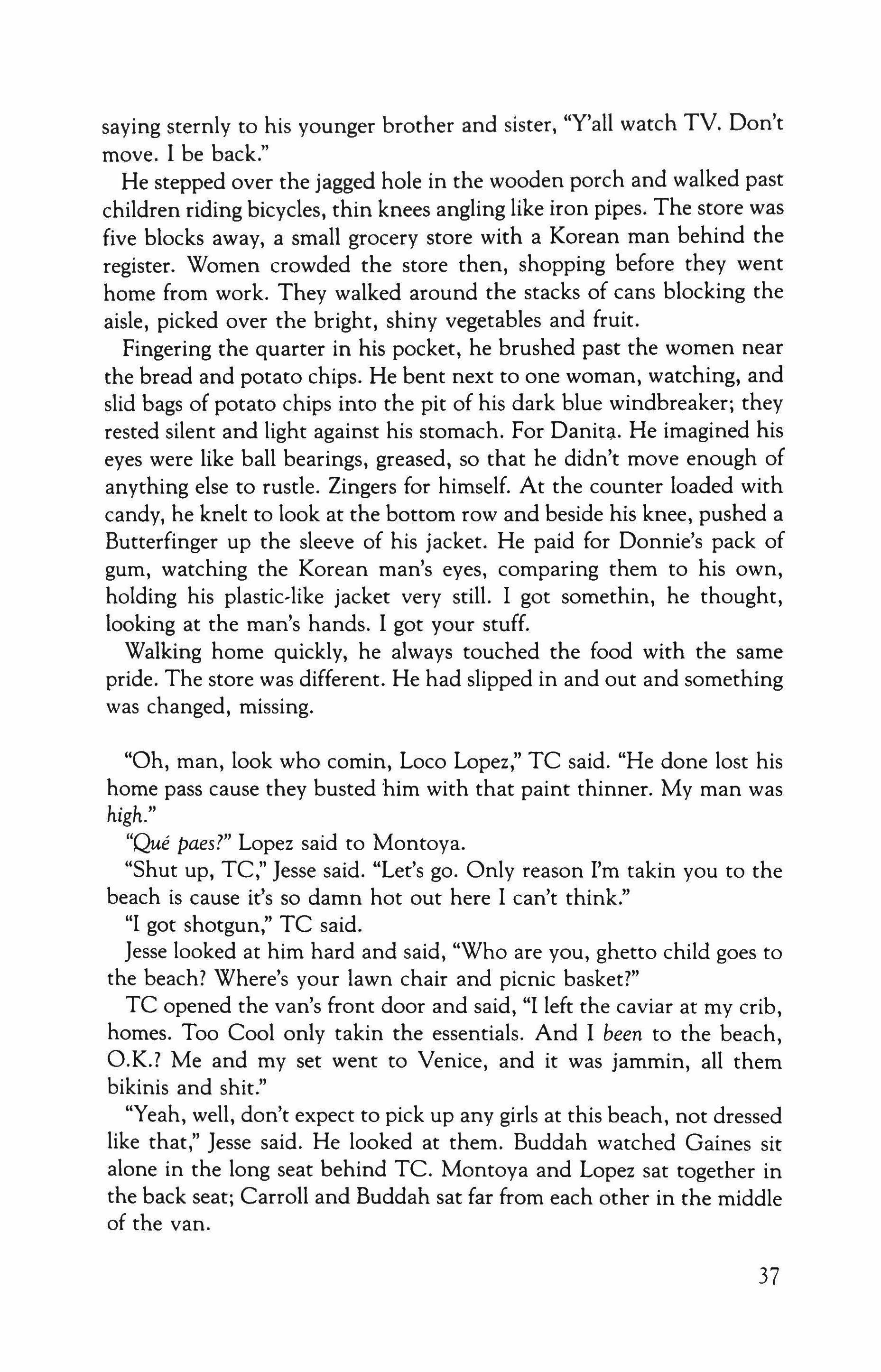
saying sternly to his younger brother and sister, "Y'all watch TV. Don't move. I be back."
He stepped over the jagged hole in the wooden porch and walked past children riding bicycles, thin knees angling like iron pipes. The store was five blocks away, a small grocery store with a Korean man behind the register. Women crowded the store then, shopping before they went home from work. They walked around the stacks of cans blocking the aisle, picked over the bright, shiny vegetables and fruit.
Fingering the quarter in his pocket, he brushed past the women near the bread and potato chips. He bent next to one woman, watching, and slid bags of potato chips into the pit of his dark blue windbreaker; they rested silent and light against his stomach. For Danira. He imagined his eyes were like ball bearings, greased, so that he didn't move enough of anything else to rustle. Zingers for himself. At the counter loaded with candy, he knelt to look at the bottom row and beside his knee, pushed a Butterfinger up the sleeve of his jacket. He paid for Donnie's pack of gum, watching the Korean man's eyes, comparing them to his own, holding his plastic-like jacket very still. I got somethin, he thought, looking at the man's hands. I got your stuff.
Walking home quickly, he always touched the food with the same pride. The store was different. He had slipped in and out and something was changed, missing.
"Oh, man, look who comin, Loco Lopez," TC said. "He done lost his home pass cause they busted him with that paint thinner. My man was high."
"Que paes?" Lopez said to Montoya.
"Shut up, TC," Jesse said. "Let's go. Only reason I'm takin you to the beach is cause it's so damn hot out here I can't think."
"I got shotgun," TC said.
Jesse looked at him hard and said, "Who are you, ghetto child goes to the beach? Where's your lawn chair and picnic basket?"
TC opened the van's front door and said, "I left the caviar at my crib, homes. Too Cool only takin the essentials. And I been to the beach, O.K.? Me and my set went to Venice, and it was jammin, all them bikinis and shit."
"Yeah, well, don't expect to pick up any girls at this beach, not dressed like that," Jesse said. He looked at them. Buddah watched Gaines sit alone in the long seat behind TC. Montoya and Lopez sat together in the back seat; Carroll and Buddah sat far from each other in the middle of the van.
37
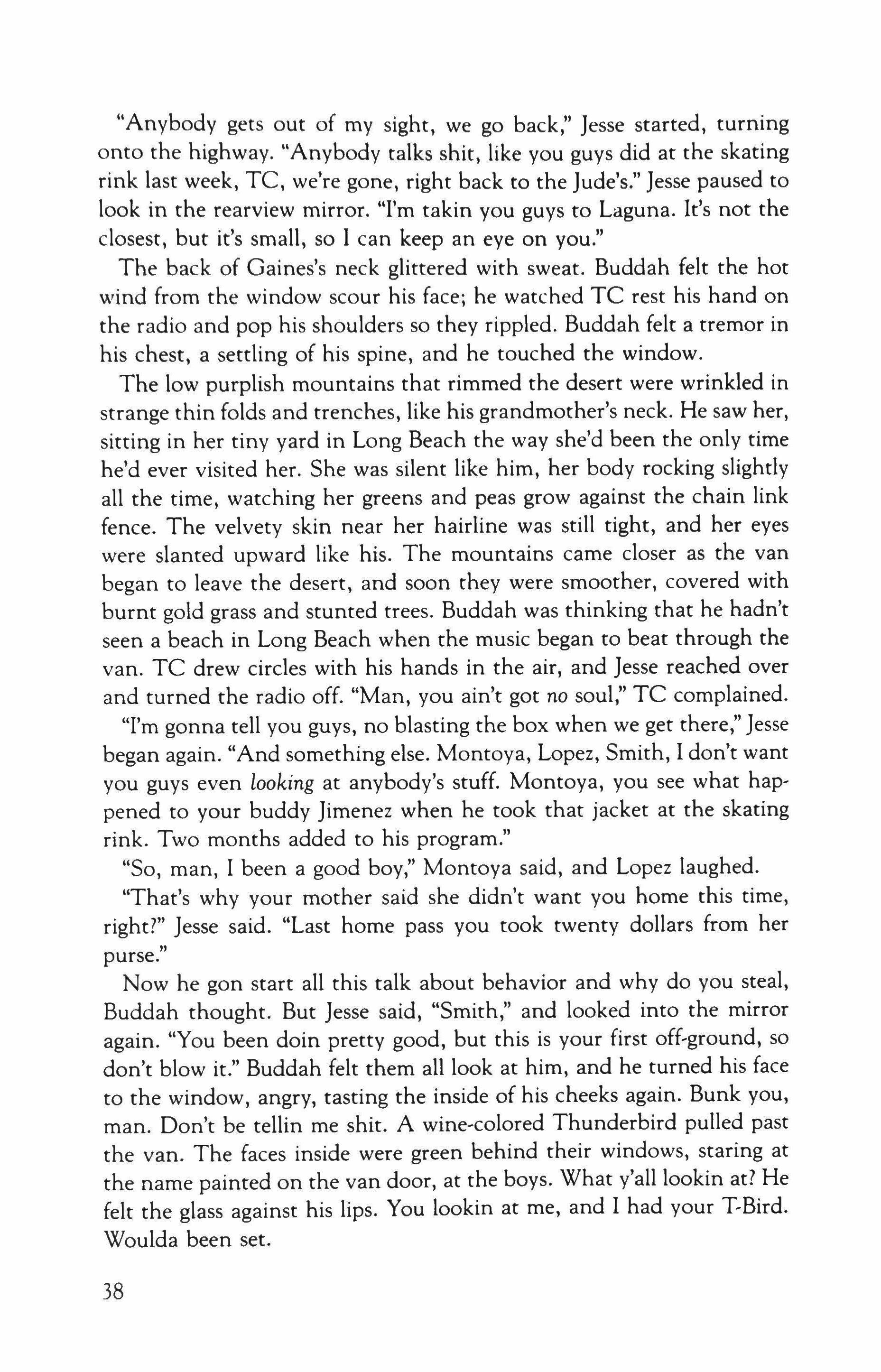
"Anybody gets out of my sight, we go back," Jesse started, turning onto the highway. "Anybody talks shit, like you guys did at the skating rink last week, TC, we're gone, right back to the Jude's." Jesse paused to look in the rearview mirror. "I'm takin you guys to Laguna. It's not the closest, but it's small, so I can keep an eye on you."
The back of Gaines's neck glittered with sweat. Buddah felt the hot wind from the window scour his face; he watched TC rest his hand on the radio and pop his shoulders so they rippled. Buddah felt a tremor in his chest, a settling of his spine, and he touched the window.
The low purplish mountains that rimmed the desert were wrinkled in strange thin folds and trenches, like his grandmother's neck. He saw her, sitting in her tiny yard in Long Beach the way she'd been the only time he'd ever visited her. She was silent like him, her body rocking slightly all the time, watching her greens and peas grow against the chain link fence. The velvety skin near her hairline was still tight, and her eyes were slanted upward like his. The mountains came closer as the van began to leave the desert, and soon they were smoother, covered with burnt gold grass and stunted trees. Buddah was thinking that he hadn't seen a beach in Long Beach when the music began to beat through the van. TC drew circles with his hands in the air, and Jesse reached over and turned the radio off. "Man, you ain't got no soul," TC complained.
"I'm gonna tell you guys, no blasting the box when we get there," Jesse began again. "And something else. Montoya, Lopez, Smith, I don't want you guys even looking at anybody's stuff. Montoya, you see what happened to your buddy Jimenez when he took that jacket at the skating rink. Two months added to his program."
"So, man, I been a good boy," Montoya said, and Lopez laughed.
"That's why your mother said she didn't want you home this time, right?" Jesse said. "Last home pass you took twenty dollars from her purse."
Now he gon start all this talk about behavior and why do you steal, Buddah thought. But Jesse said, "Smith," and looked into the mirror again. "You been doin pretty good, but this is your first off-ground, so don't blow it." Buddah felt them all look at him, and he turned his face to the window, angry, tasting the inside of his cheeks again. Bunk you, man. Don't be tellin me shit. A wine-colored Thunderbird pulled past the van. The faces inside were green behind their windows, staring at the name painted on the van door, at the boys. What v'all lookin at? He felt the glass against his lips. You lookin at me, and I had your T-Bird. Woulda been set.
38

They had moved to the seventh building of the Solano Gardens housing project, an island run by Bounty Hunters in an ocean of Crips, just after his eleventh birthday. At the welter of railroad tracks behind the junior high, he walked rapidly, seeing the blue bandannas, the watching faces.
But he lived in Soul Gardens; the Bounty Hunters owned him. He had to be occasionally valuable to them, because no one could step outside the project alone, without a protective cadre of red rags. He watched them gather in the courtyard and then walked slightly behind. They left him alone until they needed something.
The dent-puller, long and thin, pierced into car locks easily and pulled the entire silver circles out for him. The cars were like houses, each with its own smell and a push of air that he felt against his face for an instant when he bent to pull the stereo, someone else's smell that he let escape. He learned to start the car if Ellis told him to, and the feel of each steering wheel under his fingers for a moment made his stomach jump. Soft, leather-bound he'd felt once, but cold and ridged usually.
They hadn't gotten caught when they stripped or stole cars in the neighborhood, but Ellis decided he wanted a T-Bird. At the house he finally chose in Downey, where the 7-11 they passed had only white faces inside, a wine-red Thunderbird was parked. Ellis looked at Buddah with a strange smile on his face. Buddah had been waiting for this, too. "Ain't doin no house," Buddah said, and Ellis pushed him. "You know they got a VCR. You better be down," Ellis said.
Buddah loved the cars, their metallic shine like crystal sugar on the fruit candy that was his mother's favorite. Some of them even smelled sweet. But the house, even when he stood under the eaves moving the lock, smelled heavy and wrong, and when the door opened and the foreign air rushed at him, he heard the screaming of the alarm and then running.
The ocean glinted like an endless stretch of blue flake on a hood. Buddah had never seen so much water, so many white people. Jesse said, "What you guys think, huh?"
"None a these women got booty," TC said. "No ass to hold onto."
Jesse drove down a street that curved toward the water. Clean, shining cars lined both sides: Mercedeses, BMW's, station wagons, a Porsche. Buddah looked at the cars, at the chalky clean sidewalks and smooth grass. Jesse circled twice before he found a parking space, and then he said, "Damn, we don't have quarters. We're gonna have to walk to a store to get some, cause if I pull out we won't find another space."
39
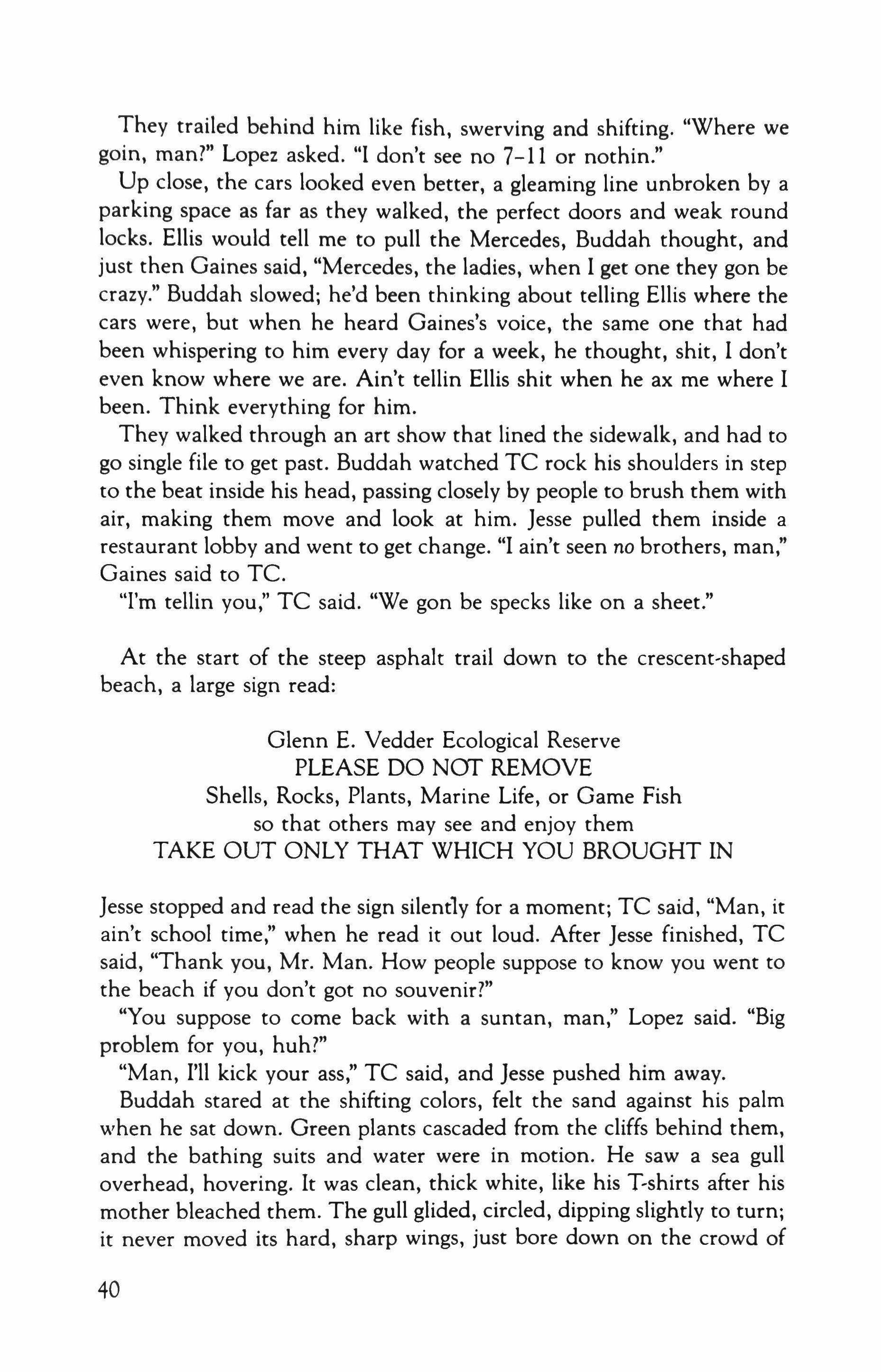
They trailed behind him like fish, swerving and shifting. "Where we gain, man?" Lopez asked. "I don't see no 7-11 or nothin,"
Up close, the cars looked even better, a gleaming line unbroken by a parking space as far as they walked, the perfect doors and weak round locks. Ellis would tell me to pull the Mercedes, Buddah thought, and just then Gaines said, "Mercedes, the ladies, when I get one they gon be crazy." Buddah slowed; he'd been thinking about telling Ellis where the cars were, but when he heard Gaines's voice, the same one that had been whispering to him every day for a week, he thought, shit, I don't even know where we are. Ain't tellin Ellis shit when he ax me where I been. Think everything for him.
They walked through an art show that lined the sidewalk, and had to go single file to get past. Buddah watched TC rock his shoulders in step to the beat inside his head, passing closely by people to brush them with air, making them move and look at him. Jesse pulled them inside a restaurant lobby and went to get change. "I ain't seen no brothers, man," Gaines said to TC.
"I'm tellin you," TC said. "We gon be specks like on a sheet."
At the start of the steep asphalt trail down to the crescent-shaped beach, a large sign read:
Glenn E. Vedder Ecological Reserve PLEASE DO Nor REMOVE Shells, Rocks, Plants, Marine Life, or Game Fish so that others may see and enjoy them TAKE OUT ONLY THAT WHICH YOU BROUGHT IN
Jesse stopped and read the sign silently for a moment; TC said, "Man, it ain't school time," when he read it out loud. After Jesse finished, TC said, "Thank you, Mr. Man. How people suppose to know you went to the beach if you don't got no souvenir?"
"You suppose to come back with a suntan, man," Lopez said. "Big problem for you, huh?"
"Man, I'll kick your ass," TC said, and Jesse pushed him away. Buddah stared at the shifting colors, felt the sand against his palm when he sat down. Green plants cascaded from the cliffs behind them, and the bathing suits and water were in motion. He saw a sea gull overhead, hovering. It was clean, thick white, like his T-shirts after his mother bleached them. The gull glided, circled, dipping slightly to turn; it never moved its hard, sharp wings, just bore down on the crowd of
40

people and suddenly pulled up to place its feet on a rock ten feet away. He look just like TC, Buddah thought. Think he bad, showin off.
TC had been watching, too. "That's how we is in the set, man, be swoopin, just like that bird, ain't never move false," he said. "We see what we want and we on it, cool." Buddah looked at Gaines. His shoulders were hunched uncomfortably, like loaves of bread against his neck, and he stared out at the water. "What we suppose to do?" he said to Jesse. "Just sit here?"
"I didn't say you guys couldn't move, I just said you can't disappear," Jesse answered. "Do whatever you want. Look at the scenery. Don't drown." No one moved. "Can any of you swim?"
Carroll said, "I used to know. I went to a lake one time." They looked at him. "A goddamn lake ain't no ocean," Gaines said. He looked back at the water.
"Just go touch it," Jesse said. "It won't kill you." He took off his shoes and his long feet were ashy gray and rough. Walking toward the water, he said, "Come on, I'll save you if you trip and get your hair wet."
Somebody else gotta move first, Buddah thought. Not me. We specks for sure, like them rocks. TC turned up his radio; he and Gaines watched girls walk by and stare. Carroll, Montoya and Lopez had gone to the water's edge, where they stood near Jesse. Buddah saw Jesse gesturing to boats far out on the ocean.
"Forget this shit, man, I ain't sittin with no slob red-ragger," TC said. "Ain't shit to do here." He stood over Buddah. Gaines was watching the waves; he seemed to have forgotten Buddah.
You ain't bad now, Too Cool. Nobody payin good attention to you like you want. You just a speck. TC picked up the radio and pushed Gaines's foot. "Dude down there sellin sodas, homes. Come on, man, fore I have to fuck this red boy up." Buddah waited. Gaines looked at him and said, "When you givin me my money, punk? I ain't playin." He stood up. It ain't your money. Buddah got up and walked forward slightly, waiting until he heard the music leave.
He looked at the tangle of wet black rocks on the left end of the beach, about twenty yards away, the spray flying from behind them. He felt eyes on him, from the blankets and towels. Now I'm botherin you, cause I ain't mavin, I ain't swimmin or nothin. How you know I ain't come to this beach all the time and it's boring?
Three kids made a sand castle, looking up at him now and then. It was plain and round, and the walls sagged because the sand was too wet, too close to the waves. See, I woulda had that castle sharp. Have me some
41

shells line up on the outside, have a whole fence made outta shells. Jesse and the others walked back to the blankets. "Where's Gaines and TC?" Jesse said. Buddah lifted his chin toward the soda seller. "Don't get too happy about bein here, man," Jesse said impatiently. "You could be sweatin back at the Jude's."
"I'm goin over here," Buddah said.
Jesse raised his eyebrows. "He says. Don't go past the rocks."
When he made it to the first rock, it was dry and grayish; he ran his hand over the hard warmth. Tiny broken shells were jammed inside the rock's holes. Buddah walked toward the wet, glistening black closer to the ocean. He stood on the edge of the wet sand, feeling his feet sink, and saw the smallest waves, the tiny push of water just at the edge, after the wave had washed up on the beach and before the water pulled back. The dying waves lined the sand with circlets of bright white. He walked forward and smeared the lines with his shoe.
The tall square rock in front of him had a smooth side, from which a fat pale boy climbed down. Buddah stopped, turning away from the boy's staring face. When he had passed, Buddah walked to the wet part and sat on one of the low, flat rocks. From far away it had looked deep black, but he saw that it was only slightly wet. Green feathery plants hung near the bottom, and he was surprised at the shells and animals clinging to the top. The shells clamped down tightly when he touched them. Lockin up, like you a house. But I could get you if you didn't stay inside.
I could get some a these shells, like them big pretty ones. I go out on them rocks and people only see black, not me. The rocks led to a long formation-a pier, almost, out into the water. Buddah pulled himself up the face of the first rock; at the top, white foam spilled over the end. Small pools of water, still as plastic, were everywhere around him as he walked, picking his way past clumps of seaweed, until he found a dry spot to sit on.
I'm gone. Can't nobody see nothin. He felt his skin warm to the rock. Snails and long insects that looked like roaches dotted the rock. Buddah saw a small snail near his hand; its shell was dull and dry, ashy like Jesse's feet. He touched it with his finger and it didn't move or tighten down like the round shells. He must be dvin, too dry. Must of got left here when the water dried up from one a his holes. A pool of water nearby was empty. He pulled at the snail lightly, wincing at the sucking resistance. Let go. You know you can't be out here all dry. It's some water for you right here. He turned the shell up to look at it; the rim was pink,
42
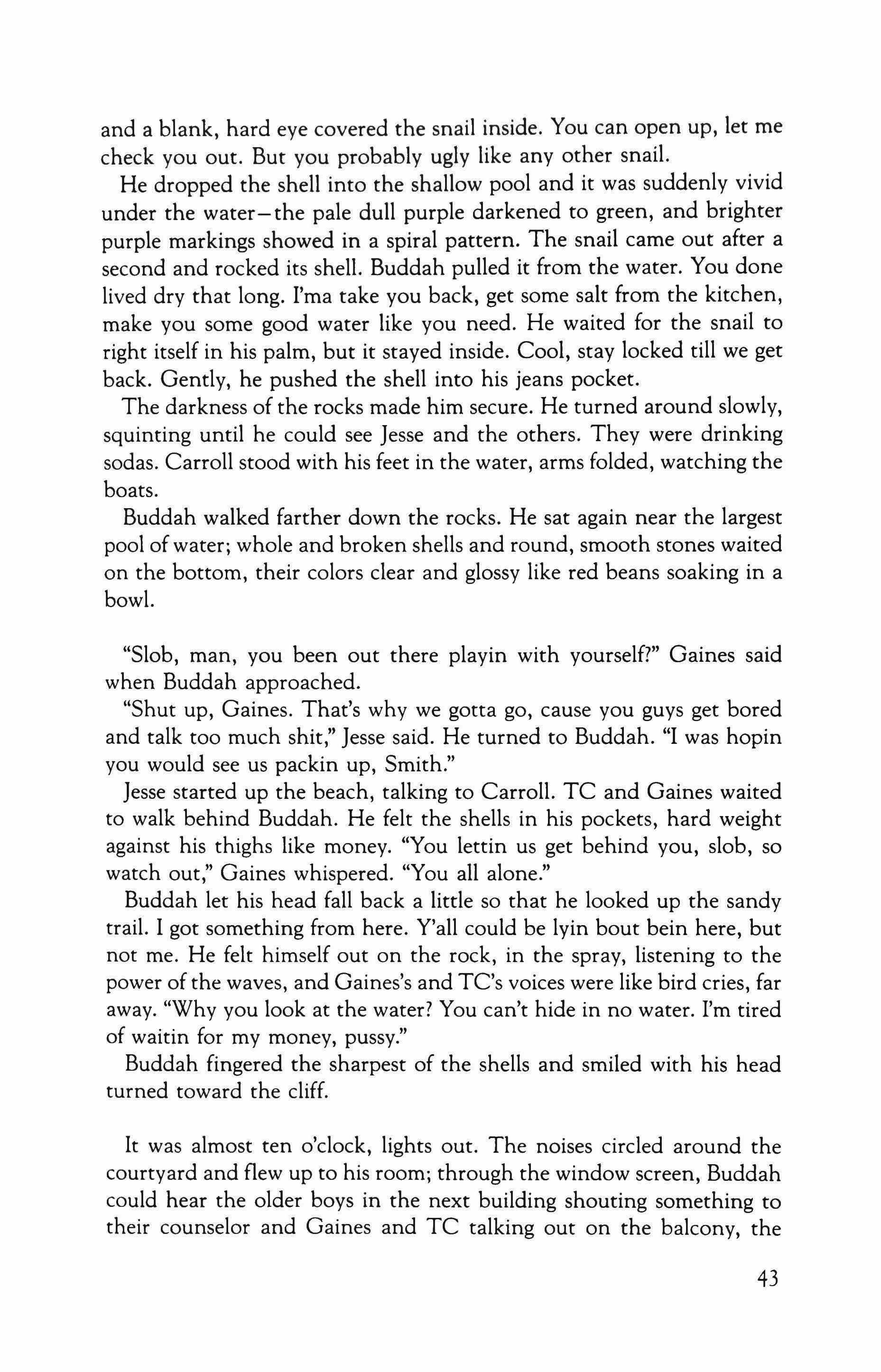
and a blank, hard eye covered the snail inside. You can open up, let me check you out. But you probably ugly like any other snail.
He dropped the shell into the shallow pool and it was suddenly vivid under the water-the pale dull purple darkened to green, and brighter purple markings showed in a spiral pattern. The snail came out after a second and rocked its shell. Buddah pulled it from the water. You done lived dry that long. I'ma take you back, get some salt from the kitchen, make you some good water like you need. He waited for the snail to right itself in his palm, but it stayed inside. Cool, stay locked till we get back. Gently, he pushed the shell into his jeans pocket.
The darkness of the rocks made him secure. He turned around slowly, squinting until he could see Jesse and the others. They were drinking sodas. Carroll stood with his feet in the water, arms folded, watching the boats.
Buddah walked farther down the rocks. He sat again near the largest pool of water; whole and broken shells and round, smooth stones waited on the bottom, their colors clear and glossy like red beans soaking in a bowl.
"Slob, man, you been out there playin with yourself?" Gaines said when Buddah approached.
"Shut up, Gaines. That's why we gotta go, cause you guys get bored and talk too much shit," Jesse said. He turned to Buddah. "I was hopin you would see us packin up, Smith."
Jesse started up the beach, talking to Carroll. TC and Gaines waited to walk behind Buddah. He felt the shells in his pockets, hard weight against his thighs like money. "You lettin us get behind you, slob, so watch out," Gaines whispered. "You all alone."
Buddah let his head fall back a little so that he looked up the sandy trail. I got something from here. Y'all could be lyin bout bein here, but not me. He felt himself out on the rock, in the spray, listening to the power of the waves, and Gaines's and TC's voices were like bird cries, far away. "Why you look at the water? You can't hide in no water. I'm tired of waitin for my money, pussy."
Buddah fingered the sharpest of the shells and smiled with his head turned toward the cliff.
It was almost ten o'clock, lights out. The noises circled around the courtyard and flew up to his room; through the window screen, Buddah could hear the older boys in the next building shouting something to their counselor and Gaines and TC talking out on the balcony, the
43

radio still playing from their doorway. Jesse would come by in a few minutes and make sure they all went into their rooms. Buddah listened in the dark.
"Inside, guys. If you didn't run your mouths so much today, I was thinking of takin you to the Stallone flick next weekend."
"What flick?" TC said.
"First Blood," Jesse answered.
"Shit, man, why you gotta say that word in my presence and shit," TC said. Buddah imagined his head jerking violently. "First Cuzz, I told you. You disrespectin me."
"You see, TC? I'm so tired of that shit. It ain't the real world. You got table clean-up all week."
"Man, Jesse, you the one don't know. You could die for that shit."
"Inside, punks."
Jesse stopped at Montoya's door, and then Buddah heard the feet slide to his. Jesse was wearing house shoes; he'd be going to bed now, and the night man would watch St. Jude's.
Light flashed in the doorway. Buddah sat motionless, but Jesse didn't leave. He walked to the trunk suddenly, where the white paper was brightly lit. He see the pipe, Buddah thought, and pushed hard with his feet on the floor. "Bounty Hunters, shit," Jesse said. "What bounty did you get? Nothin valuable to you, just shit to sell and all this red rag crap. Soon as you start talkin you'll probably bore me with all that shit, too." He waited, and then closed the door.
Uh uh, cause I ain't workin no job for the blue, like TC and them. But now Jesse got them mad, and they probably come. Buddah got the shells out, arranging them in lines, in fences. He leaned forward and touched the cool pipe on the floor. I could wait and wait, and then what? He went to the sink, where the snail was in the soap dish, and pushed at the tightly-closed shell. You waitin, too, for me to leave you alone. But you could wait forever.
The night man's hard shoes cracked the grit on the balcony when he opened the doors every hour in the beginning. Buddah knew he would quit checking after he heard no noise; he would sit in the room downstairs and watch TV. Buddah waited until the moonlight shifted in the window. He sat, still listening, until the brightest part had gone over the roof. He took off his shirt and opened his door.
His bare feet pressed into the sharp sand. He imagined himself on the black rocks, invisible as he pressed close to the stucco wall. TC and Gaines were breathing hard and long, he could hear through their screen. The doorknob turned easily, since it was turned so many times
44
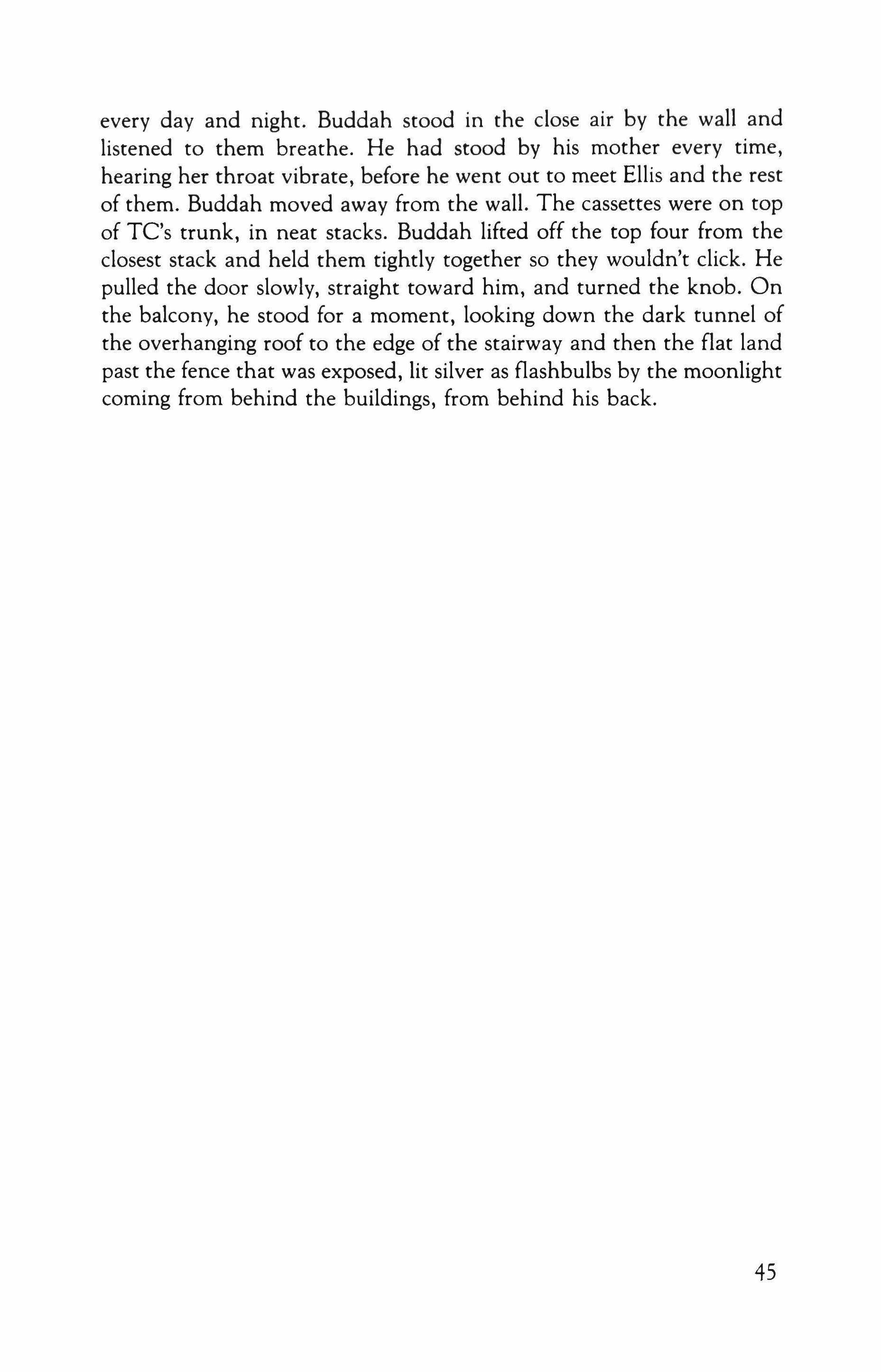
every day and night. Buddah stood in the close air by the wall and listened to them breathe. He had stood by his mother every time, hearing her throat vibrate, before he went out to meet Ellis and the rest of them. Buddah moved away from the wall. The cassettes were on top of TC's trunk, in neat stacks. Buddah lifted off the top four from the closest stack and held them tightly together so they wouldn't click. He pulled the door slowly, straight toward him, and turned the knob. On the balcony, he stood for a moment, looking down the dark tunnel of the overhanging roof to the edge of the stairway and then the flat land past the fence that was exposed, lit silver as flashbulbs by the moonlight coming from behind the buildings, from behind his back.
45
Something Big
Robert S. Nelsen

With her hand, the mother pulled the boy toward the bathtub. The boy felt as though he were a bull, a bull being dragged by the horns through the yellow ooze of the fly dip out back beside the bulls' corral. This was the boy's first bath in this new house; he had arrived just a week ago. The boy had walked up the lane to the house and had stared into the house through the screen door until the mother opened the door and motioned for him to enter. At the screen door, the boy had been silent, and there before that bathtub, the boy was silent still.
The boy looked at that bathtub perched on top of iron eagles' feet. Looking at the bathtub and its eagles' feet moved the boy closer to the mother. The mother walked around behind the boy, and the boy could feel the mother squeeze herself between the boy and that bathtub. The boy could feel the mother press her body against his back, wedging him between her soft legs, wedging the boy from his feet to where his head fit into where the mother's legs stopped. The boy was five years old.
"Off with your clothes," the mother said in a singsong voice. "That's law number one of the bathtub laws."
The mother quickly stripped the boy of his shirt and stockings and threw the shirt and stockings toward the clothes hamper. One stocking missed going into the clothes hamper and stuck to the outside of the clothes hamper. The boy's eyes moved from the stocking back to the bathtub, and he knew that this time he would do something more than lighting a fire, maybe stealing something big.
With the boy wedged between the mother's legs from his feet to where his head fit into where the mother's legs stopped, the mother undid the buttons on the boy's pants. Her hand stopped as it reached into the inside of the boy's pants, slid over his bare penis, and discovered that he
46
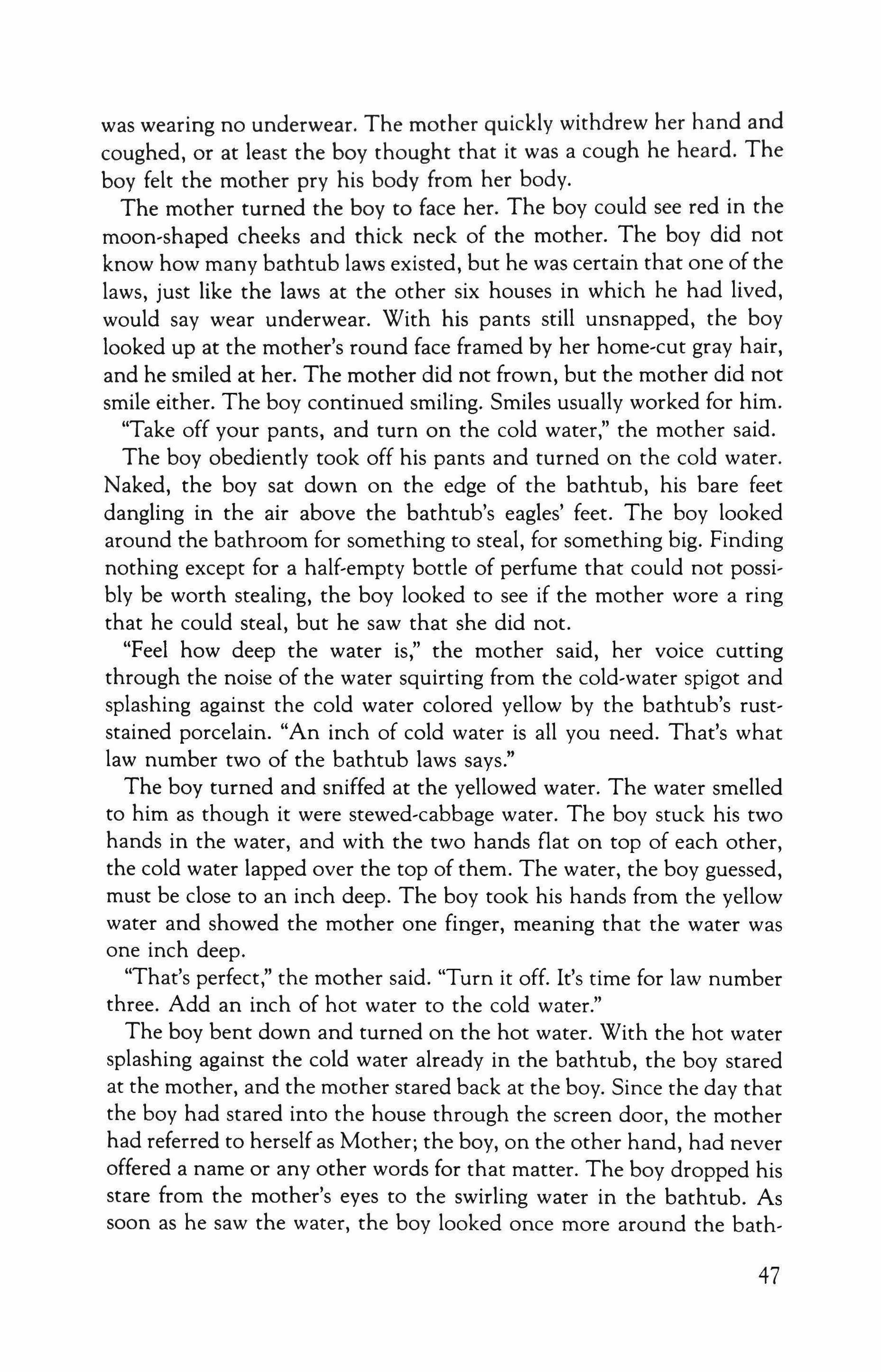
was wearing no underwear. The mother quickly withdrew her hand and coughed, or at least the boy thought that it was a cough he heard. The boy felt the mother pry his body from her body.
The mother turned the boy to face her. The boy could see red in the moon-shaped cheeks and thick neck of the mother. The boy did not know how many bathtub laws existed, but he was certain that one of the laws, just like the laws at the other six houses in which he had lived, would say wear underwear. With his pants still unsnapped, the boy looked up at the mother's round face framed by her home-cut gray hair, and he smiled at her. The mother did not frown, but the mother did not smile either. The boy continued smiling. Smiles usually worked for him.
"Take off your pants, and turn on the cold water," the mother said.
The boy obediently took off his pants and turned on the cold water. Naked, the boy sat down on the edge of the bathtub, his bare feet dangling in the air above the bathtub's eagles' feet. The boy looked around the bathroom for something to steal, for something big. Finding nothing except for a half-empty bottle of perfume that could not possibly be worth stealing, the boy looked to see if the mother wore a ring that he could steal, but he saw that she did not.
"Feel how deep the water is," the mother said, her voice cutting through the noise of the water squirting from the cold-water spigot and splashing against the cold water colored yellow by the bathtub's ruststained porcelain. "An inch of cold water is all you need. That's what law number two of the bathtub laws says."
The boy turned and sniffed at the yellowed water. The water smelled to him as though it were stewed-cabbage water. The boy stuck his two hands in the water, and with the two hands flat on top of each other, the cold water lapped over the top of them. The water, the boy guessed, must be close to an inch deep. The boy took his hands from the yellow water and showed the mother one finger, meaning that the water was one inch deep.
"That's perfect," the mother said. "Turn it off. It's time for law number three. Add an inch of hot water to the cold water."
The boy bent down and turned on the hot water. With the hot water splashing against the cold water already in the bathtub, the boy stared at the mother, and the mother stared back at the boy. Since the day that the boy had stared into the house through the screen door, the mother had referred to herself as Mother; the boy, on the other hand, had never offered a name or any other words for that matter. The boy dropped his stare from the mother's eyes to the swirling water in the bathtub. As soon as he saw the water, the boy looked once more around the bath-
47
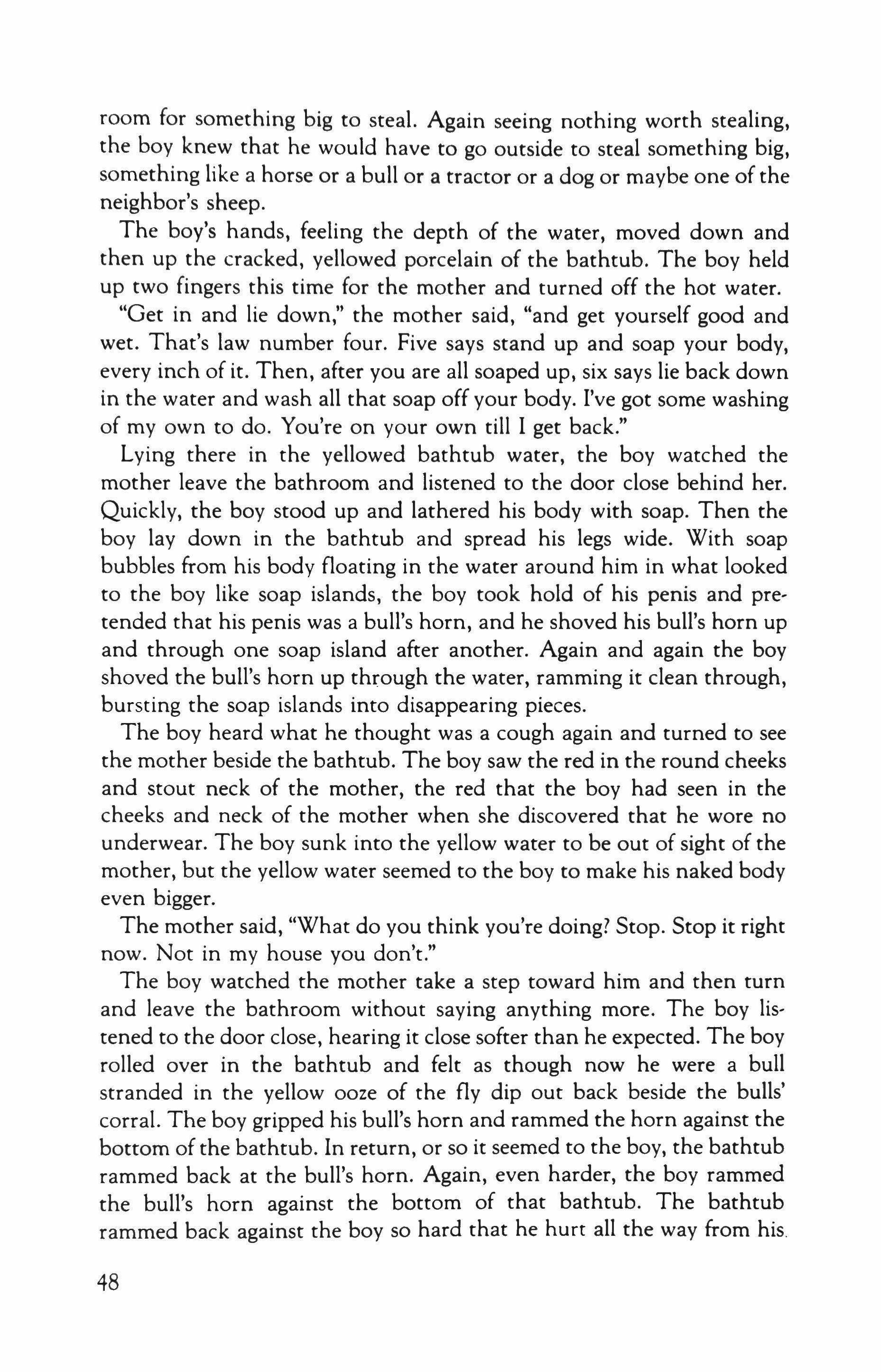
room for something big to steal. Again seeing nothing worth stealing, the boy knew that he would have to go outside to steal something big, something like a horse or a bull or a tractor or a dog or maybe one of the neighbor's sheep.
The boy's hands, feeling the depth of the water, moved down and then up the cracked, yellowed porcelain of the bathtub. The boy held up two fingers this time for the mother and turned off the hot water.
"Get in and lie down," the mother said, "and get yourself good and wet. That's law number four. Five says stand up and soap your body, every inch of it. Then, after you are all soaped up, six says lie back down in the water and wash all that soap off your body. I've got some washing of my own to do. You're on your own till I get back."
Lying there in the yellowed bathtub water, the boy watched the mother leave the bathroom and listened to the door close behind her. Quickly, the boy stood up and lathered his body with soap. Then the boy lay down in the bathtub and spread his legs wide. With soap bubbles from his body floating in the water around him in what looked to the boy like soap islands, the boy took hold of his penis and pre, tended that his penis was a bull's horn, and he shoved his bull's horn up and through one soap island after another. Again and again the boy shoved the bull's horn up through the water, ramming it clean through, bursting the soap islands into disappearing pieces.
The boy heard what he thought was a cough again and turned to see the mother beside the bathtub. The boy saw the red in the round cheeks and stout neck of the mother, the red that the boy had seen in the cheeks and neck of the mother when she discovered that he wore no underwear. The boy sunk into the yellow water to be out of sight of the mother, but the yellow water seemed to the boy to make his naked body even bigger.
The mother said, "What do you think you're doing? Stop. Stop it right now. Not in my house you don't."
The boy watched the mother take a step toward him and then turn and leave the bathroom without saying anything more. The boy listened to the door close, hearing it close softer than he expected. The boy rolled over in the bathtub and felt as though now he were a bull stranded in the yellow ooze of the fly dip out back beside the bulls' corral. The boy gripped his bull's horn and rammed the horn against the bottom of the bathtub. In return, or so it seemed to the boy, the bathtub rammed back at the bull's horn. Again, even harder, the boy rammed the bull's horn against the bottom of that bathtub. The bathtub rammed back against the boy so hard that he hurt all the way from his.
48

horn to his spine. Faster and faster, the boy rammed the bottom of the bathtub, and faster and faster the bath rose up and rammed itself against the boy. With tears in his eyes, the boy rolled over back upright in the bathtub. Today, the boy decided, today had to be the day to steal something big.
The boy decided that he could not steal a horse or a bull or a tractor or a dog or even one of the neighbor's sheep today because he could not think of a place where he could hide anything that big, not today. But the boy did think of the neighbor's raspberries, and the neighbor's strawberries, and the neighbor's tomatoes that he could steal today, things that he could eat and would not have to hide.
The boy stared at the bathtub that had hurt the boy from his bull's horn to his spine. The boy doubled his fist, and, just as he was about to punch the bathtub, he heard the bathroom door open and the mother begin talking.
"O.K., only two more bathtub laws to go," the mother said, "and you are going to like both of them. Law number seven says baths don't have to last more than ten minutes, and law number eight says you only have to take one bath a week. See, you're done and you didn't even drown."
Smiling, the mother turned and left the bathroom, this time without closing the door. The boy jumped out of the bathtub and wiped the towel once over his hair, once over his front and once over his back. Freed from the yellow water of the bathtub, the boy thought only of the neighbor's garden with its raspberries and its strawberries and its tomatoes. From the clothes hamper, the boy took his shirt, pants and stockings, pulling the one stocking from where it was still stuck on the outside of the clothes hamper. The boy did not bother with underwear. Outside the screen door, the boy grabbed his boots, and he stamped his feet into his boots there on the front porch in front of the screen door where he had first looked inside the house.
In his boots, the boy ran to the horse's pen next to the bull's corral and the fly dip. The boy climbed into the horses' pen and laid himself down in the dust hole that the horses used to dry themselves off. Over and over the boy rolled in the dust hole, just as he had seen the horses roll around in the dust hole after being unsaddled. The boy stood up, and he spat into his hands and rubbed the spit into the dust covering his face.
"Bathtub," the boy shouted, "die! Stay away from me and my dirt, or I'll cut your eagles' feet off."
The boy ran to the barn and he unhooked two of the milk buckets that hung on nails pounded into a wooden beam in the room where the
49
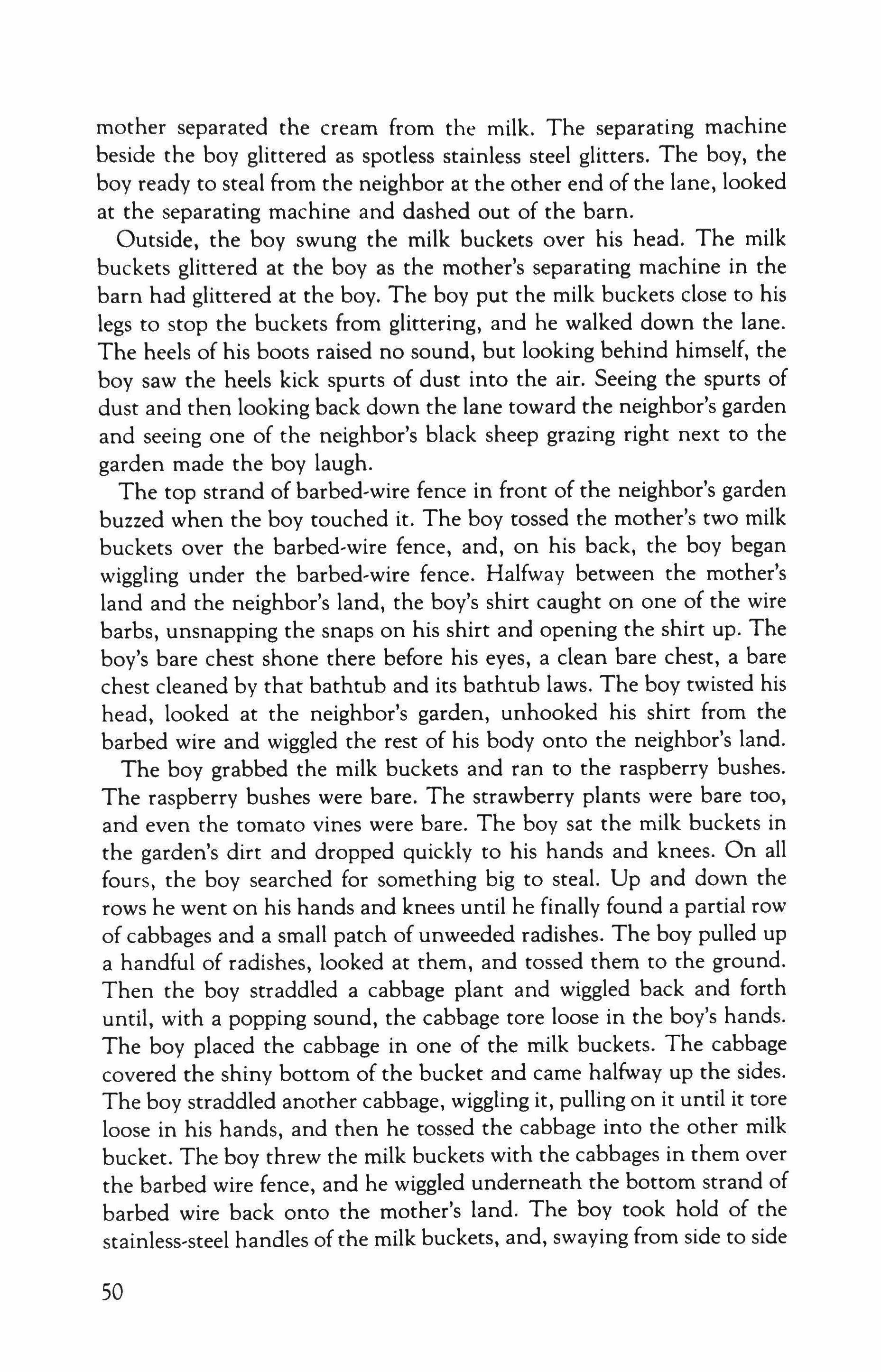
mother separated the cream from the milk. The separating machine beside the boy glittered as spotless stainless steel glitters. The boy, the boy ready to steal from the neighbor at the other end of the lane, looked at the separating machine and dashed out of the barn.
Outside, the boy swung the milk buckets over his head. The milk buckets glittered at the boy as the mother's separating machine in the barn had glittered at the boy. The boy put the milk buckets close to his legs to stop the buckets from glittering, and he walked down the lane. The heels of his boots raised no sound, but looking behind himself, the boy saw the heels kick spurts of dust into the air. Seeing the spurts of dust and then looking back down the lane toward the neighbor's garden and seeing one of the neighbor's black sheep grazing right next to the garden made the boy laugh.
The top strand of barbed-wire fence in front of the neighbor's garden buzzed when the boy touched it. The boy tossed the mother's two milk buckets over the barbed-wire fence, and, on his back, the boy began wiggling under the barbed-wire fence. Halfway between the mother's land and the neighbor's land, the boy's shirt caught on one of the wire barbs, unsnapping the snaps on his shirt and opening the shirt up. The boy's bare chest shone there before his eyes, a clean bare chest, a bare chest cleaned by that bathtub and its bathtub laws. The boy twisted his head, looked at the neighbor's garden, unhooked his shirt from the barbed wire and wiggled the rest of his body onto the neighbor's land.
The boy grabbed the milk buckets and ran to the raspberry bushes. The raspberry bushes were bare. The strawberry plants were bare too, and even the tomato vines were bare. The boy sat the milk buckets in the garden's dirt and dropped quickly to his hands and knees. On all fours, the boy searched for something big to steal. Up and down the rows he went on his hands and knees until he finally found a partial row of cabbages and a small patch of unweeded radishes. The boy pulled up a handful of radishes, looked at them, and tossed them to the ground. Then the boy straddled a cabbage plant and wiggled back and forth until, with a popping sound, the cabbage tore loose in the boy's hands. The boy placed the cabbage in one of the milk buckets. The cabbage covered the shiny bottom of the bucket and came halfway up the sides. The boy straddled another cabbage, wiggling it, pulling on it until it tore loose in his hands, and then he tossed the cabbage into the other milk bucket. The boy threw the milk buckets with the cabbages in them over the barbed wire fence, and he wiggled underneath the bottom strand of barbed wire back onto the mother's land. The boy took hold of the stainless-steel handles of the milk buckets, and, swaying from side to side
50

and swinging the buckets out in front of him, he walked back up the lane to the bulls' corral next to the yellow ooze of the fly dip.
With the cabbages in his hands, the boy used his elbows to climb the pole fence. On top, the boy hooked his boots under the pole below him and took his pocketknife from his pocket. The boy cut into one of the cabbages and laid the pieces of cabbage on the pole that he was sitting on, squeezing the pieces with his legs so that they would not fall to the ground. The boy stabbed his hand and fingers with the pocketknife, and the boy dripped the blood from his hand and fingers onto the cabbage between his legs, turning the cabbage red with blood. With his bloodied hand, the boy tossed the blood red cabbage to the bulls. The bulls sniffed at the blood red cabbage and soon began eating the red pieces. The boy cut into the other cabbage and placed it between his legs on the pole and stabbed his other hand and fingers and dripped the new blood onto that cabbage, turning it the same blood red. The boy tossed the blood red cabbage to the bulls, and placing his bloodied hands on top of his head as though they were bull's horns, he watched the bulls below him fight over the cabbage.
51
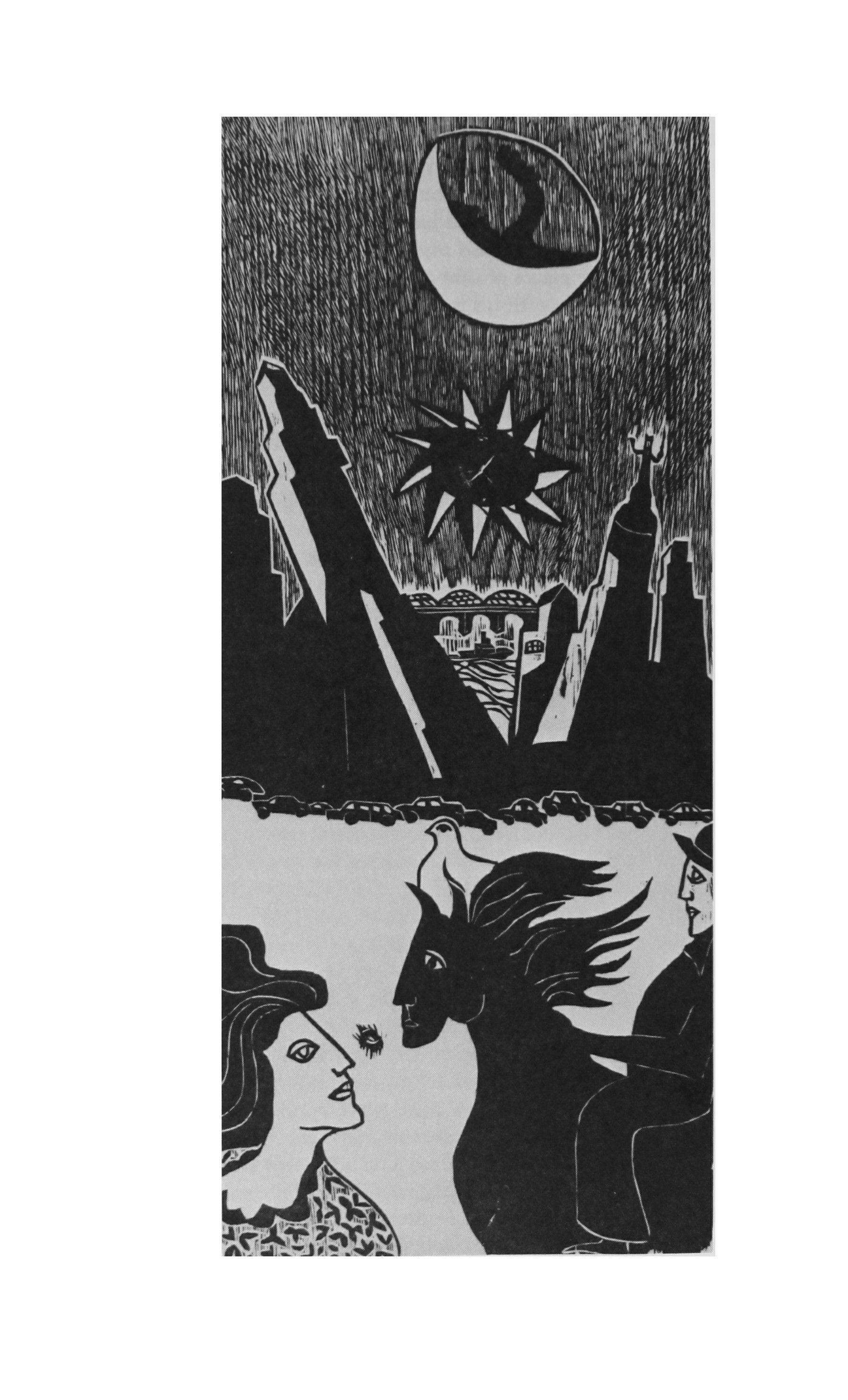
Frog Acts
Stephen Dixon

In bed, must be late, no car traffic outside, light coming in, been asleep, up, asleep again, hears a noise in the apartment. He's on his side, front to his wife's back, both no clothes, hand on her thigh. Kids in the bedrooms down the hall. Light noise again. Could be the cat. Whispers "Denise, you hear anything? Denise?" Doesn't say anything, still asleep. He's quiet, holds his breath, listens. Nothing. Lets out his breath, holds it again. Sound of feet. Something. Moving slowly, sliding almost. Slid, ing, that's the sound. Could be the cat doing something unusual. Slight floorboard squeak. Cat's made that too. Should get up. Scared. Cold feeling in his stomach, on his face. Has to do something, what, scream? If it's someone then that person might get excited, frightened, start shooting, let's say, knifing. He could be in one of the kids' rooms, at one of their doors. Gets on his back, holds his breath. No sound. Lets it out, holds it. Shuffling. Sure of it. Down the hall's wood floor, just a few inches. Shuffling stops, as if he picked up Howard listening. Now he doesn't want to tell Denise. She might jump, afraid, scream, panic, man could then panic, start shooting, knifing, clubbing, something, if there is anyone there. Should get out there to see. If it's someone, face him, but with a stick, knife, something, though without saying anything to Denise. For now let her sleep. Man sees her he might quickly shoot or knife him, feeling outnumbered, one to grab him, other to phone the police. Or just keep the gun or knife on her while he rapes her and Howard does nothing, stands there, saying to himself "Fuck it, I'll kill him, kill him," kids watching too. Better to surprise him, and not have Denise spoil that surprise, and try to get him out or down. If someone's there. Concentrates on his ears, holds his breath. Nothing. Holds his breath. Nothing. Holds. Something. Shuffling. Inches. Even the sound
53
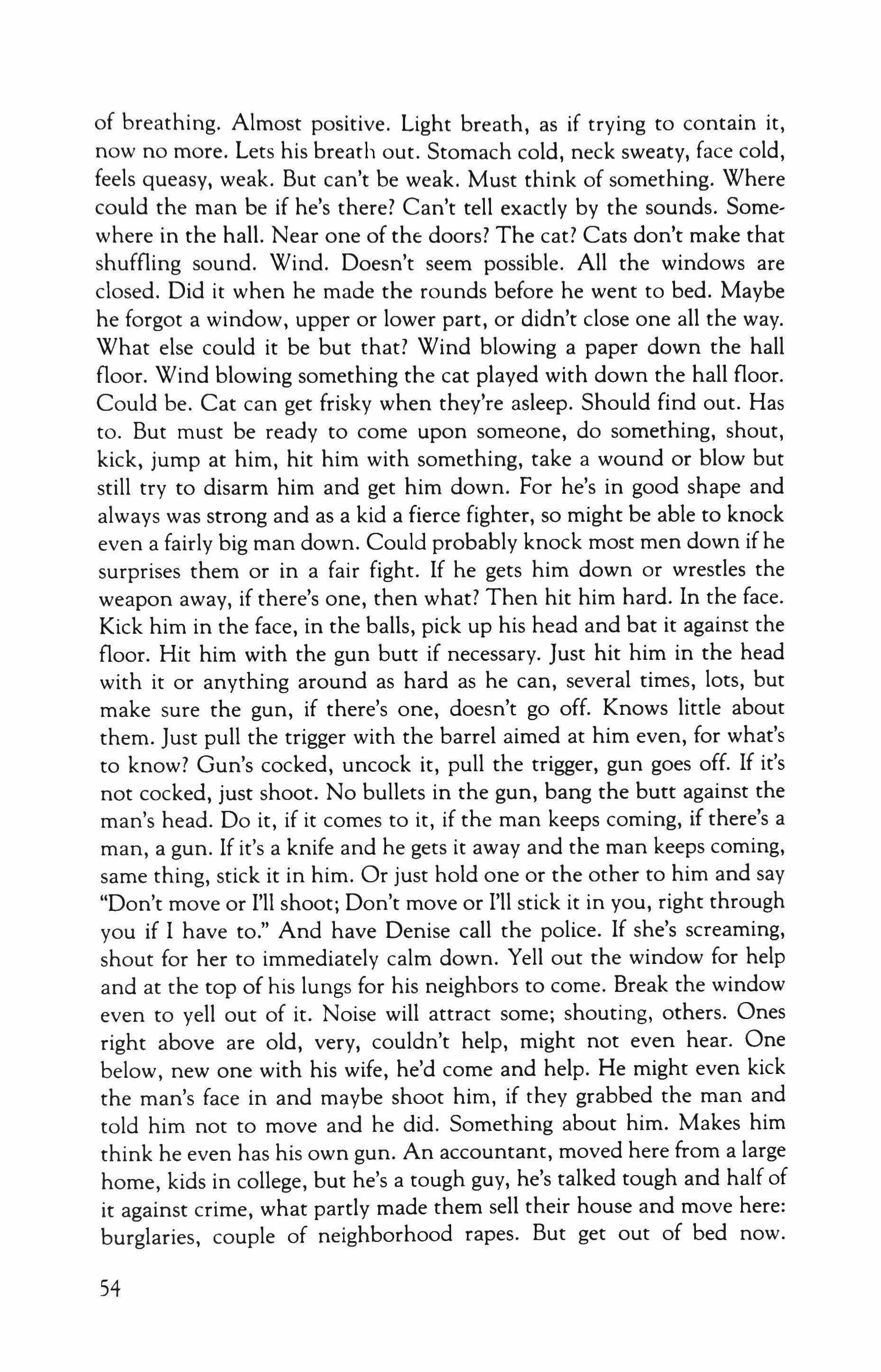
of breathing. Almost positive. Light breath, as if trying to contain it, now no more. Lets his breath out. Stomach cold, neck sweaty, face cold, feels queasy, weak. But can't be weak. Must think of something. Where could the man be if he's there? Can't tell exactly by the sounds. Somewhere in the hall. Near one of the doors? The cat? Cats don't make that shuffling sound. Wind. Doesn't seem possible. All the windows are closed. Did it when he made the rounds before he went to bed. Maybe he forgot a window, upper or lower part, or didn't close one all the way. What else could it be but that? Wind blowing a paper down the hall floor. Wind blowing something the cat played with down the hall floor. Could be. Cat can get frisky when they're asleep. Should find out. Has to. But must be ready to come upon someone, do something, shout, kick, jump at him, hit him with something, take a wound or blow but still try to disarm him and get him down. For he's in good shape and always was strong and as a kid a fierce fighter, so might be able to knock even a fairly big man down. Could probably knock most men down if he surprises them or in a fair fight. If he gets him down or wrestles the weapon away, if there's one, then what? Then hit him hard. In the face. Kick him in the face, in the balls, pick up his head and bat it against the floor. Hit him with the gun butt if necessary. Just hit him in the head with it or anything around as hard as he can, several times, lots, but make sure the gun, if there's one, doesn't go off. Knows little about them. Just pull the trigger with the barrel aimed at him even, for what's to know? Gun's cocked, uncock it, pull the trigger, gun goes off. If it's not cocked, just shoot. No bullets in the gun, bang the butt against the man's head. Do it, if it comes to it, if the man keeps coming, if there's a man, a gun. If it's a knife and he gets it away and the man keeps coming, same thing, stick it in him. Or just hold one or the other to him and say "Don't move or I'll shoot; Don't move or I'll stick it in you, right through you if I have to." And have Denise call the police. If she's screaming, shout for her to immediately calm down. Yell out the window for help and at the top of his lungs for his neighbors to come. Break the window even to yell out of it. Noise will attract some; shouting, others. Ones right above are old, very, couldn't help, might not even hear. One below, new one with his wife, he'd come and help. He might even kick the man's face in and maybe shoot him, if they grabbed the man and told him not to move and he did. Something about him. Makes him think he even has his own gun. An accountant, moved here from a large home, kids in college, but he's a tough guy, he's talked tough and half of it against crime, what partly made them sell their house and move here: burglaries, couple of neighborhood rapes. But get out of bed now.
54

Slowly, quietly. Find something to swing with. Best move. Be senseless not to. If the man has no weapon, he'd have the advantage. If there is a man there. Holds his breath. Nothing. Holds. Moving. Shuffling. Touching, something with his body. The wall, a door, and more creaking. That's it. Up.
Gets out ofbed, his underpants off the floor and puts them on. In case he has to run into the public hallway or the street. Anyway, they're briefs and he'll be less vulnerable down there and also look stronger in them than with none on and everything hanging. A consideration. Might mean nothing. But he's big-chested, narrow-waisted, in the mirror he can look powerful. Looks around, room dark, little streetlight through the shade cracks is all. Denise asleep. He has nothing. Lamp? Won't do. Too big, won't swing. Then what? What's he have? VCR, TV, two of the same kind of lamps, night tables, rocking chair, Denise's typewriter on her desk, clamp lamp above it, would collapse on impact, framed photos and prints on the wall, dresser, drawers, clothes, shoes in the closet and under the bed, maybe her boots. Couldn't get a good grip on the leather tops. Night table, a fold-up, on her side, probably lots of little things on it next to the lamp and books. Grab it by the legs and just rush the man. Or fold it up and wield it like a sledgehammer. Light enough to and in an open space he could really swing it. Goes around the bed, gets on the floor and unplugs the lamp, takes it off the table and sets it on the floor. Denise stirs. He stops. She lifts her head, turns it to him. He bends down to her ear, puts his hand over her mouth. "Shh," he whispers. "Don't speak. I think we're being robbed. Almost sure of it. I'll handle it, shh." She takes his hand away. "What are you doing?" she whispers. "Shh, shh. I'm going to use the table on him. Just in case. Don't worry." "Don't," she says; "wait; let me think." "The kids. No time. I have to. It'll be O.K. Get up quietly and stand by the phone. Don't pick it up. Then when I say to, call the police. Shh. No other words. No questions." He puts the books on the floor. She gets off the other side of the bed. He brushes the things off the table into his hand. Earstuds, paperclip, pencil, spool of thread but no needle in it, feels around, no needle on the table, used tissues, face cream, seashells, what feel like nail clippings, puts them on the bed. She's by the phone on the VCR. For a few seconds her hands over her face. "Shh, don't cry or let on you're here," he whispers; "important." Picks up the table by its legs, takes a deep breath but not to hear, lets it out and yells "I'm coming, you bastard-Call, call now," he whispers; "nine-one-one, but quietly-You better get the hell out the way you came in and quick. Now out, get, out." Hears movement, feet going, running. "There's someone." "Police,"
55

she says low, "we need help. A burglar in the apartment." Gives the address, name, phone and apartment numbers. Both kids screaming. "Stay away, you fucker," and runs down the hall holding the table straight out in front of him. Man's not there. "You O.K.? It's Daddy," to Olivia. Her room's dark but she's nodding, now crying. Man's not in the bathroom. Goes into Eva's room at the end of the hall. She's standing in her crib screaming. Goes into the hall leading to the living room, feels the front door. Still locked and chained. Looks through the hall door into the kitchen. Nobody seems to be there. Walks down the hall to the living room, table in front of him. "I'm coming. I can kill you. I have a gun." "Don't say that," Denise says from somewhere in back. "You came through the kitchen, get out that way." The man runs from the living room into the dining room, then into the kitchen. Howard follows slowly. "Get out, get out." Can't see his face. Just a silhouette of him. Tall, thin, bald or hair cut close or skull shaved or wearing a stocking over his face. Running sound as if he has sneakers on. Tries to open the kitchen door to the fire escape. Why'd he shut it? Must have been the way he came in. It was locked when they went to bed. Must have shut it so the wind wouldn't wake them, wind or cold. Something. Door can get stuck. He's trying to pull it open. "Fucking-ass door. What's with it? Fuck you then," turning to Howard at the dining-room door. "I'll kill you first if you come get me." "Just go and no killing," keeping the table straight out. "Fuck you, man, you haven't got nothing but that fucking board. Probably cardboard. Now back up. I've got a knife bigger than you." Howard backs up, table still in front of him. The man holds the knife out and starts to him. "Listen, just go out through the door over there on your right and we'll forget it." "Yeah, why?" "Just unlock and unchain it, that's all, and leave. You've time." "Give me all your money and I'll go. I'm not going without your money. Get your fucking wife to get it, and fast." "There's nobody else here." "You crazy?" "Just my little kid; that's who you heard." Still coming. What to do? Backs up. "Police are on the way. I set off an alarm second I heard you. I've been robbed here before. I know what to do." "Sure. And you got an alarm, you got money. Come on. Wasting my time. Fast." Anything to throw at him? Shout and he might leap at him with the knife. Fingers the table behind him for something to throw. Maybe the bottle of wine if they didn't put it away. Little silver wine holder; too light. Salt and pepper shakers, kid's boardbook, place settings, baby's spoon. Guy's too close. If he darts either way to get away the knife could reach him. Lunge at him with the table, then drop it if it doesn't knock the knife away and run into the living room. Throws the table at him, runs, knife slashes his shoulder,
56
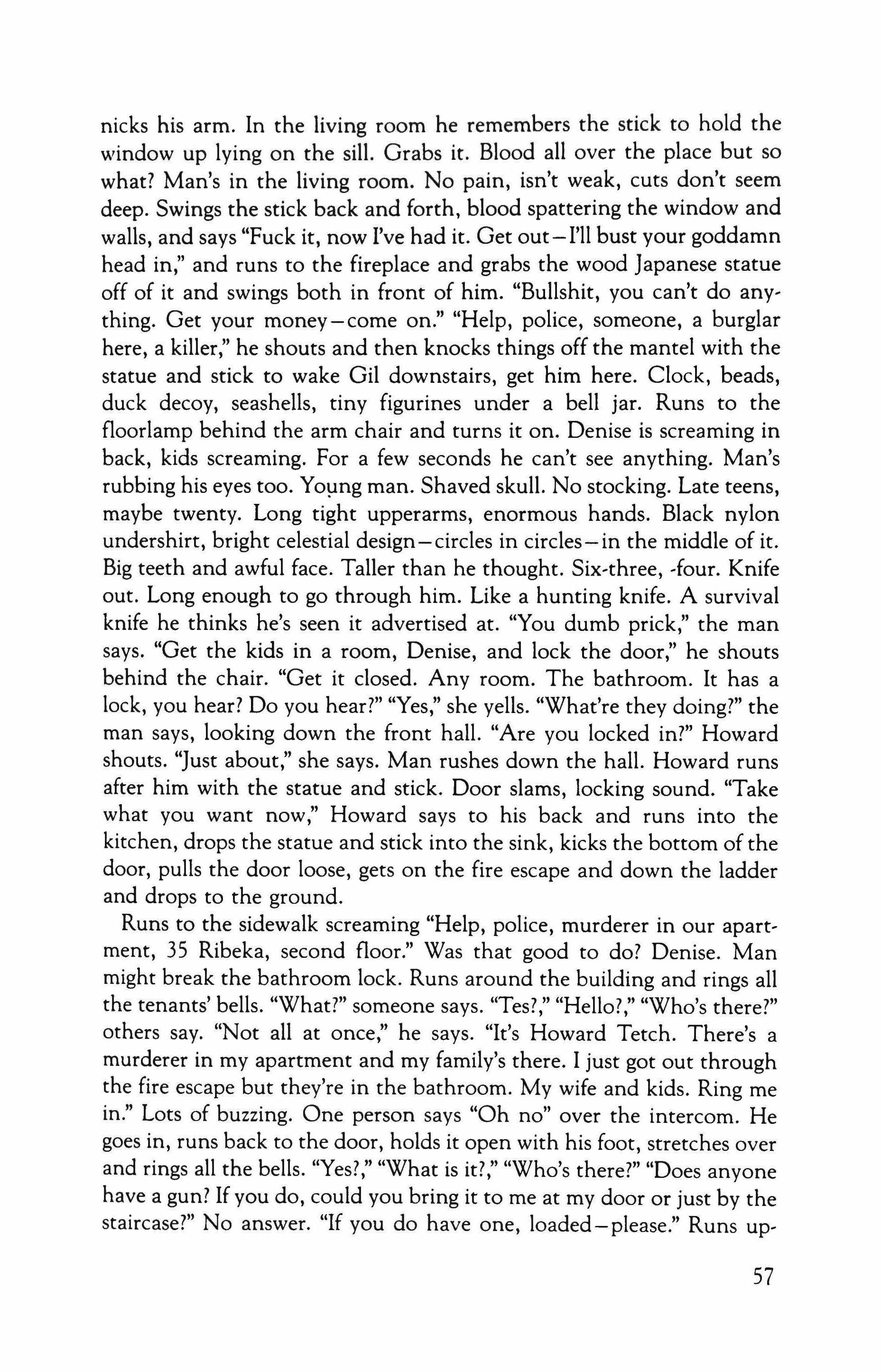
nicks his arm. In the living room he remembers the stick to hold the window up lying on the sill. Grabs it. Blood all over the place but so what? Man's in the living room. No pain, isn't weak, cuts don't seem deep. Swings the stick back and forth, blood spattering the window and walls, and says "Fuck it, now I've had it. Get out -I'll bust your goddamn head in," and runs to the fireplace and grabs the wood Japanese statue off of it and swings both in front of him. "Bullshit, you can't do anything. Get your money-come on." "Help, police, someone, a burglar here, a killer," he shouts and then knocks things off the mantel with the statue and stick to wake Gil downstairs, get him here. Clock, beads, duck decoy, seashells, tiny figurines under a bell jar. Runs to the floorlamp behind the arm chair and turns it on. Denise is screaming in back, kids screaming. For a few seconds he can't see anything. Man's rubbing his eyes too. Young man. Shaved skull. No stocking. Late teens, maybe twenty. Long tight upperarms, enormous hands. Black nylon undershirt, bright celestial design - circles in circles - in the middle of it. Big teeth and awful face. Taller than he thought. Six-three, -four. Knife out. Long enough to go through him. Like a hunting knife. A survival knife he thinks he's seen it advertised at. "You dumb prick," the man says. "Get the kids in a room, Denise, and lock the door," he shouts behind the chair. "Get it closed. Any room. The bathroom. It has a lock, you hear? Do you hear?" "Yes," she yells. "What're they doing?" the man says, looking down the front hall. "Are you locked in?" Howard shouts. "Just about," she says. Man rushes down the hall. Howard runs after him with the statue and stick. Door slams, locking sound. "Take what you want now," Howard says to his back and runs into the kitchen, drops the statue and stick into the sink, kicks the bottom of the door, pulls the door loose, gets on the fire escape and down the ladder and drops to the ground.
Runs to the sidewalk screaming "Help, police, murderer in our apartment, 35 Ribeka, second floor." Was that good to do? Denise. Man might break the bathroom lock. Runs around the building and rings all the tenants' bells. "What?" someone says. "Tes?," "Hello?," "Who's there?" others say. "Not all at once," he says. "It's Howard Tetch. There's a murderer in my apartment and my family's there. I just got out through the fire escape but they're in the bathroom. My wife and kids. Ring me in." Lots of buzzing. One person says "Oh no" over the intercom. He goes in, runs back to the door, holds it open with his foot, stretches over and rings all the bells. "Yes?," "What is it?," "Who's there?" "Does anyone have a gun? If you do, could you bring it to me at my door or just by the staircase?" No answer. "If you do have one, loaded-please." Runs up-
57

stairs, down the hall, bangs on his door. "I'm coming in with the cops, you bastard, so you better get the hell out. The door to the fire escape's open. Denise, you all right?" Doesn't hear anything. Thinks he hears something. "Yell if you're all right, Denise." "Yes, O.K.," she yells. "Stay there." Runs back down the hall, into the short alcove that has a door at the end of it opening onto the fire escape. Opens it, gets on the escape, man doesn't seem to have left, not a person on the sidewalk. Goes into the apartment, gets the big cutting knife out of the drawer, bottle of ammonia under the sink, fills up a water glass with it, walks into the front hall. Man's not there. Holds his breath. Can't hear him, maybe because Olivia's still crying. Maybe he did leave. "I advise you to get out now, fella. You have my permission. Go through the front door," unchaining and unlocking it and throwing it open, "or the outside kitchen door. That's open now too." The two women in the apartment across the hall look at him through their half-opened door. "What's wrong?" one of them says. "You're bleeding something awful." "Call the police. Burglar with a knife might still be inside. If he comes outyou hear this, burglar? If you come out, I'm telling my neighbors across the hall, they should let you go. Don't even try to stop him or even scream," he shouts to the women. "I'm stepping back now, burglar. I mean I'm going to the middle of the front hall but against the wall without the door. The front hall's the one by the opened front door. If you're in the living room, go out through the dining room into the kitchen or just go past me through the front door or just anyway you want to go. Through the dining room into the kitchen and then out the kitchen door to the front door in the front hall. Or you want me to go into any other room but the bathroom when you leave, say so. But you better do it fast. The police have to be here soon. But if you try anything funny before you leave, I've a glass of ammonia I'm holding that I'll throw in your eyes and several knives and something to chop off your head too. Do you hear? You going or not?" "I hear," from the back hall or one of the kids' rooms. "It sounds like a trap." "It isn't. Just go. I won't stop you. You can understand why. I just want you out." "1 don't know." "Through the kitchen door and down the fire escape's the best and quickest way. I did it myself just before to get out. It's easy." Listens. Nothing. No sound from the bathroom too. "I have that door wide open now. I came back through the building's hallway onto the fire escape. You can even go out that way if you want and down the stairs and out the building's front door. But you'll probably have a better chance of escaping through the kitchen door to the fire escape and down the ladder. It's still dark out there; nobody will see you. Anyway, you better be going." "O.K., I'm going. Out the kitchen door.
58

Step into the fucking living room." "Anything you say." "No tricks. You die before you pull something on me." "Don't worry, none. I just want you gone." Man runs into the kitchen and out the kitchen door. Howard goes into the kitchen, sees him hanging from the ladder about to drop, goes on the fire escape and says "I hope you break your fucking leg, you bastard. Break it. Drop, you bastard, fucker, sonofabitch," and leans over and spills the ammonia on his head. The man screams. Howard goes into the kitchen to get the rest of the ammonia but when he gets to the fire escape the man's gone. "Thief on the street, tall guy," he shouts. "Shaved skull, black Tshirt with no sleeves-an undershirt, sneakers. Thief, broke into our apartment, has a big knife." Denise comes into the kitchen carrying Eva and her arm around Olivia. "Good God, your arm." "All over. Something not to be believed, right?" and shuts and locks the door. "You have to take care of that. Is it deep?" "Two places. Not deep. Got it with his knife. One's already stopped." "Daddy's bleeding," Olivia says. "It's not so bad, sweetie," and washes the arm down with a wet dishtowel and holds a bunch of paper towels to his shoulder. Knock on the door. He starts. "Is it O.K. now?" one of the two women says. Beverly or Rhonda. Can never get their names straight, when he remembers their names. "There really was a burglar here?" she says, both coming into the kitchen. "Excuse me," turning away, the other going back out. "Let me get a bathrobe on," he says and kisses Denise, Olivia, top of Eva's head, says to the other woman in the front hall "Go back in there; I'll be right out," goes into the bathroom, washes the blood off the rest of his body, puts antiseptic on the cuts, gets his bathrobe on, the handkerchief out of the bathrobe pocket and holds it to the shoulder cut, goes to the kitchen. "Have you seen the cat?" he says to the three women. "She might have got out." "In our closet," Denise says. "She was as scared as the rest of us." "That sonofabitch," he says. "I thought we were done for, all of us," and closes his eyes, feels like crying but doesn't want to scare the kids more than they've been, so holds back. "We called the police," Beverly or Rhonda says. "Thank you." Bell rings from downstairs. "That must be them," one of the women and Denise say at the same time. He presses the intercom's talk button and says "Yes, police?" "It's me, you fag. I know where you are. I'll get you for burning me. We had a deal. I'll get you good. Knife in your heart when you're not looking. When you're in bed or walking on the street." "Try it," he shouts, "just try it. I'll be armed from now on. No bullshit, I'm not kidding, so try it. I'll kill you first." Presses the listen button. No answer. Presses the talk button. "Did you hear me, killer? I said, did you hear me? Just try your shit with me and you're dead." "Forget it," Denise says.
59

"Really, he's probably gone. Just shut the door and I'll get the girls back in bed." He shuts the front door. "Need any help?" Beverly or Rhonda says to Denise. "No thanks, you've been very helpful as it is." "You know, this same thing happened this summer in this building." Denise shakes her head, indicates with her eyes the kids. She takes them to their rooms and the woman says to Howard "It did, almost the same thing. We didn't tell you. We forgot. When you were away. To the people who moved into F-S. But after it happened, moved out the next week. He took their money and jewelry and some other things and threatened to hurt them but didn't. I forget what they said he looked like except he was white. Do you remember, Ron?" "Not exactly. He wasn't so young, that I remember. Forty, they said, closer to fifty, and very dirty-looking. They were surprised he was still hoisting himself up to fire escapes at that age." "Mine was much younger and actually pretty clean-looking, and black. It's terrible, though, whenever it happens." "Fortunately, nobody got too hurt." Beverly grabs Rhonda's arm, says "That's enough chatter if we want to let Howard get back to sleep," and he sees them to the door. He goes to the back hall. Eva's already asleep. Olivia's room is dark, Denise is humming a tune to her, when he hears a siren. Siren stops, he sees flashing through the living-room window, must be the light on top of the car. Then more sirens, cars, flashing, doors slamming, two-way radio talk and static, voices in the street. He goes downstairs to meet them. Doesn't want them ringing the downstairs bell, which is loud, or even coming up, as they might wake up the kids and scare them. But he's sure they'll want to see things and make a report.
He gives a description of the man. "Most victims don't catch half as much as that," a policeman says. "But by now he's probably thrown away that shirt and has his jacket, hat and a pair of fake eyeglasses on." They look around the apartment. "He'll probably never show up again, but you never know. Usually those big revenge threats are baseless and if they don't get any of your ID's, they hardly remember what neighborhood you live in. But your place is very vulnerable, so I'd get a few crossbars installed over the kitchen door and possibly even a much stronger door with thick plastic windows in it instead of glass. Door you have a foot could push in with one kick." They go. He washes and dresses his cuts, cleans up the apartment, puts the kids' placemats and the rest of their little silverware and Eva's table seat on the table to get a headstart in the morning, makes himself a vodka and grapefruit juice, drinks it down, makes another but after the first sip sticks it in the freezer for one of tomorrow's pre-dinner drinks. One made him more than enough relaxed. But maybe he shouldn't get so relaxed. Maybe the
60

guy will come back tonight, thinking it's the time he'd least expect him to. Doubts it. He'll think police will be cruising around. Goes into the bedroom with the stick. Lights are off, shades up, Denise in bed. "Are you asleep?" "How can I be? And watch out for the phone cord on the floor. I'll probably be up all night." Phone's by her side of the bed on the floor, far as the cord could go. "I'll probably be up all night myself," he says. "No, sleep, I'll stay awake and tell you if I hear anything." "No no, you sleep." He lies down on his back on top of the covers, yawns, feels sleepy, gets up, takes off his bathrobe, gets under the covers, stick by his hand at the edge of the bed. Should he get a jarful of ammonia? No, just the smell of it, even with the cap tight, might keep her up. "You still up?" "Yes; I told you. How's your arm?" "Fine. I took care of it. They won'the won't-I don't know why I said 'they' -come back tonight. Tomorrow I'll get a locksmith and see about getting a new lock for the kitchen door." "Call the landlord and tell him what happened. Ask him for a new door and a couple of better locks for it. No more hook-and-latch and skeleton key. We want real burglar-preventive locks-even an alarm on the door to go off, if someone tries. We pay enough rent." "Tomorrow I'll do that." "You don't, I will." "I will; I said so. Now you go to sleep. It's silly for both of us to stay up." "You went through enough; I'll stay up." "You didn't go through enough?" "I did, but you did more. What you did - I can't believe it. Not that you haven't done something like that before. But I don't think it ever got so bad where you were cut like that and faced the man so close." "Oh no, my head-remember?" "That's right. The intruder, at school." "And that time-hey, I just remembered something. Gil never came upstairs when I knocked everything on the floor to get him to come. Broke some very nice things too. I'm sorry. Both mantel figurines and their glass, did you notice?" "Too bad. It doesn't matter though. You didn't throw them away, did you?" "Yes; in the garbage. They were in pieces." "I'll get them out tomorrow. And Gil and Jane are away for a few days, that's why." "If he wasn't I'm sure he would have come when I yelled and banged. But that time when I stood on the sidewalk and acted like a total misfit to some guy who had a gun on two men. In a vestibule. Where the mailboxes are. On my street. A gun. But I thought I knew what kind it was. A .45. You don't want to hear this again." "It's been a long time since you told me it." "It looked like a .45. At least I'd seen pictures of the gun-movies, newspapers, comics as a kid. Like a big black try square. And someone who knew, he'd been an M.P. in the army, had told me it couldn't shoot straight more than fifteen feet and the guy in the vestibule was about twenty-five feet away and down a few steps. Somehow I also didn't believe he'd
61

shoot at me. He was a big chubby fellow, with a nice fat face. Shirt out under his jacket - a real shlub. Looked like my cousin Harris." "Still, it was something to do. You saved those men from God knows what." "He wanted them to take him up to their apartment. Rape, robbery, even worse-they didn't know and he wouldn't say. I just kept acting like an idiot out there, jumping up and down on one foot, hooting, cackling, blubbering with my finger over my lips, looking at the sky in great wonder and then down at my feet as if I were searching for something every time he turned to look at me. It worked. He came out-his back was mostly to me all this time and the men facing me with their arms raised - put the gun under his belt and very casually walked down the street. I ducked behind a parked car." "And later ran up the block-" "Right. Immediately. The police call box didn't work. Nor the fire one attached to it. I wanted Fire to call the police to grab this guy whom I could still see walking down the street. And then the fellow who broke into my apartment. When we were just going together. Same thing as tonight's, just about. Two or three A.M. Maybe later. I heard him, just as I did this one-" "How long had you heard him?" "Which one?" "This one." "Minutes. I didn't know what it was. Thought it could be Kitty or the wind." "I'm glad you heard him. I was sound asleep. Who knows what he would have done if he'd surprised us." "That's what I thought. And after being up against the guy "But what happened thenyears ago?" "You don't remember?" "Just tell me." "It'll keep you up. Go to sleep, really." "No, tell me." "You know I don't like telling a story if I know the person heard it or knows it fairly well." "Tell." "I didn't know what to do. I just lay in bed-sat up, rather-thinking 'Lamp? Watch? What could I throw at him, defend myself with?' I had nothing, just like tonight. Then - it was pitch black but maybe my eyes were adjusting to it - he moved his head slowly past the bedroom door frame, looking in. He had a stocking over it, just as I thought this one might, and he must have been six-six from where his head was behind the door. I measured it right after and it scared the hell out of me he was so big. But I did something that just came out of me-I actually didn't think. I made the sound of a ghost. First very low - 'ohhhh' - and then louder and higher till I became a screaming ghost, but the same long 'oh' without break from start to finish. He ran right out through the kitchen window he'd come in and onto the roof. And then, I suppose, along the other roofs till he got himself down someplace, while I yelled outside 'Thief on the roofs, close your windows; thief along the roofs of the two-hundred block of West Twenty-eighth Street,' and maybe even that it was the odd-numbered side of the two-hundred block, and then locked my
62
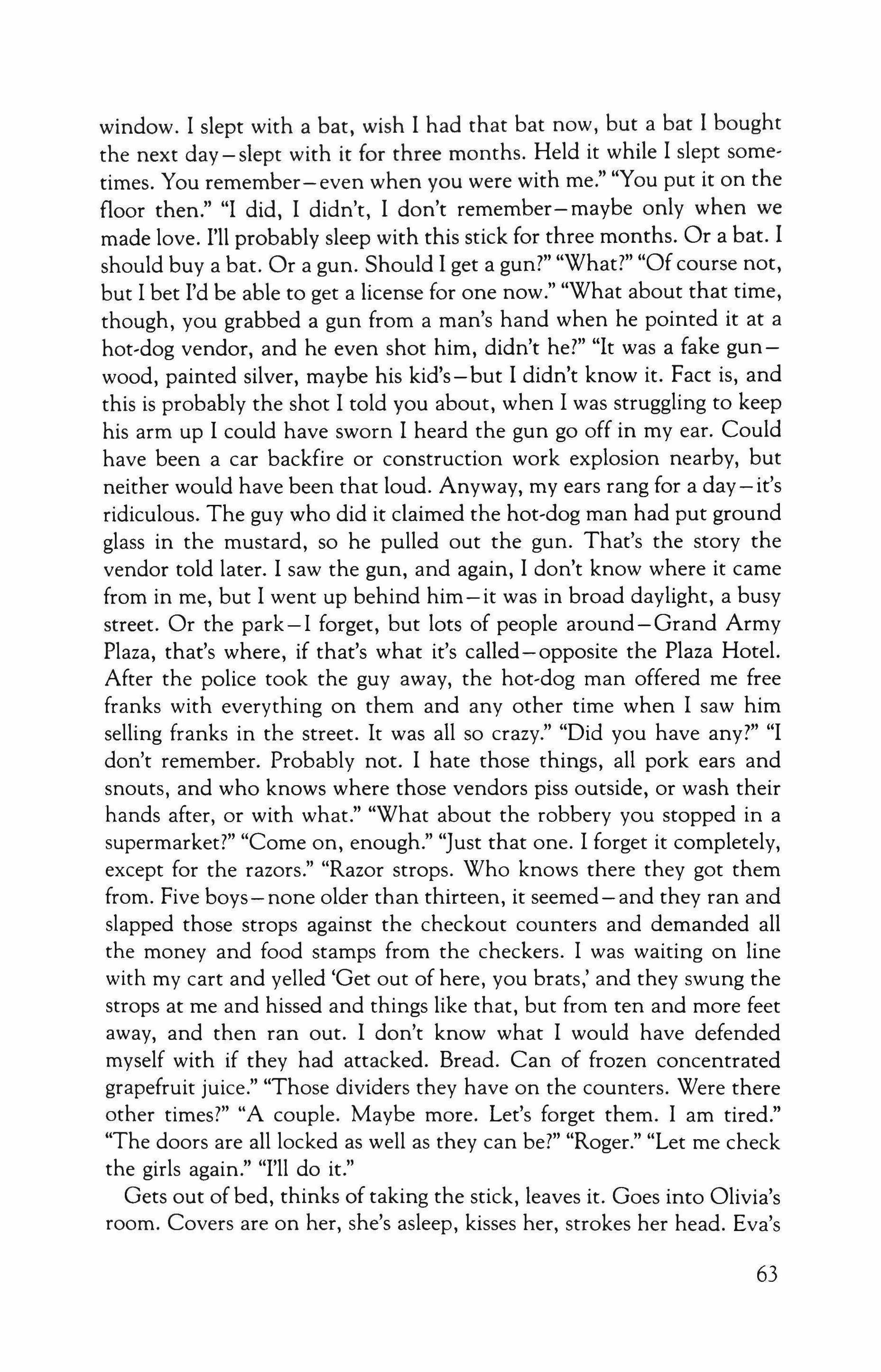
window. I slept with a bat, wish I had that bat now, but a bat I bought the next day - slept with it for three months. Held it while I slept sometimes. You remember-even when you were with me." "You put it on the floor then." "I did, I didn't, I don't remember- maybe only when we made love. I'll probably sleep with this stick for three months. Or a bat. I should buy a bat. Or a gun. Should I get a gun?" "What?" "Of course not, but I bet I'd be able to get a license for one now." "What about that time, though, you grabbed a gun from a man's hand when he pointed it at a hot-dog vendor, and he even shot him, didn't he?" "It was a fake gunwood, painted silver, maybe his kid's-but I didn't know it. Fact is, and this is probably the shot I told you about, when I was struggling to keep his arm up I could have sworn I heard the gun go off in my ear. Could have been a car backfire or construction work explosion nearby, but neither would have been that loud. Anyway, my ears rang for a day-it's ridiculous. The guy who did it claimed the hot-dog man had put ground glass in the mustard, so he pulled out the gun. That's the story the vendor told later. I saw the gun, and again, I don't know where it came from in me, but I went up behind him - it was in broad daylight, a busy street. Or the park-l forget, but lots of people around-Grand Army Plaza, that's where, if that's what it's called-opposite the Plaza Hotel. After the police took the guy away, the hot-dog man offered me free franks with everything on them and any other time when I saw him selling franks in the street. It was all so crazy." "Did you have any?" "I don't remember. Probably not. I hate those things, all pork ears and snouts, and who knows where those vendors piss outside, or wash their hands after, or with what." "What about the robbery you stopped in a supermarket?" "Come on, enough." "Just that one. I forget it completely, except for the razors." "Razor strops. Who knows there they got them from. Five boys-none older than thirteen, it seemed-and they ran and slapped those strops against the checkout counters and demanded all the money and food stamps from the checkers. I was waiting on line with my cart and yelled 'Get out of here, you brats,' and they swung the strops at me and hissed and things like that, but from ten and more feet away, and then ran out. I don't know what I would have defended myself with if they had attacked. Bread. Can of frozen concentrated grapefruit juice." "Those dividers they have on the counters. Were there other times?" "A couple. Maybe more. Let's forget them. I am tired." "The doors are all locked as well as they can be?" "Roger." "Let me check the girls again." "I'll do it."
Gets out of bed, thinks of taking the stick, leaves it. Goes into Olivia's room. Covers are on her, she's asleep, kisses her, strokes her head. Eva's
63
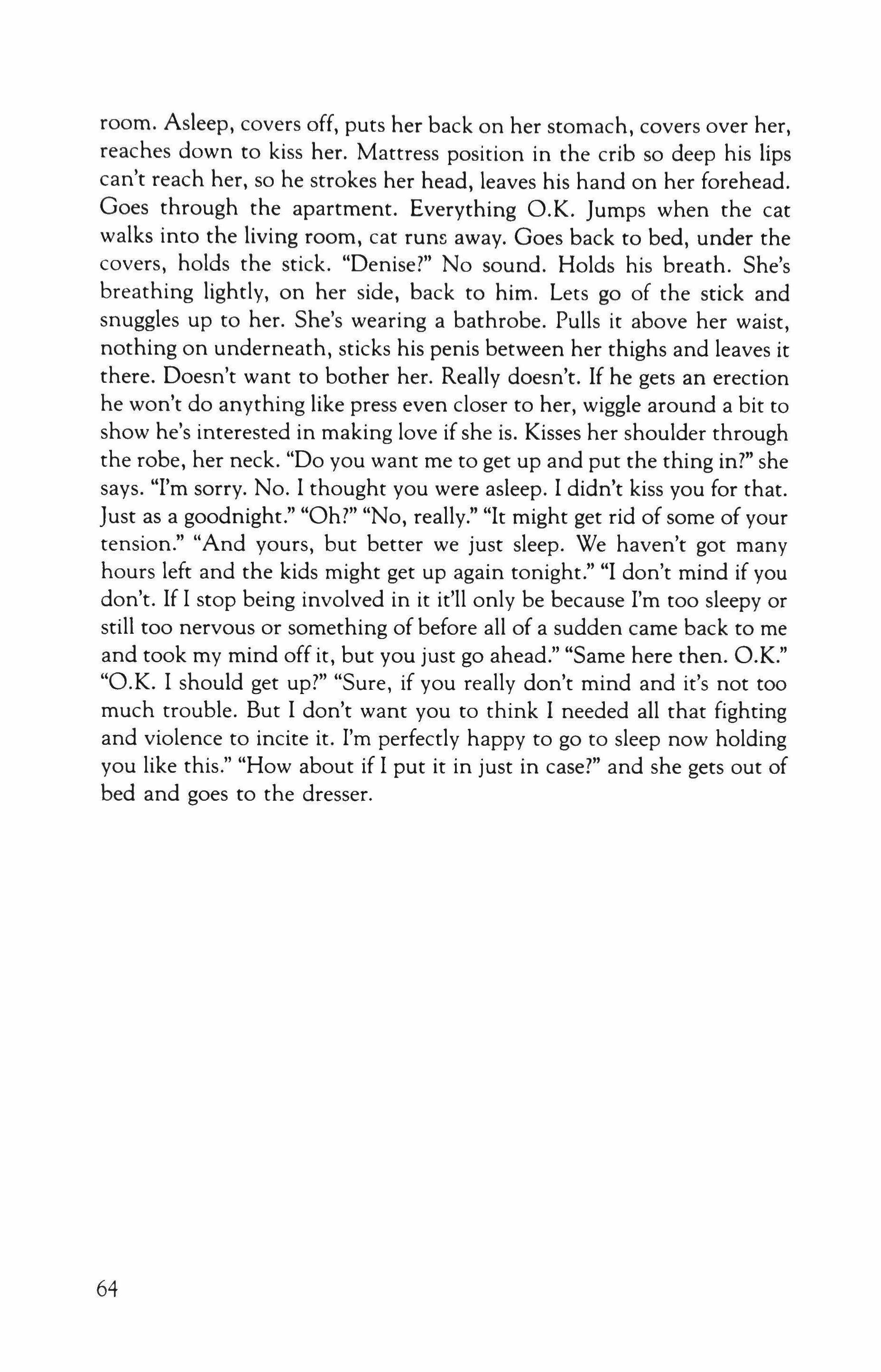
room. Asleep, covers off, puts her back on her stomach, covers over her, reaches down to kiss her. Mattress position in the crib so deep his lips can't reach her, so he strokes her head, leaves his hand on her forehead. Goes through the apartment. Everything O.K. Jumps when the cat walks into the living room, cat rum away. Goes back to bed, under the covers, holds the stick. "Denise?" No sound. Holds his breath. She's breathing lightly, on her side, back to him. Lets go of the stick and snuggles up to her. She's wearing a bathrobe. Pulls it above her waist, nothing on underneath, sticks his penis between her thighs and leaves it there. Doesn't want to bother her. Really doesn't. If he gets an erection he won't do anything like press even closer to her, wiggle around a bit to show he's interested in making love if she is. Kisses her shoulder through the robe, her neck. "Do you want me to get up and put the thing in?" she says. "I'm sorry. No. I thought you were asleep. I didn't kiss you for that. Just as a goodnight." "Oh?" "No, really." "It might get rid of some of your tension." "And yours, but better we just sleep. We haven't got many hours left and the kids might get up again tonight." "I don't mind if you don't. If I stop being involved in it it'll only be because I'm too sleepy or still too nervous or something of before all of a sudden came back to me and took my mind off it, but you just go ahead." "Same here then. O.K." "O.K. I should get up?" "Sure, if you really don't mind and it's not too much trouble. But I don't want you to think I needed all that fighting and violence to incite it. I'm perfectly happy to go to sleep now holding you like this." "How about if I put it in just in case?" and she gets out of bed and goes to the dresser.
64
The Curate: A Chapter from a Novel in Progress
Timothy Dekin
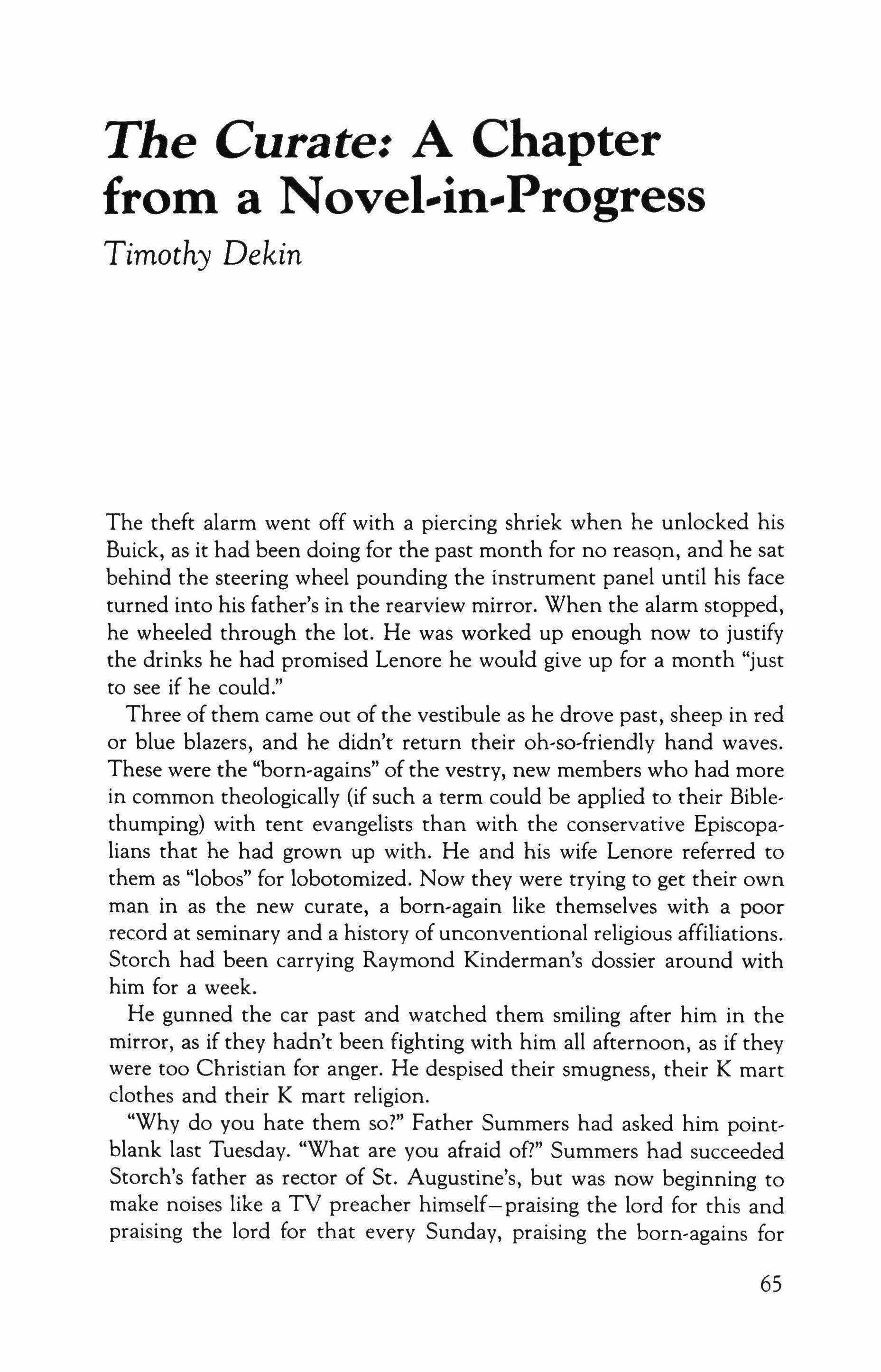
The theft alarm went off with a piercing shriek when he unlocked his Buick, as it had been doing for the past month for no reason, and he sat behind the steering wheel pounding the instrument panel until his face turned into his father's in the rearview mirror. When the alarm stopped, he wheeled through the lot. He was worked up enough now to justify the drinks he had promised Lenore he would give up for a month "just to see if he could."
Three of them came out of the vestibule as he drove past, sheep in red or blue blazers, and he didn't return their oh-so-friendlv hand waves. These were the "born-agains" of the vestry, new members who had more in common theologically (if such a term could be applied to their Bible, thumping) with tent evangelists than with the conservative Episcopalians that he had grown up with. He and his wife Lenore referred to them as "lobos" for lobotomized. Now they were trying to get their own man in as the new curate, a born,again like themselves with a poor record at seminary and a history of unconventional religious affiliations. Storch had been carrying Raymond Kinderman's dossier around with him for a week.
He gunned the car past and watched them smiling after him in the mirror, as if they hadn't been fighting with him all afternoon, as if they were too Christian for anger. He despised their smugness, their K mart clothes and their K mart religion.
"Why do you hate them so?" Father Summers had asked him point, blank last Tuesday. "What are you afraid of?" Summers had succeeded Storch's father as rector of St. Augustine's, but was now beginning to make noises like a TV preacher himself-praising the lord for this and praising the lord for that every Sunday, praising the born-agains for
65
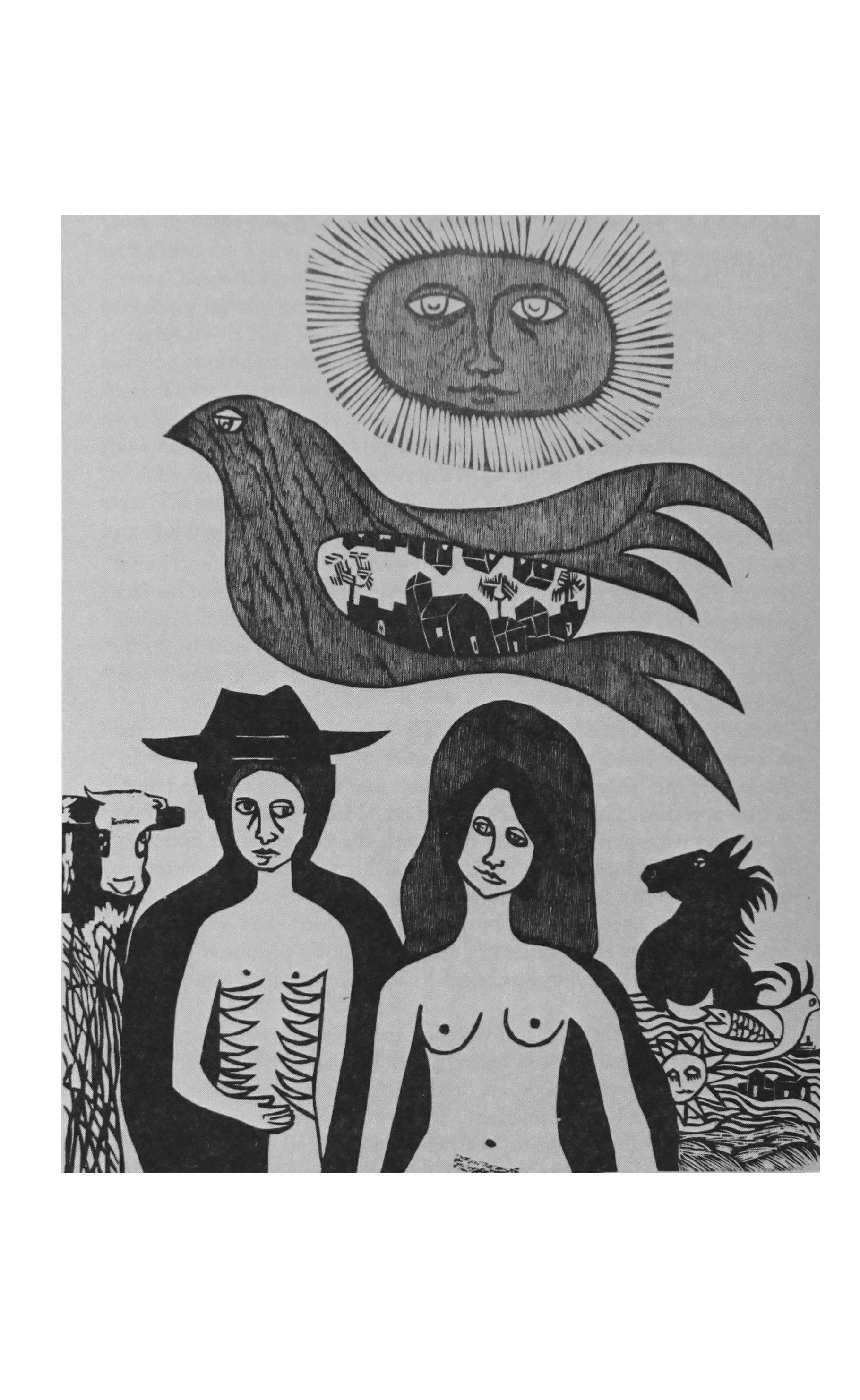
• • •
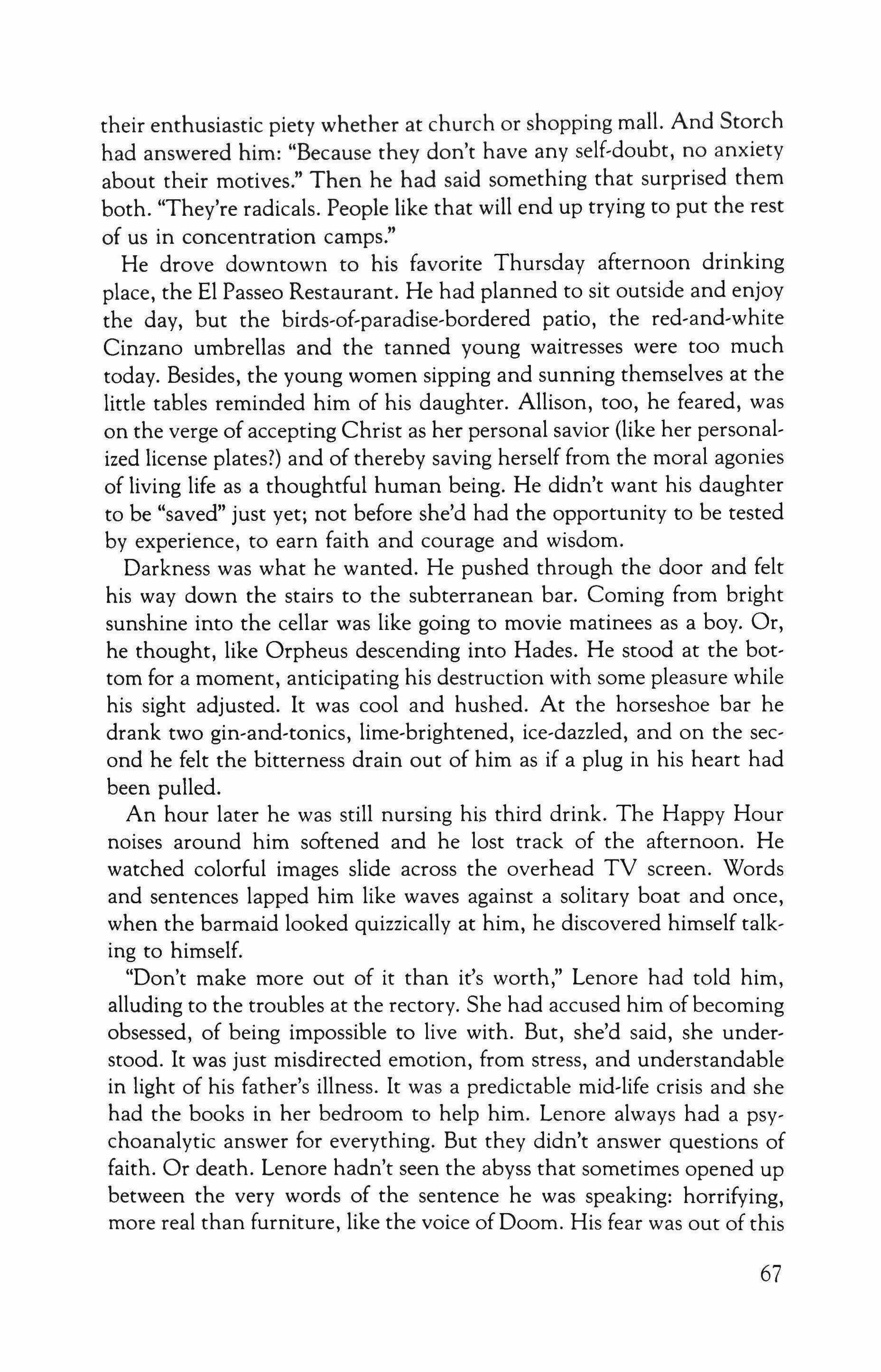
their enthusiastic piety whether at church or shopping mall. And Storch had answered him: "Because they don't have any self-doubt, no anxiety about their motives." Then he had said something that surprised them both. "They're radicals. People like that will end up trying to put the rest of us in concentration camps."
He drove downtown to his favorite Thursday afternoon drinking place, the EI Passeo Restaurant. He had planned to sit outside and enjoy the day, but the birds-of-paradise-bordered patio, the red-and-white Cinzano umbrellas and the tanned young waitresses were too much today. Besides, the young women sipping and sunning themselves at the little tables reminded him of his daughter. Allison, too, he feared, was on the verge of accepting Christ as her personal savior (like her personalized license plates?) and of thereby saving herself from the moral agonies of living life as a thoughtful human being. He didn't want his daughter to be "saved" just yeti not before she'd had the opportunity to be tested by experience, to earn faith and courage and wisdom.
Darkness was what he wanted. He pushed through the door and felt his way down the stairs to the subterranean bar. Coming from bright sunshine into the cellar was like going to movie matinees as a boy. Or, he thought, like Orpheus descending into Hades. He stood at the bottom for a moment, anticipating his destruction with some pleasure while his sight adjusted. It was cool and hushed. At the horseshoe bar he drank two gin-and-tonics, lime-brightened, ice-dazzled, and on the second he felt the bitterness drain out of him as if a plug in his heart had been pulled.
An hour later he was still nursing his third drink. The Happy Hour noises around him softened and he lost track of the afternoon. He watched colorful images slide across the overhead TV screen. Words and sentences lapped him like waves against a solitary boat and once, when the barmaid looked quizzically at him, he discovered himself talking to himself.
"Don't make more out of it than it's worth," Lenore had told him, alluding to the troubles at the rectory. She had accused him of becoming obsessed, of being impossible to live with. But, she'd said, she understood. It was just misdirected emotion, from stress, and understandable in light of his father's illness. It was a predictable mid-life crisis and she had the books in her bedroom to help him. Lenore always had a psychoanalytic answer for everything. But they didn't answer questions of faith. Or death. Lenore hadn't seen the abyss that sometimes opened up between the very words of the sentence he was speaking: horrifying, more real than furniture, like the voice of Doom. His fear was out of this
67

world. "Talk to a therapist, please," she'd told him. "Talk to God," his ingrown, ossified heart told him.
"Born again," he said to the barmaid as he finished his drink. His face in the mirror looked softer, more youthful. "I'm born again."
"Better watch out," the barmaid said, wiping her way along the mahogany bar with a folded rag. She lifted his glass and wiped beneath it, then put a new cocktail napkin down. "They're coming out of the woodwork these days." She glanced over at three men who had pulled their barstools out in a semicircle beneath the TV. "Jerry Falwell will have you on his hit list."
Storch recognized the men as belonging to the army of network people who frequented the bar, out-of-towners covering the western White House in Santa Barbara.
"My father's a Knights of Columbus," she said. "I don't have anything against religion, but I think a person ought to pray to themself, don't you? I mean, who are they trying to convince? And the money people send in!"
Storch nodded his head, his mouth half full of Gordon's and ice, and reached into his inside coat pocket for the notecards he had used at the vestry meeting.
"You know what 'religious enthusiasm' is?" he asked. "No."
"It's what all these fundamentalists are full of. My wife and I call them 'lobos' for lobotomized. They think Jesus picked them out special. You know what Samuel Johnson said about religious enthusiasm?"
"I know you're going to tell me," she laughed.
"He said it was 'a vain confidence of divine favor or communication.' Does that sound familiar?"
"Do you have to give a speech or something?"
"And another Anglican minister warned his congregation ." He picked out another notecard to read: "'Enthusiasm is catching, especially when it is very eloquent.' And listen to this: 'If ever Christianity be eliminated it will be by religious enthusiasm.'
"Wow," she said. "I've got to slice limes. But I'll be back."
Storch sat alone at his end of the bar, the Happy Hour crowd having thinned out. He looked at the notecards soaking up spilled liquor on the bar and tried to remember exactly what he had said at the meeting.
"Mr. Storch, you have a phone call," the barmaid called to him. When he reminded her that he 'wasn't there,' she brightened and went to pass the lie on to his wife, more secure, Storch supposed, in her role as an
68
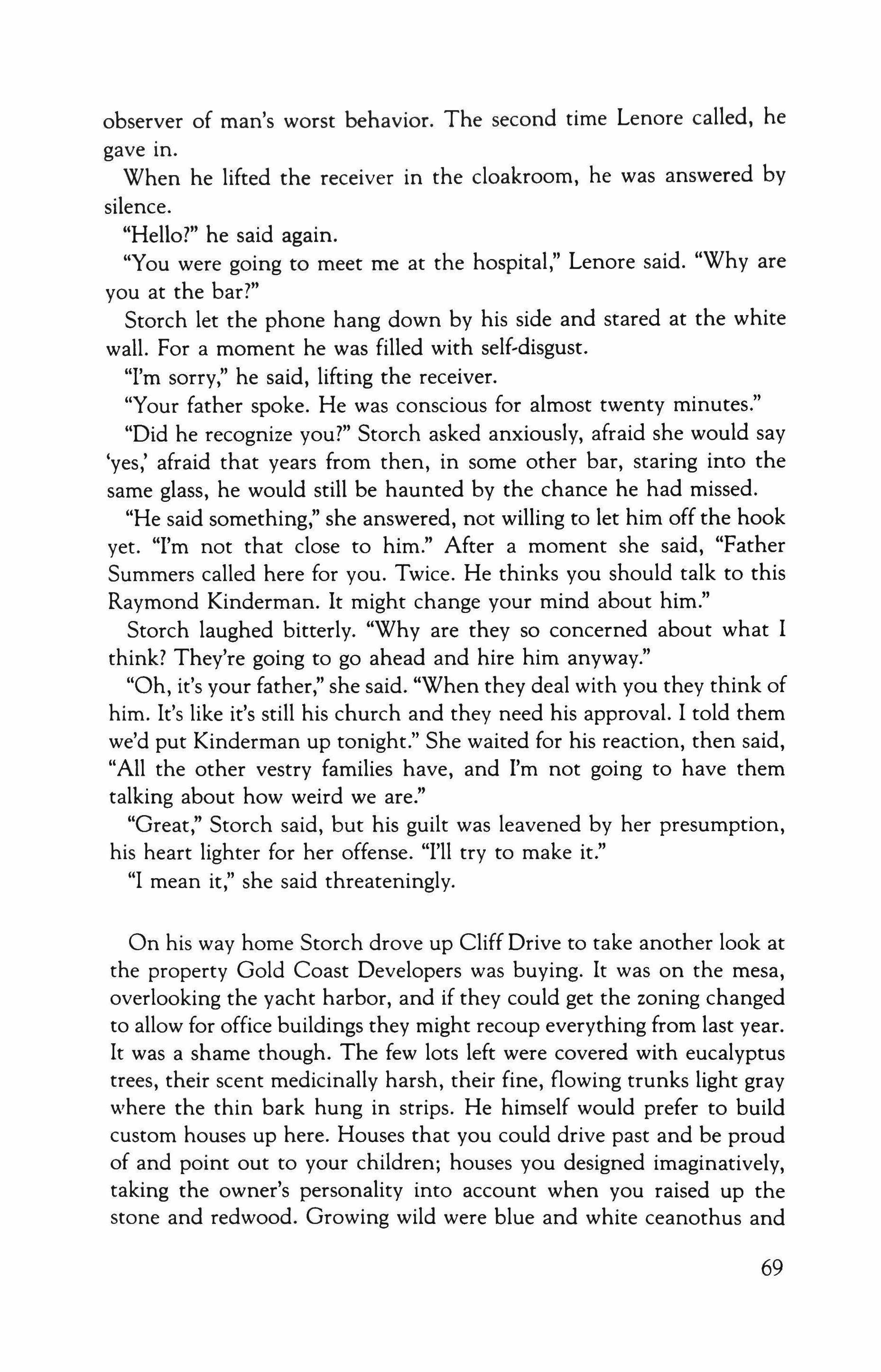
observer of man's worst behavior. The second time Lenore called, he gave in.
When he lifted the receiver in the cloakroom, he was answered by silence.
"Hello?" he said again.
"You were going to meet me at the hospital," Lenore said. "Why are you at the bar?"
Storch let the phone hang down by his side and stared at the white wall. For a moment he was filled with self-disgust.
"I'm sorry," he said, lifting the receiver.
"Your father spoke. He was conscious for almost twenty minutes."
"Did he recognize you?" Storch asked anxiously, afraid she would say 'yes,' afraid that years from then, in some other bar, staring into the same glass, he would still be haunted by the chance he had missed.
"He said something," she answered, not willing to let him off the hook yet. "I'm not that close to him." After a moment she said, "Father Summers called here for you. Twice. He thinks you should talk to this Raymond Kinderman. It might change your mind about him."
Storch laughed bitterly. "Why are they so concerned about what I think? They're going to go ahead and hire him anyway."
"Oh, it's your father," she said. "When they deal with you they think of him. It's like it's still his church and they need his approval. I told them we'd put Kinderman up tonight." She waited for his reaction, then said, "All the other vestry families have, and I'm not going to have them talking about how weird we are."
"Great," Storch said, but his guilt was leavened by her presumption, his heart lighter for her offense. "I'll try to make it."
"I mean it," she said threateningly.
On his way home Storch drove up Cliff Drive to take another look at the property Gold Coast Developers was buying. It was on the mesa, overlooking the yacht harbor, and if they could get the zoning changed to allow for office buildings they might recoup everything from last year. It was a shame though. The few lots left were covered with eucalyptus trees, their scent medicinally harsh, their fine, flowing trunks light gray where the thin bark hung in strips. He himself would prefer to build custom houses up here. Houses that you could drive past and be proud of and point out to your children; houses you designed imaginatively, taking the owner's personality into account when you raised up the stone and redwood. Growing wild were blue and white ceanothus and
69

low manzanita bushes, rosy-stemmed and waxy-green. Once he had gotten into a fight with a subcontractor who had trampled bushes.
But that was in the old days. Through the sharp silver-dusted leaves he saw the Pacific, dark blue, then even darker where the thin white tracks of abalone boats headed out to the Channel Islands. He shivered a little and rolled up the car window. Life was a catalog of losses. Your values got lost one morning while you were knotting your tie. Your children couldn't care less what you did for a living, provided the money was there. Then your father died. Then you did.
"That's a value judgment," Allison was saying when he entered the kitchen, as if she had caught her mother doing something shameful.
"We were just talking about the new curate, Mr. Kinderman," Lenore said. "He says things like 'Satan's a-quakin' and a-shakin' in his den:
"He's going to be sleeping in the room next to us tonight," Storch said.
"Maybe he really has found the Lord," Allison said.
"Maybe he really has found the Lord," Storch mimicked her.
"What is the matter with you?" Allison cried.
"What's it mean?" Storch said, keeping it up.
"It means he's accepted Christ as his personal savior, all right?"
"What does that mean?"
Allison looked helplessly at her mother, who was about to come to her defense, then rushed out of the room.
"And get off my case!" they heard Allison scream from the stairs. Lenore let cold water from the tap crack over an ice cube tray. "You?" she asked, filling two glasses.
"It's a drug," Storch said.
"Pardon me?"
"Being saved. It's just a drug. Forget envy and greed and feeling superior. I'm saved, right," he demanded. "I don't have to worry about anything anymore. I'm just doing the Lord's will. Especially forget intelligence. Vodka tonic."
"You know Eleanor Davis," Lenore said. "She told me about their flight being delayed in Houston last week. They were going to miss Janet's wedding in Fort Worth. She couldn't understand how God could let the airport get fogged in just then. Well, they missed the wedding, but in the meantime Eleanor went shopping at Neiman-Marcus and found this one-of-a-kind lynx stole. 'God works in mysterious ways,' she told me. She was serious, too."
She told the story so eagerly that Storch knew she was humoring him. Like a child?
70

Allison appeared in the doorway with a different dress on, a flower print pattern with padded shoulders.
"You just want to hang onto your own negativity," Allison said to him calmly. "What you see is what you get."
Storch set his drink down. "No, I just don't want to put everyone else in a concentration camp because they don't agree with me."
"Concentration camp?" she laughed. "Just listen to yourself. You're just jealous of them because they're happy and you're not. You hate everything, including yourself. You don't even love your own daughter." Her voice rose and tears came to her eyes.
Before he could deny this, she turned and was gone again, the last word hers. Probably to change clothes again, Storch thought. When was the last time they had prayed together, he wondered suddenly. A year ago? Two? He considered calling Allison back and insisting that all three of them kneel down right there and then and say the Lord's prayer. They would hold a conversation with God, a talk in which they would speak, not at odds with one another, but with one voice. There would be no between-the-lines accusations or recriminations. He was about to call her name when he noticed the drink in his hand. He realized his impulse was an inebriated one: he saw the three of them kneeling on the kitchen floor, Lenore embarrassed, Allison rolling her eyes in exaggerated despair, and himself slurring the words as he led them. He laughed. Well, at least they weren't hypocrites: they faced the fact that there was bitterness between them. They didn't try to cover it up or wish it away. They accepted the reality of the world. Unlike Kinderman.
Kinderman was coming to dinner. He wanted to look at the man's dossier one more time just to see, in an objective way and out of curiosity, if the actual man would be what one would expect from reading his folder. When he went upstairs to look for his briefcase, Allison was in her room reading. He hesitated outside her door.
"I'm sorry, pet," he said, entering. She looked up at him from the bed. Her hair fell over her shoulders like honey, her face calm and vulnerable, unlocked by the page. The set expression of dissatisfaction that was a part of the young woman she played seemed dissolved in the lamplight, and she looked like his child once again.
"It's all right. I know you're worried about Grandpa."
She was trying to hide what she was reading under the covers but when she saw her father staring, she handed the manila folder over. At first Storch didn't know what it was. Then he saw it was Kinderman's file. He wondered if he had thought of Kinderman downstairs at the exact moment she was opening his dossier. He was always catching her
71
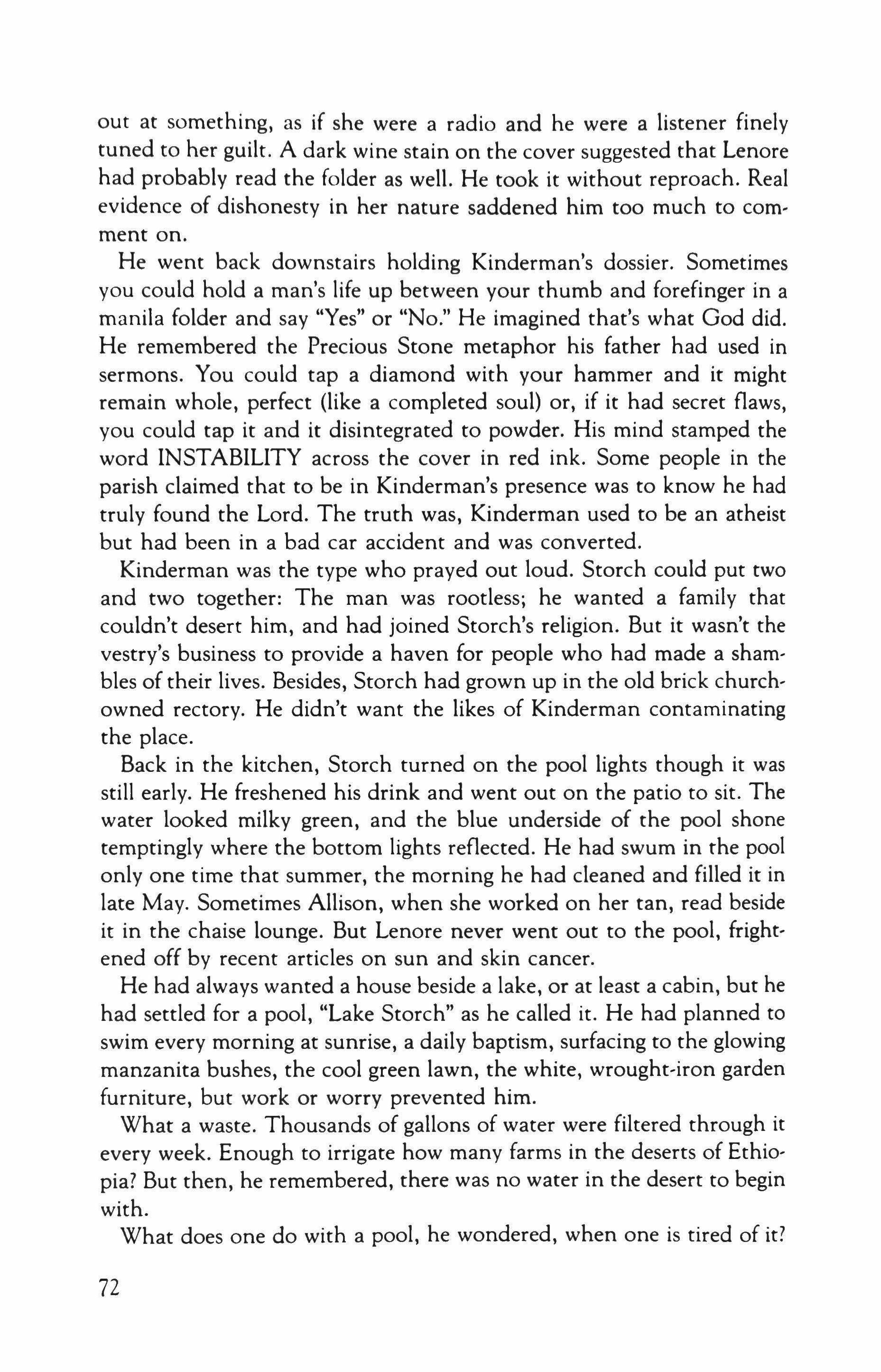
out at something, as if she were a radio and he were a listener finely tuned to her guilt. A dark wine stain on the cover suggested that Lenore had probably read the folder as well. He took it without reproach. Real evidence of dishonesty in her nature saddened him too much to comment on.
He went back downstairs holding Kinderman's dossier. Sometimes you could hold a man's life up between your thumb and forefinger in a manila folder and say "Yes" or "No." He imagined that's what God did. He remembered the Precious Stone metaphor his father had used in sermons. You could tap a diamond with your hammer and it might remain whole, perfect (like a completed soul) or, if it had secret flaws, you could tap it and it disintegrated to powder. His mind stamped the word INSTABILITY across the cover in red ink. Some people in the parish claimed that to be in Kinderman's presence was to know he had truly found the Lord. The truth was, Kinderman used to be an atheist but had been in a bad car accident and was converted.
Kinderman was the type who prayed out loud. Storch could put two and two together: The man was rootless; he wanted a family that couldn't desert him, and had joined Storch's religion. But it wasn't the vestry's business to provide a haven for people who had made a shambles of their lives. Besides, Storch had grown up in the old brick churchowned rectory. He didn't want the likes of Kinderman contaminating the place.
Back in the kitchen, Storch turned on the pool lights though it was still early. He freshened his drink and went out on the patio to sit. The water looked milky green, and the blue underside of the pool shone temptingly where the bottom lights reflected. He had swum in the pool only one time that summer, the morning he had cleaned and filled it in late May. Sometimes Allison, when she worked on her tan, read beside it in the chaise lounge. But Lenore never went out to the pool, frightened off by recent articles on sun and skin cancer.
He had always wanted a house beside a lake, or at least a cabin, but he had settled for a pool, "Lake Storch" as he called it. He had planned to swim every morning at sunrise, a daily baptism, surfacing to the glowing manzanita bushes, the cool green lawn, the white, wrought-iron garden furniture, but work or worry prevented him.
What a waste. Thousands of gallons of water were filtered through it every week. Enough to irrigate how many farms in the deserts of Ethiopia? But then, he remembered, there was no water in the desert to begin with.
What does one do with a pool, he wondered, when one is tired of it?
72

You can't sell it at a garage sale. You can't hide it. A pool was one of those irreversible choices one made in life in which you never considered the consequences. It was like getting married. Or having a child. Or not. In fact, having a pool built was like choosing a faith. It just wasn't something you thought you'd ever change your mind about.
He looked out over the shimmering little waves made by the side jets. Suddenly he felt like taking off his clothes and diving in the deep end, where the water slanted down to its darkest green. Better yet, he would turn the lights off. He would throw something in - the brass hose nozzle-then dive for it on the bottom. It was a game he had played as a boy, when his father had stood on the dock at Cedar Lake and thrown quarters in for him to find.
He had recalled the scene often. When the coin hit the water he would follow it, his eyes open underwater, as it glittered and swung back and forth in slow descent. He would glide over the sandy bottom until he spotted the blurred jewel, then he would grab, clutch it over his head as he broke the surface-like a lost treasure, like the answer to a secret. But then, he remembered, it hadn't really been his father who had thrown the coin at all, but his uncle.
He leaned over the side of the pool and tested the water with his fingers. It was too cold for swimming. His father lay on the terminal ward with a bed sore in his back big enough to put your fist in. You could see the spine when they changed the dressing. But where was the offsetting, deeper meaning-beyond the flesh and bone? He tried to visualize the figure of Satan "a-quakin' and a-shakin' in his den" but the cartoon offered little solace. Worse yet, he saw himself kneeling at the pew and he, too, was a cartoon character.
Raymond Kinderman was in the Storch's guest room an hour later unpacking his green nylon backpack. Theirs was the third home at which he had stayed on his interview and get-acquainted visit, but the first at which he felt disliked. Mrs. Storch had seemed very cold towards him. He took out a small standing crucifix, an incense saucer, and a silver-framed picture of his mother and arranged them on the bedside table-a ritual for feeling at home in strange rooms. He hung his coat and already-wrinkled pants in the closet so they would be presentable for dinner, then sat, back to the wall, on the narrow child's bed.
Kinderman's wife had left him for refusing to sleep in the same room with her, or to eat her cooking, when she was having her menstrual period. That had seemed a pretty clear karmic indication that he should devote himself to a life of celibacy. For a while he had been a teacher
73
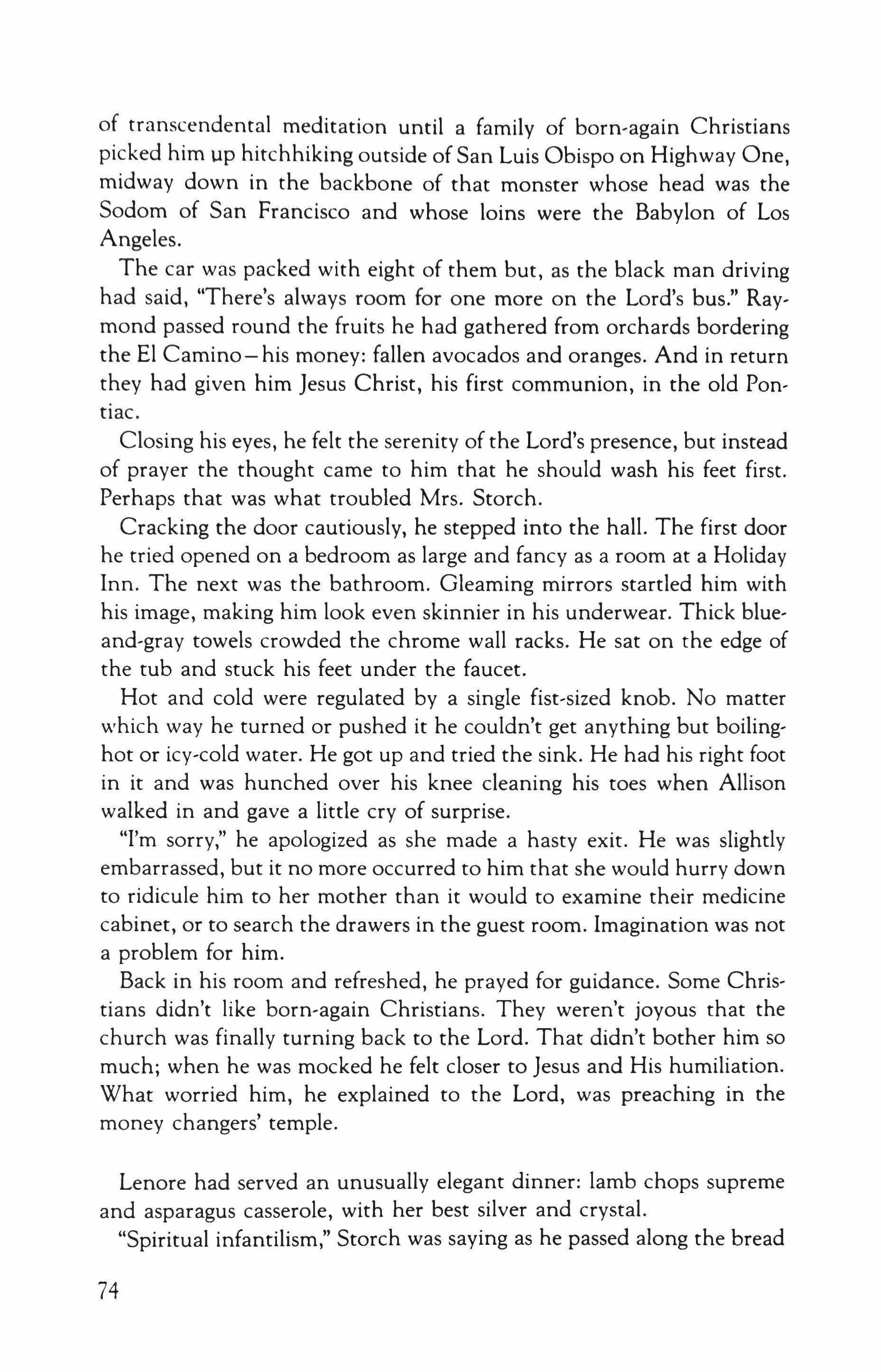
of transcendental meditation until a family of born-again Christians picked him up hitchhiking outside of San Luis Obispo on Highway One, midway down in the backbone of that monster whose head was the Sodom of San Francisco and whose loins were the Babylon of Los Angeles.
The car was packed with eight of them but, as the black man driving had said, "There's always room for one more on the Lord's bus." Raymond passed round the fruits he had gathered from orchards bordering the El Camino - his money: fallen avocados and oranges. And in return they had given him Jesus Christ, his first communion, in the old Pontiac.
Closing his eyes, he felt the serenity of the Lord's presence, but instead of prayer the thought came to him that he should wash his feet first. Perhaps that was what troubled Mrs. Storch.
Cracking the door cautiously, he stepped into the hall. The first door he tried opened on a bedroom as large and fancy as a room at a Holiday Inn. The next was the bathroom. Gleaming mirrors startled him with his image, making him look even skinnier in his underwear. Thick blueand-gray towels crowded the chrome wall racks. He sat on the edge of the tub and stuck his feet under the faucet.
Hot and cold were regulated by a single fist-sized knob. No matter which way he turned or pushed it he couldn't get anything but boilinghot or icy-cold water. He got up and tried the sink. He had his right foot in it and was hunched over his knee cleaning his toes when Allison walked in and gave a little cry of surprise.
"I'm sorry," he apologized as she made a hasty exit. He was slightly embarrassed, but it no more occurred to him that she would hurry down to ridicule him to her mother than it would to examine their medicine cabinet, or to search the drawers in the guest room. Imagination was not a problem for him.
Back in his room and refreshed, he prayed for guidance. Some Christians didn't like born-again Christians. They weren't joyous that the church was finally turning back to the Lord. That didn't bother him so much; when he was mocked he felt closer to Jesus and His humiliation. What worried him, he explained to the Lord, was preaching in the money changers' temple.
Lenore had served an unusually elegant dinner: lamb chops supreme and asparagus casserole, with her best silver and crystal.
"Spiritual infantilism," Storch was saying as he passed along the bread
74

and covered dishes. "That's the church's number one problem, not Satan."
Kinderman smiled brightly and helped himself. Storch had expected someone seedier-looking, the TV preacher's beaming face half shadowed by poor makeup. Kinderman had ginger-colored hair, cut short, and wore a rack three-piece suit of robin's-egg blue. He reminded Storch of one of those Mormon missionaries one sees pedaling around on their ten-speed bikes.
For a moment Storch resisted being mean to him. Kinderman had a nice smile, and he nodded his head a lot, quick little nods of agreement or incomprehension. Something about his air of innocence made Storch want to test it, poke it to see how far the softness would go, like a bad child with a pet. He looked over at Lenore and her expression told him that she was going to ally herself with her husband.
"How do you find Parker Grove?" she interrupted, smiling. "Do you think you can wean us from our Better Homes and Gardens and get us back to Psalms?"
"It's very nice," Kinderman replied.
"Speaking of homes and gardens," she said, "Do you think your wife will like it? - that is if you're asked to stay. Or are you still unmarried?"
Kinderman was separating the asparagus from the lamb with the edge of his dessert fork. "I'm divorced," he admitted. "But I believe in the family," he added hurriedly. "It was before I found the Lord."
"How did it happen?" Lenore asked sweetly.
"There was a car accident. Afterwards "
"No, I mean with your wife."
"She went away. But it was before I found "The Lord," Storch finished for him.
"Allison," he said, "Raymond used to be a member of the Hare Krishna. Or was it Reverend Moon? I forget what Pastor Williamson said. Allison used to practice biofeedback to improve her grades."
"Speed reading," Allison corrected him with a look of disgust.
"How did you find the Lord?" Lenore asked.
"Why don't we just eat?" Allison said.
"I'll tell you how I found the Lord," Storch said. He poured himself a full glass of Almaden.
Behind him, through the sliding glass doors that opened on the patio and pool, Kinderman could see an oak tree and tried to center his consciousness by staring at it.
"I'm not hungry," Allison said. "Would you please excuse me, Mr. Kinderman?" She left without looking at her father.
75

"We had a little boy who was born damaged," Storch continued. Lenore folded her napkin carefully and put it alongside her plate.
"I'd better see what's wrong," she apologized to Kinderman. "Allison's grandfather, Reverend Storch, is very ill. We've had a difficult week."
"Down's Syndrome." Storch remembered that he'd had to ask the doctor what that was, naively thinking that the baby had no more wrong with him than a minor infection or some such thing. The doctor's after-shave lotion had bothered him. The scent had seemed indecorous in the sterilized and gleaming corridor.
"He was Mongoloid. There was a small hole in his heart too. They probably could have repaired that," he conceded. "But the doctors said it might not be the kindest thing to do. We were young. Lenore was twenty-two. We wanted to travel, that sort of thing."
"What else could you do?" Kinderman said sympathetically.
The dining room was half in shadows. Storch picked up the matches from the white linen tablecloth and lighted the two candles Lenore had forgotten. He continued tearing matches distractedly from the folder and dropping them unlit on his plate.
"For months, five or six times a day, I'd get the Bible and reread the story of Abraham and Isaac. I could see the story was there for me. There's a center for retarded kids on Roosevelt Drive. I go in there sometimes and watch them playing, look in on the classrooms. I didn't know there are degrees of learning disability, of course."
"Surely it was God's will," Kinderman said warily.
"That's what I kept saying to myself. Jesus wants the baby back with him. That's what I said to Lenore. So we let it die."
He looked evenly at Kinderman and squared his shoulders, as if he were letting the younger man know how difficult the reminiscence was for him, yet how willing he was to face it. Storch lit a match and held it up. "It was God's will, not mine. I believe that," he said and touched the flame to the little pile of matchheads on his plate. "Or everything goes." They watched the pile flare suddenly and then subside.
"If I didn't believe it, I'd take my savings out of the bank, drive to San Francisco, get a nice room with a cable TV and drink myself to death." He laughed. "Has anything ever happened to you?"
"I don't mean any disrespect or anything," Kinderman said, "but maybe you think too much. People get tired sometimes. They give in to negative thoughts."
"That's not a problem for you," Storch said, smiling. "You're right. I think I'll go swimming and forget about it." He stood up, then looked down at Kinderman's plate. "But you haven't eaten your dinner."
76

"I ate the vegetables," Kinderman said sheepishly. "I should have said something. I'm a vegetarian."
"Ah," Storch said and snatched the plate away. "In that case we'll just throw this expensive meat away." He walked away, but turned in the kitchen doorway, a fierce smile on his face. "We'll just throw it in the fucking garbage, right?"
When he had left the room, Kinderman sat perfectly still in his chair, afraid lest any movement on his part upset the fragile silence and re-alert Storch to his presence. He exiled the man from his mind so that not so much as a thought should draw him back. Before him were the family's untouched plates, the sauces congealing on the lumped food.
He couldn't stay in this house. He couldn't go to the rectory and ask for sanctuary either, for that would be admitting defeat. He didn't have enough money for a hotel, or credit cards. Thirty-two years old and he had never had a credit card, a fact that only now, in the company of people like the Storches, made him feel ashamed.
He heard the back door slam, then saw Storch through the sliding glass at poolside. He had a drink in one hand and in the other Kinderman's half-filled dinner plate. He watched as Storch raised the food above his head and threw it into the center of the pool.
He was up in a flash and climbing the stairs for his backpack when he bumped into Allison corning down.
"Please tell my father I've gone," she said. "If he asks where just tell him that some people still care about their families." She was dressed in black, and as she swept by him her shawl flicked his face.
In the backyard the crickets had begun chorusing in earnest. Storch stood by the pool staring into the pale green water and wondering who he was. It had been an obscene thing to do. The waters were filthied by brown gravy and small gray mushroom slices. The meat floated at the edge, bobbed, then slowly sank. He finished his drink in a gulp and it seemed to unlock something in him.
There was no turning back. The stupid display of temper seemed to exact a truth from him, a hint of what he could expect from himself in the future. Afterwards he could apologize to Lenore. Stooping lazily, he picked up the first Mexican pot with its pink and red geraniums and shot-put it towards the deep end of the pool. It landed with a whump, broke up, sent a lovely splash. The dirt turned to chocolate around the sterns and flowers and trailed downwards.
He was reaching for the second when he felt a presence behind him and half-turned to see Kinderman outlined in the kitchen doorway.
77
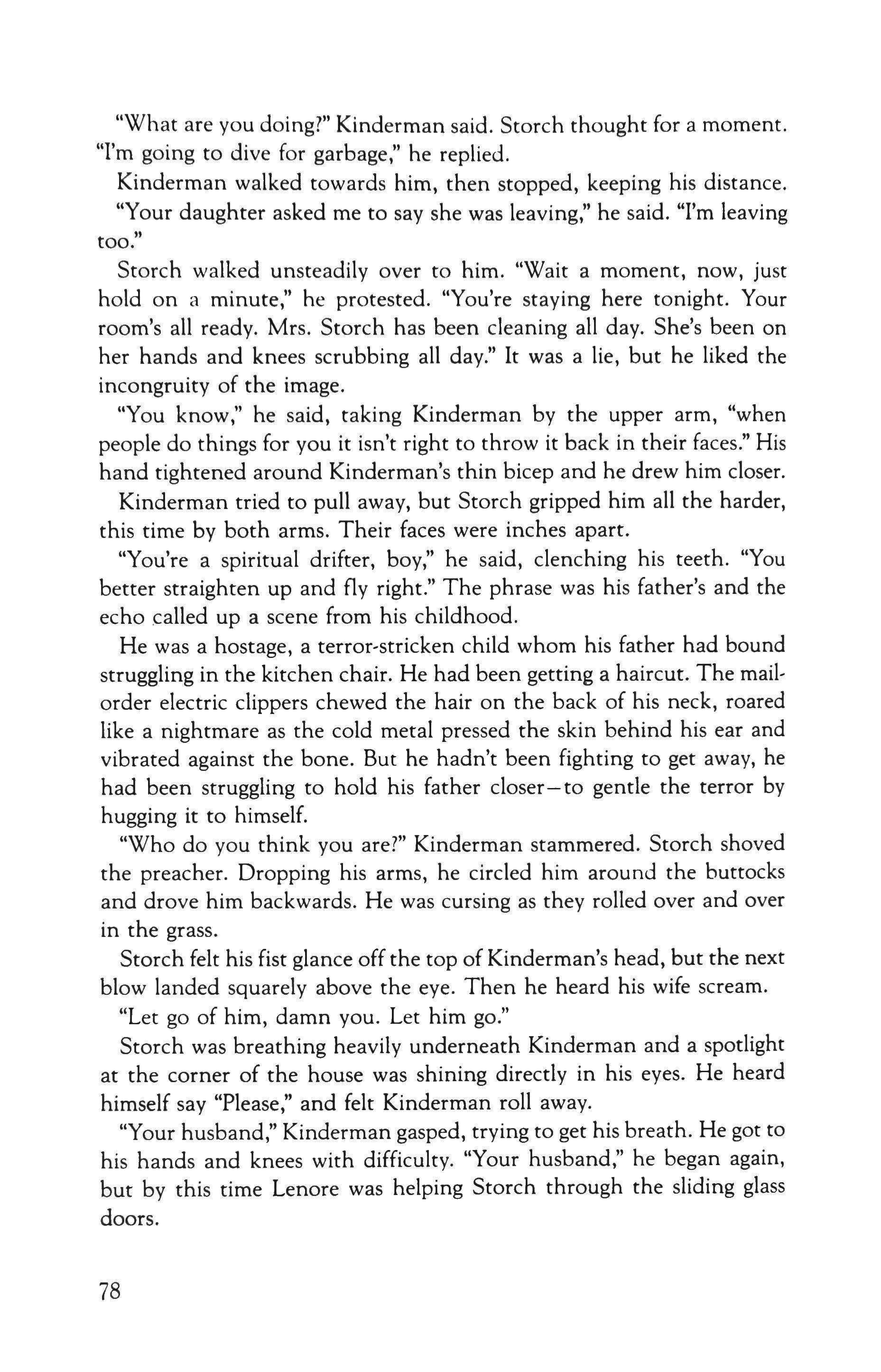
"What are you doing?" Kinderman said. Storch thought for a moment. "I'm going to dive for garbage," he replied.
Kinderman walked towards him, then stopped, keeping his distance. "Your daughter asked me to say she was leaving," he said. "I'm leaving too."
Storch walked unsteadily over to him. "Wait a moment, now, just hold on a minute," he protested. "You're staying here tonight. Your room's all ready. Mrs. Storch has been cleaning all day. She's been on her hands and knees scrubbing all day." It was a lie, but he liked the incongruity of the image.
"You know," he said, taking Kinderman by the upper arm, "when people do things for you it isn't right to throw it back in their faces." His hand tightened around Kinderman's thin bicep and he drew him closer.
Kinderman tried to pull away, but Storch gripped him all the harder, this time by both arms. Their faces were inches apart.
"You're a spiritual drifter, boy," he said, clenching his teeth. "You better straighten up and fly right." The phrase was his father's and the echo called up a scene from his childhood.
He was a hostage, a terror-stricken child whom his father had bound struggling in the kitchen chair. He had been getting a haircut. The mailorder electric clippers chewed the hair on the back of his neck, roared like a nightmare as the cold metal pressed the skin behind his ear and vibrated against the bone. But he hadn't been fighting to get away, he had been struggling to hold his father closer- to gentle the terror by hugging it to himself.
"Who do you think you are?" Kinderman stammered. Storch shoved the preacher. Dropping his arms, he circled him around the buttocks and drove him backwards. He was cursing as they rolled over and over in the grass.
Storch felt his fist glance off the top of Kinderman's head, but the next blow landed squarely above the eye. Then he heard his wife scream.
"Let go of him, damn you. Let him go."
Storch was breathing heavily underneath Kinderman and a spotlight at the corner of the house was shining directly in his eyes. He heard himself say "Please," and felt Kinderman roll away.
"Your husband," Kinderman gasped, trying to get his breath. He got to his hands and knees with difficulty. "Your husband," he began again, but by this time Lenore was helping Storch through the sliding glass doors.
78

Fifteen minutes later, order had been restored in the Storch household. Kinderman was sitting on a high stool, gripping the seat in pain, with his head bowed over the kitchen sink. Lenore was administering to the cut on his forehead, trying to pick the hair from it with a pair of tweezers before she applied the bandage.
"Ow!" Kinderman cried.
"I'm sorry," she said.
"Your husband has a drinking problem, doesn't he?"
"He's been under a lot of strain lately." She held the wound open and swabbed hydrogen peroxide in it. "Your head's not too bad. It doesn't need stitches. If you comb your hair down over the bandage no one will even notice it."
"Father Summers will ask. I'm supposed to preach tomorrow."
"This hasn't been a good week for any of us," Lenore said.
Kinderman was silent. He was looking down at drops of his blood staining the sink. "I'll have to tell Father Summers who did it. I couldn't lie."
"This hasn't been a good week for any of us," she said as if he hadn't heard. "He's been under a lot of stress recently. Haven't you ever done anything you were ashamed of?"
"Yes, of course." Kinderman thought about it for a moment. "But that was before I found the Lord. I try to listen to the voice inside me now."
"There's really no need for anyone else to know about this," she said.
Kinderman felt the muscles of his back stiffen when she leaned over him, her breasts pressing against his shoulder blades. He heard Storch's heavy steps coming down the stairs, then heard the front door open and slam shut.
"He's going to the hospital," Lenore said.
"Your husband, does he get in many fist fights?" She had finished bandaging his cut. "There's help, you know."
"I'm sure you'll be the new curate," Lenore said.
As Storch was starting the car in the driveway, he heard a tapping on the window and looked over to see Kinderman's face mooned in the glass. He unlocked the passenger door out of pity, but when the young minister opened it the theft alarm went off again. The shock made Storch open his mouth and let out a noise-it wasn't a scream exactly, but it blended in with the alarm. When Kinderman opened the door and sat down the noise stopped. Storch would take this man wherever he wanted to go.
They drove in silence past the Episcopalian church, the high school
79
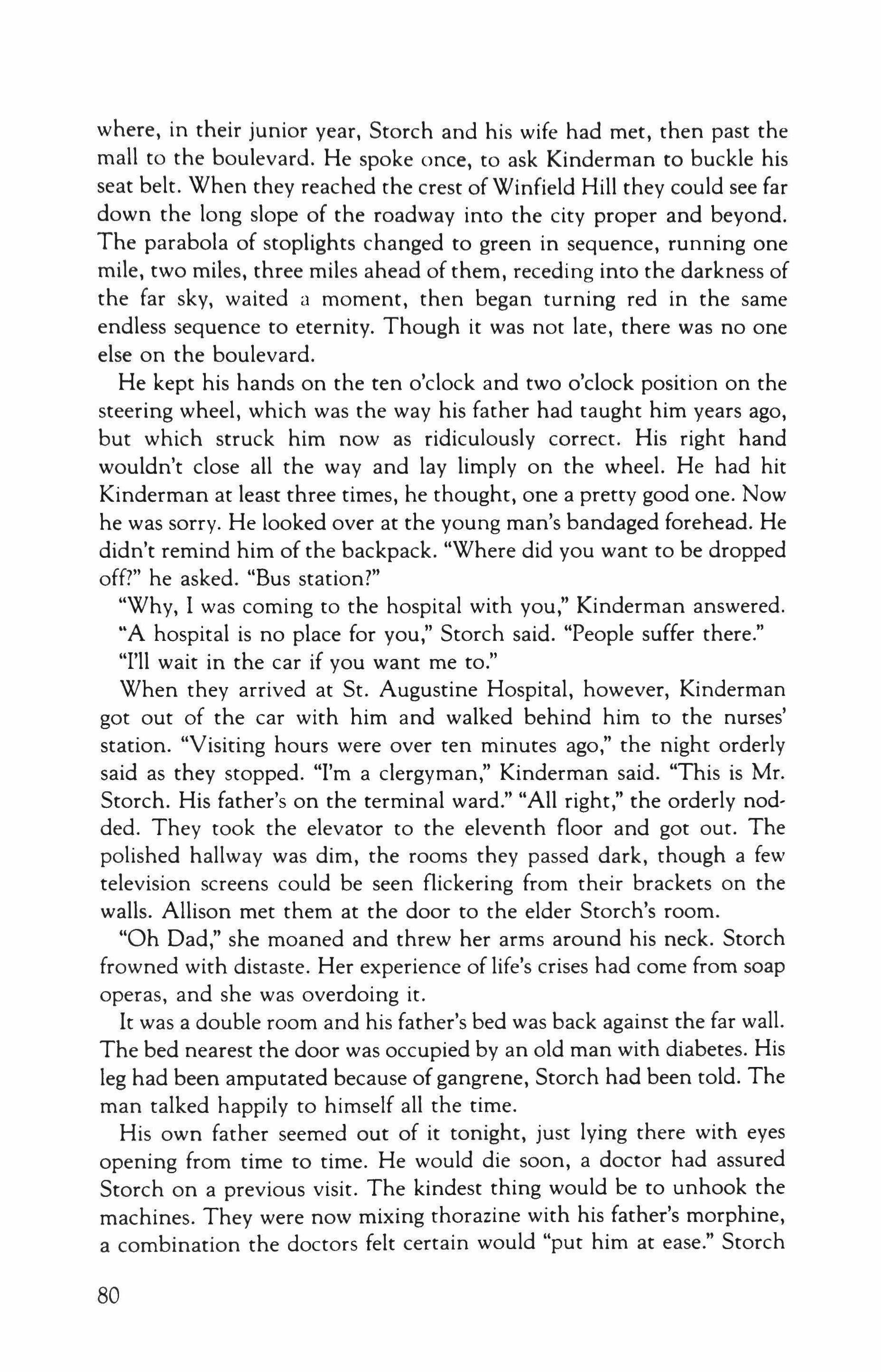
where, in their junior year, Storch and his wife had met, then past the mall to the boulevard. He spoke once, to ask Kinderman to buckle his seat belt. When they reached the crest of Winfield Hill they could see far down the long slope of the roadway into the city proper and beyond. The parabola of stoplights changed to green in sequence, running one mile, two miles, three miles ahead of them, receding into the darkness of the far sky, waited a moment, then began turning red in the same endless sequence to eternity. Though it was not late, there was no one else on the boulevard.
He kept his hands on the ten o'clock and two o'clock position on the steering wheel, which was the way his father had taught him years ago, but which struck him now as ridiculously correct. His right hand wouldn't close all the way and lay limply on the wheel. He had hit Kinderman at least three times, he thought, one a pretty good one. Now he was sorry. He looked over at the young man's bandaged forehead. He didn't remind him of the backpack. "Where did you want to be dropped off?" he asked. "Bus station?"
"Why, I was coming to the hospital with you," Kinderman answered. "A hospital is no place for you," Storch said. "People suffer there."
"I'll wait in the car if you want me to."
When they arrived at St. Augustine Hospital, however, Kinderman got out of the car with him and walked behind him to the nurses' station. "Visiting hours were over ten minutes ago," the night orderly said as they stopped. "I'm a clergyman," Kinderman said. "This is Mr. Storch. His father's on the terminal ward." "All right," the orderly nodded. They took the elevator to the eleventh floor and got out. The polished hallway was dim, the rooms they passed dark, though a few television screens could be seen flickering from their brackets on the walls. Allison met them at the door to the elder Storch's room.
"Oh Dad," she moaned and threw her arms around his neck. Storch frowned with distaste. Her experience of life's crises had come from soap operas, and she was overdoing it.
It was a double room and his father's bed was back against the far wall. The bed nearest the door was occupied by an old man with diabetes. His leg had been amputated because of gangrene, Storch had been told. The man talked happily to himself all the time.
His own father seemed out of it tonight, just lying there with eyes opening from time to time. He would die soon, a doctor had assured Storch on a previous visit. The kindest thing would be to unhook the machines. They were now mixing thorazine with his father's morphine, a combination the doctors felt certain would "put him at ease." Storch
80
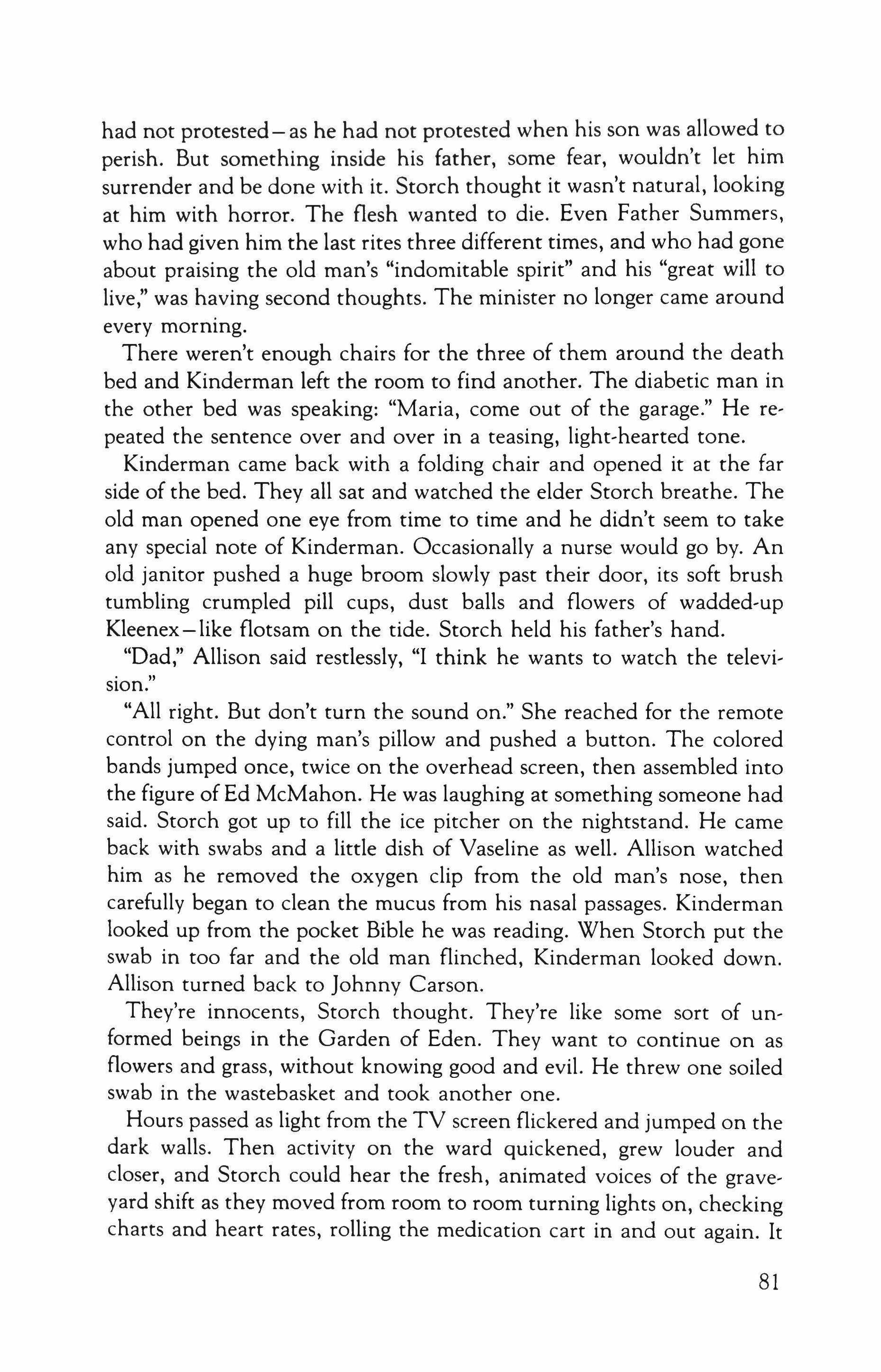
had not protested - as he had not protested when his son was allowed to perish. But something inside his father, some fear, wouldn't let him surrender and be done with it. Storch thought it wasn't natural, looking at him with horror. The flesh wanted to die. Even Father Summers, who had given him the last rites three different times, and who had gone about praising the old man's "indomitable spirit" and his "great will to live," was having second thoughts. The minister no longer came around every morning.
There weren't enough chairs for the three of them around the death bed and Kinderman left the room to find another. The diabetic man in the other bed was speaking: "Maria, come out of the garage." He repeated the sentence over and over in a teasing, light-hearted tone.
Kinderman came back with a folding chair and opened it at the far side of the bed. They all sat and watched the elder Storch breathe. The old man opened one eye from time to time and he didn't seem to take any special note of Kinderman. Occasionally a nurse would go by. An old janitor pushed a huge broom slowly past their door, its soft brush tumbling crumpled pill cups, dust balls and flowers of wadded-up Kleenex-like flotsam on the tide. Storch held his father's hand.
"Dad," Allison said restlessly, "I think he wants to watch the television.
"All right. But don't turn the sound on." She reached for the remote control on the dying man's pillow and pushed a button. The colored bands jumped once, twice on the overhead screen, then assembled into the figure of Ed McMahon. He was laughing at something someone had said. Storch got up to fill the ice pitcher on the nightstand. He came back with swabs and a little dish of Vaseline as well. Allison watched him as he removed the oxygen clip from the old man's nose, then carefully began to clean the mucus from his nasal passages. Kinderman looked up from the pocket Bible he was reading. When Storch put the swab in too far and the old man flinched, Kinderman looked down. Allison turned back to Johnny Carson.
They're innocents, Storch thought. They're like some sort of unformed beings in the Garden of Eden. They want to continue on as flowers and grass, without knowing good and evil. He threw one soiled swab in the wastebasket and took another one.
Hours passed as light from the TV screen flickered and jumped on the dark walls. Then activity on the ward quickened, grew louder and closer, and Storch could hear the fresh, animated voices of the graveyard shift as they moved from room to room turning lights on, checking charts and heart rates, rolling the medication cart in and out again. It
81
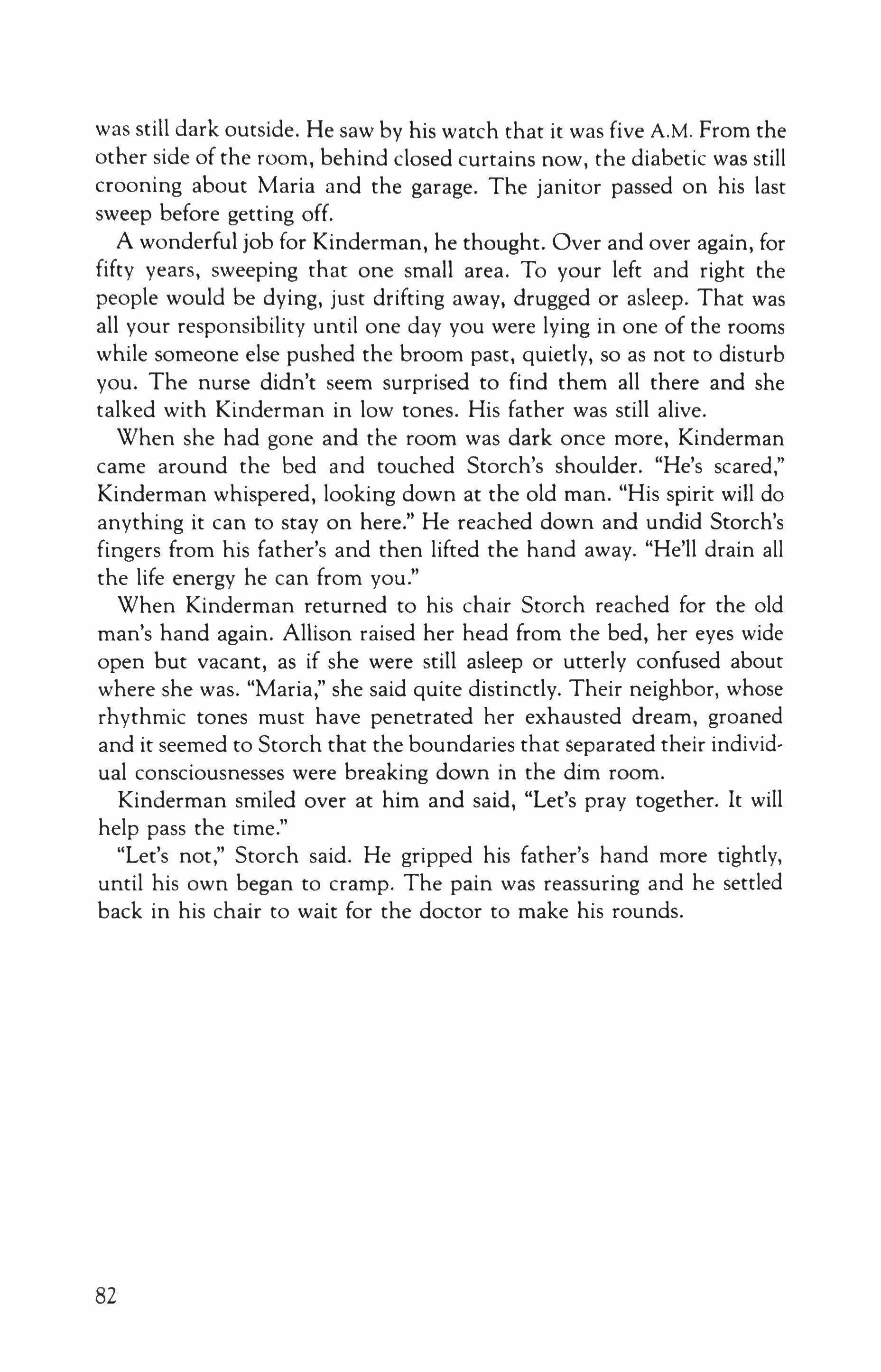
was still dark outside. He saw by his watch that it was five A.M. From the other side of the room, behind closed curtains now, the diabetic was still crooning about Maria and the garage. The janitor passed on his last sweep before getting off.
A wonderful job for Kinderman, he thought. Over and over again, for fifty years, sweeping that one small area. To your left and right the people would be dying, just drifting away, drugged or asleep. That was all your responsibility until one day you were lying in one of the rooms while someone else pushed the broom past, quietly, so as not to disturb you. The nurse didn't seem surprised to find them all there and she talked with Kinderman in low tones. His father was still alive.
When she had gone and the room was dark once more, Kinderman came around the bed and touched Storch's shoulder. "He's scared," Kinderman whispered, looking down at the old man. "His spirit will do anything it can to stay on here." He reached down and undid Storch's fingers from his father's and then lifted the hand away. "He'll drain all the life energy he can from you."
When Kinderman returned to his chair Storch reached for the old man's hand again. Allison raised her head from the bed, her eyes wide open but vacant, as if she were still asleep or utterly confused about where she was. "Maria," she said quite distinctly. Their neighbor, whose rhythmic tones must have penetrated her exhausted dream, groaned and it seemed to Storch that the boundaries that separated their individual consciousnesses were breaking down in the dim room.
Kinderman smiled over at him and said, "Let's pray together. It will help pass the time."
"Let's not," Storch said. He gripped his father's hand more tightly, until his own began to cramp. The pain was reassuring and he settled back in his chair to wait for the doctor to make his rounds.
82
Foreigner
Susan Kerslake
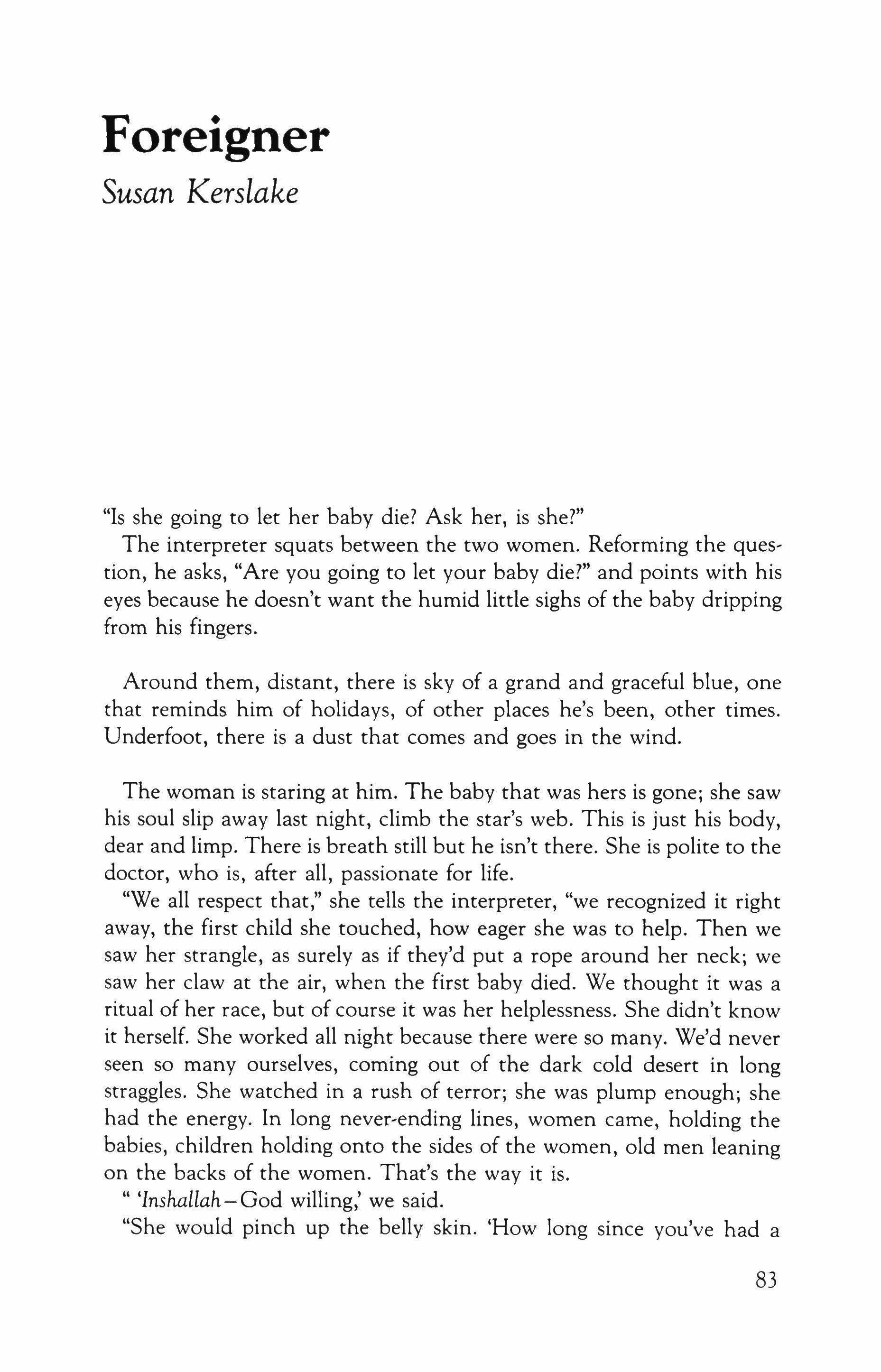
"Is she going to let her baby die? Ask her, is she?"
The interpreter squats between the two women. Reforming the question, he asks, "Are you going to let your baby die?" and points with his eyes because he doesn't want the humid little sighs of the baby dripping from his fingers.
Around them, distant, there is sky of a grand and graceful blue, one that reminds him of holidays, of other places he's been, other times. Underfoot, there is a dust that comes and goes in the wind.
The woman is staring at him. The baby that was hers is gone; she saw his soul slip away last night, climb the star's web. This is just his body, dear and limp. There is breath still but he isn't there. She is polite to the doctor, who is, after all, passionate for life.
"We all respect that," she tells the interpreter, "we recognized it right away, the first child she touched, how eager she was to help. Then we saw her strangle, as surely as if they'd put a rope around her neck; we saw her claw at the air, when the first baby died. We thought it was a ritual of her race, but of course it was her helplessness. She didn't know it herself. She worked all night because there were so many. We'd never seen so many ourselves, coming out of the dark cold desert in long straggles. She watched in a rush of terror; she was plump enough; she had the energy. In long never-ending lines, women came, holding the babies, children holding onto the sides of the women, old men leaning on the backs of the women. That's the way it is.
" 'Inshallah-God willing,' we said.
"She would pinch up the belly skin. 'How long since you've had a
83
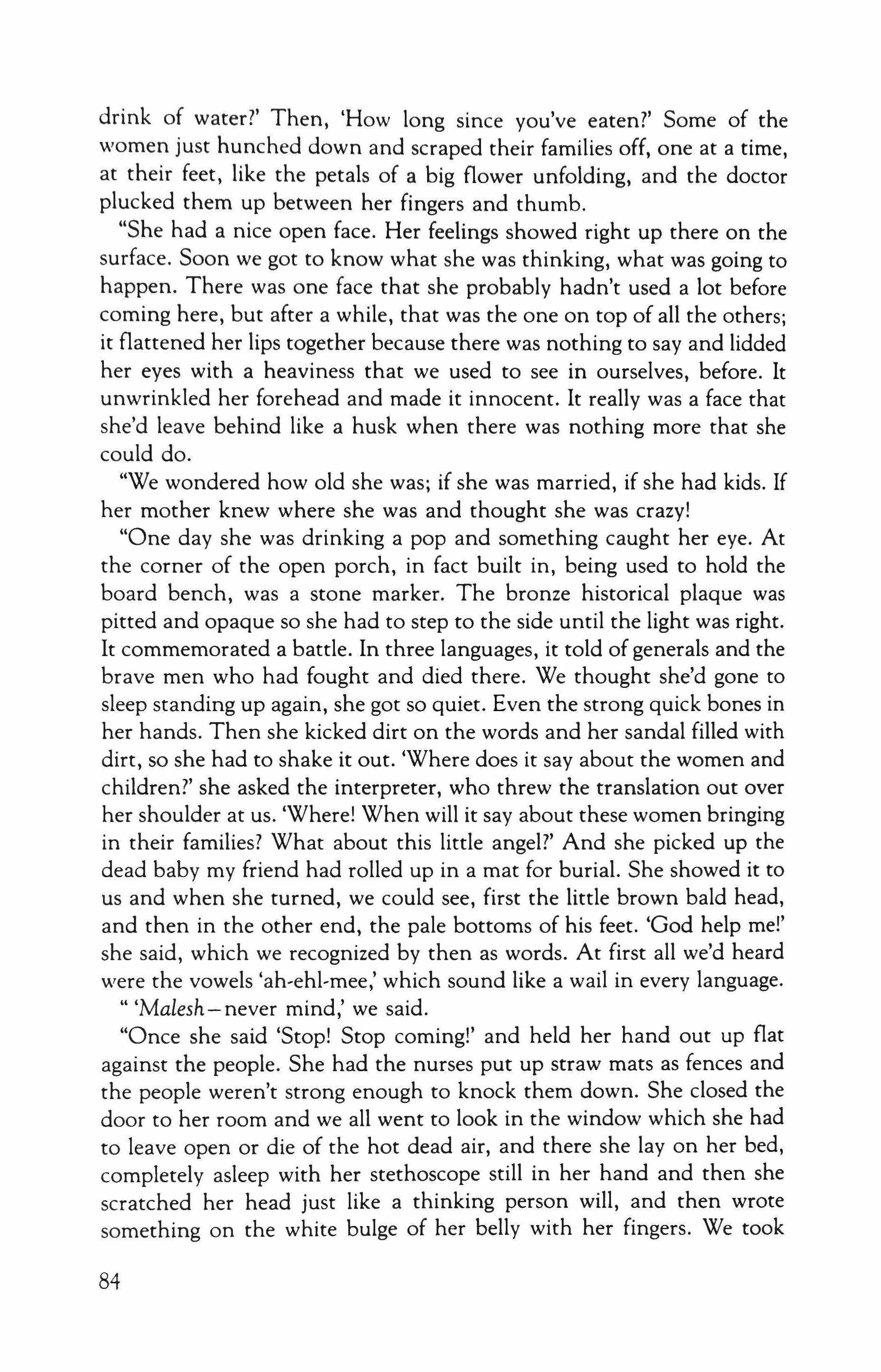
drink of water?' Then, 'How long since you've eaten?' Some of the women just hunched down and scraped their families off, one at a time, at their feet, like the petals of a big flower unfolding, and the doctor plucked them up between her fingers and thumb.
"She had a nice open face. Her feelings showed right up there on the surface. Soon we got to know what she was thinking, what was going to happen. There was one face that she probably hadn't used a lot before coming here, but after a while, that was the one on top of all the others; it flattened her lips together because there was nothing to say and lidded her eyes with a heaviness that we used to see in ourselves, before. It unwrinkled her forehead and made it innocent. It really was a face that she'd leave behind like a husk when there was nothing more that she could do.
"We wondered how old she was; if she was married, if she had kids. If her mother knew where she was and thought she was crazy!
"One day she was drinking a pop and something caught her eye. At the corner of the open porch, in fact built in, being used to hold the board bench, was a stone marker. The bronze historical plaque was pitted and opaque so she had to step to the side until the light was right. It commemorated a battle. In three languages, it told of generals and the brave men who had fought and died there. We thought she'd gone to sleep standing up again, she got so quiet. Even the strong quick bones in her hands. Then she kicked dirt on the words and her sandal filled with dirt, so she had to shake it out. 'Where does it say about the women and children?' she asked the interpreter, who threw the translation out over her shoulder at us. 'Where! When will it say about these women bringing in their families? What about this little angel?' And she picked up the dead baby my friend had rolled up in a mat for burial. She showed it to us and when she turned, we could see, first the little brown bald head, and then in the other end, the pale bottoms of his feet. 'God help me!' she said, which we recognized by then as words. At first all we'd heard were the vowels 'ah-ehl-rnee,' which sound like a wail in every language.
"'Malesh-never mind,' we said.
"Once she said 'Stop! Stop coming!' and held her hand out up flat against the people. She had the nurses put up straw mats as fences and the people weren't strong enough to knock them down. She closed the door to her room and we all went to look in the window which she had to leave open or die of the hot dead air, and there she lay on her bed, completely asleep with her stethoscope still in her hand and then she scratched her head just like a thinking person will, and then wrote something on the white bulge of her belly with her fingers. We took
84
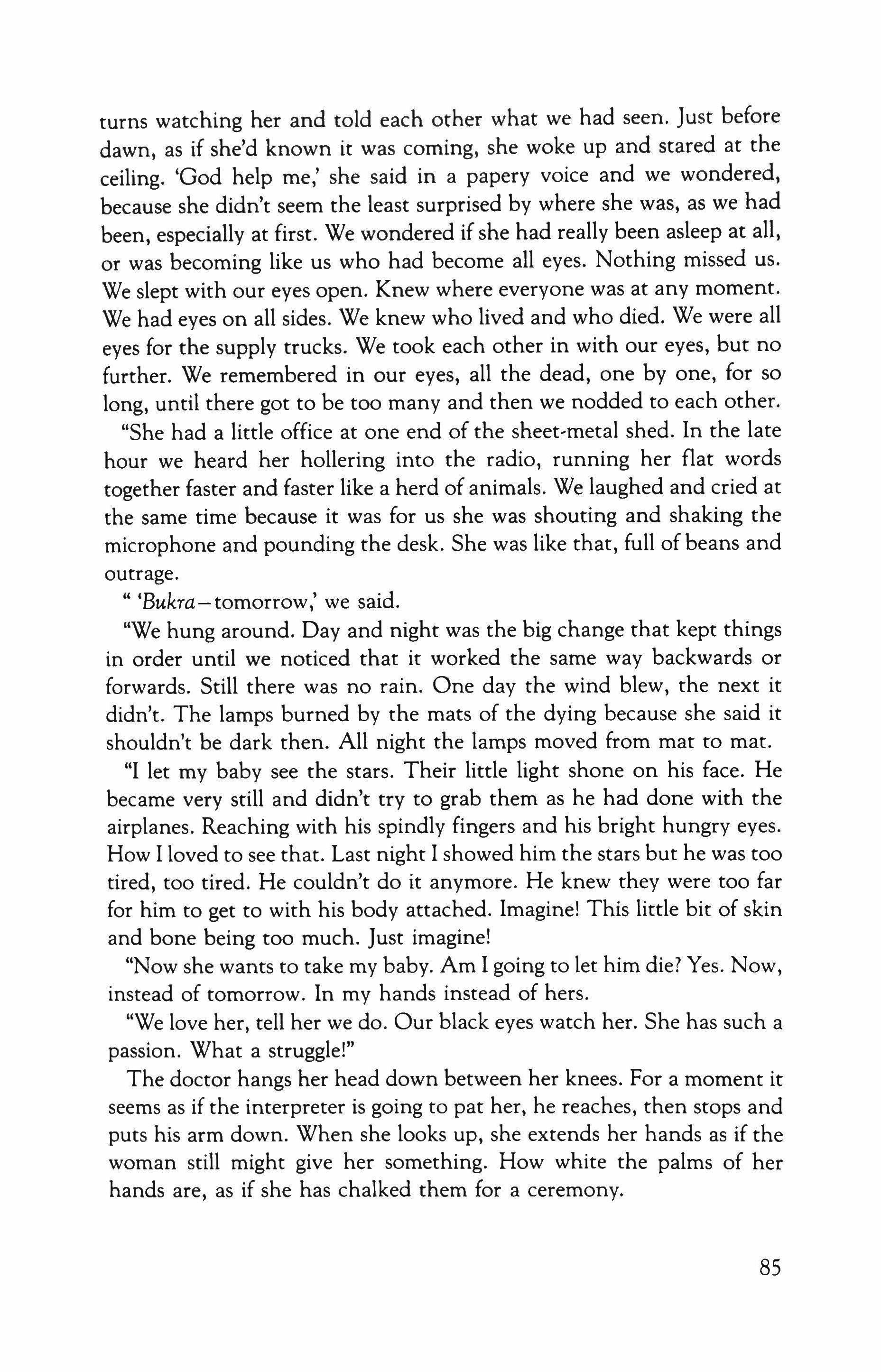
turns watching her and told each other what we had seen. Just before dawn, as if she'd known it was coming, she woke up and stared at the ceiling. 'God help me,' she said in a papery voice and we wondered, because she didn't seem the least surprised by where she was, as we had been, especially at first. We wondered if she had really been asleep at all, or was becoming like us who had become all eyes. Nothing missed us. We slept with our eyes open. Knew where everyone was at any moment. We had eyes on all sides. We knew who lived and who died. We were all eyes for the supply trucks. We took each other in with our eyes, but no further. We remembered in our eyes, all the dead, one by one, for so long, until there got to be too many and then we nodded to each other.
"She had a little office at one end of the sheet-metal shed. In the late hour we heard her hollering into the radio, running her flat words together faster and faster like a herd of animals. We laughed and cried at the same time because it was for us she was shouting and shaking the microphone and pounding the desk. She was like that, full of beans and outrage.
" 'Bukra-tomorrow,' we said.
"We hung around. Day and night was the big change that kept things in order until we noticed that it worked the same way backwards or forwards. Still there was no rain. One day the wind blew, the next it didn't. The lamps burned by the mats of the dying because she said it shouldn't be dark then. All night the lamps moved from mat to mat.
"I let my baby see the stars. Their little light shone on his face. He became very still and didn't try to grab them as he had done with the airplanes. Reaching with his spindly fingers and his bright hungry eyes. How I loved to see that. Last night I showed him the stars but he was too tired, too tired. He couldn't do it anymore. He knew they were too far for him to get to with his body attached. Imagine! This little bit of skin and bone being too much. Just imagine!
"Now she wants to take my baby. Am I going to let him die? Yes. Now, instead of tomorrow. In my hands instead of hers.
"We love her, tell her we do. Our black eyes watch her. She has such a passion. What a struggle!"
The doctor hangs her head down between her knees. For a moment it seems as if the interpreter is going to pat her, he reaches, then stops and puts his arm down. When she looks up, she extends her hands as if the woman still might give her something. How white the palms of her hands are, as if she has chalked them for a ceremony.
85
Forty-Hour Devotion
Mark Costello

There is a bet we bet each time we approach her house and it goes like this: "I'll bet the first think Mom says is: 'I'll bet you're just dead. Sit down, I've got supper ready, I'll bet you're just dead.'
This is an old bet, a ritual, trip-ending bet, but now as we enter her kitchen and she says: "I'll bet you're just dead. Sit down, I've got supper ready, I'll bet you're just dead," her words and her kitchen, the smell of jumbo fried shrimp mixing with freshly baked tollhouse cookies, the martini makings I know I'll find in the pantry, the pop of my son opening a Coke and my own cracking open of an ice tray, predict a second bet. Tonight, unable to sleep, a hand hooked backhanded to my wife's hip, the articulation of her hip a handle by which I grip myself to her pregnancy and my happiness over it, I'll confess, I bet, something I've confessed before: lately when my mother greets us with her bet that we're dead, just dead, her words have a deadening effect on me.
So does gin.
Drinking my first martini, I submit to an old and benumbing metaphor. If all the roads, ramps and bridges I've driven today were laid out like a chain going glassier with each sip I sip, then the gin cracks the whip on our trip and it shatters. We are all sitting safely around a table laden with a sumptuous fried shrimp dinner and, ready already for a second martini, I have lost all track of what my mother and my wife and son are saying.
In front of me sits a large blue-and-yellow can of mixed nuts (no peanuts). First it's in front of my empty plate, nicely set off by the olives in my martini, then it's on my empty plate, becomes in a sense my dinner. My mother indulges me not only in this, but in a second and a third martini. She herself is drinking a beer and smoking a cigarette and
86
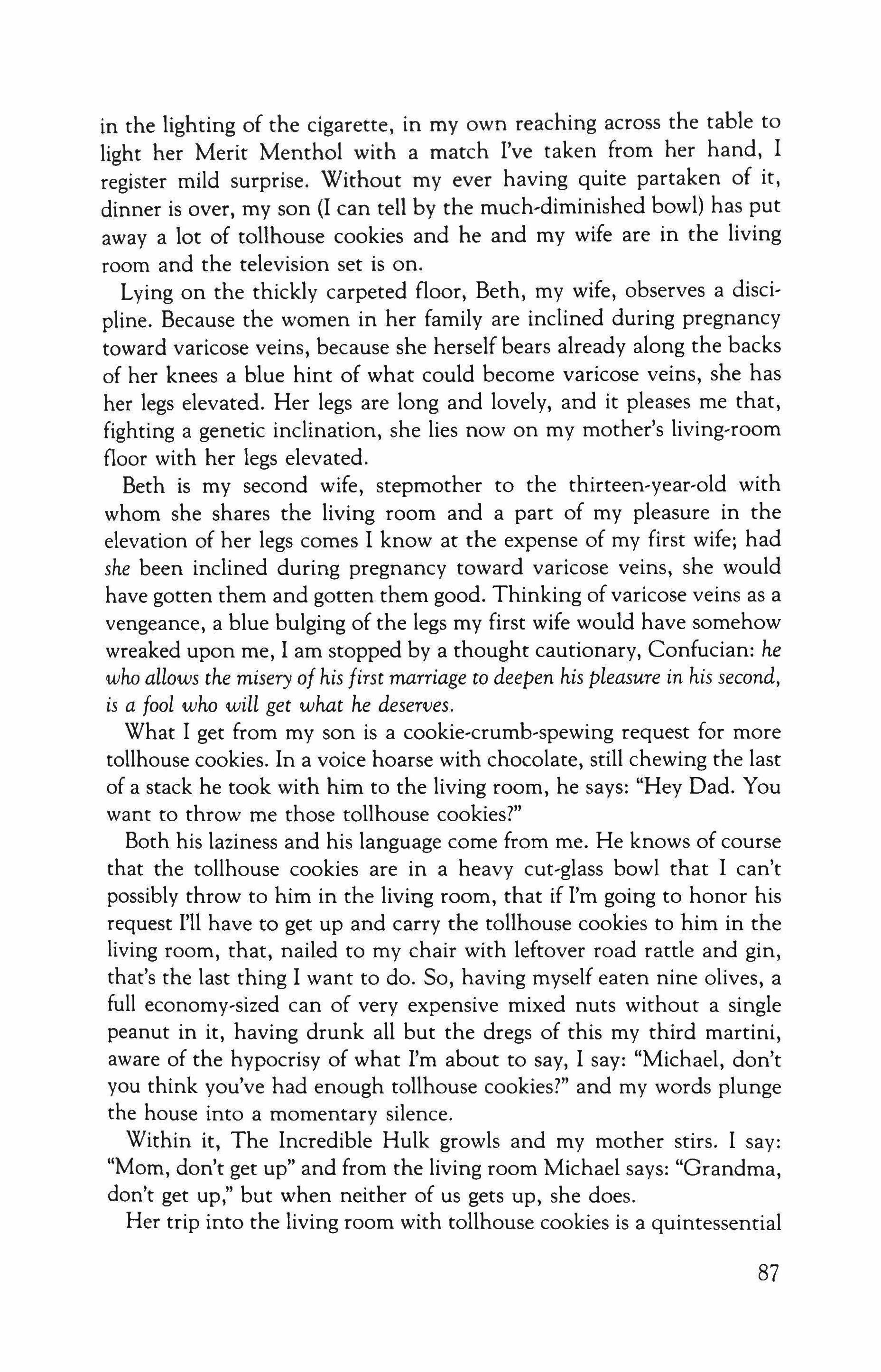
in the lighting of the cigarette, in my own reaching across the table to light her Merit Menthol with a match I've taken from her hand, I register mild surprise. Without my ever having quite partaken of it, dinner is over, my son (I can tell by the much-diminished bowl) has put away a lot of tollhouse cookies and he and my wife are in the living room and the television set is on.
Lying on the thickly carpeted floor, Beth, my wife, observes a discipline. Because the women in her family are inclined during pregnancy toward varicose veins, because she herself bears already along the backs of her knees a blue hint of what could become varicose veins, she has her legs elevated. Her legs are long and lovely, and it pleases me that, fighting a genetic inclination, she lies now on my mother's living-room floor with her legs elevated.
Beth is my second wife, stepmother to the thirteen-year-old with whom she shares the living room and a part of my pleasure in the elevation of her legs comes I know at the expense of my first wife; had she been inclined during pregnancy toward varicose veins, she would have gotten them and gotten them good. Thinking of varicose veins as a vengeance, a blue bulging of the legs my first wife would have somehow wreaked upon me, I am stopped by a thought cautionary, Confucian: he who allows the misery of his first marriage to deepen his pleasure in his second, is a fool who will get what he deserves.
What I get from my son is a cookie-crumb-spewing request for more tollhouse cookies. In a voice hoarse with chocolate, still chewing the last of a stack he took with him to the living room, he says: "Hey Dad. You want to throw me those tollhouse cookies?"
Both his laziness and his language come from me. He knows of course that the tollhouse cookies are in a heavy cut-glass bowl that I can't possibly throw to him in the living room, that if I'm going to honor his request I'll have to get up and carry the tollhouse cookies to him in the living room, that, nailed to my chair with leftover road rattle and gin, that's the last thing I want to do. So, having myself eaten nine olives, a full economy-sized can of very expensive mixed nuts without a single peanut in it, having drunk all but the dregs of this my third martini, aware of the hypocrisy of what I'm about to say, I say: "Michael, don't you think you've had enough tollhouse cookies?" and my words plunge the house into a momentary silence.
Within it, The Incredible Hulk growls and my mother stirs. I say: "Mom, don't get up" and from the living room Michael says: "Grandma, don't get up," but when neither of us gets up, she does.
Her trip into the living room with tollhouse cookies is a quintessential
87

one. Within it, I see a thousand such trips. As long as she's up, Beth too partakes of tollhouse cookies and it would not surprise me if, on her way back to the kitchen, my mother would reach over and feed a couple of tollhouse cookies to the creature turning huge and green and splitting the seams of his clothes on the TV screen. But she doesn't do that. Instead, sitting down again at the kitchen table, she gets very, very quickly to the subject of my first wife, the 2,OOO-mile move she's about to make to Missoula, Montana.
By the time I've dismissed my mood of removal, a sense of listening to my mother's words from somewhere west of the Mississippi River, the far edge of the 2S0-mile drive I've driven today to and from eastern Iowa to bring Michael to her house in central Illinois, my mother is talking about a travel agent, telling me that she checked the airfare between Decatur, Illinois, and Missoula, Montana, with a travel agent and from the way she keeps saying "prohibitively expensive," I can tell she wants me to ask how much, so I say: "How much, Mom," and she says: "Michael, you won't believe this."
"Yes I will."
"One-way or round-trip?"
"Round-trip."
"Four hundred and fifty dollars."
In my mother's spelling out of $4S0, I hear her old habit of murmuring the numbers as she writes out a check, how she'd murmur, for instance, "four hundred and fifty dollars and zero one hundred cents" as she wrote out a check for Michael's round-trip airfare from Missoula, Montana, to Decatur, Illinois, and, reading my mind, she says: "I'm afraid I just don't have that kind of money, Michael. I just don't think I can help with that kind of airfare."
Tempted to ask her who asked her to help with any airfare, I say instead: "Of course you can't, Mom," and, reaching across the table for the match she's detached from the pack, I light her Merit Menthol and count the m's.
There are fifteen of them. My first wife's name is Margaret and having married a millionaire named Mason Manning Mundy the III, having had by him twin daughters named Megan and Mandy, she's moving in a little less than a month now to a mountaintop mansion just outside Missoula, Montana. Of course she's taking Michael with her and if you add to that the quadruple m's of "Mason and all his miserable mucking money," a phrase I can't after three martinis seem to get off of, you come up with about nineteen m's and tonight, lighting my mother's Merit Menthols, I mutter so many m's they call after a while for a final martini.
88

Since it's my fourth, I go heavy on the ice, a little light on the gin and in so doing seem to earn a change of states. When I sit down again at the kitchen table, I get from my mother a question not about Montana, but Wisconsin.
My mother says: "So Margaret and Mason and the twins drove up to the farmhouse in Wisconsin," and even as I nod and say: "Michael said they took off real early this morning for the farmhouse in Wisconsin," the telephone rings and Beth calls out from the living room: "Michael it's Mason, he's calling from the farmhouse in Wisconsin."
Why this doesn't surprise me more than it does, I do not know. But walking into the living room, wondering if I shouldn't turn around right now, descend the stairs and take this call on the telephone in the basement, I fight a disquieting impression. With her feet propped up on the sofa, with the receiver extended in her right hand upward and toward me, with her eyes looking just a little wide, my wife seems to have been floored by the telephone she's answered.
Taking it from her, I notice that the phone book, open to the Yellow Pages, lies beside her. Wondering what she's been letting her fingers do the walking for, recalling vaguely some dinner conversation between her and my mother about a good used crib, I put the telephone to my ear and as if he can hear me doing so, Mason says: "Michael? Mason here. I'm calling from the farmhouse in Wisconsin."
I say: "Right Mason" and he says: "Look Michaell'm afraid we've got a little trouble up here."
"Oh?"
"Yeah. I think it involves Michael."
Turning me toward my son, Mason's use of our mutual name pulls my hand toward the TV. When I turn the volume all the way down, Michael says: "Dad we're watching the Hulk," but it isn't true.
Both he and Beth are watching me, not the Incredible Hulk and, stupidly, I enjoy the attention.
Particularly Michael's. Though he turned thirteen only four months ago, it seems like a year or two since I last really got his attention and, having gotten it, I want to keep it for awhile.
Keeping my answers short and neutral, saying "Yes Mason" and "No Mason" and "Do you want me to call you back when we get things settled on this end of the line Mason," I keep Michael on the hook: as long as I don't say that this phone call is about him, he will, I know, assume it's about him and that assumption makes him do something strange. He removes, very slowly, the hat from his head. As he does so, Mason, as if he's explaining to me the very gesture Michael's just per-
89
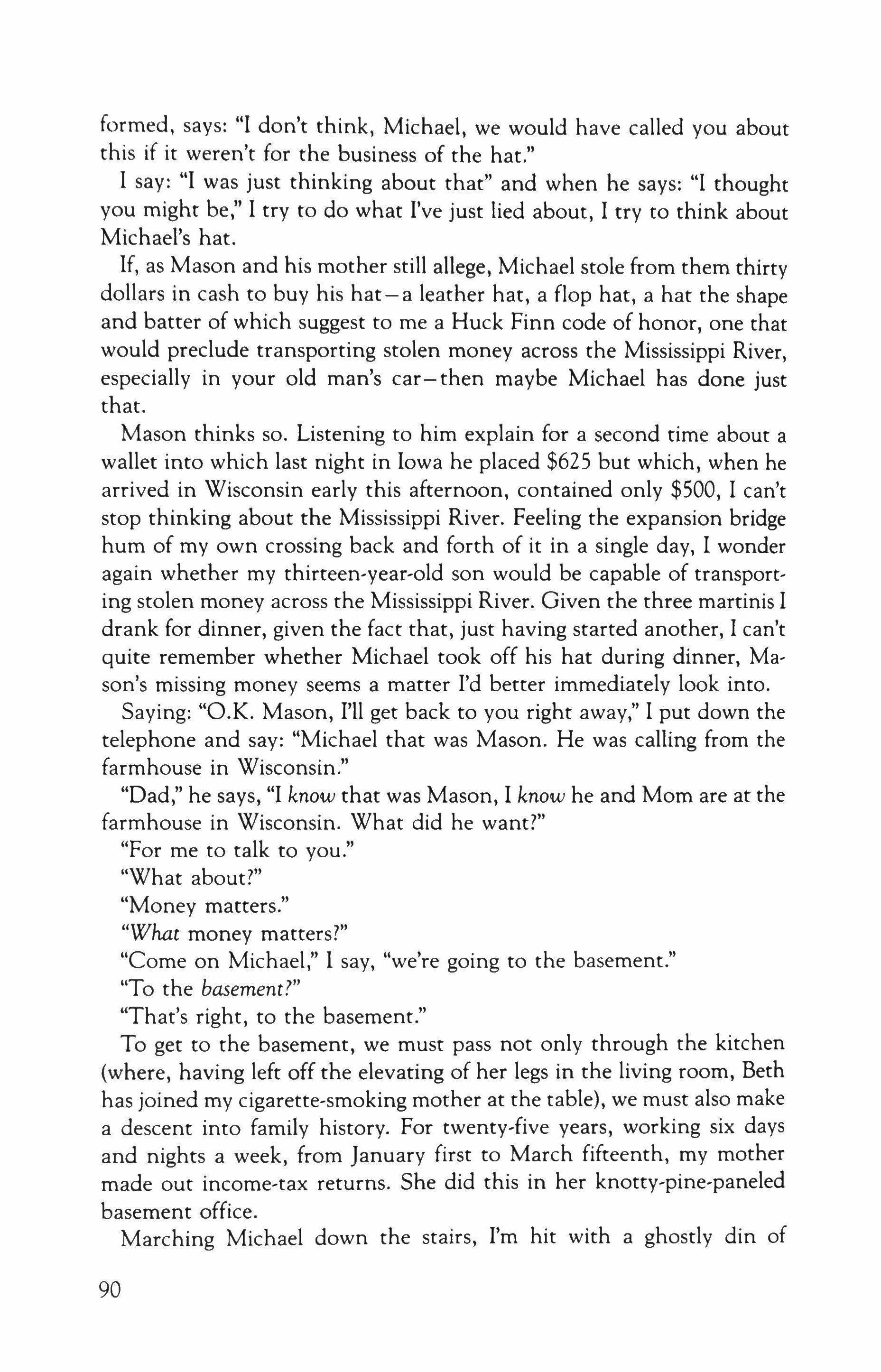
formed, says: "I don't think, Michael, we would have called you about this if it weren't for the business of the hat."
I say: "I was just thinking about that" and when he says: "I thought you might be," I try to do what I've just lied about, I try to think about Michael's hat.
If, as Mason and his mother still allege, Michael stole from them thirty dollars in cash to buy his hat-a leather hat, a flop hat, a hat the shape and batter of which suggest to me a Huck Finn code of honor, one that would preclude transporting stolen money across the Mississippi River, especially in your old man's car- then maybe Michael has done just that.
Mason thinks so. Listening to him explain for a second time about a wallet into which last night in Iowa he placed $625 but which, when he arrived in Wisconsin early this afternoon, contained only $500, I can't stop thinking about the Mississippi River. Feeling the expansion bridge hum of my own crossing back and forth of it in a single day, I wonder again whether my thirteen-year-old son would be capable of transporting stolen money across the Mississippi River. Given the three martinis I drank for dinner, given the fact that, just having started another, I can't quite remember whether Michael took off his hat during dinner, Mason's missing money seems a matter I'd better immediately look into.
Saying: "O.K. Mason, I'll get back to you right away," I put down the telephone and say: "Michael that was Mason. He was calling from the farmhouse in Wisconsin."
"Dad," he says, "I know that was Mason, I know he and Mom are at the farmhouse in Wisconsin. What did he want?"
"For me to talk to you."
"What about?"
"Money matters."
"What money matters?"
"Come on Michael," I say, "we're going to the basement."
"To the basement?"
"That's right, to the basement."
To get to the basement, we must pass not only through the kitchen (where, having left off the elevating of her legs in the living room, Beth has joined my cigarette-smoking mother at the table), we must also make a descent into family history. For twenty-five years, working six days and nights a week, from January first to March fifteenth, my mother made out income-tax returns. She did this in her knotty-pine-paneled basement office.
Marching Michael down the stairs, I'm hit with a ghostly din of
90

adding machine and typewriter, a scent of ink eraser, carbon paper and desktop blotters advertising funeral parlors. Taking it in, I think again of the telephone in the basement. Blunt, heavy and black, smelling as it does of nicotine and income tax, it looks, with its old-fashioned knottedup cord, custom-made for the matter at hand. Knowing exactly how the receiver will fit in my fist, I know I can do what I've said that I'll do: confront my son with the fact of the missing money, ask him if he took $125 from his stepfather last night or very early this morning in Iowa, call them back in Wisconsin and tell them what he said.
What he says is beautiful. Having preceded me hat-in-hand down the basement stairs, having listened to me repeat the words his stepfather has just spoken, Michael, shaking his hat above his head, says: "Beautiful, Dad. That's just beautiful."
Under the harsh light of a naked bulb, Michael is right now anything but beautiful. He's been lifting weights and, according to Mason and his mother, smoking a lot of marijuana. I have lifted very few weights, smoked even less marijuana. There is, however, about my son a new pumped-up pectoral tenseness that suggests to me that he's not only been doing a lot of bench presses, but sucking down and holding in his lungs a lot of fiery marijuana.
Also watching television. Like the figure growling and fuming now on the silent screen above our heads, Michael bends over and, tensing his already tense and pumped-up pectoral muscles, seems about to turn huge and green and burst the seams of his shirt and trousers with righteous indignation.
Instead, his voice still hoarse with tollhouse chocolate, he begins to curse a kind of credo. He cannot believe, he tells me, that Mason and his mother think he took their goddamned money, he cannot believe I think he took their goddamned money, he cannot believe I actually told them I was going to goddamned call them back.
I can. So can the basement. In chairs all around us, I feel the ghosts of taxpayers past. Solemn citizens in a solemn time of year, figures with rubber bands bound around their fists, with fans of envelopes and affidavits held tight to their chests, they present a silent consensus: any boy who can shout and shake his hat and fist and curse like Michael can, could not only steal $125 from his stepfather's wallet, he could transport, in his father's car, that money across the Mississippi River.
I don't want to believe it. Nor do I want, even for a minute, to confuse Michael's anger with his innocence. Therefore, to make absolutely sure I'm not afraid of making absolutely sure he didn't take the money from Mason and carry it in my car across the Mississippi River, I say: "Hold it
91

a minute now Michael. Are you absolutely sure you didn't take that money from Mason?"
"Sure I'm sure."
"You don't know anything about it?"
"I don't know anything about it. I'm telling you, Dad, I didn't take Mason's money."
"O.K. That's all I wanted to hear you say. I believe you. I'm calling Mason."
I can't get Mason. Even on my mother's blunt black basement telephone, I can't get through to the farmhouse in Wisconsin. Each time I try, I get a busy signal. Smiling at my party-line luck, chuckling over the luck Michael mutters each time I shake my head and put the telephone down, the ghosts of taxpayers past laugh out loud when Michael finally says: "Look, Dad, that line might stay busy all night. If it's all right with you, can I try to catch the end of 'The Hulk'?"
I say "sure" and he says "thanks."
When, through the basement ceiling, I hear Michael turn the TV up, I picture a bluff above a river. Lifting over his head and hurling into the water a car like the car I drove twice today across the Mississippi River, The Incredible Hulk bends and growls a growl that, shaking a farmhouse in Wisconsin, makes a funeral-parlor blotter hop on my mother's income-tax table.
Having brought my fist down on my mother's income-tax table just a little harder than I wanted, I hear Beth call from the kitchen: "Michael, are you all right down there?"
"Sure," I say. "Why don't you and Mom come on down? I need to talk to you."
Together, they descend the basement stairs. Along with her matches and Merit Menthols, my mother brings a beer and the watery remnants of my fourth martini. Pulling up two green plastic lawn chairs, Beth settles in one, elevates her legs on another. Sitting down in the chair she sat in for so many years, a chair positioned midway between the typewriter and the adding machine, my mother, squaring up her funeralparlor blotter, looks ready to come out of retirement, ready to get back to work on income tax.
Knocking back my martini and recounting Mason's phone call from the farmhouse in Wisconsin, I try not to let my sense of Michael's innocence get mixed up with gin, Huck Finn and my own doublecrossing in a single day of the Mississippi River. "I've talked to him," I say, "I've confronted him and I really don't think he did it, I really don't think Michael took Mason's money."
92

Neither does my mother. But I'm not so sure about Beth. Sitting in my mother's basement with her legs elevated, she looks like a girl who's wandered in to have her income tax figured. Imagining some obscure exemption attached to her marriage to me, a tax benefit my mother alone would know how to figure, I am thinking of a refund the exact sum of Michael's round-trip airfare from Missoula, Montana, to Decatur, Illinois, when my mother says: "Well I don't like this, Michael, not one bit. And if worse comes to worse, if Mason and Margaret really do move to Montana and take Michael with them, I guess I'm just going to have to help with his airfare to and from Decatur."
"Come on, Mom," I say. "You know we can't ask you to do that. You know you don't have that kind of money."
"We'll see, Michael," she says, "we'll see."
When my mother says this, I see her as 1 used to see her, sitting at this very table, counting of a Saturday night, her income-tax money.
Her fingers flying silver and numerical across the keys of the adding machine, the smoke of her cigarette rising blue to the ceiling, her hair done up in a mint-green scarf with light-green dimes and dollar signs showing in its folds, she'd recite our expenses and savings in a voice that seemed not only to catch and repeat the exhaustion and satisfaction of each and every taxpayer whom that week she'd served, but that says tonight, some twenty years later, if 1 just keep trying, if 1 just keep dialing the right number, I'll get, on my mother's blunt black basement telephone, Mason at the farmhouse in Wisconsin.
A pillow prayer isn't much of a prayer.
From a priest at a retreat I first heard that notion set forth: if you really mean it, he said, if you really want the Lord to listen, get out of bed, kneel on the floor, pray your prayer there.
Often 1 meant it, often I did as the priest told me I must do, I got out of bed, knelt on the hardwood floor, prayed my prayer there.
Now, though, welshing and waffling on an apostasy I find hard to practice at night, harder to practice in my mother's house, telling myself her carpets are so thick it wouldn't make any difference anyway, I allow myself to pray in bed, to emit snippets and spits of the Hail Mary or hacked Latin which, short-circuiting my brain and shaming the historical fact of my break with the church, use that shame to induce sleep.
So it was last night. To a Deus Absconditus of drivel, drool, pillow prayer, I prayed: Dear Jesus let me get Mason at the farmhouse in Wisconsin, dear Jesus don't let that line stay busy all weekend long.
Waking with those words still stuck in my mouth, telling myself that if
93

I meant them last night I'll get immediately out of bed and onto the telephone this morning, I pull on a pair of Levis, pass through the kitchen with a greeting to Beth and my mother, and, coming fully awake neither to the beat of my bare feet on the basement stairs, nor the butt, butt, butt of the busy signal I get again from the farmhouse in Wisconsin, I hear my mother call from the kitchen: "Michael do you want coffee?" "Yes."
"Do you want it down there?"
"Sure I guess."
In the cup-and-saucer clink of her descent of the stairs, in the thump of plumbing that says Beth has repaired to the bathroom above, I hear a murmur of "m's and, again and again, the mutual Michael that last night drew my hand to the TV set. Remembering that gesture, the way I turned the sound down on a green-turning creature to whom, only moments before, I'd imagined my mother feeding tollhouse cookies, I seem to turn the sound down on everything but: "I kissed him goodnight, I blew out his votive light."
"You did what, Mom?"
"I kissed Michael goodnight, I blew out his votive light."
Thinking: I thought I asked you not to do that, I thought you promised not to do that, I inhale coffee steam and put together what I've missed: last night in a nightgown with a scapular safety-pinned to its shoulder strap and a pocket weighted with a vial of holy water she promised not to sprinkle on Michael, with one hand wrapped in rosary beads, I've asked her not to pray in the presence of Michael, the air still sweet with the smoke of a blown-out votive light I know she agreed at least three years ago never again to light for Michael, my mother kissed my son goodnight and I am thinking: what the hell, what the hell, when I hear her say: "And then the poor thing. I felt so sorry for him. Do you know what he said?"
"What did he say?"
"He squeezed my hand and said: 'Grandma, you don't think I took Mason's money do you?'
"What did you say?"
"I said: 'No Michael, I don't think you took Mason's money.'
Neither do l. But again, I'm not so sure about Beth. Double-clutching, the bathroom above sends out a second shudder of plumbing that sounds skeptical, unsure: if he didn't take Mason's money, why would Michael sugar his grandmother with a question that in turn suckers me: "What about me Mom," I say. "Did Michael say anything about me?"
"What do you mean Michael?"
94
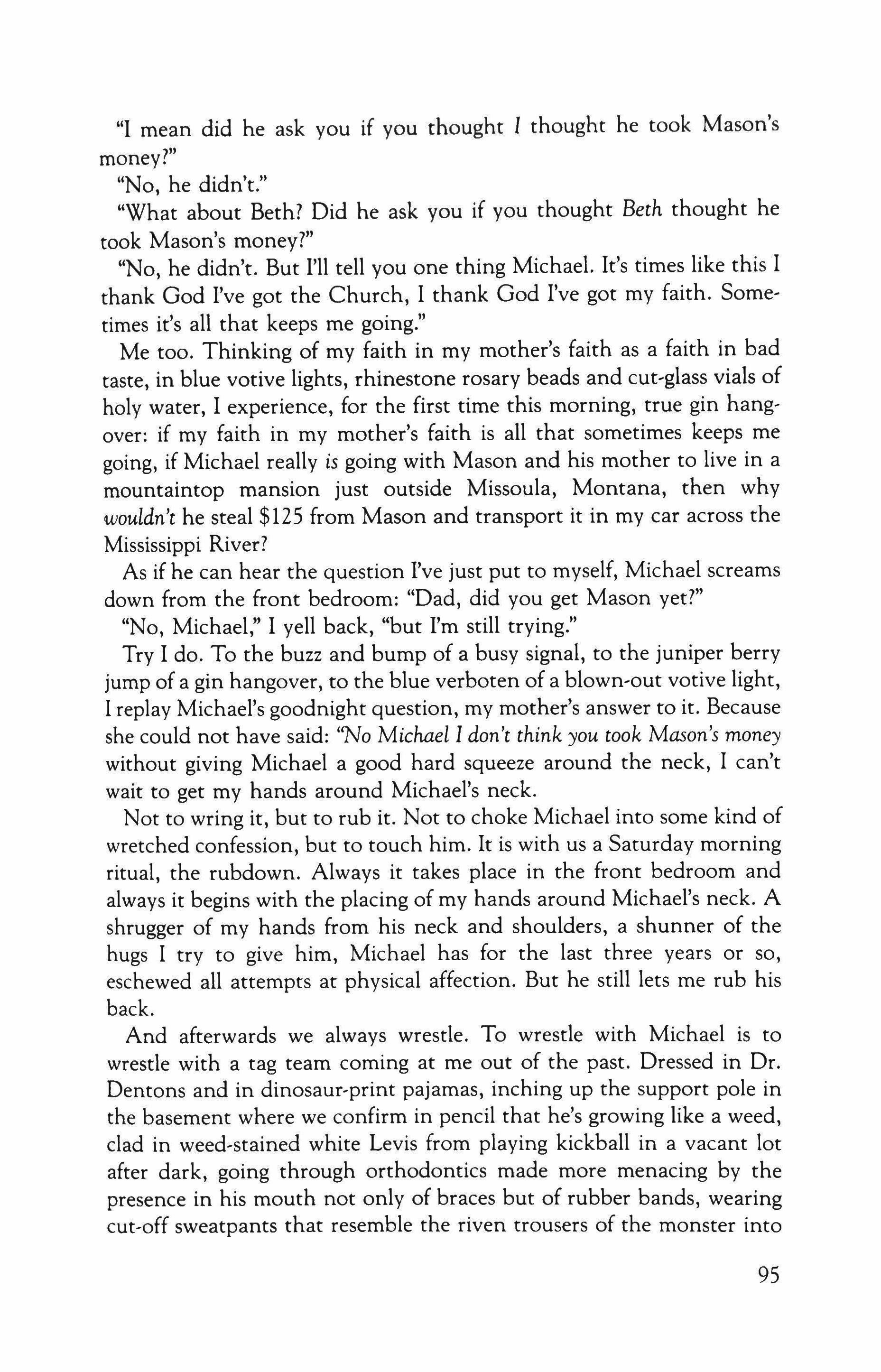
"I mean did he ask you if you thought I thought he took Mason's money?"
"No, he didn't."
"What about Beth? Did he ask you if you thought Beth thought he took Mason's money?"
"No, he didn't. But I'll tell you one thing Michael. It's times like this I thank God I've got the Church, I thank God I've got my faith. Sometimes it's all that keeps me going."
Me too. Thinking of my faith in my mother's faith as a faith in bad taste, in blue votive lights, rhinestone rosary beads and cut-glass vials of holy water, I experience, for the first time this morning, true gin hangover: if my faith in my mother's faith is all that sometimes keeps me going, if Michael really is going with Mason and his mother to live in a mountaintop mansion just outside Missoula, Montana, then why wouldn't he steal $125 from Mason and transport it in my car across the Mississippi River?
As if he can hear the question I've just put to myself, Michael screams down from the front bedroom: "Dad, did you get Mason yet?"
"No, Michael," I yell back, "but I'm still trying."
Try I do. To the buzz and bump of a busy signal, to the juniper berry jump of a gin hangover, to the blue verboten of a blown-out votive light, I replay Michael's goodnight question, my mother's answer to it. Because she could not have said: ''No Michael I don't think you took Mason's money without giving Michael a good hard squeeze around the neck, I can't wait to get my hands around Michael's neck.
Not to wring it, but to rub it. Not to choke Michael into some kind of wretched confession, but to touch him. It is with us a Saturday morning ritual, the rubdown. Always it takes place in the front bedroom and always it begins with the placing of my hands around Michael's neck. A shrugger of my hands from his neck and shoulders, a shunner of the hugs I try to give him, Michael has for the last three years or so, eschewed all attempts at physical affection. But he still lets me rub his back.
And afterwards we always wrestle. To wrestle with Michael is to wrestle with a tag team coming at me out of the past. Dressed in Dr. Dentons and in dinosaur-print pajamas, inching up the support pole in the basement where we confirm in pencil that he's growing like a weed, clad in weed-stained white Levis from playing kickball in a vacant lot after dark, going through orthodontics made more menacing by the presence in his mouth not only of braces but of rubber bands, wearing cut-off sweatpants that resemble the riven trousers of the monster into
95
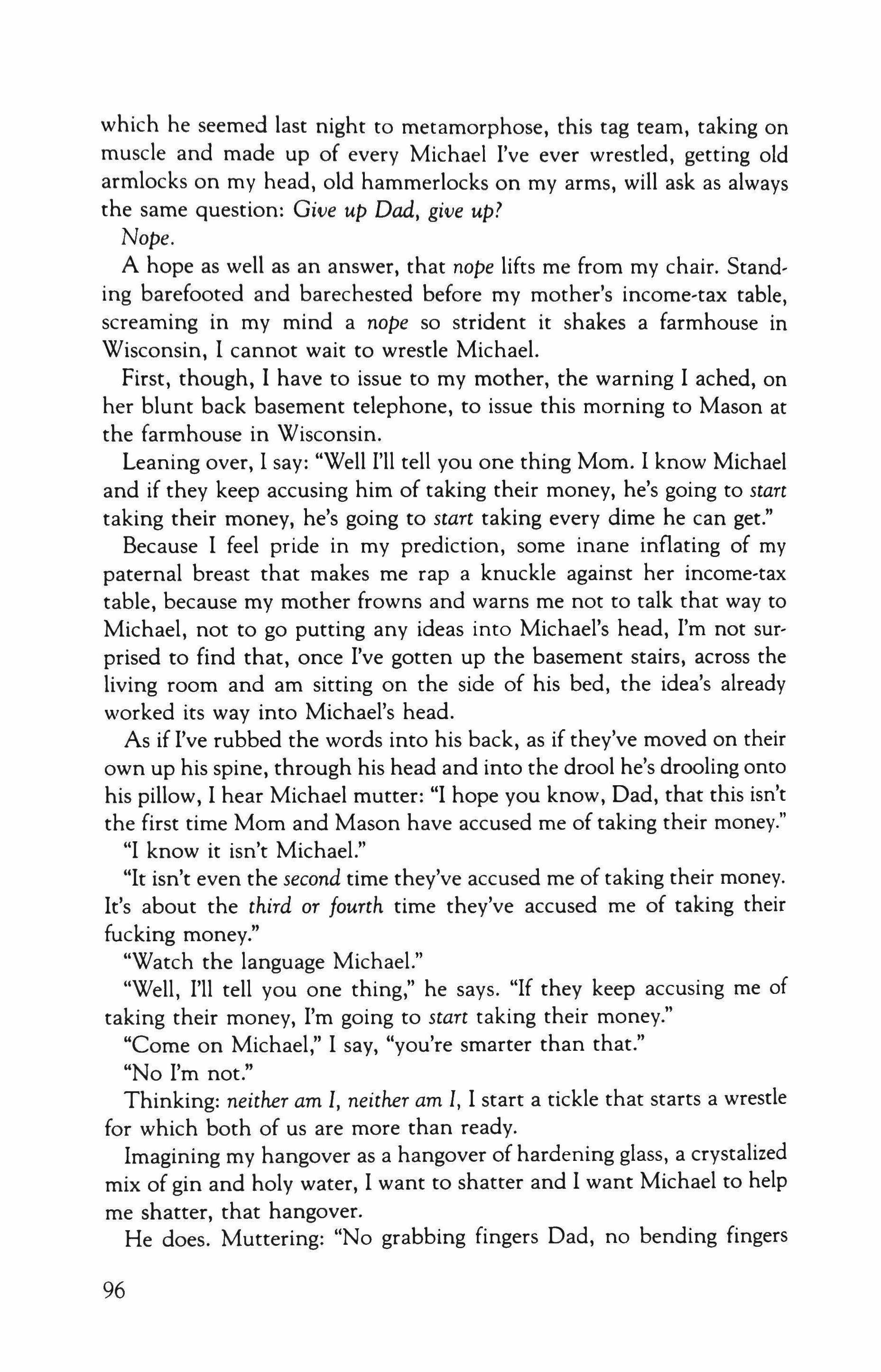
which he seemed last night to metamorphose, this tag team, taking on muscle and made up of every Michael I've ever wrestled, getting old armlocks on my head, old hammerlocks on my arms, will ask as always the same question: Give up Dad, give up?
Nope.
A hope as well as an answer, that nope lifts me from my chair. Standing barefooted and barechested before my mother's income-tax table, screaming in my mind a nope so strident it shakes a farmhouse in Wisconsin, I cannot wait to wrestle Michael.
First, though, I have to issue to my mother, the warning I ached, on her blunt back basement telephone, to issue this morning to Mason at the farmhouse in Wisconsin.
Leaning over, I say: "Well I'll tell you one thing Mom. I know Michael and if they keep accusing him of taking their money, he's going to start taking their money, he's going to start taking every dime he can get."
Because I feel pride in my prediction, some inane inflating of my paternal breast that makes me rap a knuckle against her income-tax table, because my mother frowns and warns me not to talk that way to Michael, not to go putting any ideas into Michael's head, I'm not surprised to find that, once I've gotten up the basement stairs, across the living room and am sitting on the side of his bed, the idea's already worked its way into Michael's head.
As if I've rubbed the words into his back, as if they've moved on their own up his spine, through his head and into the drool he's drooling onto his pillow, I hear Michael mutter: "I hope you know, Dad, that this isn't the first time Mom and Mason have accused me of taking their money."
"I know it isn't Michael."
"It isn't even the second time they've accused me of taking their money. It's about the third or fourth time they've accused me of taking their fucking money."
"Watch the language Michael."
"Well, I'll tell you one thing," he says. "If they keep accusing me of taking their money, I'm going to start taking their money."
"Come on Michael," I say, "you're smarter than that."
"No I'm not."
Thinking: neither am I, neither am I, I start a tickle that starts a wrestle for which both of us are more than ready.
Imagining my hangover as a hangover of hardening glass, a crystalized mix of gin and holy water, I want to shatter and I want Michael to help me shatter, that hangover.
He does. Muttering: "No grabbing fingers Dad, no bending fingers
96

Dad, no scratching Dad, no biting Dad, no twisting noses Dad," Michael, wrestling like all the Michaels I've ever wrestled, grabs and bends my fingers, scratches me, bites me, twists my nose.
Going for an armlock on my head, trying to get me full-nelson face down on the pillow, dropping me with a thump to the floor, he gets a hammerlock on my arm. Kneeling in an attitude of enforced prayer, trying to imagine a prayer my son might wrench from me from behind, coming up instead with singsong Swedish incessance, the Hansen-to
Swenson-to-jensen-to-johnson dairy-farmer gossip I keep imagining is keeping me from getting through to the farmhouse in Wisconsin, I feel, with my face grinding into my mother's carpet, a whole lot better.
In the cough and oof of my breath against mohair, I blowout gin. All of my nose, ear, chin, elbow, wrist and knee burns burn gin. Fighting dry heaves, I say: "Let me go Michael. You're breaking my arm."
"Too bad, Dad, too bad."
"Come on, Michael. Let me up."
"Give up, Dad, give up?"
A nope I'd have rattle the windows of a farmhouse in Wisconsin, my nope goes out only, it seems, to my mother.
Up the basement stairs, through the kitchen and across the living room, she comes. Arriving at the bedroom door, she says: "Now you two stop that wrestling. You're going to hurt each other. Do you hear me, do you hear me?"
Though we both hear her quite clearly, neither of us chooses to answer.
When we do not, my mother does something Irish, atavistic. She falls to her knees. I do not know how many grandmothers have in our family fallen to their knees beside sons and grandsons locked in hammerlock. I know only that my mother seems practiced at it. Like a stringy, septuagenarian wrestling referee, she slaps her hand three times on the carpet, whispers: "Now you two stop it," and Michael lets go of my arm.
Kneeling on the bedroom floor with Michael and my mother, trying not to think: the family that prays together stays together, I rise and head once more for the telephone in the basement.
Something there is in me that wants to declare an emergency, to get on the telephone in the basement and to call an operator and to lie, to tell an operator that there's an emergency and she's going to have to break in on the rural party line, the Swedish incessance, the Hansen-toSwenson-to-jenson-to-Johnson dairy-farmer gossip I keep assuming is
97
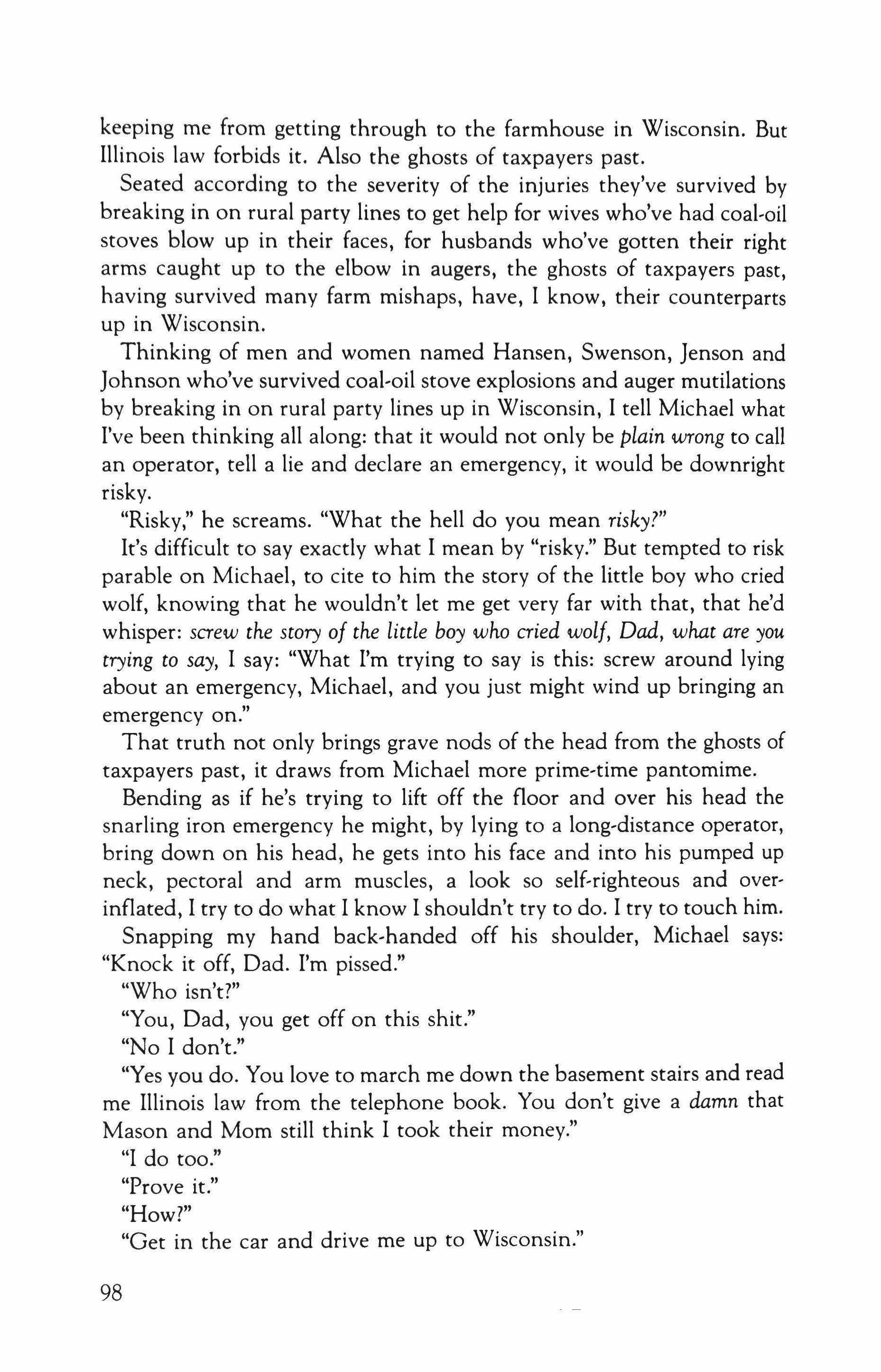
keeping me from getting through to the farmhouse in Wisconsin. But Illinois law forbids it. Also the ghosts of taxpayers past.
Seated according to the severity of the injuries they've survived by breaking in on rural party lines to get help for wives who've had coal-oil stoves blow up in their faces, for husbands who've gotten their right arms caught up to the elbow in augers, the ghosts of taxpayers past, having survived many farm mishaps, have, I know, their counterparts up in Wisconsin.
Thinking of men and women named Hansen, Swenson, Jenson and Johnson who've survived coal-oil stove explosions and auger mutilations by breaking in on rural party lines up in Wisconsin, I tell Michael what I've been thinking all along: that it would not only be plain wrong to call an operator, tell a lie and declare an emergency, it would be downright risky.
"Risky," he screams. "What the hell do you mean risky?"
It's difficult to say exactly what I mean by "risky." But tempted to risk parable on Michael, to cite to him the story of the little boy who cried wolf, knowing that he wouldn't let me get very far with that, that he'd whisper: screw the story of the little boy who cried wolf, Dad, what are you trying to say, I say: "What I'm trying to say is this: screw around lying about an emergency, Michael, and you just might wind up bringing an emergency on."
That truth not only brings grave nods of the head from the ghosts of taxpayers past, it draws from Michael more prime-time pantomime.
Bending as if he's trying to lift off the floor and over his head the snarling iron emergency he might, by lying to a long-distance operator, bring down on his head, he gets into his face and into his pumped up neck, pectoral and arm muscles, a look so self-righteous and overinflated, I try to do what I know I shouldn't try to do. I try to touch him.
Snapping my hand back-handed off his shoulder, Michael says: "Knock it off, Dad. I'm pissed."
"Who isn't?"
"You, Dad, you get off on this shit."
"No I don't."
"Yes you do. You love to march me down the basement stairs and read me Illinois law from the telephone book. You don't give a damn that Mason and Mom still think I took their money."
"I do too."
"Prove it."
"How?"
"Get in the car and drive me up to Wisconsin."
98
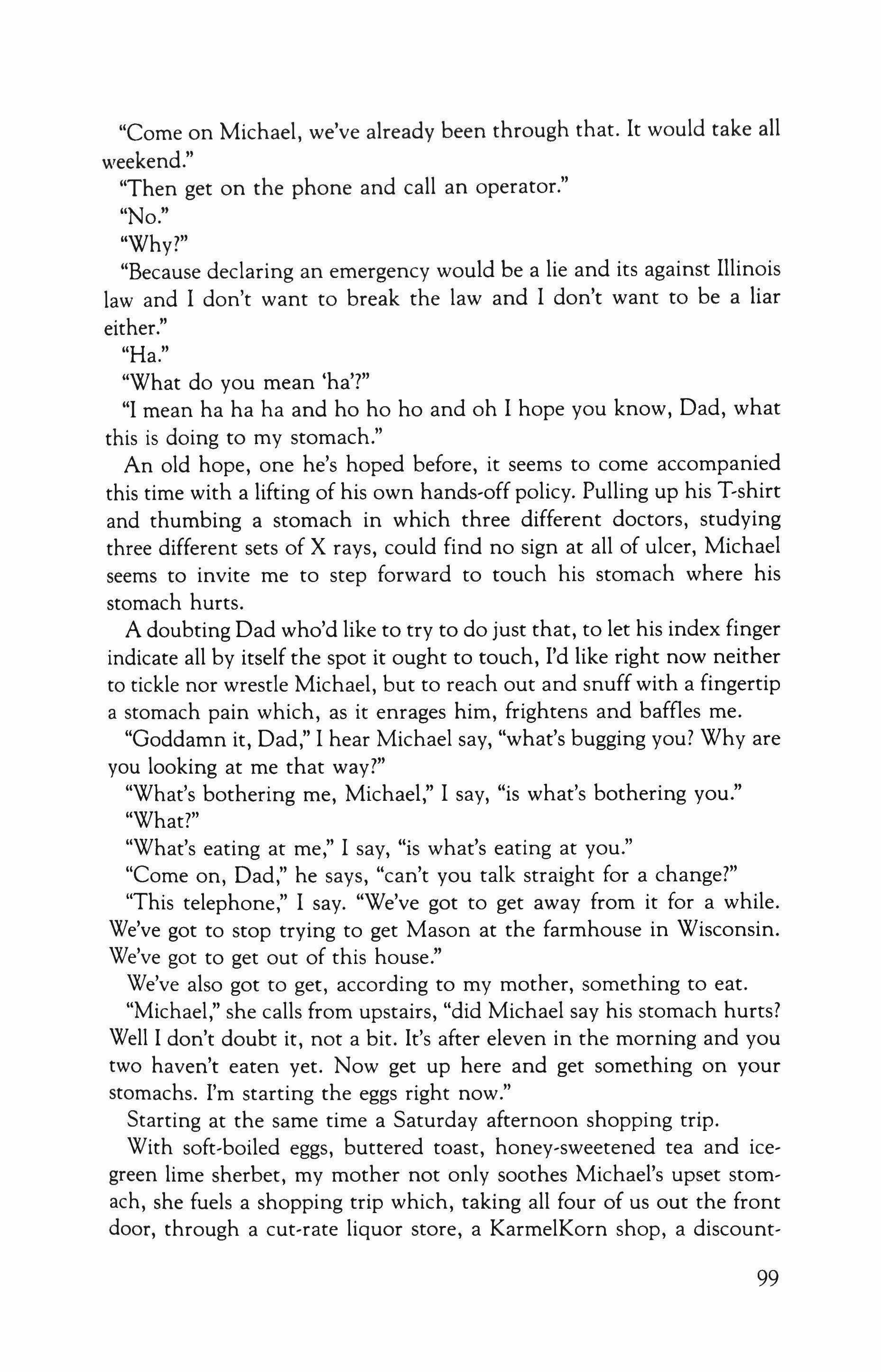
"Come on Michael, we've already been through that. It would take all weekend."
"Then get on the phone and call an operator." "No."
"Why?"
"Because declaring an emergency would be a lie and its against Illinois law and I don't want to break the law and I don't want to be a liar either."
"Ha,"
"What do you mean 'ha'?"
"I mean ha ha ha and ho ho ho and oh I hope you know, Dad, what this is doing to my stomach."
An old hope, one he's hoped before, it seems to come accompanied this time with a lifting of his own hands-off policy. Pulling up his T-shirt and thumbing a stomach in which three different doctors, studying three different sets of X rays, could find no sign at all of ulcer, Michael seems to invite me to step forward to touch his stomach where his stomach hurts.
A doubting Dad who'd like to try to do just that, to let his index finger indicate all by itself the spot it ought to touch, I'd like right now neither to tickle nor wrestle Michael, but to reach out and snuff with a fingertip a stomach pain which, as it enrages him, frightens and baffles me.
"Goddamn it, Dad," I hear Michael say, "what's bugging you? Why are you looking at me that way?"
"What's bothering me, Michael," I say, "is what's bothering you."
"What?"
"What's eating at me," I say, "is what's eating at you."
"Come on, Dad," he says, "can't you talk straight for a change?"
"This telephone," I say. "We've got to get away from it for a while. We've got to stop trying to get Mason at the farmhouse in Wisconsin. We've got to get out of this house."
We've also got to get, according to my mother, something to eat. "Michael," she calls from upstairs, "did Michael say his stomach hurts? Well I don't doubt it, not a bit. It's after eleven in the morning and you two haven't eaten yet. Now get up here and get something on your stomachs. I'm starting the eggs right now."
Starting at the same time a Saturday afternoon shopping trip.
With soft-boiled eggs, buttered toast, honey-sweetened tea and icegreen lime sherbet, my mother not only soothes Michael's upset stomach, she fuels a shopping trip which, taking all four of us out the front door, through a cut-rate liquor store, a KarmelKorn shop, a discount-
99

record store, a Fannie May's, A Walgreen's, three used-furniture stores and the catalog department at Sears, lands us as it must, at Harry Applebaum's Haberdashery.
According to a sign in the front window, Harry Applebaum's Haberdashery {"66th Year Serving the Decatur Area"} specializes in hard-to-fit boys. Michael is not a hard-to-fit boy. But he is a hard-to-please boy. In this he has plenty of company from both boys and girls.
Through Bell Bottoms, Straight Legs, Boot Cuts, Flares and Original Levis Blue Jeans, through waxen stacks of ceiling-high denim that make Harry Applebaum's look more like a supply depot than a haberdashery, an army of teenage boys and girls riffle, jostle, giggle and buy.
So does Michael. And when he gets home, he scalds, he soaks. Bleeding ink-black to indigo-blue, emitting clouds of dye like intertwined, brass-riveted denim octopi, three pairs of Levis, their front pockets turned inside out, float in my mother's bathtub.
Tempted to kneel and dip my hand, to confer with a slurred sign of the cross a kind of blessing on my mother's indulging of Michael, I think a thought I kept thinking throughout our shopping trip: nothing, not even Mason's missing money, could spoil my mother's spoiling of us, could keep her from spending on us, this sunny Saturday afternoon, an awful lot of money.
Especially on Michael.
Looking down at the ink-black bowl of her bathtub, thinking vaguely of bathtub gin, some ancient alcoholic concoction denatured enough to make the drinking of it dangerous, I feel as I often feel in my mother's house, drunk before I've ever touched a drop.
It's fun, of course, to feel in my mother's house, drunk before I've ever touched a drop. But it's also a precondition. If I meet it with a first martini, I know I won't be able to stop until I've had far too many martinis.
Therefore, paying a personal penance for my mother's sin of denim, I tell myself that I'm not going to have another martini until 1 get Mason at the farmhouse in Wisconsin. And as if to congratulate that resolve, just as I flush the toilet and turn from the bathroom, the telephone rings.
It ought, of course, to be Mason calling from the farmhouse in Wisconsin. But all afternoon and evening long it isn't. It is, instead, one of the disabled.
I don't know why, but when she was working, my mother made out income-tax returns for a lot of the disabled. Especially telephone opera-
100
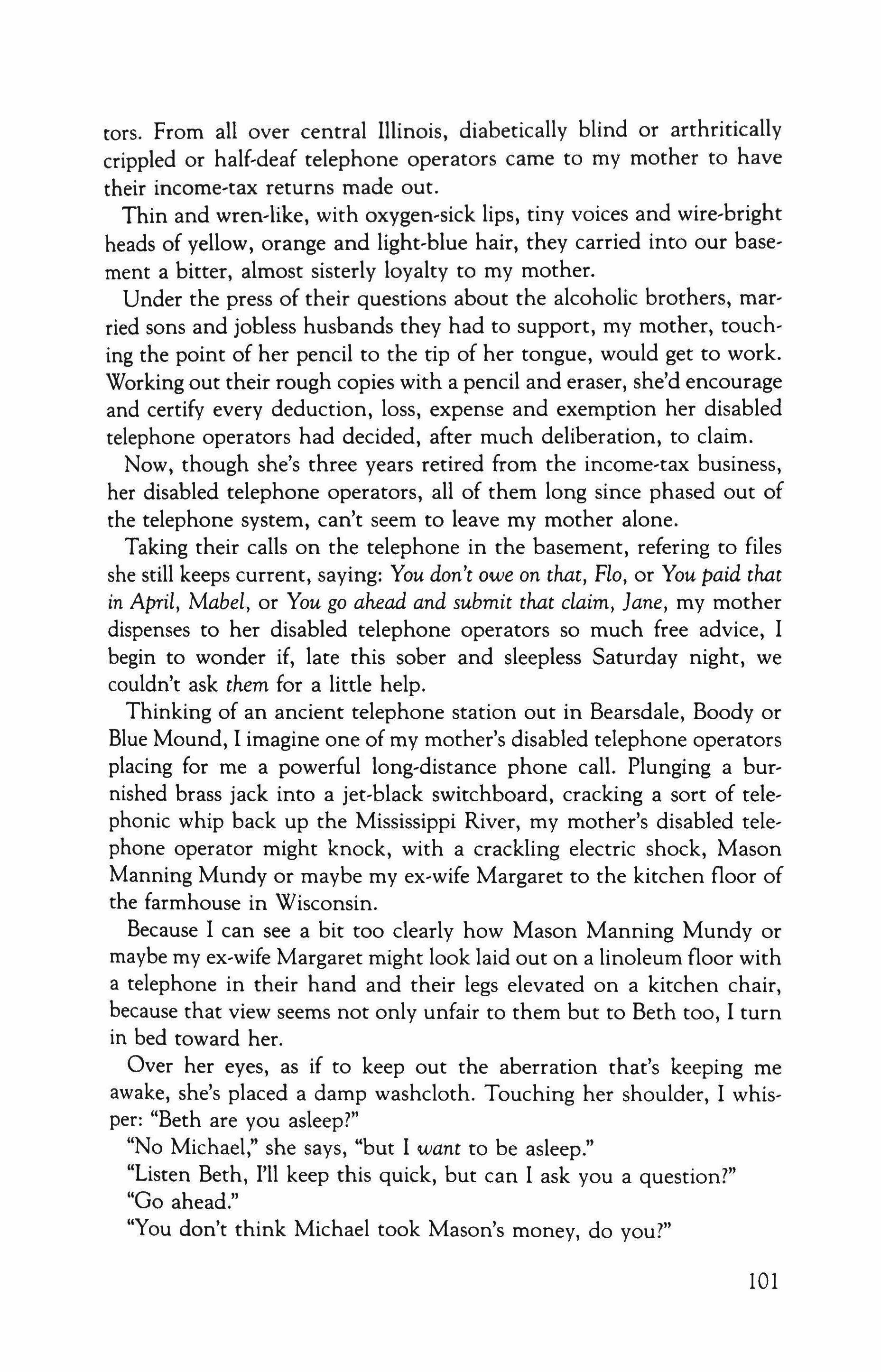
tors. From all over central Illinois, diabetically blind or arthritically crippled or half-deaf telephone operators came to my mother to have their income-tax returns made out.
Thin and wren-like, with oxygen,sick lips, tiny voices and wire-bright heads of yellow, orange and light-blue hair, they carried into our base' ment a bitter, almost sisterly loyalty to my mother.
Under the press of their questions about the alcoholic brothers, mar' ried sons and jobless husbands they had to support, my mother, touch, ing the point of her pencil to the tip of her tongue, would get to work. Working out their rough copies with a pencil and eraser, she'd encourage and certify every deduction, loss, expense and exemption her disabled telephone operators had decided, after much deliberation, to claim.
Now, though she's three years retired from the income-tax business, her disabled telephone operators, all of them long since phased out of the telephone system, can't seem to leave my mother alone.
Taking their calls on the telephone in the basement, refering to files she still keeps current, saying: You don't owe on that, Flo, or You paid that in April, Mabel, or You go ahead and submit that claim, Jane, my mother dispenses to her disabled telephone operators so much free advice, I begin to wonder if, late this sober and sleepless Saturday night, we couldn't ask them for a little help.
Thinking of an ancient telephone station out in Bearsdale, Boody or Blue Mound, I imagine one of my mother's disabled telephone operators placing for me a powerful long-distance phone call. Plunging a bur, nished brass jack into a jet-black switchboard, cracking a sort of telephonic whip back up the Mississippi River, my mother's disabled telephone operator might knock, with a crackling electric shock, Mason Manning Mundy or maybe my ex-wife Margaret to the kitchen floor of the farmhouse in Wisconsin.
Because I can see a bit too clearly how Mason Manning Mundy or maybe my ex-wife Margaret might look laid out on a linoleum floor with a telephone in their hand and their legs elevated on a kitchen chair, because that view seems not only unfair to them but to Beth too, I turn in bed toward her.
Over her eyes, as if to keep out the aberration that's keeping me awake, she's placed a damp washcloth. Touching her shoulder, I whisper: "Beth are you asleep?"
"No Michael," she says, "but I want to be asleep."
"Listen Beth, I'll keep this quick, but can I ask you a question?"
"Go ahead."
"You don't think Michael took Mason's money, do you?"
101
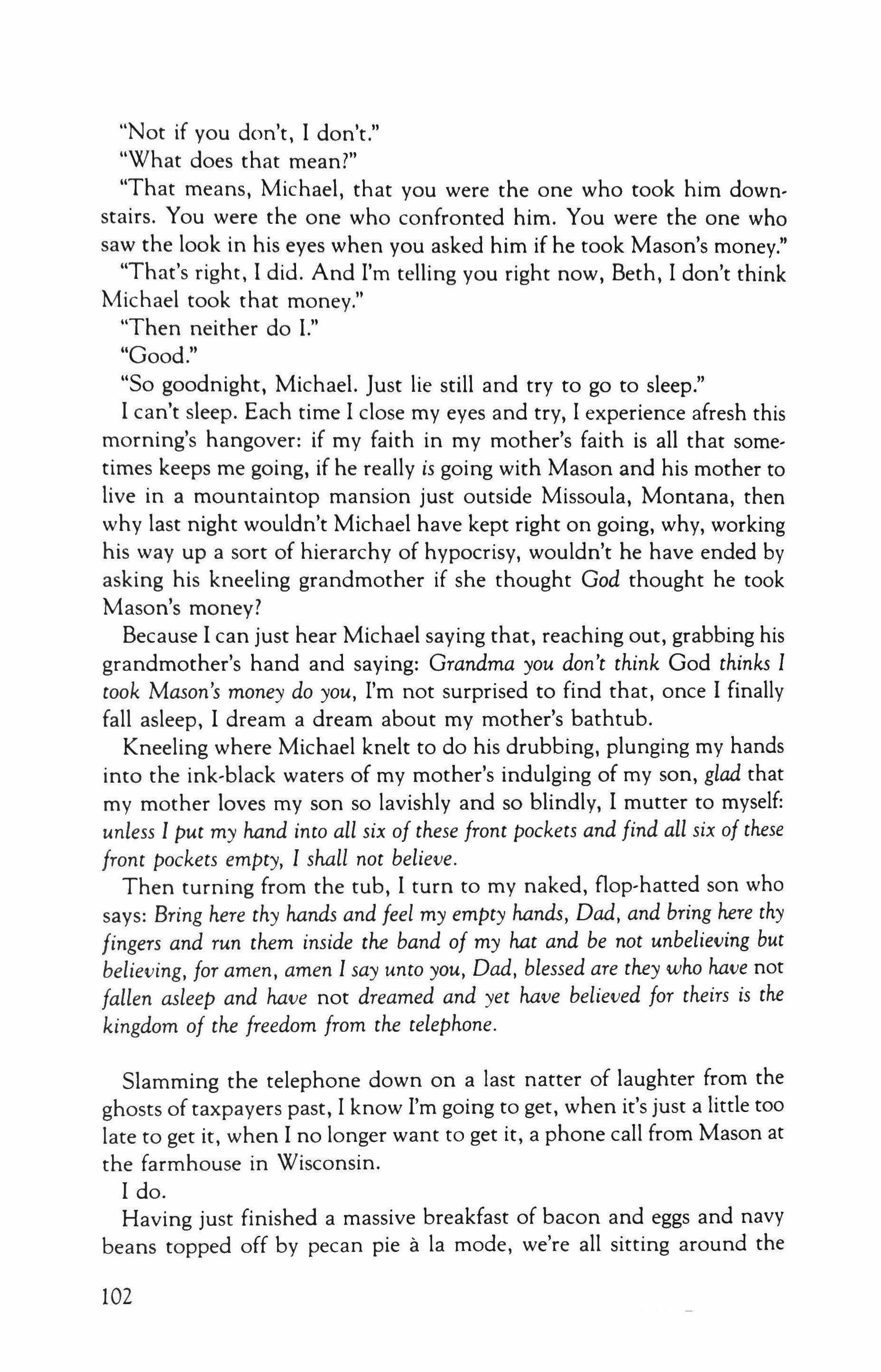
"Not if you don't, I don't."
"What does that mean?"
"That means, Michael, that you were the one who took him downstairs. You were the one who confronted him. You were the one who saw the look in his eyes when you asked him if he took Mason's money."
"That's right. I did. And I'm telling you right now, Beth, I don't think Michael took that money."
"Then neither do I."
"Good."
"So goodnight, Michael. Just lie still and try to go to sleep."
I can't sleep. Each time I close my eyes and try, I experience afresh this morning's hangover: if my faith in my mother's faith is all that sometimes keeps me going, if he really is going with Mason and his mother to live in a mountaintop mansion just outside Missoula, Montana, then why last night wouldn't Michael have kept right on going, why, working his way up a sort of hierarchy of hypocrisy, wouldn't he have ended by asking his kneeling grandmother if she thought God thought he took Mason's money?
Because I can just hear Michael saying that, reaching out, grabbing his grandmother's hand and saying: Grandma you don't think God thinks I took Mason's money do you, I'm not surprised to find that, once I finally fall asleep, I dream a dream about my mother's bathtub.
Kneeling where Michael knelt to do his drubbing, plunging my hands into the ink-black waters of my mother's indulging of my son, glad that my mother loves my son so lavishly and so blindly, I mutter to myself: unless I put my hand into all six of these front pockets and find all six of these front pockets empty, I shall not believe.
Then turning from the tub, I turn to my naked, flop-hatted son who says: Bring here thy hands and feel my empty hands, Dad, and bring here thy fingers and run them inside the band of my hat and be not unbelieving but believing, for amen, amen I say unto you, Dad, blessed are they who ha()e not fallen asleep and have not dreamed and yet have believed for theirs is the kingdom of the freedom from the telephone.
Slamming the telephone down on a last natter of laughter from the ghosts of taxpayers past, I know I'm going to get, when it's just a little too late to get it, when I no longer want to get it, a phone call from Mason at the farmhouse in Wisconsin.
I do.
Having just finished a massive breakfast of bacon and eggs and navy beans topped off by pecan pie a la mode, we're all sitting around the
102

kitchen table, our bags packed and lined up in the living room, when the telephone rings.
Rising and whispering: "I'll bet that's Mason, I'll bet he's calling from the farmhouse in Wisconsin," my mother moves swiftly to get it.
Snapping it up in mid-ring she says: "Oh good it's you Mason. Listen, you won't believe this, but you just caught them going out the front door."
Why my mother has to lie this way, I cannot say. But her lie turns me toward the front door. Leaking brilliant Sunday morning sunlight, it looks less like a door through which Mason could have just caught the three of us going, than it does the blown-open cargo hatch of a jetliner.
Flying high above a Mississippi River Valley of missing money, busy telephones and borrowed airfare, bound ultimately for distant and pro' hibitively expensive Missoula, Montana, it's a jetliner from which I feel right now an impulse to hurl myself, or if I'm somehow the jumpmaster, to kick Michael, Beth and my seventy-three-year-old mother.
But it's too late. Even as I feel above our heads the pop of four pale parachutes that would waft us safely down onto Decatur, I hear my mother call from the living room: "Michael, it's Mason, he's calling from the farmhouse in Wisconsin."
Rising to her bidding, I listen to my mother pull on me a very old, very unintentional trick: telling Mason all about the busy signal we've gotten for almost exactly forty hours now from the farmhouse in Wisconsin, about how we thought about calling an operator and declaring an emergency, but then thought better of it, she says: "But here's Michael, Mason, he'll tell you all about it."
Taking the telephone from my mother, I take a sort of Fifth Amendment: to all of Mason's questions about the busy signal we've gotten for almost exactly forty hours now from the farmhouse in Wisconsin, I answer so minimally and noncommittally, I draw from him a question I guess I want to draw: "What's the matter Michael," he says. "Did I get you at a bad time? Can't you talk?"
Nodding and saying: "Right Mason, hold on a second I'll be right with you," I put the telephone down and head for the basement.
It takes me a long time to get there.
On my way to the basement, I recall Michael's first response to Mason's allegation.
Speaking the word beautiful, Michael spoke in a way the truth: money placed in a wallet in eastern Iowa, money that showed up missing in a farmhouse in southwestern Wisconsin, cracking a telephonic whip down
103

the Mississippi River, knocked my pregnant wife to the floor in central lllinois.
No, my pregnant wife was already lying on my mother's living-room floor, but remembering the way in which, wide-eyed and pregnant, Beth held the telephone up to me, remembering how floored she looked by the telephone she'd answered, I take up, in taking up the telephone in the basement, a sort of gauntlet.
Thinking of a negative credo that I myself might shout, one in which, working my way up from Beth to my mother through the angels and the saints, I wouldn't stop shouting until I got to God, until I screamed: God damn it Mason, I don't even think God thinks Michael took your money, I say: "Listen Mason, I've confronted Michael, and I really don't think he did it, I really don't think he took your money."
"Good, Michael, I'm glad to hear you say that."
"I'm glad, Mason, to be able to say it."
"But the only thing is, Michael, we've come up with something on this end of the line."
Clapping my hand over the phone and yelling: "Hey Michael, hey Mom. I've got it down here. You can hang up up there," I feel, to the click of a receiver coming down, dumbfoundedness tick through me.
Saying: "What's that you said again now Mason?" I hear Mason say: "I said, Michael, that we've come up with something on this end of the line."
"Oh. What's that?"
That's this. They have, do Mason and Margaret, a fellow who keeps a key to their house down in Iowa, a young bachelor named Ray, who, having been asked to do so this morning by Mason and Margaret, turned up, when he had a look around Michael's room, an empty Excedrin bottle he said smelled like grass and also some cash.
"How much cash, Mason?"
"Not much, Michael. Only about three bucks. But the thing is, when Ray was getting ready to lock back up, a kid came up on a bike looking for Michael."
Up the sidewalk, looking a little like Michael, I see the kid coming, a torn T-shirted, muscle-pumped kid on a high-seated, ten-speed Schwinn. When he triple-grips to a stop in front of Ray, I hear Mason say: "Well, Ray said the kid said Michael owed him fifty dollars."
"Fifty dollars?"
"That's right and Ray said the kid said Michael said he was going to get the money this weekend from his Grandma in Illinois."
When I say "Oh," Mason says: "So anyway Michael, we don't want to
104

butt in but the thing is, we just don't think Michael should have that kind of money to spend. At least not right now. At least not to repay a debt he shouldn't have incurred in the first place."
"Right Mason. So what do think we should do?"
"1 don't know."
Thinking: neither do I, neither do I, 1 hear myself say: "O.K., Mason, I'll tell you what. Michael's coming back to Iowa broke. 1 mean with his pockets absolutely empty. I mean with his pockets turned absolutely inside out. I'll take care of that much on this end of the line."
"O.K., I'll deal with the rest when we get back down to Iowa. So long Michael."
"So long Mason."
Long, long do I sit at my mother's income-tax table.
Oh, what a gas for the ghosts of taxpayers past. From lawn chairs and folding metal chairs, one by one, they rise and advance toward me. With rubber bands bound round their fists, providing fistfuls of sharp, sharp pencils, spreading out white affidavits before me, they whisper: Ifyou're pissed at Mason, sign this form, if you think that Mason with all his money couldn't touch your rich, rich weekend in Decatur, sign this form, if you want to claim the total exemption of the ink-black martini, sign this form, if you could absolutely drown in drunken spite of Mason and your ex-wife Margaret, sign this form.
Shaking my head and pushing back their forms, I call out: "Hey Mom. Can I talk to you for a second? Down here please?"
Ripping from the adding machine a lengthy piece of tape, recalling how often I've seen my mother do the same, I hear her say: "So anyway, Michael, what did Mason have to say?"
"No much. Sit down. I need to ask you a question Mom."
"What's that, Michael?"
"Did you give Michael any cash? Did you give Michael any money?"
"Michael I told him Friday night at the supper table that I was going to give him his birthday money. You were sitting there. You heard me say that."
"I missed it Mom."
"Well I said it. You can ask Beth if you don't believe me."
"I believe you. How much?"
"Fifty dollars."
"Did you give it to him yet?"
"Just before he went to bed last night."
Blinking back the blowing out of a blue votive light, I say: "You've got to take that money back Mom."
105

"Why?"
"Because Mason says Michael's begun to borrow money he can't pay back, that's why."
"But it's Michael's birthday money, Michael. I promised a long time ago to give it to him this weekend."
"I don't care Mom. You've got to take that money back. Michael's got to learn he's not going to have you around to help him out all the time."
"Well you're right about that Michael," she says. "I'm seventy-three years old. I'm not getting any younger."
Yes she is. Every time my mother says that she's seventy-three years old, that she's not getting any younger, her words, making her look about ten years younger, fill me with a sharp alcoholic hunger.
Swallowing it back, I say: "O.K. Go on upstairs Mom. Send Michael down. He's going back to Iowa broke."
"Well Michael," she says, "you're Michael's father. You're the boss. You know what's best."
Then she's gone up the stairs and Michael is slamming down them, screaming: "Goddamn it Dad. What did you say to Grandma? She's crying. You made her cry."
"No I didn't Michael, you did."
"I did? How?"
Like this. Up the sidewalk of the house in Iowa comes again the tenspeed kid. This time he's on a very red, very high-seated Schwinn and even before he can triple-brake to a stop in front of Ray, I hear Michael say: "Ray? That faggot? That sneak? That creep? That's my birthday money you're talking about Dad."
"Not to repay a debt you shouldn't have incurred in the first place, it's not. That money's going back to your Grandma."
"Grandma doesn't want that money back Dad. And you can't make me give it back to her either."
Overhead the naked bulb is bright and standing toe-to-toe with Michael, I say: "Look Michael, I'm not afraid of you, I'm afraid for you."
"Jesus Dad," he says, "What does that mean?"
"That means, Michael, you just get your ass up those stairs and hand that money back to Grandma."
"Make me."
To make Michael give his birthday money back to his grandmother, to force his hand into his back pocket, to force my mother's hand to grasp a fifty-dollar bill she didn't want to grasp, to impose upon the two of them an object lesson, the object of which is slowly but completely
106

losing itself upon me, is to draw from Michael a comment upon that loss.
Grunting, "Ah fuck," he slams up the basement stairs and, to the chuckle of the ghosts of taxpayers past, I follow him.
Hoping in a way to see Michael standing alone in the living room with a fifty-dollar bill clipped between his teeth, I imagine a second wrestle Michael and I might wrestle. Beginning with a hand-grapple and moving through armlock, hammerlock, then into full nelson, it would conclude not so much with the spitting out by my son of my mother's money, as it would in the roseate nose, chin and ear abrasions of deep, deep carpet burn.
But when I get upstairs, I find that Michael's gone, that the house is empty.
Picking up my bag and walking out the door, I see that he and Beth are in the car, that my mother is standing at the opened door on the driver's side, waiting for a goodbye kiss.
To kiss my mother goodbye is an orthopedic experience. Touching my lips to her forehead, I feel the thump of her feet on concrete, I walk once more the walk that took us this morning to and from church. Unable not to imperil that walk, unable, when I stationed myself outside church waiting for my mother until mass was over, not to imagine ice on the sidewalks and purse snatchers behind the bushes, I look now into the car at Beth's bare feet.
Braced on the dashboard as if in anticipation of the dangers of the interstate, they fill me with the care I know I'm going to take in getting us safely back and forth today across the Mississippi River.
Ducking into the driver's seat, closing then locking the door, snapping my seat belt and starting the car, I know I'm about to get from my mother a word that will move this goodbye far beyond the Mississippi River.
That word is Montana, and get it I do. Leaning into the window, invoking the name of a state undoubtedly as tough as any in the country on Levi wear, she blinks her eyes and says: "Well Michael I hope you get a lot of good wear out of your Levis. Is Grandma going to get to see you again before you move to Montana?"
It is a question that, hitting a brake and throwing a seat release that I myself haven't touched, slams me into the steering wheel.
With his entire upper body wedged out the driver's side window, Michael wraps his grandmother in a hug so tight and heedless of me, I fear the blast of a car horn against my chest.
Pushing away from a horn I feel within my heart, a horn about to
107

blow, about to go, thinking: Now you two stop that hugging, you're going to hurt me, you're going to hurt me, I turn, having run out of turns, toward Beth.
The look she gives me, a look of scrutiny and fresh assessment, says unequivocally: Go.
To the pop of the clutch, to the thump of Michael's weight hitting the back seat, waving goodbye to goodbye-waving mother, we do, we go.
108
Two Poems
Garrett Kaoru Hongo

Billboard: Portrait of a Lady
Sheathed in a lucent, sky-blue Spandex suit, she reclines on her right side on the import-store rattan mat, her back seething with oil and the metallic sheen of pricey, unenameled cookware. Her legs bounce in lazy, parallel waves to the fuzzy bassline of the rocktune blasting from the PM, stereo in her screened,in porch and over the shining jasmine bush electric with scent and the delirious, nectared hum of bees. Once in a while, to a soul ballad or bossa nova on the charts, she twitches her freckled shoulders, shimmies the lycraed stomach a little, pops the fizzing vent on a sweating can of diet cola chilled in the pet-size cooler lying agreeably beside her. It's Monday or Thursday on the front lawns and concrete driveways, Tv-time for the neighborhood's aged, PTA for amiable mothers, alcohol and free-base for the rock-and-roll unemployed. She suns herself because she's none of these, has leisure and a B.A., part-time work as a pool-typist or scriptgirl for the movies. She's waiting for a deal, some new idea or fresh starta party to go to, a car to shop for, the new boy at acting school to ask her to Vegas or Mazatlan, for her old man to stash enough away from his straight job for the down on their pleasure sloop
109
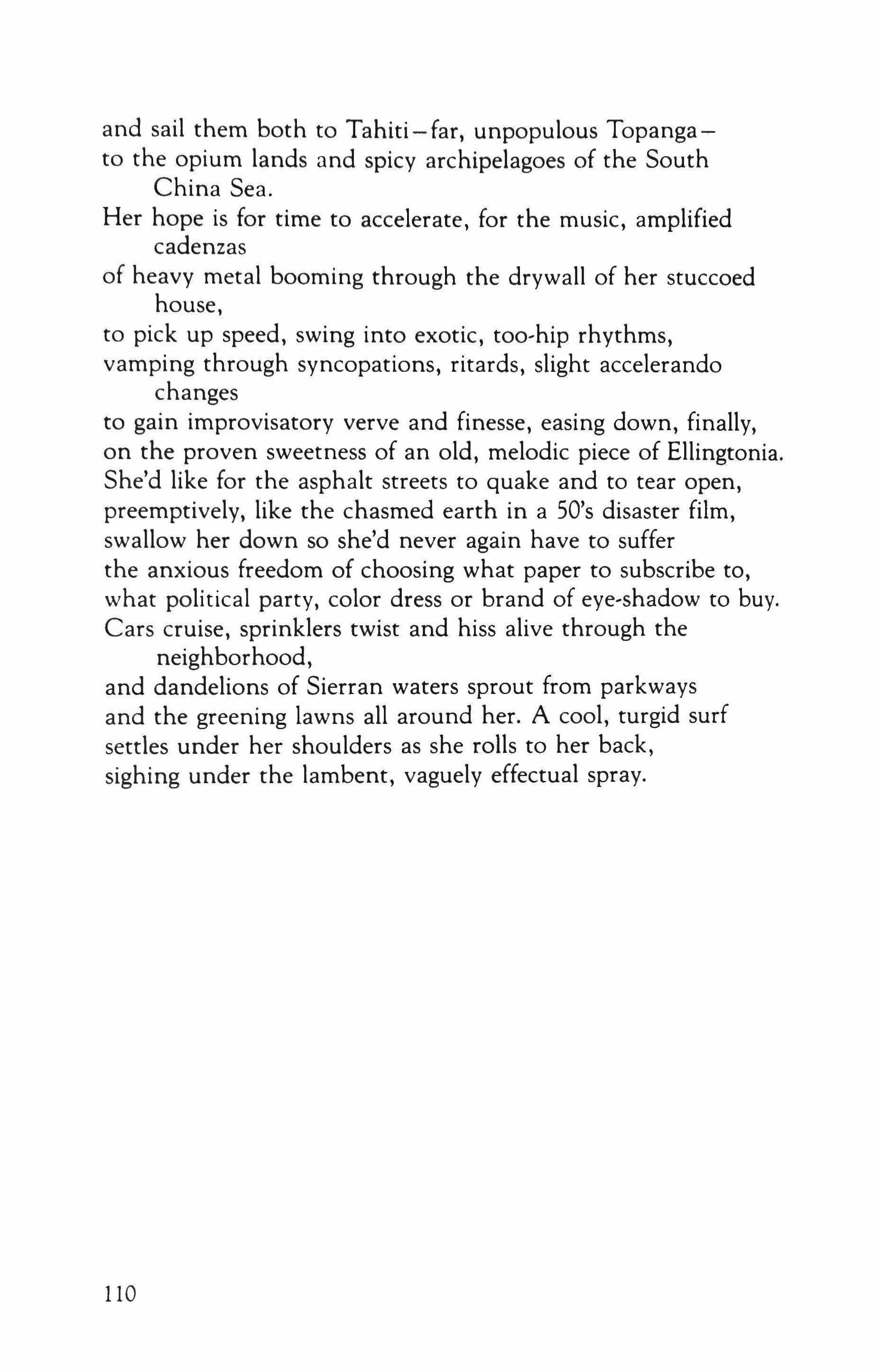
and sail them both to Tahiti-far, unpopulous Topangato the opium lands and spicy archipelagoes of the South China Sea.
Her hope is for time to accelerate, for the music, amplified cadenzas of heavy metal booming through the drywall of her stuccoed house, to pick up speed, swing into exotic, too-hip rhythms, vamping through syncopations, ritards, slight accelerando changes to gain improvisatory verve and finesse, easing down, finally, on the proven sweetness of an old, melodic piece of Ellingtonia. She'd like for the asphalt streets to quake and to tear open, preemptively, like the chasmed earth in a 50's disaster film, swallow her down so she'd never again have to suffer the anxious freedom of choosing what paper to subscribe to, what political party, color dress or brand of eve-shadow to buy. Cars cruise, sprinklers twist and hiss alive through the neighborhood, and dandelions of Sierran waters sprout from parkways and the greening lawns all around her. A cool, turgid surf settles under her shoulders as she rolls to her back, sighing under the lambent, vaguely effectual spray.
110
Four Chinatown Figures

In a back alley, on the cracked pavement slick with the strewn waste of cooking oil and rotting cabbages, two lovers stroll arm in arm, the woman in furs and a white lame dress with matching pumps, her escort in tux casually worn-the black tie fashionably undone, the double-breasted, brushed velvet coat unbuttoned. They're a Wilshire lawyer and a city planner out on the town. When they pass the familiar curio of the copper wishing well, they spend a minute considering the impotent, green nozzle of its fountain garnished with a miscellany of immortal sages, quaint totems spouting an aqueous wisdom cascading through their mouths and baggy sleeves.
The reflecting pool, streaked with rust and speckled blue willow or turquoise as a robin's egg from the small litter of coins idle as frogs wintering on its bottom, catches the neon and the starlight in a calligraphy of red and silver, dragonlike ephemera, sporting lazily across the black glaze of homely water. The lawyer kisses his date and tosses some bus change, balls up the foil wrapper from an after-dinner mint and throws that, while she laughs, shaking her head back so the small, mousse-stingered whips on the ringlets of her hair shudder and dress sequins flash under the sore, yellow light of streetlamps.
Two dishwashers step from the back door of the Golden Eagle arguing about pay, about hours, about trading green cards with cousins for sex, set-ups with white women, for choice cigarettes or a heated room to sleep in on a dry, newspaper bed. Bok-guai, they curse with their eyes, Lo�fahn,. as the four nearly collide,
111
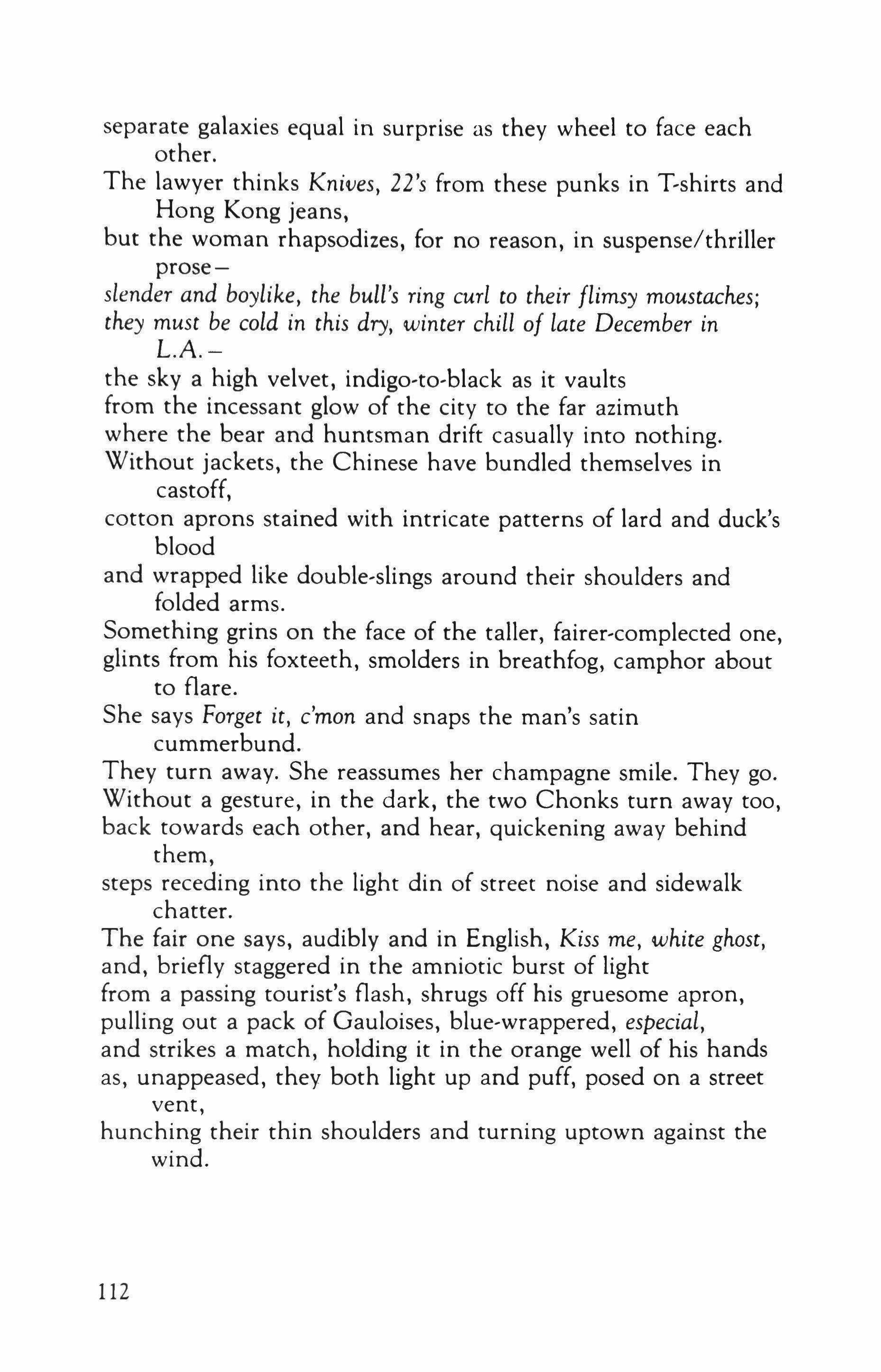
separate galaxies equal in surprise as they wheel to face each other.
The lawyer thinks Knives, 22's from these punks in T-shirts and Hong Kong jeans, but the woman rhapsodizes, for no reason, in suspense/thriller proseslender and boylike, the bull's ring curl to their flimsy moustaches; they must be cold in this dry, winter chill of late December in L.A.-
the sky a high velvet, indigo-to-black as it vaults from the incessant glow of the city to the far azimuth where the bear and huntsman drift casually into nothing. Without jackets, the Chinese have bundled themselves in castoff,
cotton aprons stained with intricate patterns of lard and duck's blood and wrapped like double-slings around their shoulders and folded arms.
Something grins on the face of the taller, fairer-complected one, glints from his foxteeth, smolders in breathfog, camphor about to flare.
She says Forget it, c'mon and snaps the man's satin cummerbund.
They turn away. She reassumes her champagne smile. They go. Without a gesture, in the dark, the two Chonks turn away too, back towards each other, and hear, quickening away behind them,
steps receding into the light din of street noise and sidewalk chatter.
The fair one says, audibly and in English, Kiss me, white ghost, and, briefly staggered in the amniotic burst of light from a passing tourist's flash, shrugs off his gruesome apron, pulling out a pack of Gauloises, blue-wrappered, especial, and strikes a match, holding it in the orange well of his hands as, unappeased, they both light up and puff, posed on a street vent, hunching their thin shoulders and turning uptown against the wind.
112
Two Poems
Betty Adcock
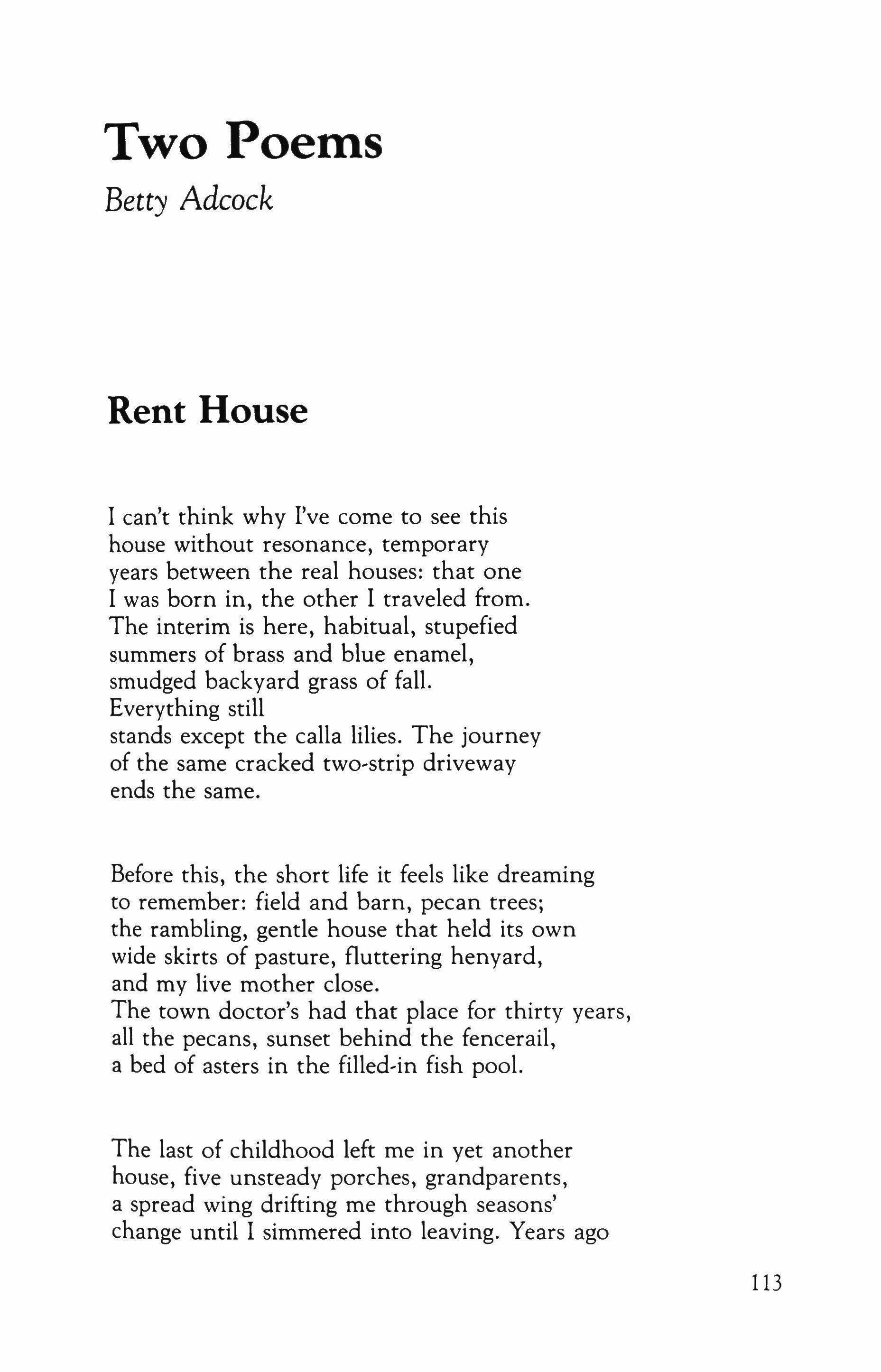
Rent House
I can't think why I've come to see this house without resonance, temporary years between the real houses: that one I was born in, the other I traveled from. The interim is here, habitual, stupefied summers of brass and blue enamel, smudged backyard grass of fall. Everything still stands except the calla lilies. The journey of the same cracked two-strip driveway ends the same.
Before this, the short life it feels like dreaming to remember: field and barn, pecan trees; the rambling, gentle house that held its own wide skirts of pasture, fluttering henyard, and my live mother close. The town doctor's had that place for thirty years, all the pecans, sunset behind the fencerail, a bed of asters in the filled-in fish pool.
The last of childhood left me in yet another house, five unsteady porches, grandparents, a spread wing drifting me through seasons' change until I simmered into leaving. Years ago
113

-
a retired contractor from Houston restored that one to unremembered splendor.

This narrow house between.
I look a long time, thinking I need imagination, but there's nothing to be made of such temporal defeat. How long was it we lived on this backstreet, behind screens billowing with rust? I remember how long one afternoon I wrote my whole name broad and hard in crayon on every single windowscreen in the house, and then was punished. Forsythia is the name of yellow flowers I watched darken in the wallpaper.
All night I'd listen to the child next door cry and cut teeth. Now he's a lawyer in San Francisco. I matched his howls with the ones I kept back. Both our voices ran down the moony street alongside crossed adult allegiances that roamed, ghostly as wolves, the lives of any town so old.
Nobody rented in a town like this. Why did papa bring me here to this aunt who pulls my hair? Where is my mother? Where's the calf you said was mine? What happened co the trees?
Then they'd drive me out there so I'd see fields wild with briers, the derelict house large and sad and creatureless. Until I lost even my loss, got used to one cramped hallway and a makeshift life, the tight backyard with no hen in it.
115

Here I staked a claim: from any room I could look up to see my name purple or lime-green against the sun, or clearer, larnplit on the night outside. Nothing they tried would get it off those years I thinned down, toughening, asthmatic in discovery and grief: how the self, amazed, swam up like bone through the lost landscape, through the mother's vanished flesh, through all remembered and all future home to build garish letters on the riddled air, knowing there's no place else. Not anywhere.
116
Digression on the Nuclear Age
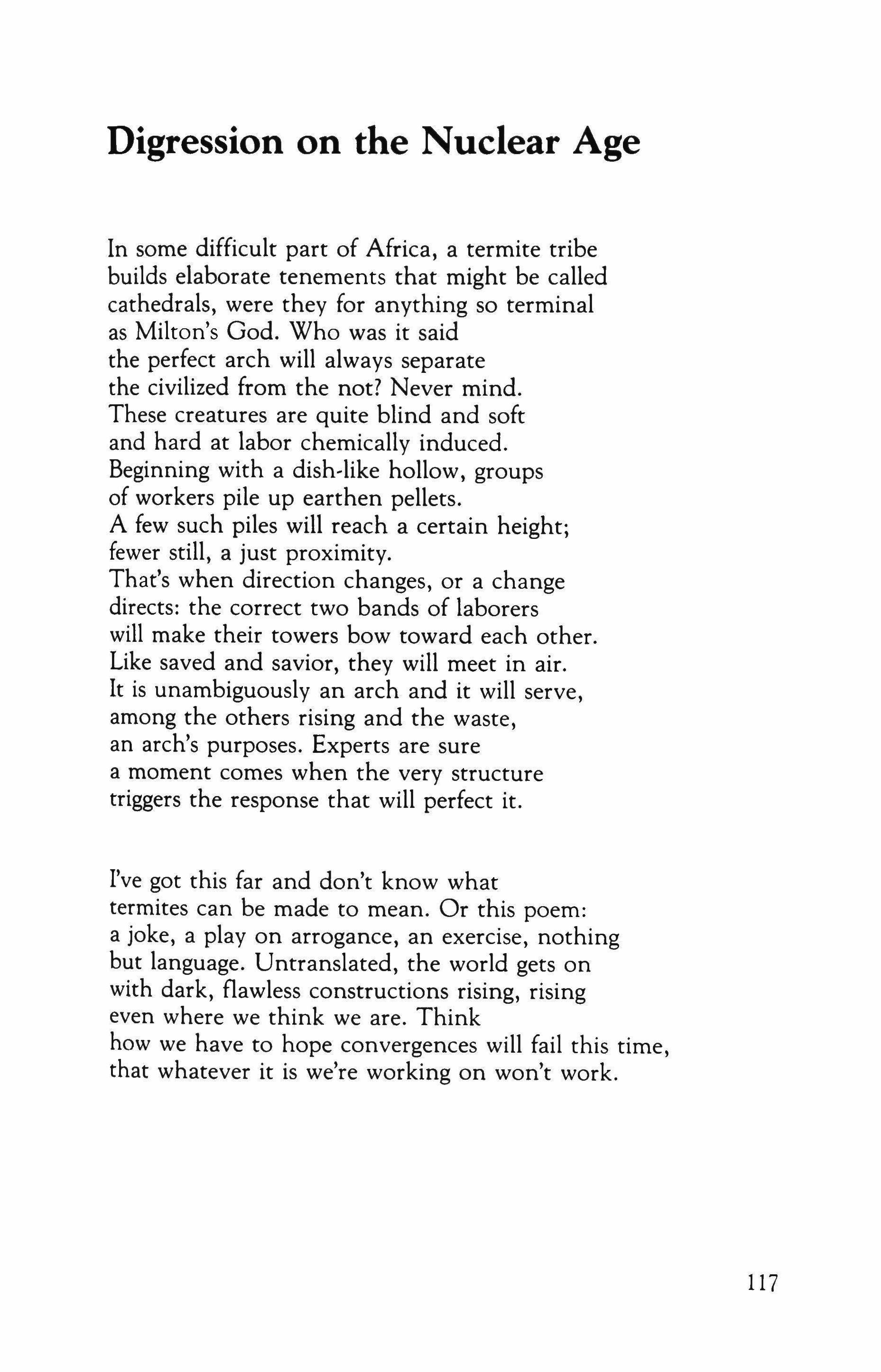
In some difficult part of Africa, a termite tribe builds elaborate tenements that might be called cathedrals, were they for anything so terminal as Milton's God. Who was it said the perfect arch will always separate the civilized from the not? Never mind. These creatures are quite blind and soft and hard at labor chemically induced. Beginning with a dish-like hollow, groups of workers pile up earthen pellets. A few such piles will reach a certain height; fewer still, a just proximity. That's when direction changes, or a change directs: the correct two bands of laborers will make their towers bow toward each other. Like saved and savior, they will meet in air. It is unambiguously an arch and it will serve, among the others rising and the waste, an arch's purposes. Experts are sure a moment comes when the very structure triggers the response that will perfect it.
I've got this far and don't know what termites can be made to mean. Or this poem: a joke, a play on arrogance, an exercise, nothing but language. Untranslated, the world gets on with dark, flawless constructions rising, rising even where we think we are. Think how we have to hope convergences will fail this time, that whatever it is we're working on won't work.
117
Poems from The Little Seafarer
Odysseus Elytis
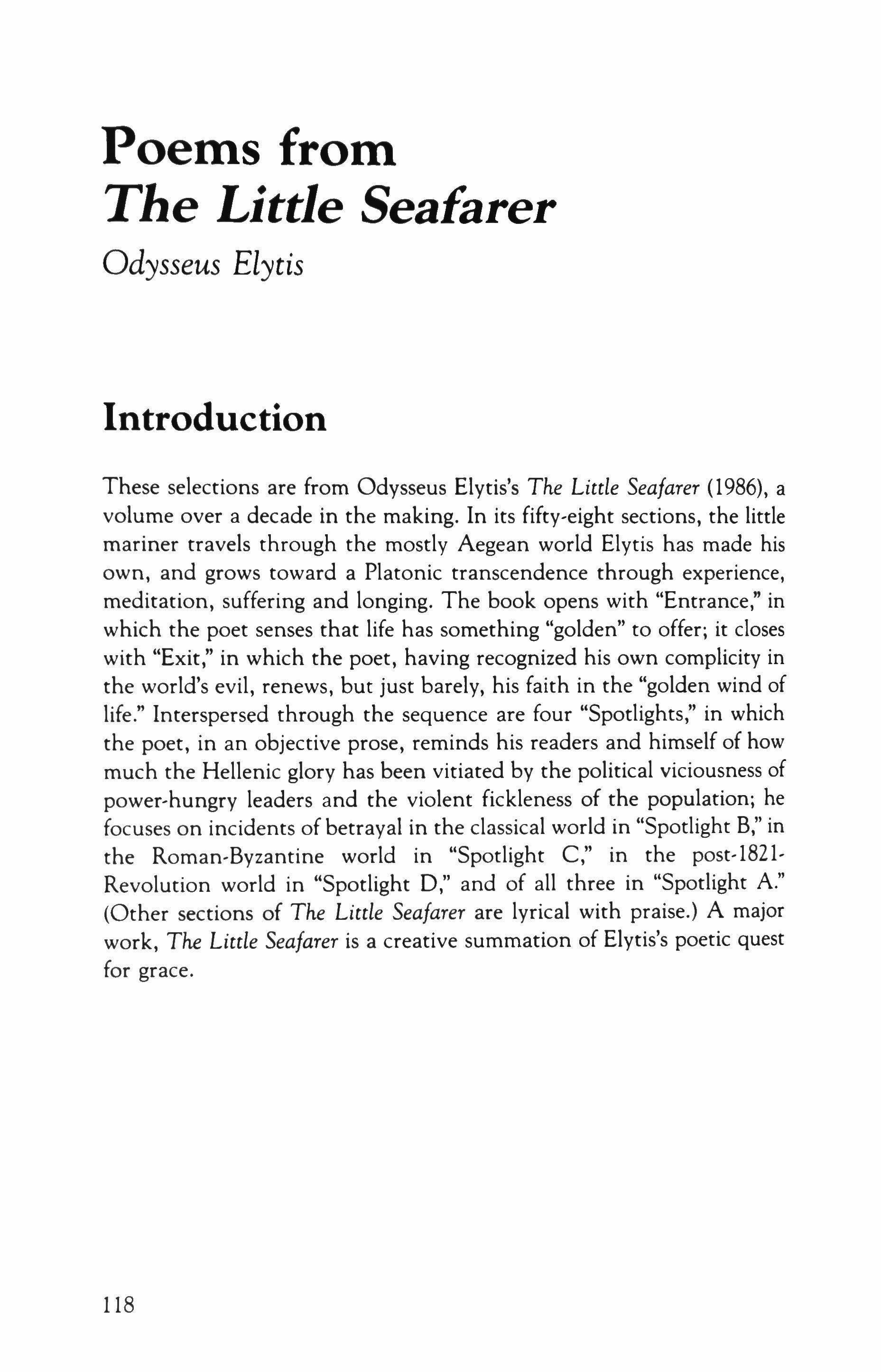
Introduction
These selections are from Odysseus Elytis's The Little Seafarer (1986), a volume over a decade in the making. In its fifty-eight sections, the little mariner travels through the mostly Aegean world Elytis has made his own, and grows toward a Platonic transcendence through experience, meditation, suffering and longing. The book opens with "Entrance," in which the poet senses that life has something "golden" to offer; it closes with "Exit," in which the poet, having recognized his own complicity in the world's evil, renews, but just barely, his faith in the "golden wind of life." Interspersed through the sequence are four "Spotlights," in which the poet, in an objective prose, reminds his readers and himself of how much the Hellenic glory has been vitiated by the political viciousness of power-hungry leaders and the violent fickleness of the population; he focuses on incidents of betrayal in the classical world in "Spotlight B," in the Roman-Byzantine world in "Spotlight C," in the post-I821Revolution world in "Spotlight D," and of all three in "Spotlight A." (Other sections of The Little Seafarer are lyrical with praise.) A major work, The Little Seafarer is a creative summation of Elytis's poetic quest for grace.
118
Entrance

SOMETIMES IT'S
no more than a glow behind the mountains-there toward the sea. Sometimes again a strong wind that stops suddenly just outside the harbors. And those who know, their eyes fill with tears
Golden wind of life why don't you reach us?
No one hears, no one. They all go holding an icon, and on it, fire. And not one day, one moment, in this place when injustice doesn't occur or some murder
Why don't you reach us?
I said 1'11 leave. Now. With whatever: travel bag on my shoulder; guidebook in my pocket; camera in my hand. Deep in the earth and deep in my body I'll go to find out who I am. What I give and what they give me; but left over, still, is injustice
Golden wind of life
119
Spotlight A
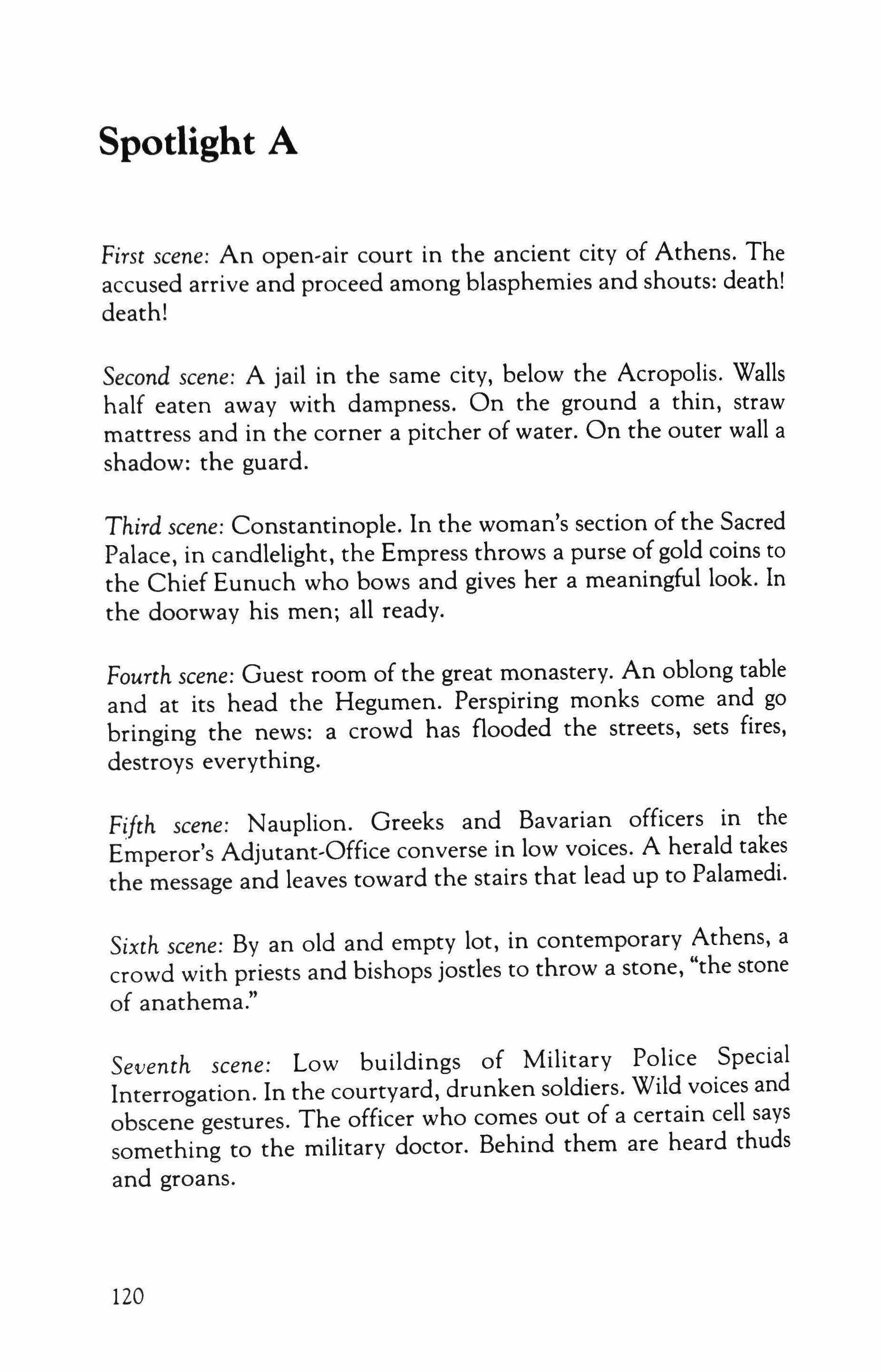
First scene: An open-air court in the ancient city of Athens. The accused arrive and proceed among blasphemies and shouts: death! death!
Second scene: A jail in the same city, below the Acropolis. Walls half eaten away with dampness. On the ground a thin, straw mattress and in the corner a pitcher of water. On the outer wall a shadow: the guard.
Third scene: Constantinople. In the woman's section of the Sacred Palace, in candlelight, the Empress throws a purse of gold coins to the Chief Eunuch who bows and gives her a meaningful look. In the doorway his men; all ready.
Fourth scene: Guest room of the great monastery. An oblong table and at its head the Hegumen. Perspiring monks come and go bringing the news: a crowd has flooded the streets, sets fires, destroys everything.
Fifth scene: Nauplion. Greeks and Bavarian officers in the Emperor's Adjutant-Office converse in low voices. A herald takes the message and leaves toward the stairs that lead up to Palamedi.
Sixth scene: By an old and empty lot, in contemporary Athens, a crowd with priests and bishops jostles to throw a stone, "the stone of anathema."
Seventh scene: Low buildings of Military Police Special Interrogation. In the courtyard, drunken soldiers. Wild voices and obscene gestures. The officer who comes out of a certain cell says something to the military doctor. Behind them are heard thuds and groans.
120
Spotlight B

First scene: Bedridden, with gangrene ofthe leg, Milriades has been carried to court and there, with amazement and extreme disheartenment, hears his condemnation.
Second scene: With perseverence, after his ostracism by the Athenians, Aristides gets on the ship which will take him away from his country.
Third scene: Phidias, thrown into jail like a criminal, slowly dies from old age and sorrow.
Fourth scene: The agents mobilized by the Thirty throw themselves into slaughter and plunder.
Fifth scene: On the jail's poor mattress, Socrates, after being condemned to death, drinks the hemlock and serenely expires.
Sixth scene: Alexander the Great, outside his tent, gives the order to exterminate his devoted General Parmenion.
Seventh scene: Amid the general uproar, Phocion and his friends, without being able to defend themselves, are condemned to death.
121
Spotlight C

First scene: The first Christian emperor Constantine gives the order to arrest and put to death his own son Crispus.
Second scene: Heraclius's men have led Theodore's nephew and bastard son Adalarichus to torture. They cut off nose, hands and right foot.
Third scene: After having blinded her underage son Constantine, Irene the Athenian proclaims the eunuch Staurakius Most High Chancellor.
Fourth scene: Theophano secretly leads her lover John Tsimises to the conjugal chambers of the palace for him to murder Nicephorus Phocas.
Fifth scene: In church, during the memorial service for the Emperor Theodore Lascaris, Michael Paleologus murders the underage John IV and takes his place.
Sixth scene: At Christmas matins, Michael the Stutterer, helped by six other conspirators, kills his benefactor Emperor Leo V.
Seventh scene: Andronicus Comnenus strangles his nephew Alexius and marries his widow, thirteen years of age.
122
Spotlight D

First scene: Odysseus Androutsos gives the order to arrest and execute the delegates of the Supreme Court, Noutsos and Panourgias.
Second scene: A special committee formed for court-martials condemns George Karaiskakis as a "malefactor and traitor to his country."
Third scene: Condemned to death, Theodore Kolokotronis is thrown into jail.
Fourth scene: Sunday morning, Nauplion, outside the church, Governor John Capodistria falls to the bullets of the Mavromichaelis family.
Fifth scene: Coming out of the Lyons station, in Paris, after the signing of the Treaty of Sevres, Eleutherios Venizelos is shot at by two Greek officers.
Sixth scene: During the German Occupation, the Greek Popular Liberation Army kills Colonel Psarros, who was struggling for exactly the same cause as the head of an independent partisan group.
Seventh scene: In Cyprus, men sent by the dictatorial government of Athens lay an ambush-with intent to kill-for President Makarios, who barely manages to escape.
123
BUT INCOMPREHENSIBLY
no one hears. The burning bird of Paradise goes ever higher. The voice was turned elsewhere and the eyes remained unmiracled.
tIelpless
are the eyes
One among thousands of murderers, I lead the innocent and powerless. I wrap myself in an ancient cloak and again descend the stone stairs beckoning and exorcising
tIelpless are the eyes, that you beckon to
Centuries now above the blue volcanoes. Far on my body and far on the earth that I tread I went to find out who I am. I stored up small happinesses and unexpected meetings, and here I am: unable to learn what I give and what they give me; but left over, still, is injustice
Golden wind of life
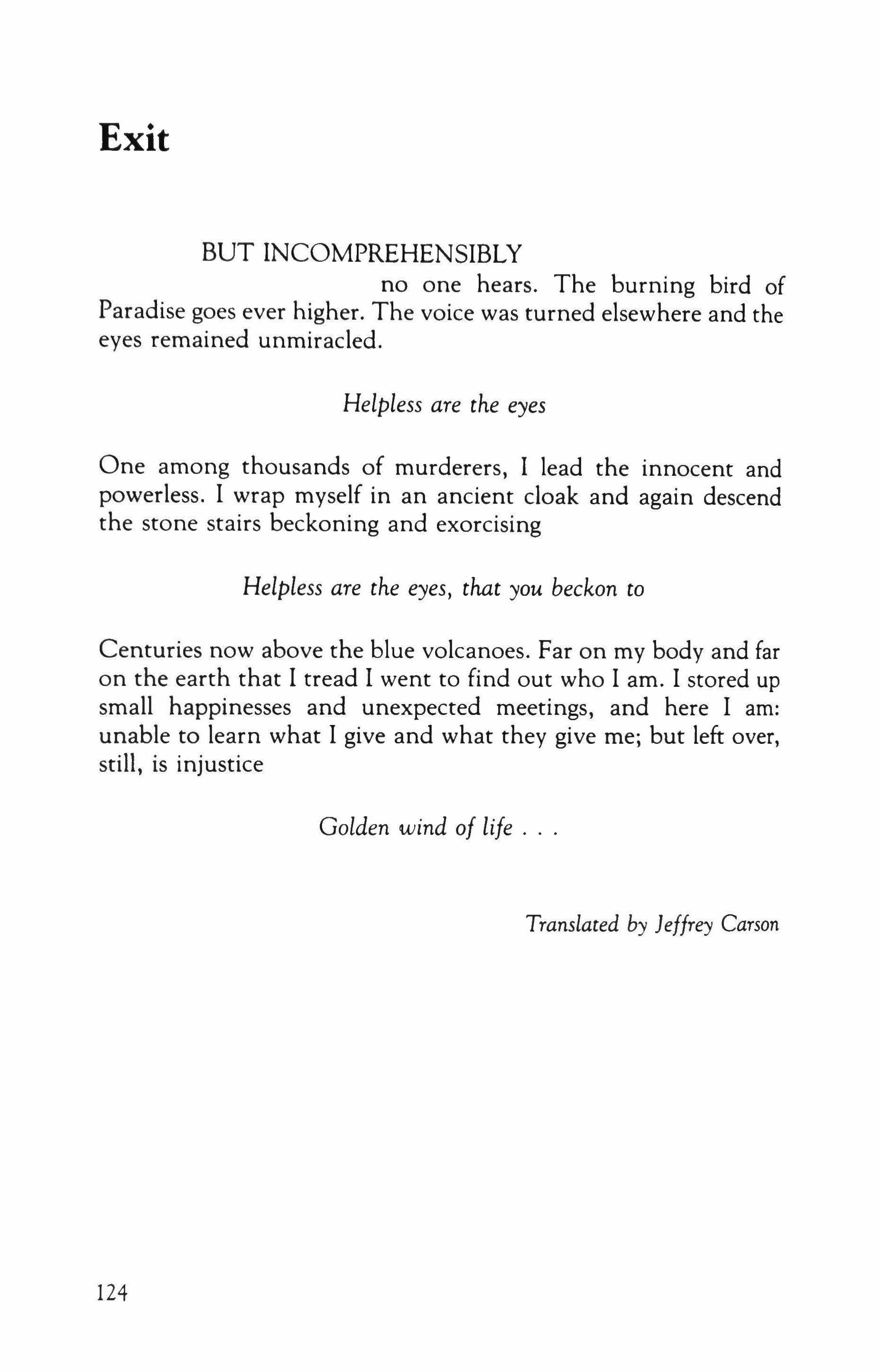
Translated by Jeffrey Carson
Exit
124
Notes to the Poems
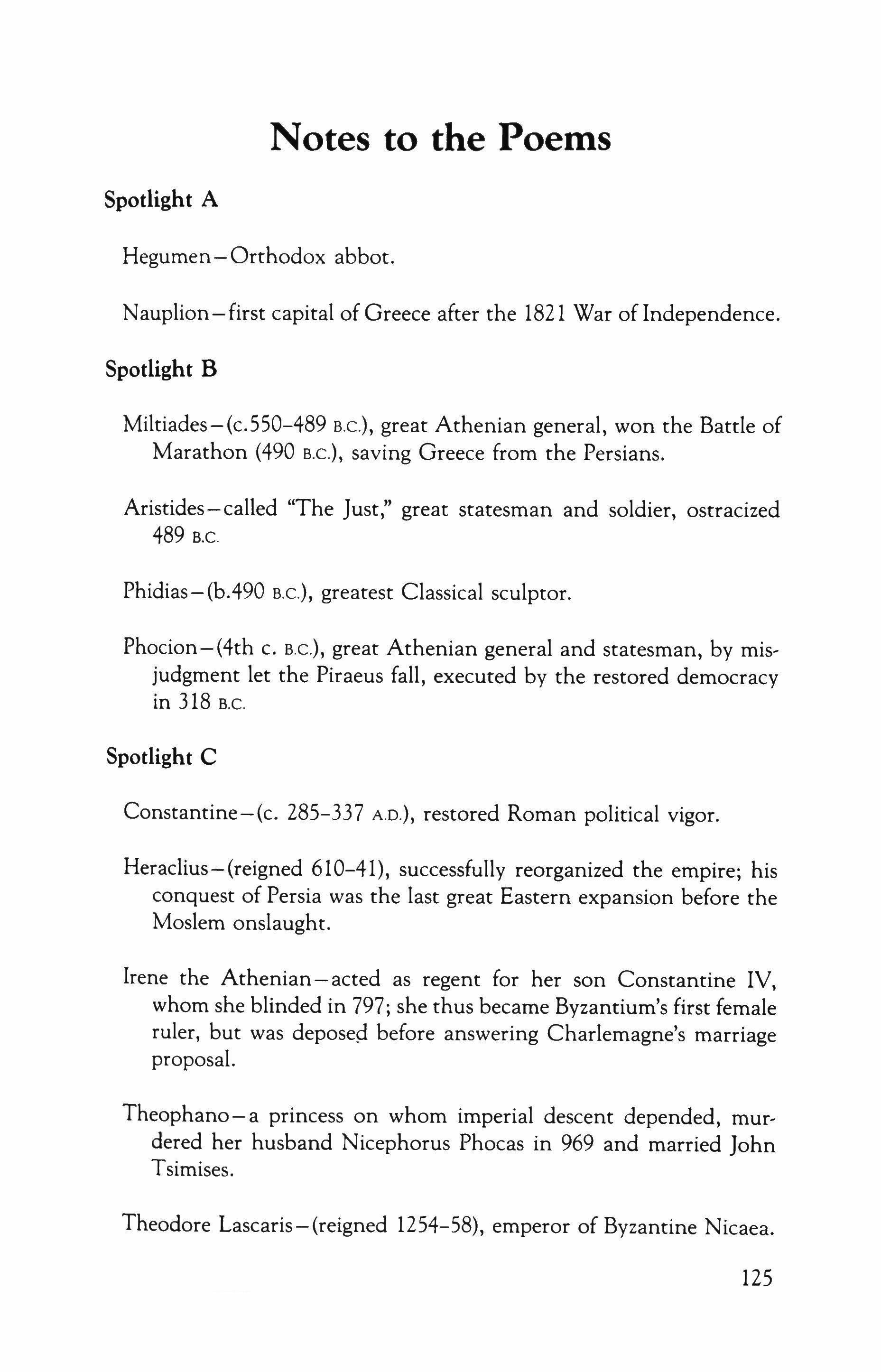
Spotlight A
Hegumen - Orthodox abbot.
Nauplion-first capital of Greece after the 1821 War of Independence.
Spotlight B
Miltiades-(c.550-489 B.C.), great Athenian general, won the Battle of Marathon (490 B.C.), saving Greece from the Persians.
Aristides-called "The Just," great statesman and soldier, ostracized 489 B.C.
Phidias- (b.490 B.C.), greatest Classical sculptor.
Phocion-(4th c. B.C.), great Athenian general and statesman, by misjudgment let the Piraeus fall, executed by the restored democracy in 318 B.C.
Spotlight C
Constantine-(c. 285-337 A.D.), restored Roman political vigor.
Heraclius-(reigned 610-41), successfully reorganized the empire; his conquest of Persia was the last great Eastern expansion before the Moslem onslaught.
Irene the Athenian - acted as regent for her son Constantine IV, whom she blinded in 797; she thus became Byzantium's first female ruler, but was deposed before answering Charlemagne's marriage proposal.
Theophano - a princess on whom imperial descent depended, murdered her husband Nicephorus Phocas in 969 and married John Tsimises.
Theodore Lascaris-(reigned 1254-58), emperor of Byzantine Nicaea.
125

MichaelllI Paleologus-crowned co-emperor with Theodore Lascaris's son John IV in 1259.
Leo V-(reigned 813-20}, called the Armenian.
Michael the Stutterer- Michael II the Amorian, a rough soldier, became emperor in 820.
Andronicus I-(d. 1185}, became emperor by strangling the legitimate successor; a bloody ruler, he was torn to pieces by a mob, angry at his suppression of the circus.
Spotlight D
Odysseus Androutsos-(l790-1825}, hero of the War of Independence, after victory was, in internecine rivalry, tortured and murdered by his enemies.
George Karalskakis-(1780-1827}, War of Independence hero, was arrested, then freed and killed in battle.
Theodore Kolokotronis-(1770-1863}, most renowned hero of the War of Independence, sentenced to death, then pardoned by the subsequent Greek/Bavarian monarchy.
John Capodistria-(1776-1831}, a Russian diplomat ofCorfiot origin, elected Governor of Greece in 1827, and organized the new country.
Eleutherios Venizelos-(1864-1936}, greatest statesman of modern Greece.
126
The Fates
John Haines

Atropos 0 el destine - Goya
North is east, south is west, first is under and over the last - all of our spells are spilled and lost.
We are the swallows you see, whose tongues are cut, whose wings were clipped, bunched on a wire.
And we are the spinster angels driven from Godwe have saved our scissors and kept our needles-
four old women who knit and knit the winds, and then in a muttering rage unthread the clouds.
We are done with porches to sit on, finished with trees and branches.
Daylight for us was bad, but night will be better: star and planet falling, lion and scorpion down
Think of your rooms and your furniture, make up your beds and pocket your keys:
127

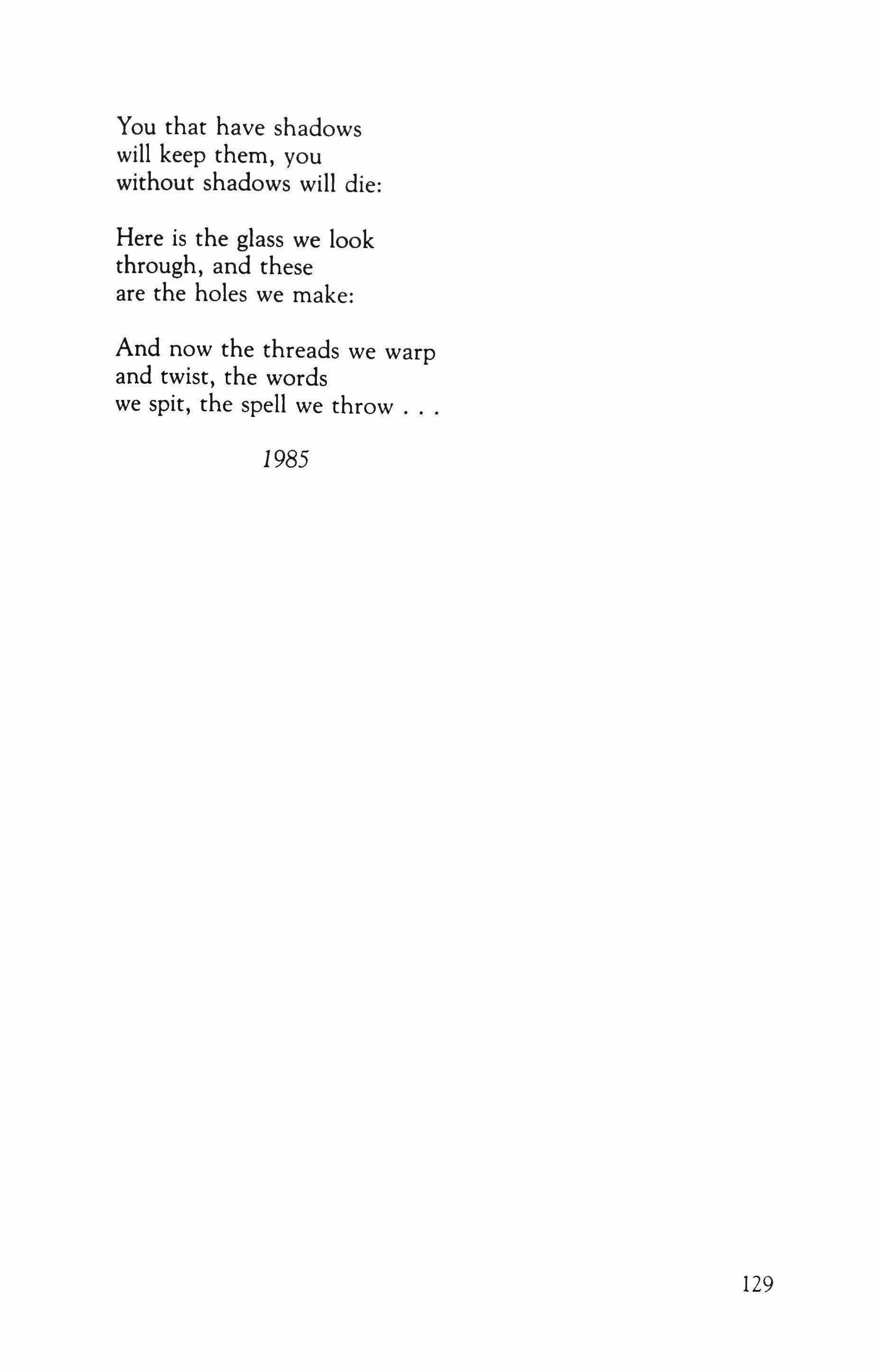
You that have shadows will keep them, you without shadows will die:
Here is the glass we look through, and these are the holes we make:
And now the threads we warp and twist, the words we spit, the spell we throw 1985
129
Distance
Cai Qi,jiao

Lying between the real and the imagined
You are a mountain flaming with red leaves, A mixture of sadness and joy at dusk; You are forest shadow, evening breeze And darkness on the way home.
Lying between the real and the imagined
You are the wild goose that keeps its promise, An unexpected meeting in the street; You are delightful laughter, brilliant light And a night capped off with a show of fireworks.
Lying between the real and the imagined
You are translucent white sculpture, Deep sleep illuminated by good fortune; You are mild fragrance of spring flowers, From the generosity of selfless Nature.
Lying between the real and the imagined
You are hostility without a reason, Painful longing on a gloomy rainy day; You are a cool moon, remote star And the abyss too mysterious to fathom.
Translated by Edward Morin and Dennis Ding
130
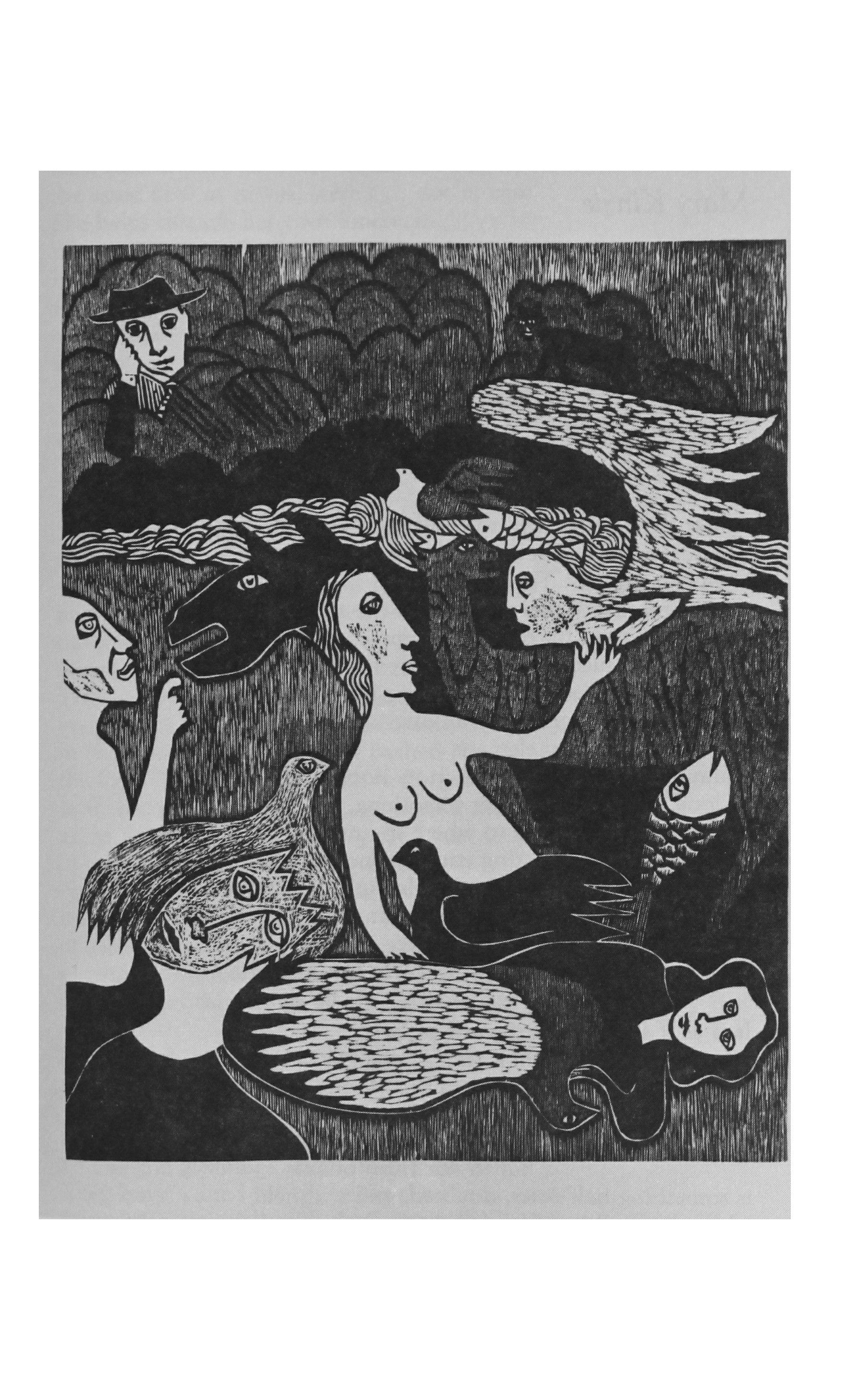
Autumn Eros
Mary Kinzie

When she came down, the child's composure held, ununderstanding she was far away from the familiar. The glint of loud machines so natural, like birds-these were the same, as were we two, flared in attitudes fending and succorant and faintly dazed above her stroller with its clicking wheels which she leans out breathtakingly to see. Turning in the airy element triumphant, like a porpoise in its hoop, to look back up at us, her torso long, her finger pointing up to where she marks our recognized, reflecting consciousnesses, she shows her pleasure in the pleasure she commands from everything, her very hands amused at their adroitness and obedience. And our breath is caught, as it was not in flight.
It is as if she burned the atmosphere. Like heat wicked from a star, or the gold ions poured down from an angel's mouth and forehead, the look of flame licking her upturned face licks at us, too.
But in our flush of awe is something half-done, doubted, and withheld while she is all ignition, full, by turns, and hungry and then fed - a kindling cosmos
132
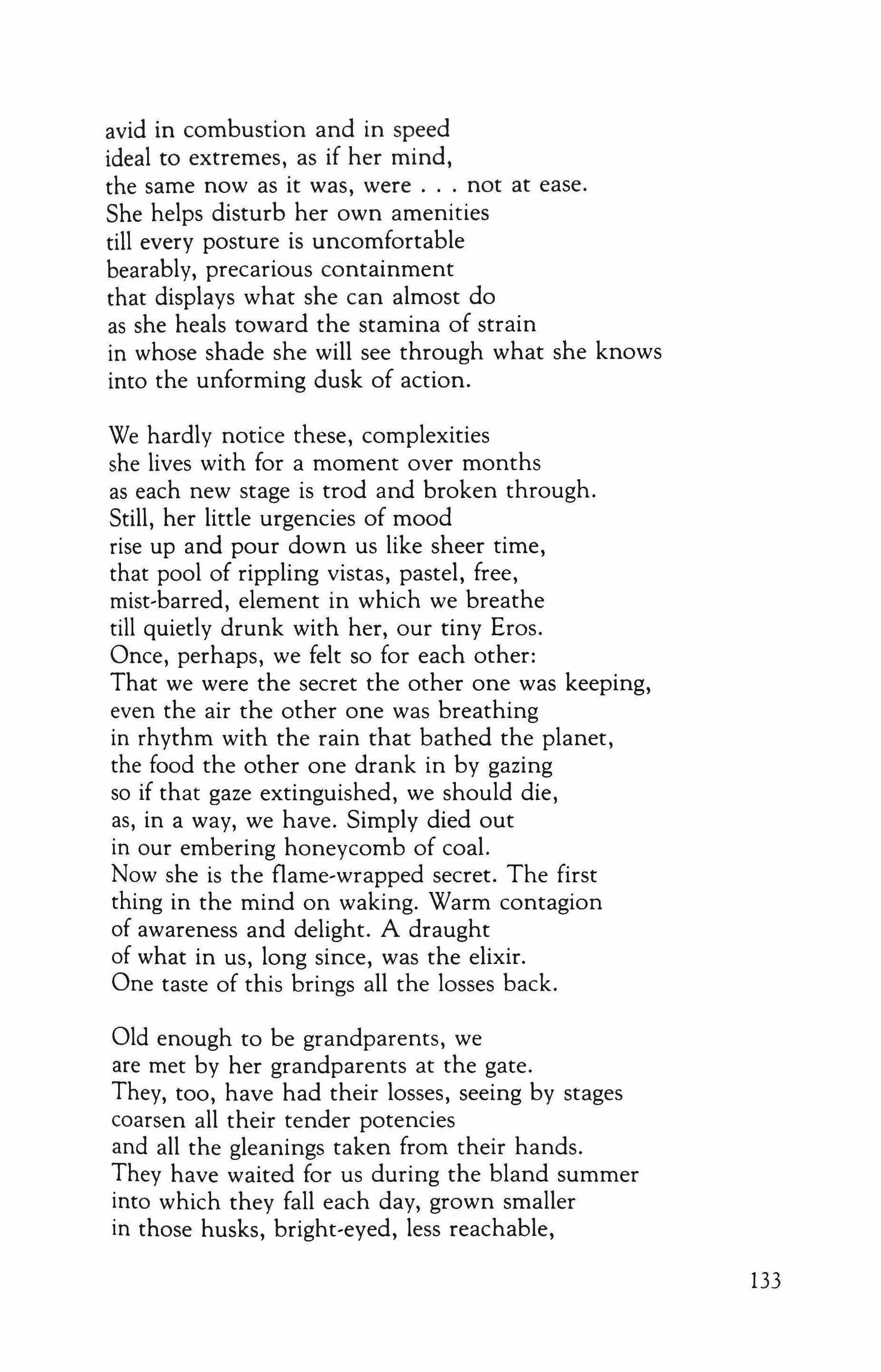
avid in combustion and in speed ideal to extremes, as if her mind, the same now as it was, were not at ease. She helps disturb her own amenities till every posture is uncomfortable bearably, precarious containment that displays what she can almost do as she heals toward the stamina of strain in whose shade she will see through what she knows into the unforming dusk of action.
We hardly notice these, complexities she lives with for a moment over months as each new stage is trod and broken through. Still, her little urgencies of mood rise up and pour down us like sheer time, that pool of rippling vistas, pastel, free, mist-barred, element in which we breathe till quietly drunk with her, our tiny Eros. Once, perhaps, we felt so for each other: That we were the secret the other one was keeping, even the air the other one was breathing in rhythm with the rain that bathed the planet, the food the other one drank in by gazing so if that gaze extinguished, we should die, as, in a way, we have. Simply died out in our embering honeycomb of coal. Now she is the flame-wrapped secret. The first thing in the mind on waking. Warm contagion of awareness and delight. A draught of what in us, long since, was the elixir. One taste of this brings all the losses back.
Old enough to be grandparents, we are met by her grandparents at the gate. They, too, have had their losses, seeing by stages coarsen all their tender potencies and all the gleanings taken from their hands. They have waited for us during the bland summer into which they fall each day, grown smaller in those husks, bright-eyed, less reachable,
133
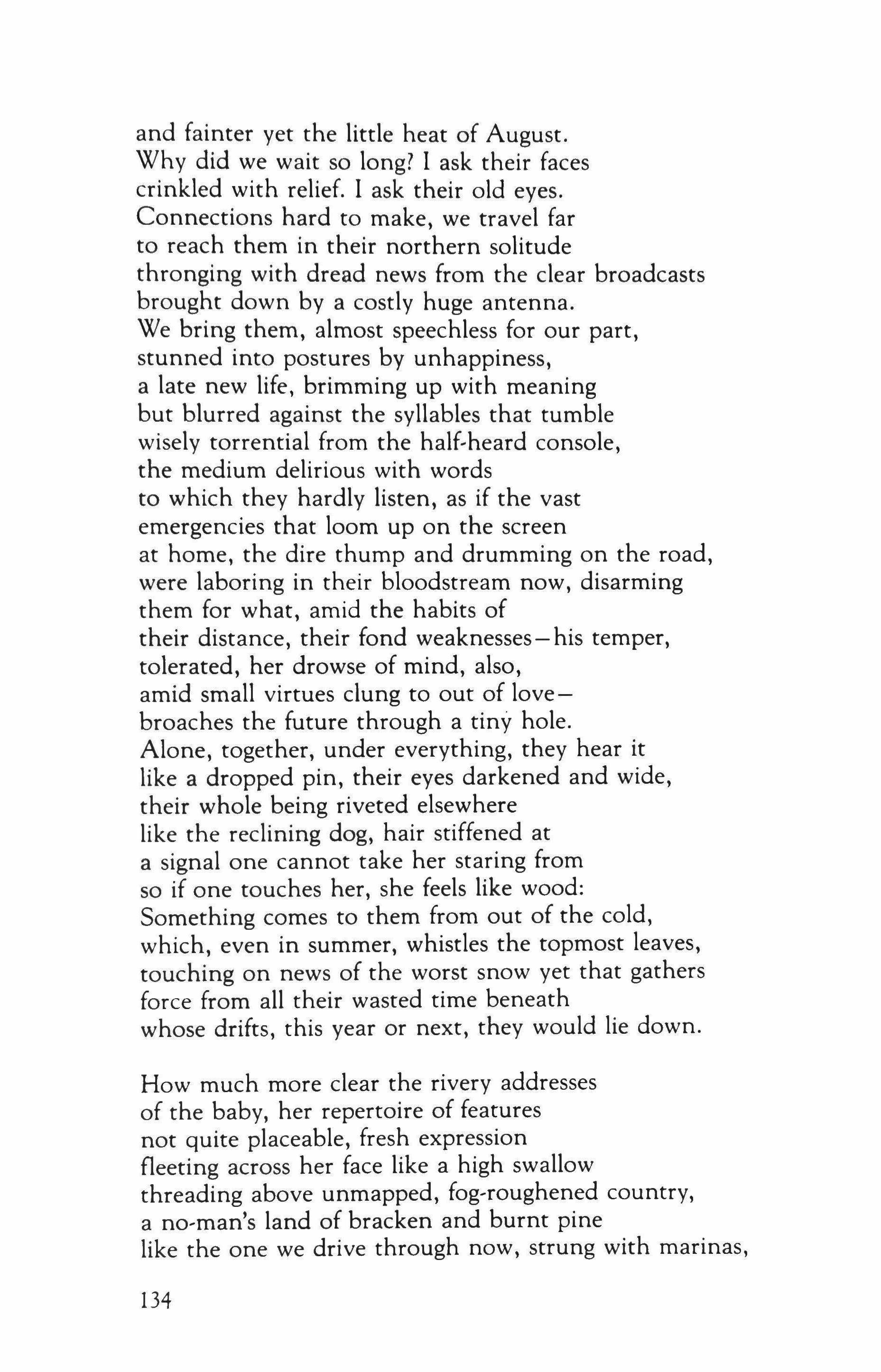
and fainter yet the little heat of August. Why did we wait so long? I ask their faces crinkled with relief. I ask their old eyes. Connections hard to make, we travel far to reach them in their northern solitude thronging with dread news from the clear broadcasts brought down by a costly huge antenna. We bring them, almost speechless for our part, stunned into postures by unhappiness, a late new life, brimming up with meaning but blurred against the syllables that tumble wisely torrential from the half-heard console, the medium delirious with words to which they hardly listen, as if the vast emergencies that loom up on the screen at home, the dire thump and drumming on the road, were laboring in their bloodstream now, disarming them for what, amid the habits of their distance, their fond weaknesses-his temper, tolerated, her drowse of mind, also, amid small virtues clung to out of lovebroaches the future through a tiny hole. Alone, together, under everything, they hear it like a dropped pin, their eyes darkened and wide, their whole being riveted elsewhere like the reclining dog, hair stiffened at a signal one cannot take her staring from so if one touches her, she feels like wood: Something comes to them from out of the cold, which, even in summer, whistles the topmost leaves, touching on news of the worst snow yet that gathers force from all their wasted time beneath whose drifts, this year or next, they would lie down.
How much more clear the rivery addresses of the baby, her repertoire of features not quite placeable, fresh expression fleeting across her face like a high swallow threading above unmapped, fog-roughened country, a no-man's land of bracken and burnt pine like the one we drive through now, strung with marinas,
134

bait-and-tackle stores, and novelty bars, for which, I am glad, she lacks the analogues, but not the interest: Cars are heavenly!
Next best to being in one, scenes ticking past (she excels my father in absorption in the literal eloquence of tools), is seeing them pour down the road like playthings, tiny motors throbbing, then extinguished, headlamps touching the earlier darkening air among the elusive signals of the fireflies which she can't focus yet, they are so brief.
How automatically we turn to her interests as a way to cancel ours, a welcome emptying of everything, we think, until a moment's thought returns all other obligations to her cause, making of me, their firstborn, and my firstborn, of me and mine, and them, a sort of triptych whose darkened figures hover in a mute numinous void as on a gilded icon which haunts us, now it has no power to heal.
Time and again I reach this point of darkness without a complementary span of light. But the days do pass in a recuperative lull, good for the lungs but rather sad and for the women a great deal of work while broken nerves consign you to the shadows. Dad in the garage toys with a broken tape recorder under a harsh light like a watchmaker's while the reel spins helplessly quiet. Geese like inky letters stumble across the sky in noisy flight. Each patch of woods has one tree that has turned translucent like a candle set in daylight. The water in the lakes is now too cold to swim.
Evenings, the four of us sit down to poker, elated by the fading hour and season so mildly, it seems personal and random.
135

I have said less than ever to my parents and they to me.
The woodstove hums, filling the air with fine thin smoke, someone forever opening the door so we can breathe, but then we get too cold and we jump up to push it shut againa little game with a little law of life that says it is never perfect at the moment. But for the moment something has been stanched in the gash of time. My mother's hands get no more gnarled in this half-hour nor do her hopes for moderation in my father's habits anxiously flicker. She is lovely. Calm treads out the dark hairs on my father's hand. He bets too much - to throttle things to life so all the drab recessive moods and secrets mooning about him with mysterious rhythm would leap up orderly to seek his grasp. You smile at me. We play the cards we are dealt. One door away, the baby falls asleep moaning a two-note thing that soon is one.
136

ece! '. '.

Three Poems
Adam Zagajewski
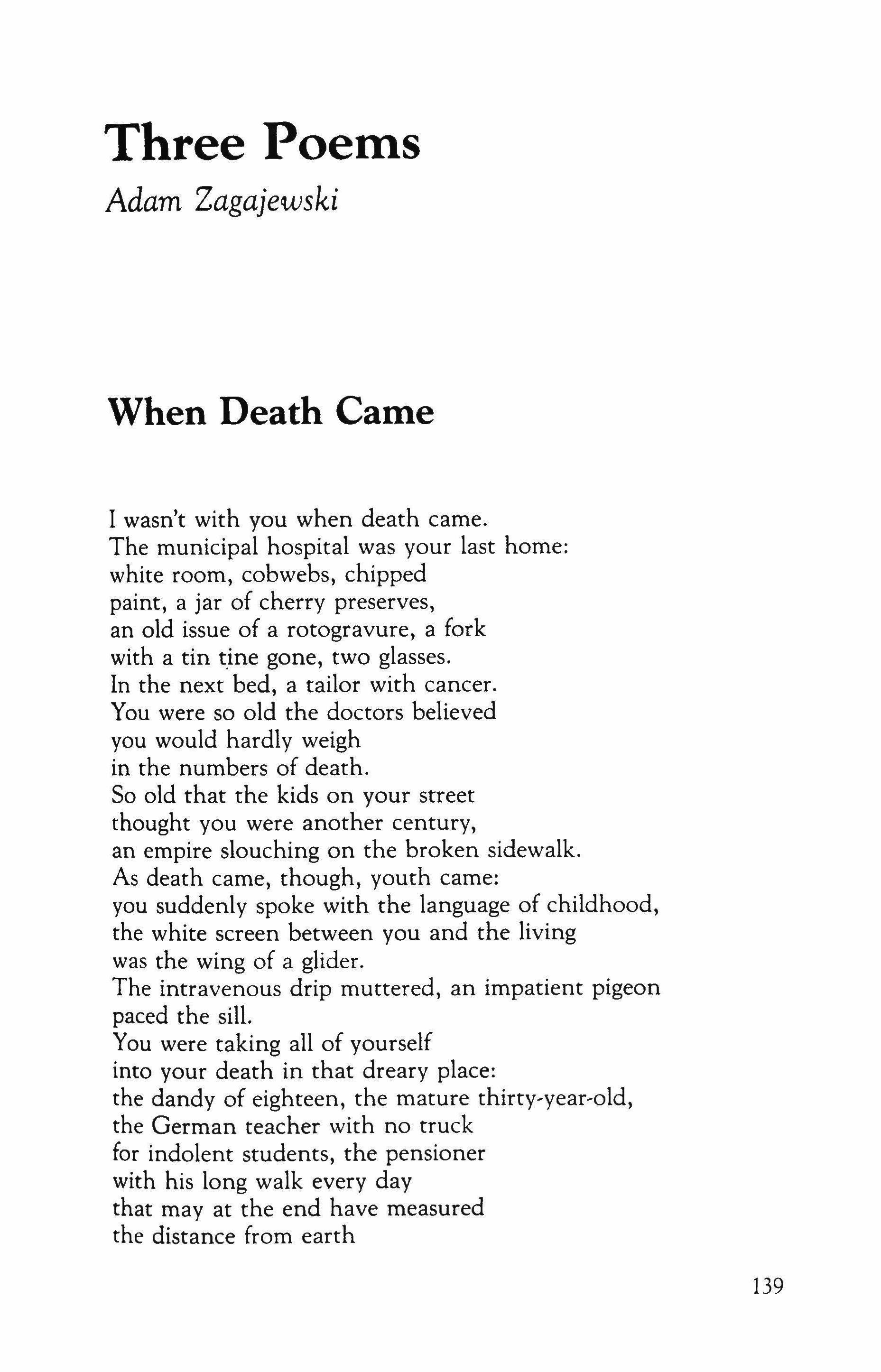
When Death Came
I wasn't with you when death came. The municipal hospital was your last home: white room, cobwebs, chipped paint, a jar of cherry preserves, an old issue of a rotogravure, a fork with a tin tine gone, two glasses. In the next bed, a tailor with cancer. You were so old the doctors believed you would hardly weigh in the numbers of death. So old that the kids on your street thought you were another century, an empire slouching on the broken sidewalk. As death came, though, youth came: you suddenly spoke with the language of childhood, the white screen between you and the living was the wing of a glider. The intravenous drip muttered, an impatient pigeon paced the sill. You were taking all of yourself into your death in that dreary place: the dandy of eighteen, the mature thirty-year-old, the German teacher with no truck for indolent students, the pensioner with his long walk every day that may at the end have measured the distance from earth
139
to heaven.
You'd regenerated yourself, to die.
In the hall, the muffled laughter of nurses; at the window, sparrows battling for crumbs.
 Translated by C. K. Williams and Renata Gorcyznski
Translated by C. K. Williams and Renata Gorcyznski
140
September Afternoon in the Abandoned Barracks
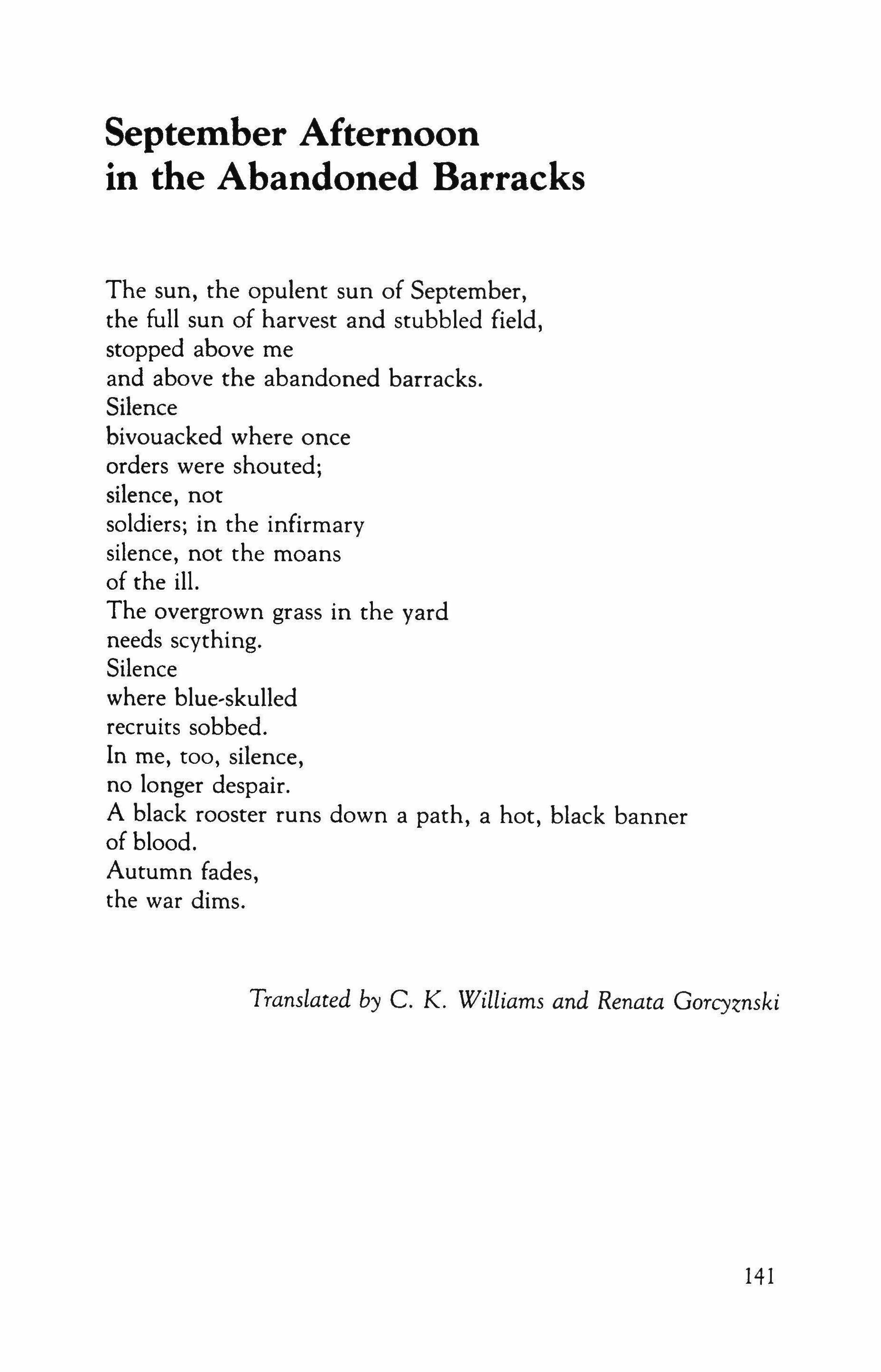
The sun, the opulent sun of September, the full sun of harvest and stubbled field, stopped above me and above the abandoned barracks.
Silence bivouacked where once orders were shouted; silence, not soldiers; in the infirmary silence, not the moans of the ill.
The overgrown grass in the yard needs scything.
Silence where blue-skulled recruits sobbed.
In me, too, silence, no longer despair.
A black rooster runs down a path, a hot, black banner of blood.
Autumn fades, the war dims.
Translated by C. K. Williams and Renata Gorcyznski
141
Alma Mater
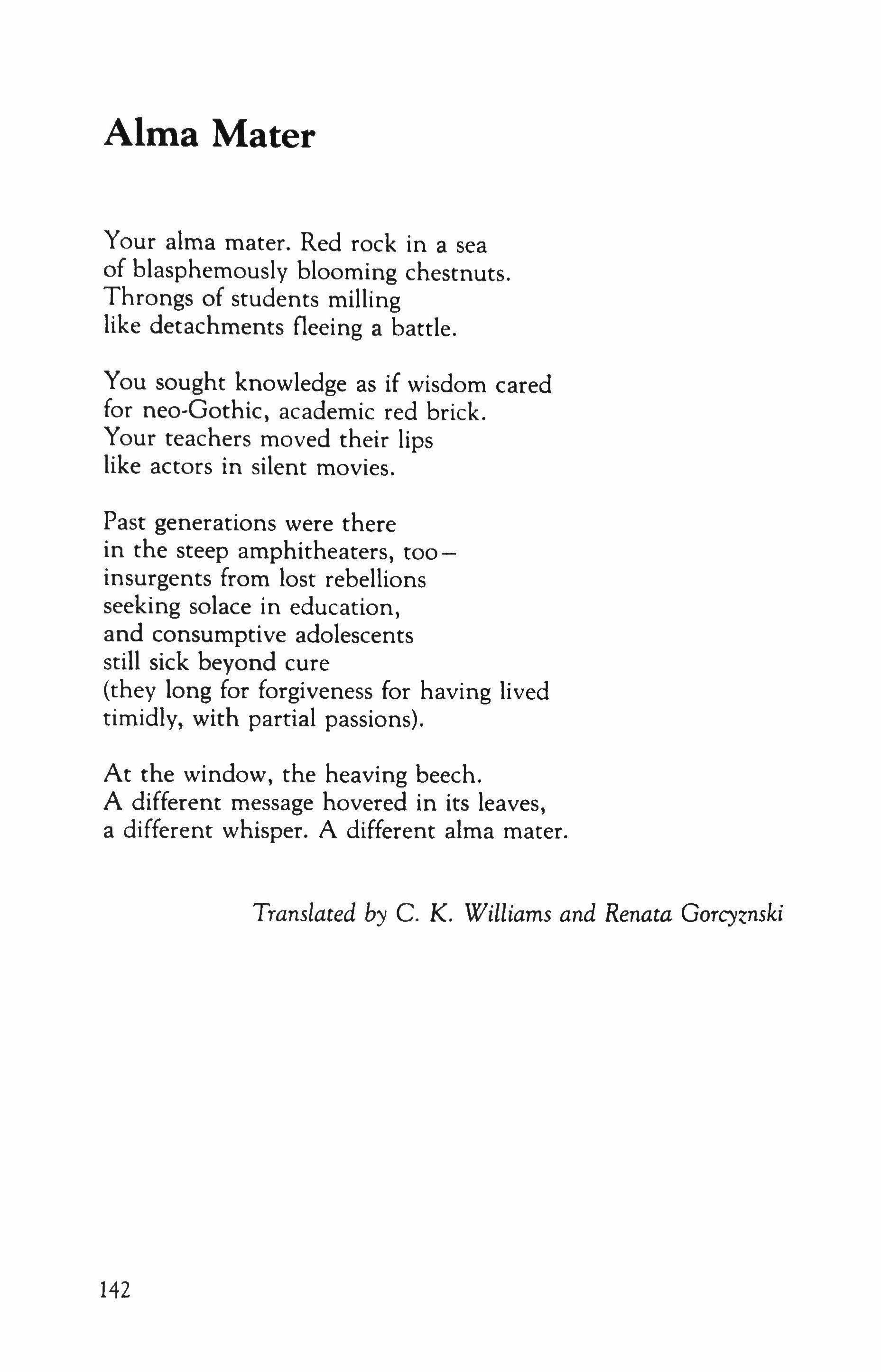
Your alma mater. Red rock in a sea of blasphemously blooming chestnuts. Throngs of students milling like detachments fleeing a battle.
You sought knowledge as if wisdom cared for nee-Gothic, academic red brick. Your teachers moved their lips like actors in silent movies.
Past generations were there in the steep amphitheaters, tooinsurgents from lost rebellions seeking solace in education, and consumptive adolescents still sick beyond cure (they long for forgiveness for having lived timidly, with partial passions).
At the window, the heaving beech. A different message hovered in its leaves, a different whisper. A different alma mater.
Translated
by
C. K. Williams and Renata Gorcyznski
142
Two Poems
Stanislaw Baranczak
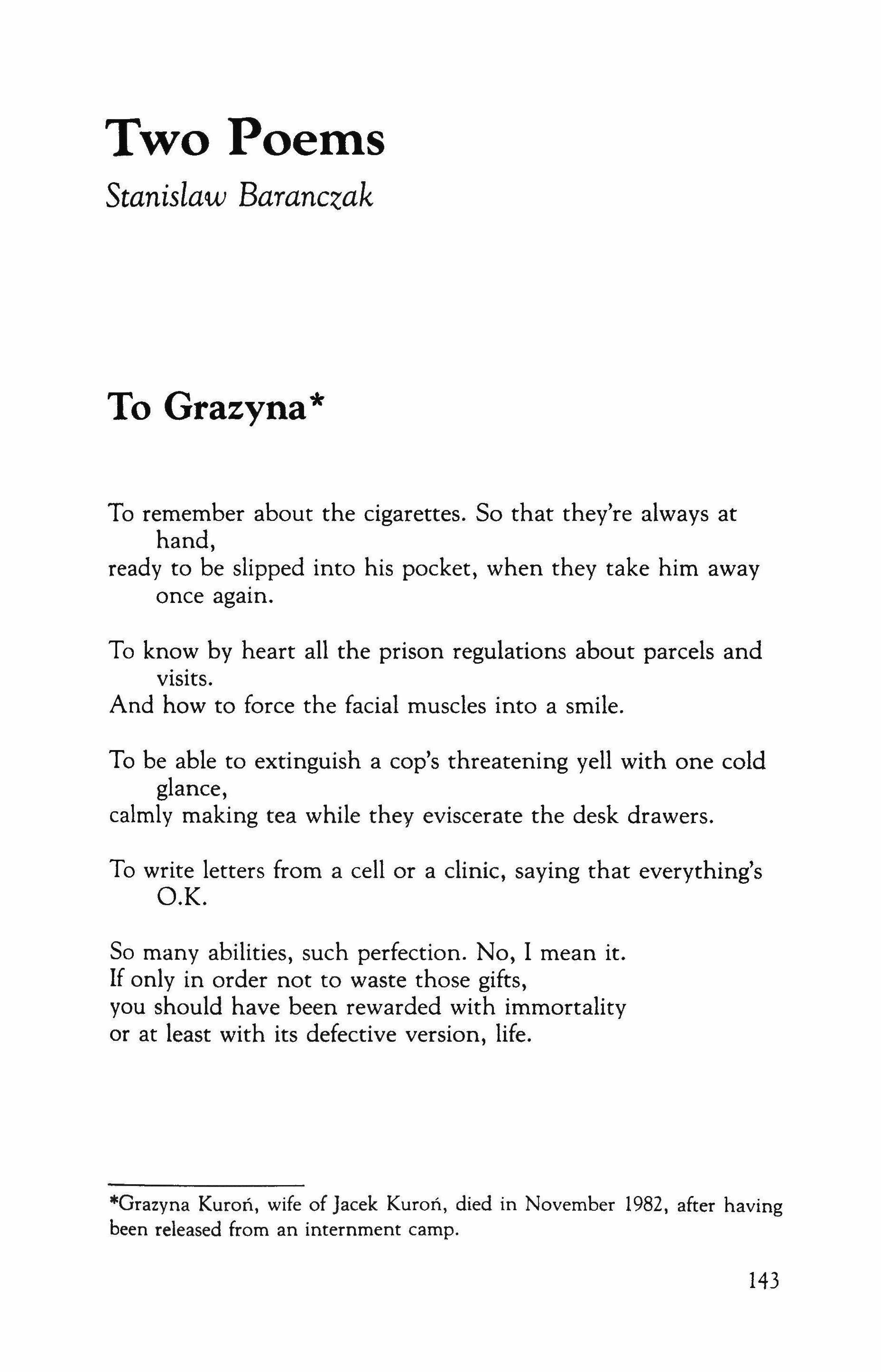
To Grazyna*
To remember about the cigarettes. So that they're always at hand, ready to be slipped into his pocket, when they take him away once again.
To know by heart all the prison regulations about parcels and visits. And how to force the facial muscles into a smile.
To be able to extinguish a cop's threatening yell with one cold glance, calmly making tea while they eviscerate the desk drawers.
To write letters from a cell or a clinic, saying that everything's O.K.
So many abilities, such perfection. No, I mean it. If only in order not to waste those gifts, you should have been rewarded with immortality or at least with its defective version, life.
*Grazyna Kur0I1, wife of Jacek Kurori, died in November 1982, after having been released from an internment camp.
143
Death. No, this can't be serious, I can't accept this. There were many more difficult things that never brought you down.
If I ever admired anybody, it was you. If anything was ever permanent, it was that admiration. How many times did I want to tell you. No way. I was too abashed by the gaps in my vocabulary and the microphone in your wall.
Now I hear it's too late. No, I don't believe it.
It's only nothingness, isn't it. How could a nothing like that possibly stand between us. I'll write down, word for word and forever, that small streak in the iris of your eye, that wrinkle at the corner of your mouth.
All right, I know, you won't respond to the latest postcard I sent you.
But if I'm to blame anything for that, it will be something real, the mail office, an air crash, the postal censor. Not nonexistence, something that doesn't exist, does it.
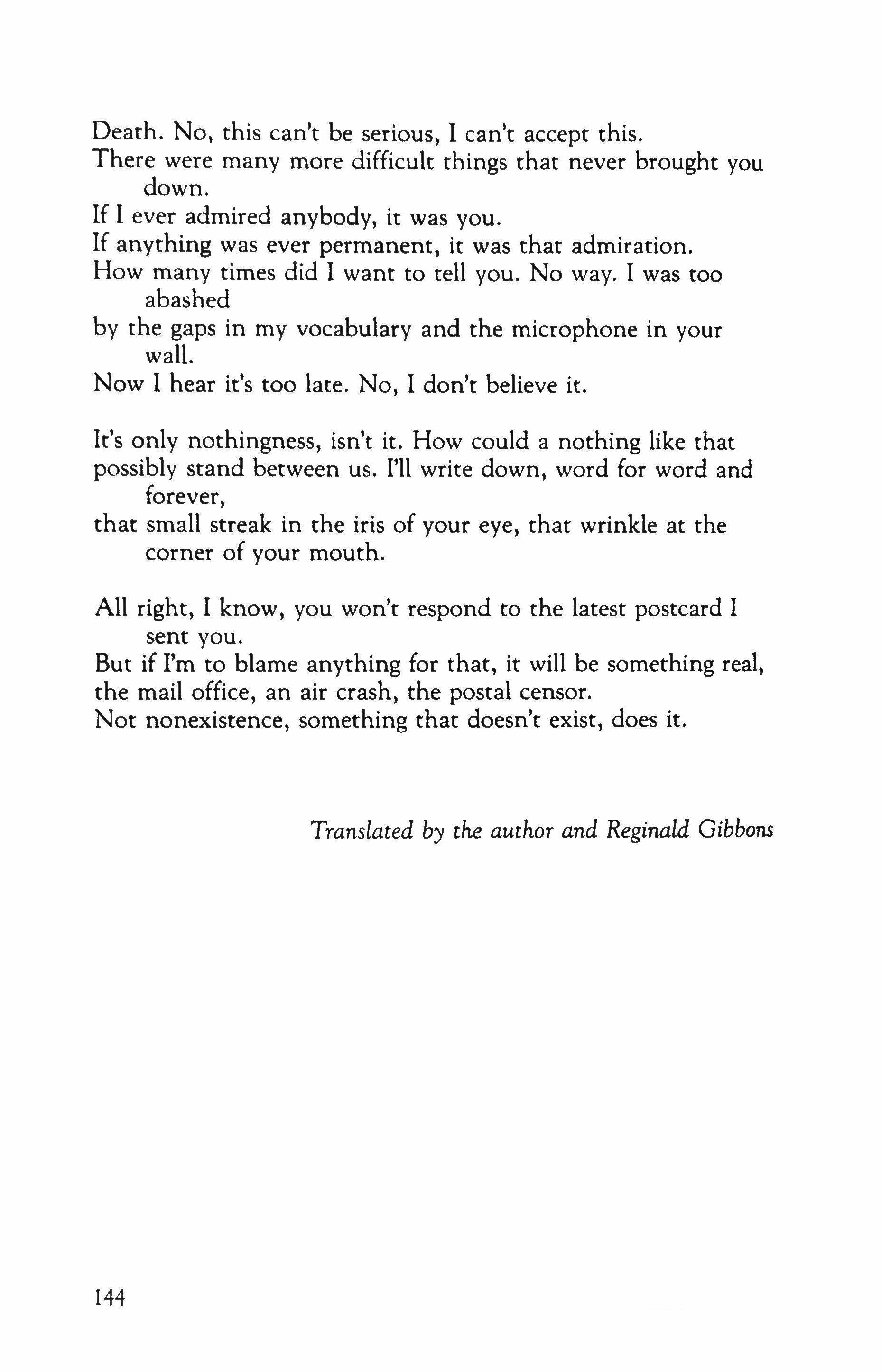 Translated by the author and Reginald Gibbons
Translated by the author and Reginald Gibbons
144
After Gloria Was Done

After several hours' showing off, the hurricane figured out that it makes no sense to perform on three channels at once as a whistling background for interviews with a local mayor from another disaster area, disrupted by dog-food commercials, and, at the same time, to put on a live show in our street. So much work for nothing? Behind our windowpane, crossed aslant with tape, we waited for the wind to get disheartened, to go on strike, to leave for the north, toward New Hampshire. The door opens to the smell of ozone, wet leaves, and safe adventure. We stop by the knocked-down maple tree that snapped the electric line while falling across the street in front of Mrs. Aaron's house. Tapping her cane and still looking not that old, almost like the time when, because she was blonde, the nuns were willing to hide her, Mrs. Aaron walks around and calculates the repair costs. On the nearby sidewalk, Mr. Vitulaitis examines the tree trunk thoughtfully, volunteers his help and electric saw for tomorrow, those years of practice in the taiga will come in handy, he jokes. Crushing sticks that lie on the asphalt, here comes the pickup truck of the new neighbor, what's his name, is it Nhu or Ngu, who brakes close to the tree and gets out, surely without recalling the moment when, on the twenty-ninth day, their overcrowded boat was found by the Norwegian freighter. In something like a picnic mood, we all share comments and jokes about the disaster. After all, it wasn't as fierce as the forecasts had warned, no big deal, no big scars; the harm it did to us is a reparable one, and tomorrow, first thing in the morning, there'll be another expert visit
145
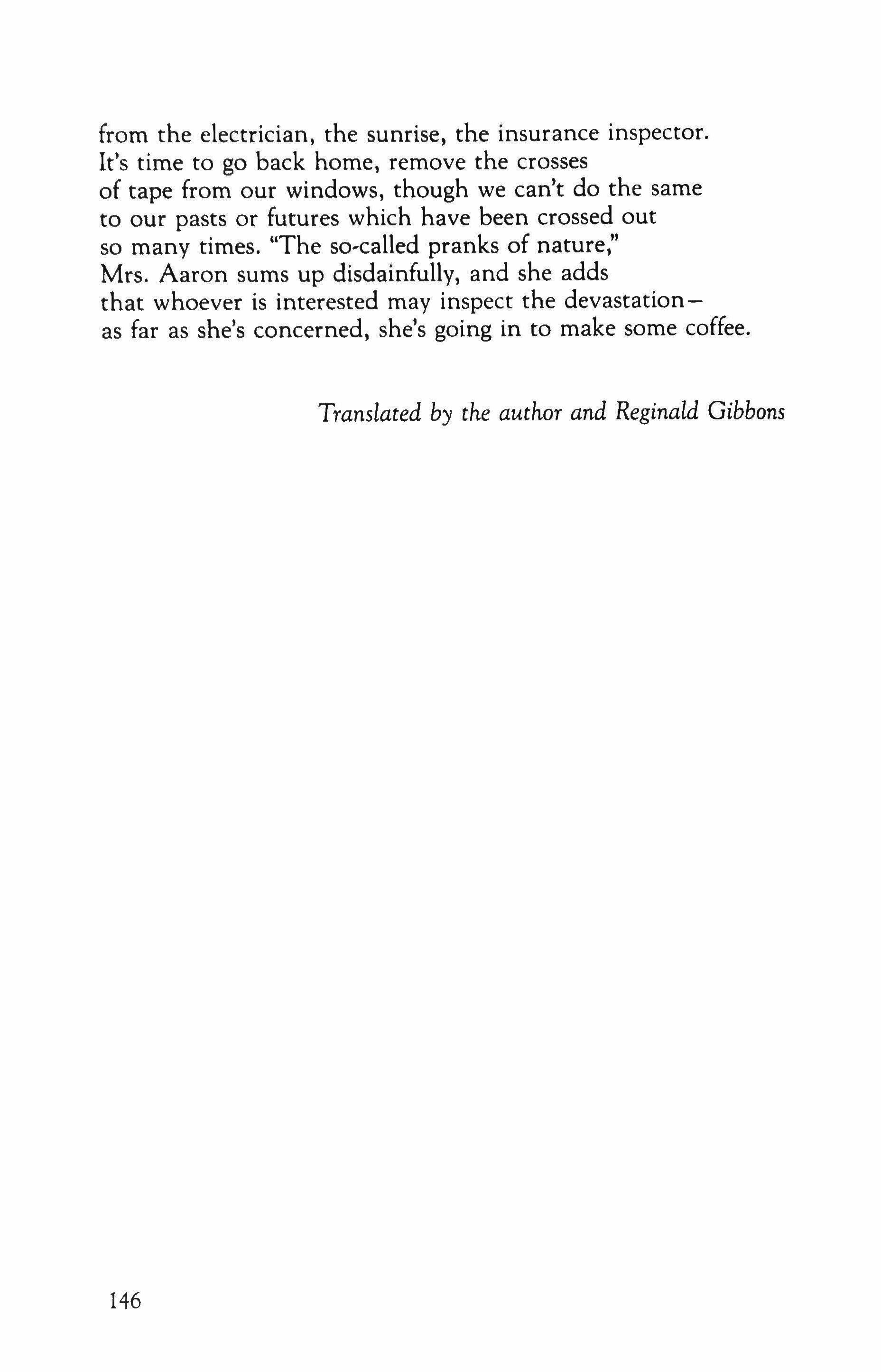
from the electrician, the sunrise, the insurance inspector. It's time to go back home, remove the crosses of tape from our windows, though we can't do the same to our pasts or futures which have been crossed out so many times. "The so-called pranks of nature," Mrs. Aaron sums up disdainfully, and she adds that whoever is interested may inspect the devastationas far as she's concerned, she's going in to make some coffee.
Translated by the author and Reginald Gibbons
146
Three Poems
Wislawa Szymborska
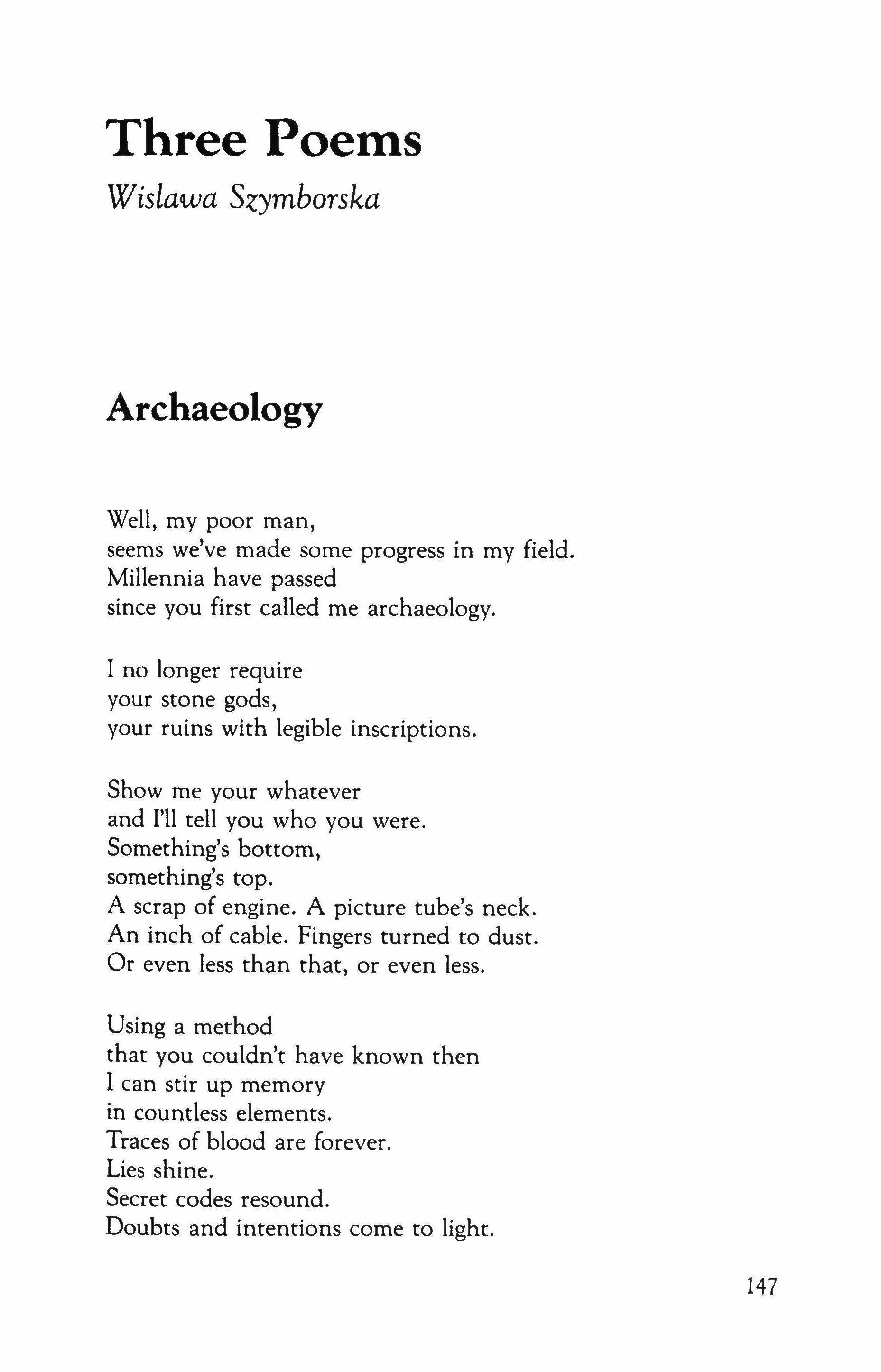
Archaeology
Well, my poor man, seems we've made some progress in my field. Millennia have passed since you first called me archaeology.
1 no longer require your stone gods, your ruins with legible inscriptions.
Show me your whatever and I'll tell you who you were. Something's bottom, something's top. A scrap of engine. A picture tube's neck. An inch of cable. Fingers turned to dust. Or even less than that, or even less.
Using a method that you couldn't have known then 1 can stir up memory in countless elements. Traces of blood are forever. Lies shine. Secret codes resound. Doubts and intentions come to light.
147
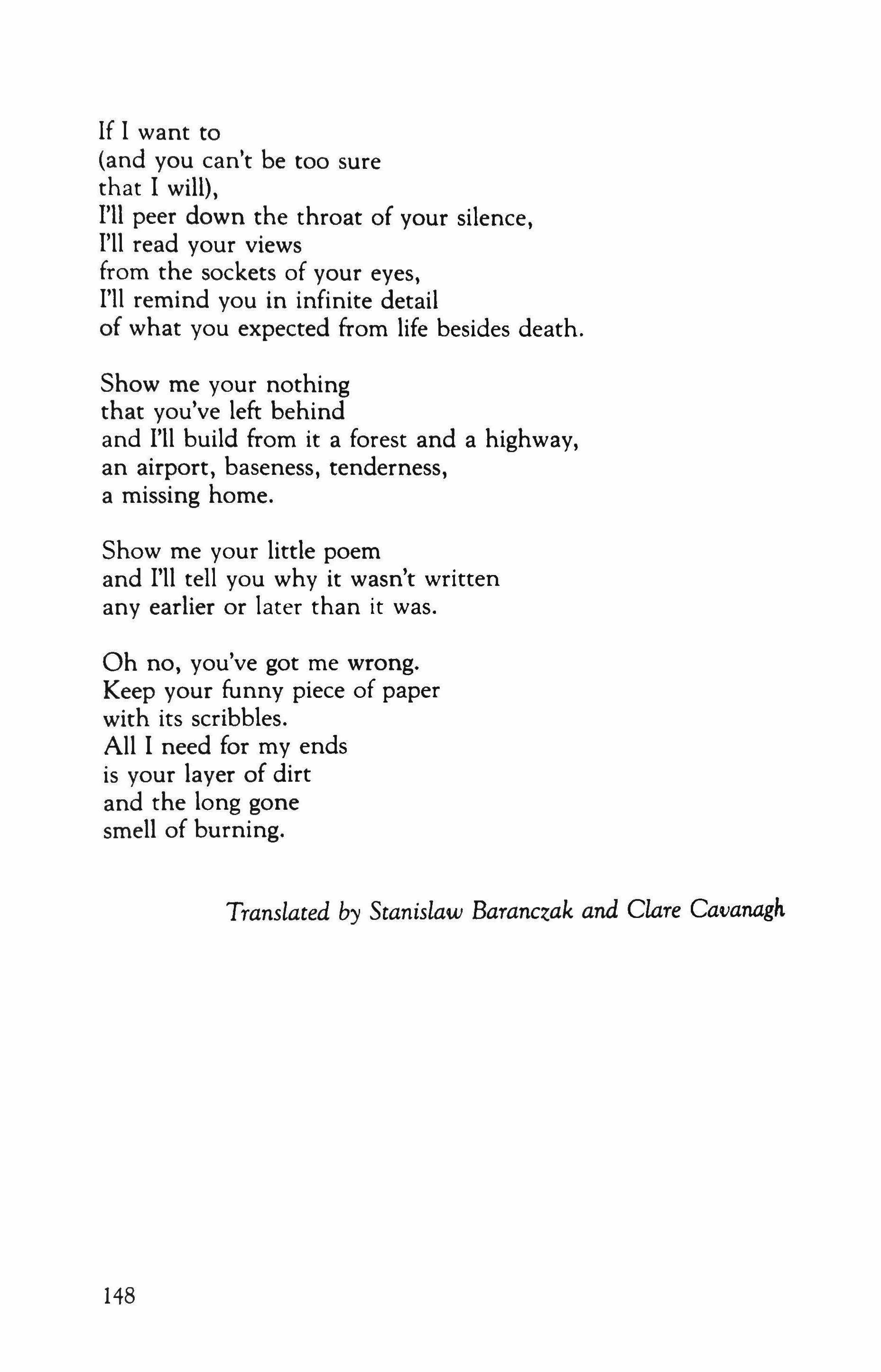
If I want to (and you can't be too sure that I will),
I'll peer down the throat of your silence, I'll read your views from the sockets of your eyes, I'll remind you in infinite detail of what you expected from life besides death.
Show me your nothing that you've left behind and I'll build from it a forest and a highway, an airport, baseness, tenderness, a missing home.
Show me your little poem and I'll tell you why it wasn't written any earlier or later than it was.
Oh no, you've got me wrong. Keep your funny piece of paper with its scribbles. All I need for my ends is your layer of dirt and the long gone smell of burning.
Translated by Stanislaw Baranczak and Clare Cavanagh
148
Hitler's First Photograph

And who's this little fellow in his ittv-bitty robe?
That's tiny baby Adolf, the Hitlers' little boy! Will he grow up to be an LL.D.?
Or a tenor in Vienna's Opera House?
Whose teensy hand is this, whose little ear and eye and nose? Whose tummy full of milk, we just don't know: printer's, doctor's, merchant's, priest's?
Where will those tootsy-wootsies finally wander?
To a garden, to a school, to an office, to a bride, maybe to the Burgermeister's daughter?
Precious little angel, mommy's sunshine, honeybun, when he was being born a year ago, there was no dearth of signs on the earth and in the sky: spring sun, geraniums in windows, the organ-grinder's music in the yard, a lucky fortune wrapped in rosy paper, then just before the labor his mother's fateful dream: a dove seen in a dream means joyful news, if it is caught, a long-awaited guest will come. Knock knock, who's there, it's Adolf's heartchen knocking.
A little pacifier, diaper, rattle, bib, our bouncing boy, thank God and knock on wood, is well, looks just like his folks, like a kitten in a basket, like the tots in every other family album. Shush, let's not start crying, sugar, the camera will click from under that black hood.
The Klinger Atelier, Grabenstrasse, Braunen, and Braunen is a small, but worthy town, honest businesses, obliging neighbors, smell of yeast dough, of gray soap. No one hears howling dogs, or fate's footsteps. A history teacher loosens his collar and yawns over homework.
Translated
by Stanislaw Baranczak and Clare Cavanagh
149
Funeral
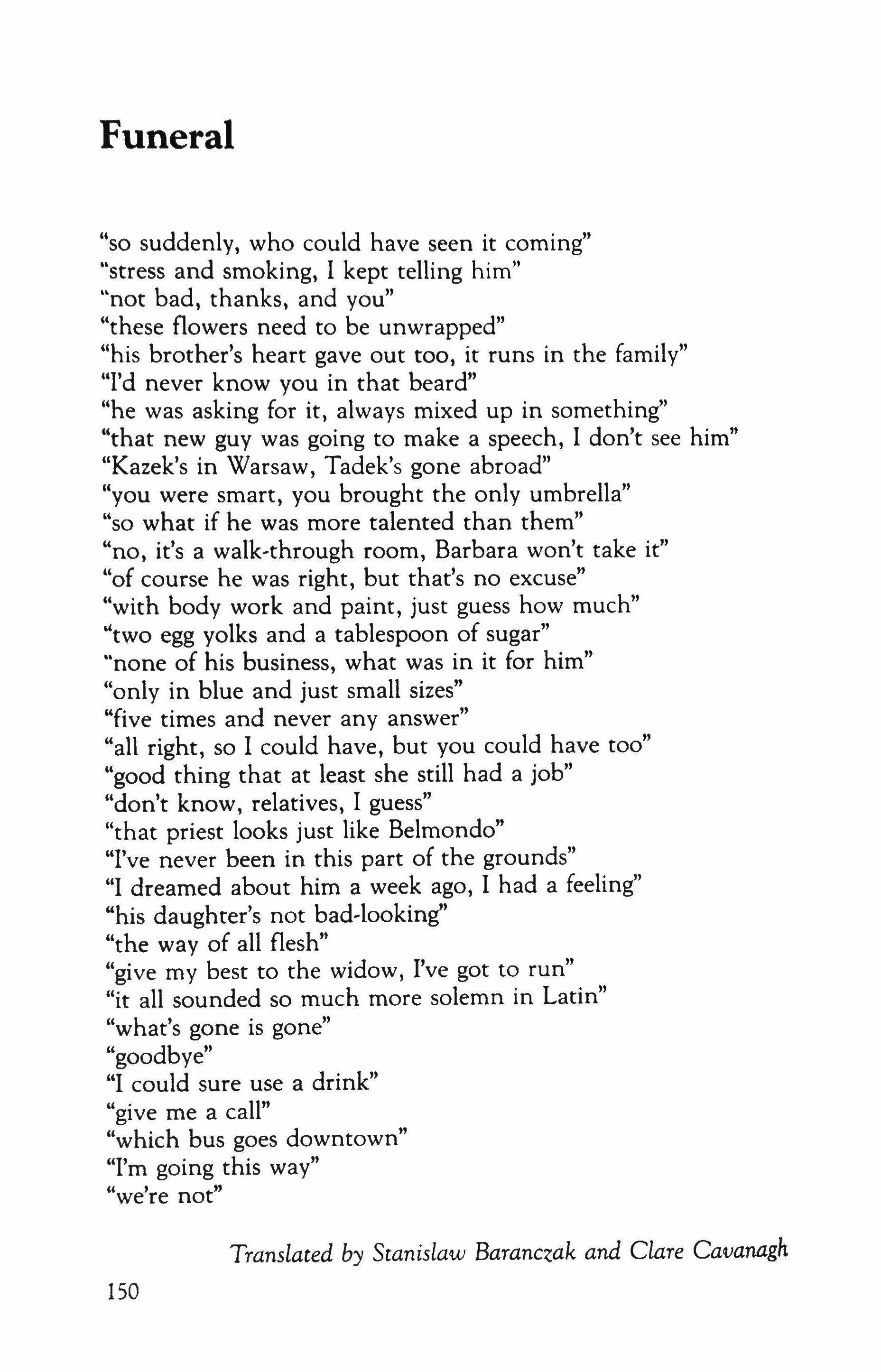
"so suddenly, who could have seen it coming"
"stress and smoking, 1 kept telling him"
"not bad, thanks, and you"
"these flowers need to be unwrapped"
"his brother's heart gave out too, it runs in the family"
"I'd never know you in that beard"
"he was asking for it, always mixed up in something"
"that new guy was going to make a speech, 1 don't see him"
"Kazek's in Warsaw, Tadek's gone abroad"
"you were smart, you brought the only umbrella"
"so what if he was more talented than them"
"no, it's a walk-through room, Barbara won't take it"
"of course he was right, but that's no excuse"
"with body work and paint, just guess how much"
"two egg yolks and a tablespoon of sugar"
"none of his business, what was in it for him"
"only in blue and just small sizes"
"five times and never any answer"
"all right, so I could have, but you could have too"
"good thing that at least she still had a job"
"don't know, relatives, 1 guess"
"that priest looks just like Belmondo"
"I've never been in this part of the grounds"
"I dreamed about him a week ago, 1 had a feeling"
"his daughter's not bad-looking"
"the way of all flesh"
"give my best to the widow, I've got to run"
"it all sounded so much more solemn in Latin"
"what's gone is gone"
"goodbye"
"I could sure use a drink"
"give me a call"
"which bus goes downtown"
"I'm going this way"
"we're not"
Translated by Stanislaw Baranczak and Clare Cavanagh
150
Two Poems
Artur Mi�dzyrzecki
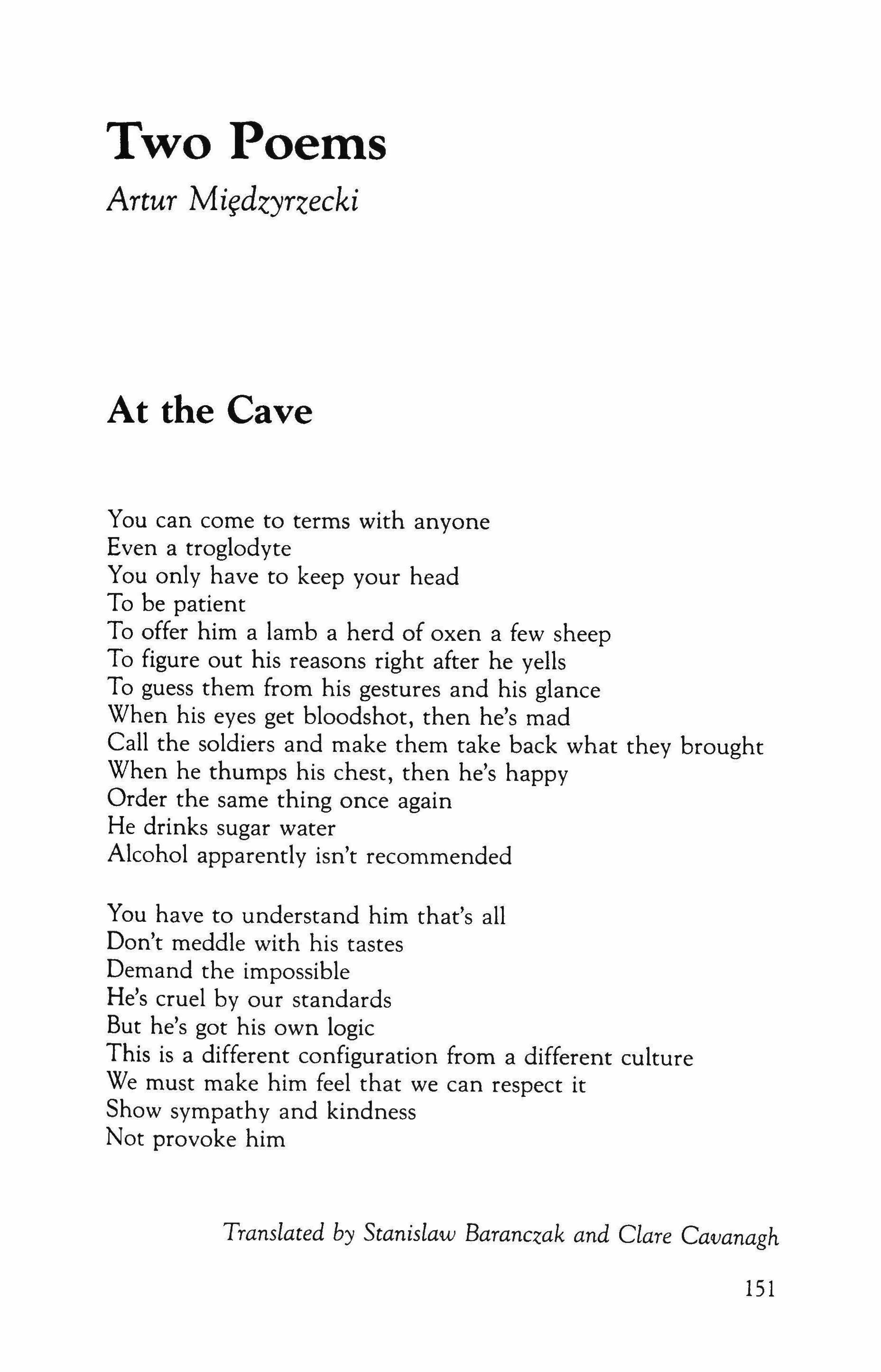
At the Cave
You can come to terms with anyone
Even a troglodyte
You only have to keep your head
To be patient
To offer him a lamb a herd of oxen a few sheep
To figure out his reasons right after he yells
To guess them from his gestures and his glance
When his eyes get bloodshot, then he's mad
Call the soldiers and make them take back what they brought
When he thumps his chest, then he's happy
Order the same thing once again
He drinks sugar water
Alcohol apparently isn't recommended
You have to understand him that's all
Don't meddle with his tastes
Demand the impossible
He's cruel by our standards
But he's got his own logic
This is a different configuration from a different culture
We must make him feel that we can respect it
Show sympathy and kindness
Not provoke him
Translated by Stanislaw Baranczak and Clare Cavanagh
151
What Does the Political Scientist Know
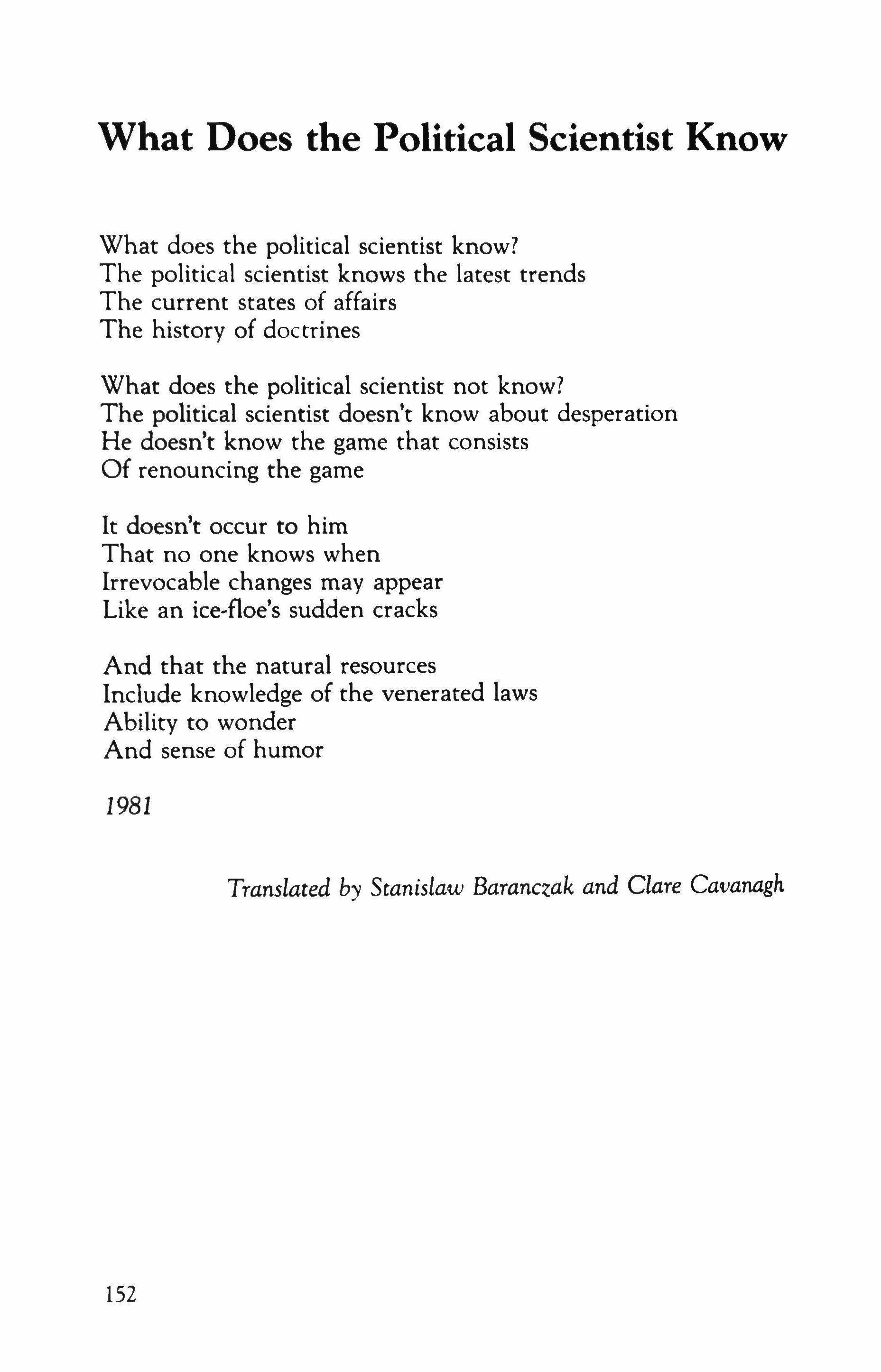
What does the political scientist know?
The political scientist knows the latest trends
The current states of affairs
The history of doctrines
What does the political scientist not know?
The political scientist doesn't know about desperation He doesn't know the game that consists Of renouncing the game
It doesn't occur to him
That no one knows when Irrevocable changes may appear Like an ice-floe's sudden cracks
And that the natural resources Include knowledge of the venerated laws
Ability to wonder And sense of humor 1981
Translated by Stanislaw Baranczak and Clare Cavanagh
152
Two Poems
Julia Hartwig
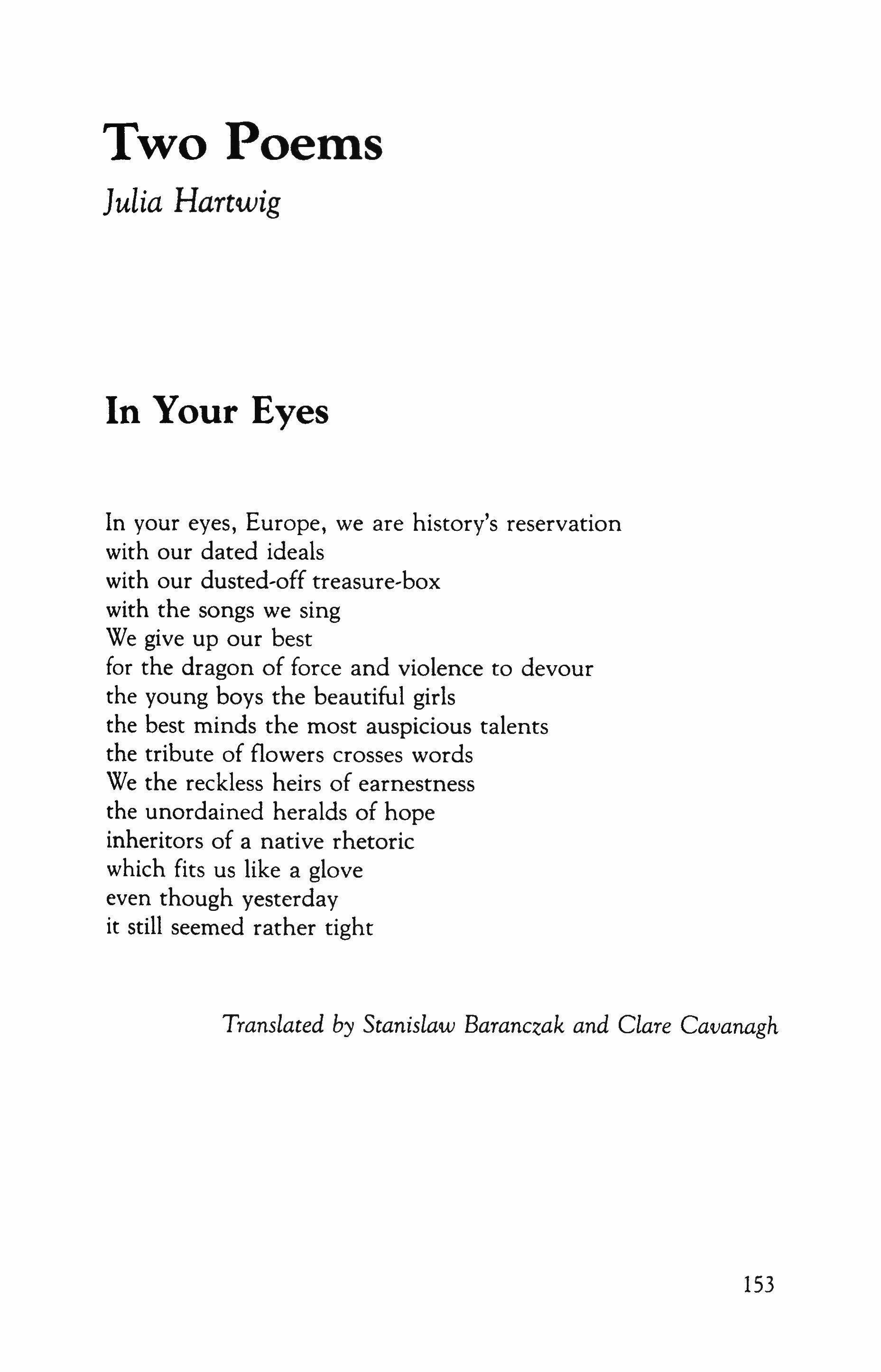
In Your Eyes
In your eyes, Europe, we are history's reservation with our dated ideals with our dusted-off treasure-box with the songs we sing We give up our best for the dragon of force and violence to devour the young boys the beautiful girls the best minds the most auspicious talents the tribute of flowers crosses words We the reckless heirs of earnestness the unordained heralds of hope inheritors of a native rhetoric which fits us like a glove even though yesterday it still seemed rather tight
Translated by Stanislaw Baranczak and Clare Cavanagh
153
But Of Course
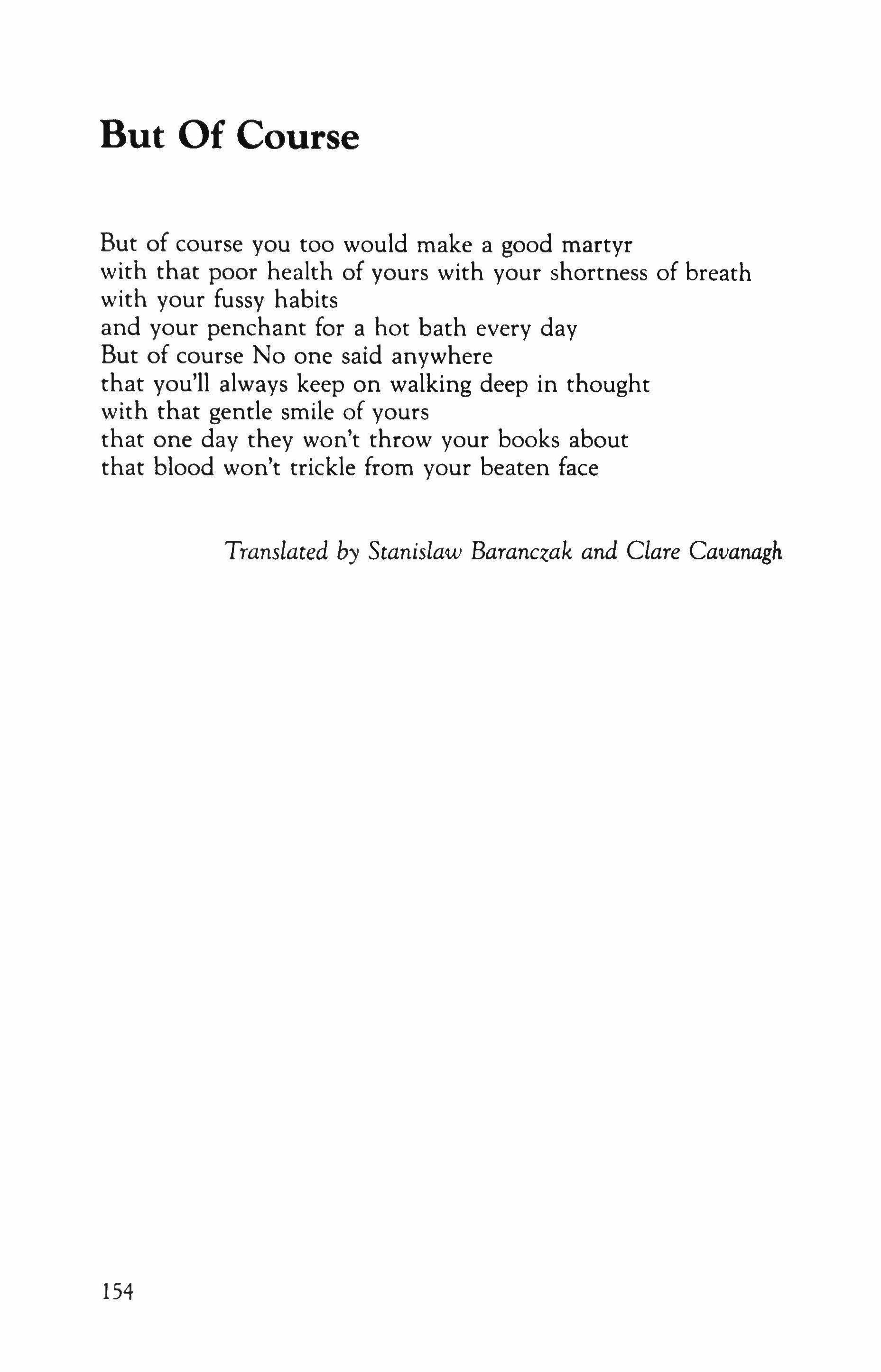
But of course you too would make a good martyr with that poor health of yours with your shortness of breath with your fussy habits and your penchant for a hot bath every day But of course No one said anywhere that you'll always keep on walking deep in thought with that gentle smile of yours that one day they won't throw your books about that blood won't trickle from your beaten face
Translated by Stanislaw Baranczak and Clare Cavanagh
154
Roommates
Wiktor Woroszylski

The roommates I had in my hospital bed were very nice people
But now they are dead
Mr. Wisniewski from the bed on my left who had one lung removed and believed that the other one only had to learn how to breathe and then he wouldn't wheeze
Mr. Liebchen from the bed on my right who was ashamed of being bedridden and fed with a spoon, and also of the rubber tube that ran from his blanket to a see-through bottle, and who told us how he had driven his truck for two days without a break
Mr. [astrzebski from the bed across who cracked jokes Doctor why don't you just admit that in my belly lives a little monster armed with pinchers rhymes with "answer," get it, doctor?
I remember things about them And I remember myself with them For example once all day I told them books of a certain writer who had just been denounced by the party paper And they listened transfixed It wasn't long ago But now they're dead
155
Only Mr. Wasilewski from the bed by the window is still alive I see him from time to time by my house and we stop for a minute His heart still bothers him but he's back to work I guess it pays to stick it out (he says) till I retire
Well and I'm alive
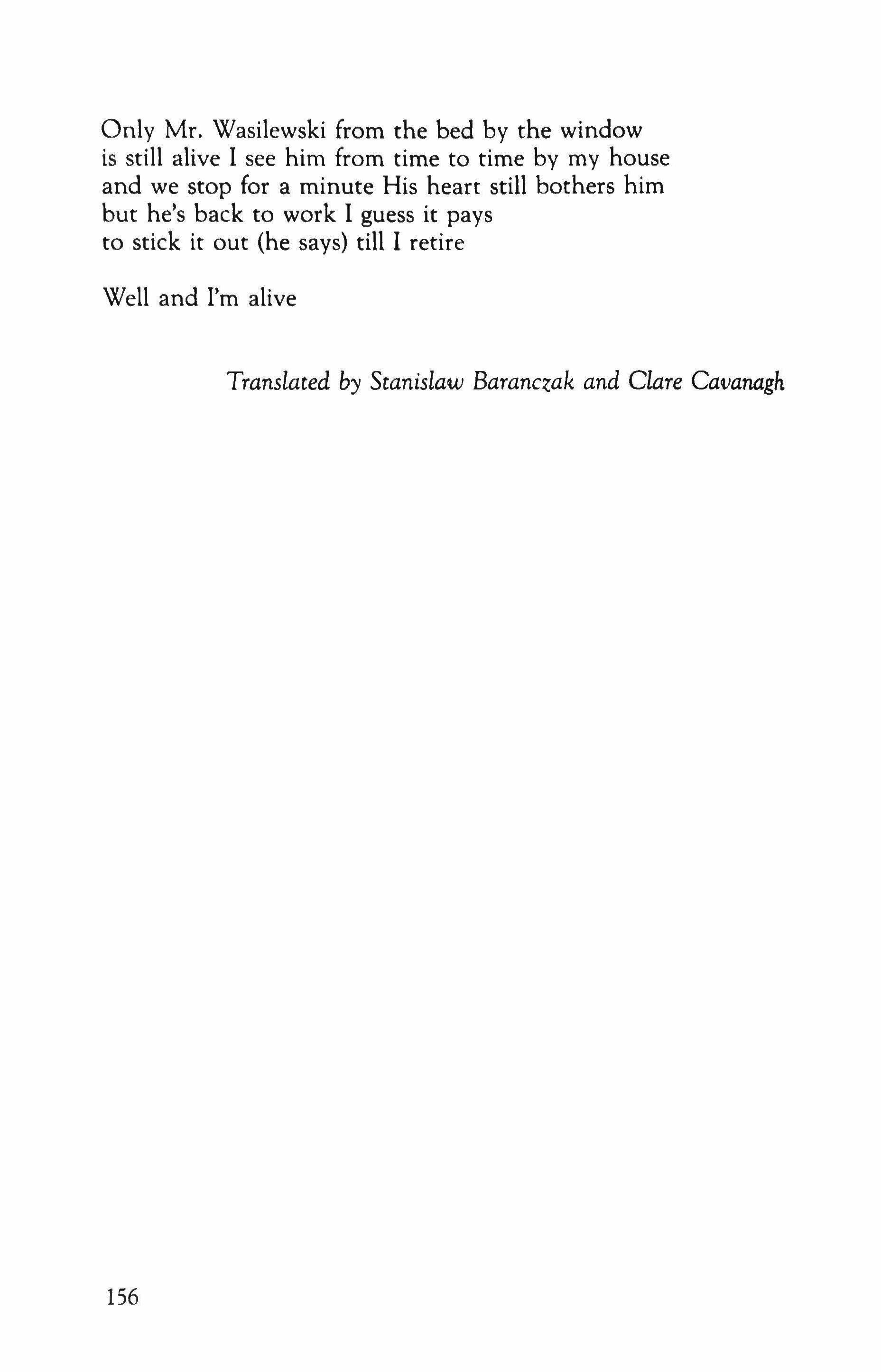 Translated by Stanislaw Baranczak and Clare Cavanagh
Translated by Stanislaw Baranczak and Clare Cavanagh
156
[Untitled]
Bronislaw Maj
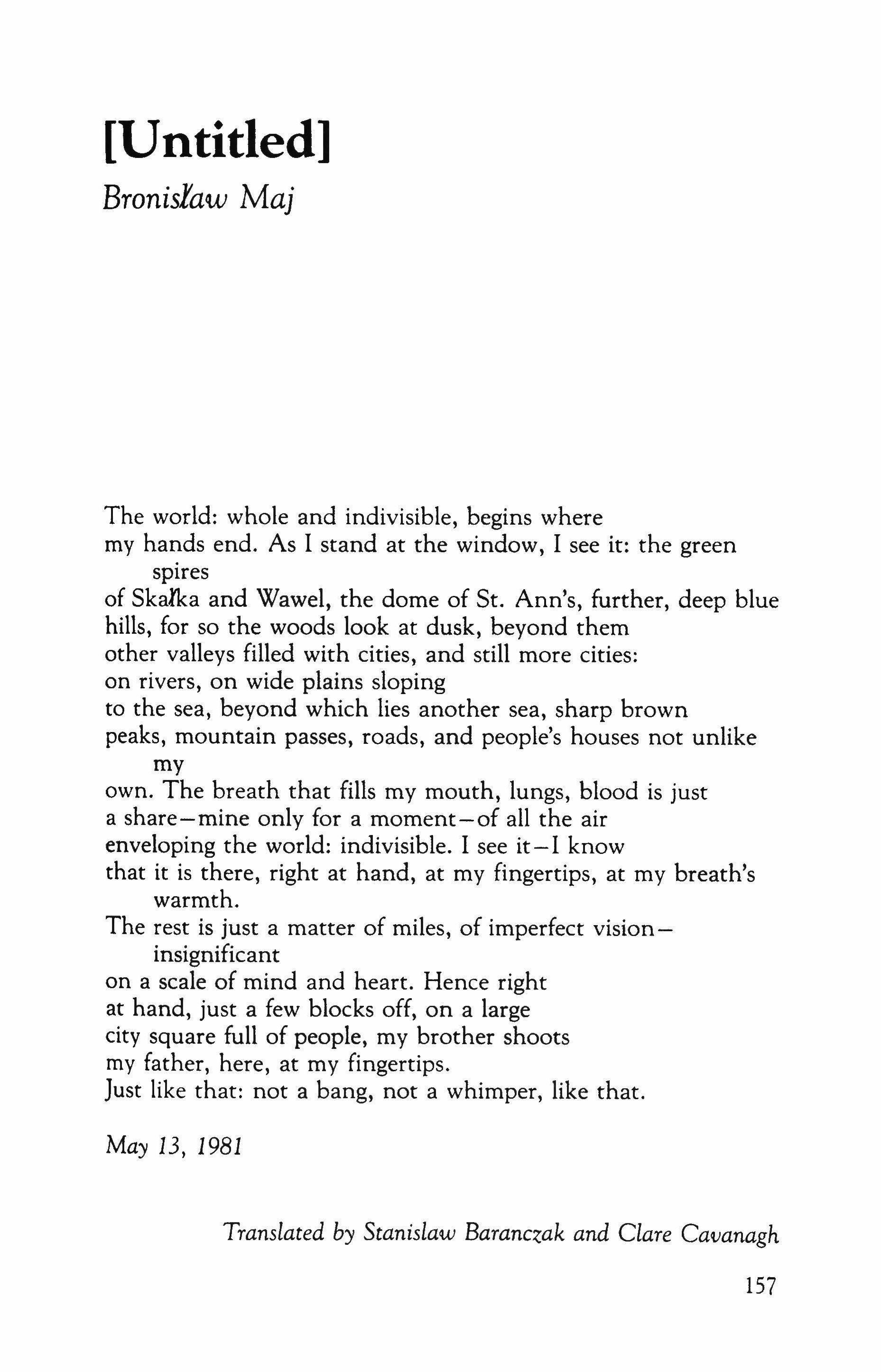
The world: whole and indivisible, begins where my hands end. As I stand at the window, I see it: the green spires of Skalka and Wawel, the dome of St. Ann's, further, deep blue hills, for so the woods look at dusk, beyond them other valleys filled with cities, and still more cities: on rivers, on wide plains sloping to the sea, beyond which lies another sea, sharp brown peaks, mountain passes, roads, and people's houses not unlike my own. The breath that fills my mouth, lungs, blood is just a share-mine only for a moment-of all the air enveloping the world: indivisible. I see it - I know that it is there, right at hand, at my fingertips, at my breath's warmth.
The rest is just a matter of miles, of imperfect visioninsignificant on a scale of mind and heart. Hence right at hand, just a few blocks off, on a large city square full of people, my brother shoots my father, here, at my fingertips. Just like that: not a bang, not a whimper, like that.
May 13, 1981
Translated by Stanislaw Baranczak and Clare Cavanagh
157

Two Poems
Clair Berg

Mid-Canal, Antwerp
No wives, only lilies under the bridge, breathing together, rasping at the quiet men throwing their arms out from behind quiet fish lines over the slanted edge of the canal.
Hook plunges into the dark, where the fishermen are.
Water, throwing eels up and up, eels into coversation: "Oh, eel, Oh, eel," waking solitude, fishermen remembering themselves.
The glistening basket slumps with one more, moving the others with a slow-twitch= sticky body, as a tree writhes in its clouded sky, drawing around itself above all eels and men who collect themselves.
159

They take the basket, swollen, to wives; each time, and one black eel is slung to the bottom.
I hear their delicate sweating, the eels drying like idiots.
160
The Storm
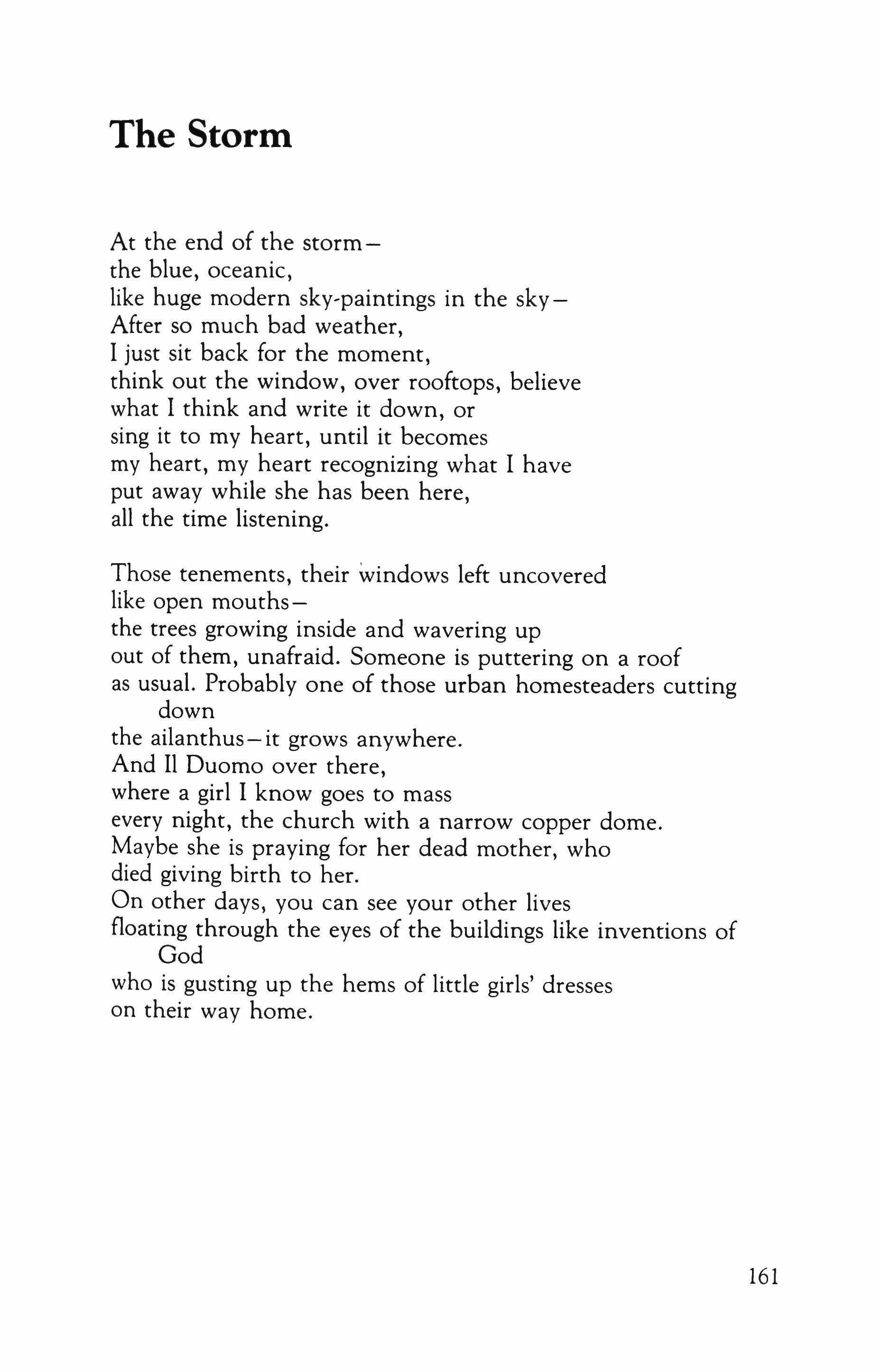
At the end of the stormthe blue, oceanic, like huge modern sky-paintings in the skyAfter so much bad weather, I just sit back for the moment, think out the window, over rooftops, believe what I think and write it down, or sing it to my heart, until it becomes my heart, my heart recognizing what I have put away while she has been here, all the time listening.
Those tenements, their windows left uncovered like open mouthsthe trees growing inside and wavering up out of them, unafraid. Someone is puttering on a roof as usual. Probably one of those urban homesteaders cutting down the ailanthus-it grows anywhere. And 11 Duomo over there, where a girl I know goes to mass every night, the church with a narrow copper dome. Maybe she is praying for her dead mother, who died giving birth to her. On other days, you can see your other lives floating through the eyes of the buildings like inventions of God who is gusting up the hems of little girls' dresses on their way home.
161
Me and Hitler at the Rhine
Bruce Guernsey

The first time I ever saw my father was in a picture he sent from the war. "This is your dad," my mother said, and I searched through the rubble fallen like blocks. There, on the turret of a tank, a man was laughing, holding onto some statue's head, a head with no body, marble and grim, a bottle raised in his other hand. "Me and Hitler at the Rhine," my mother read, laughing too and crying at my father's words on the back. She was glad the war was over.
I saw my father for the last time today and late, after the crying, the laughter, I wake in the warm night to thunder, to the sound of shells, the rumbling of a tank down our block, the walls, our whole house shaking, this house my mother's now alone, the endless halls. In the lightning, sudden on the ceiling like a searchlight, I can see the statue rise, massive and stiffin my chest can hear it marching, in strict steps marching, striding toward the river now, its right arm out and rigid, a man's head in its marble hand.
162
Two Poems
Meredith Briggs Skeath
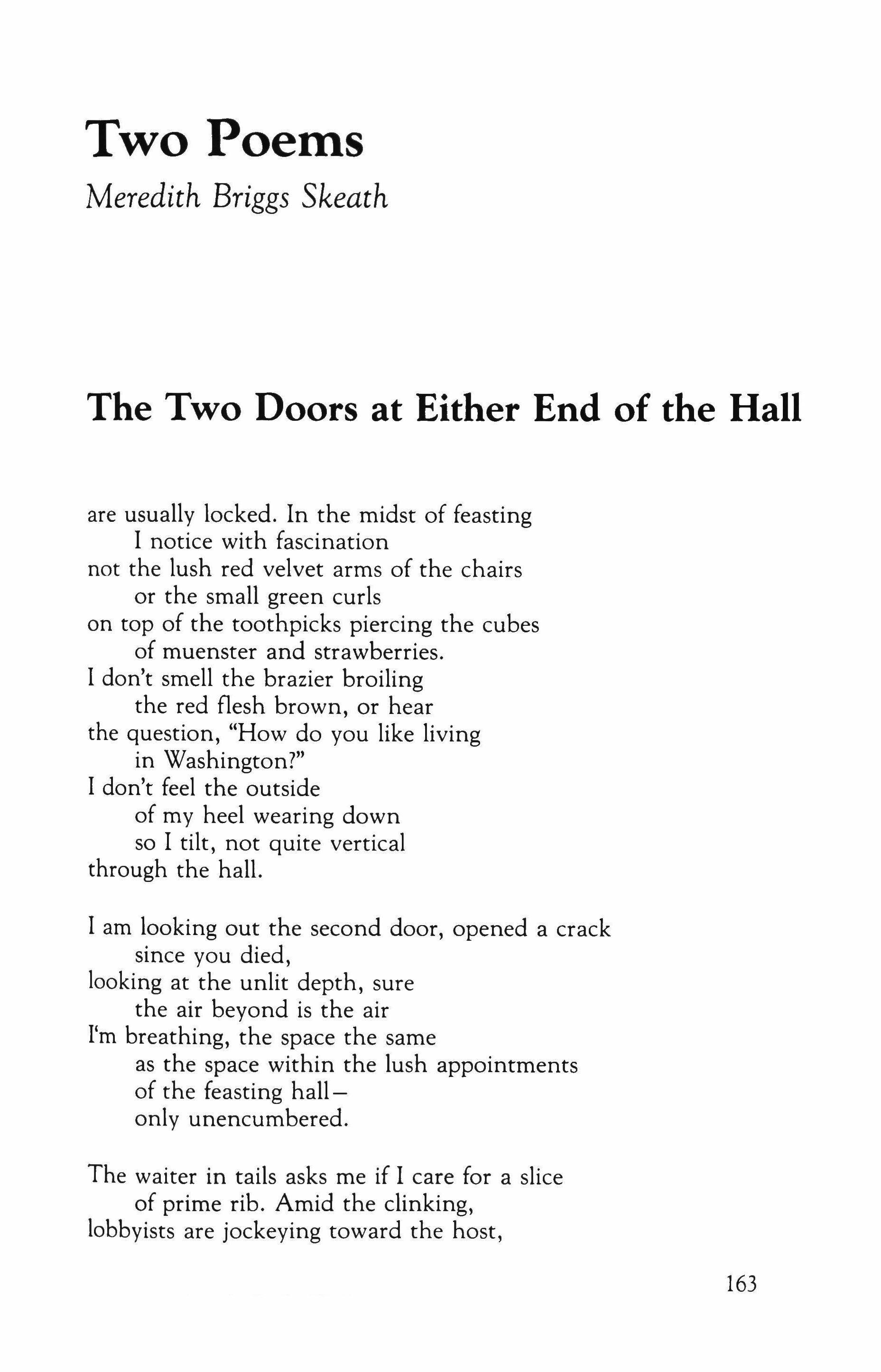
The Two Doors at Either End of the Hall
are usually locked. In the midst of feasting I notice with fascination not the lush red velvet arms of the chairs or the small green curls on top of the toothpicks piercing the cubes of muenster and strawberries. I don't smell the brazier broiling the red flesh brown, or hear the question, "How do you like living in Washington?" I don't feel the outside of my heel wearing down so I tilt, not quite vertical through the hall.
I am looking out the second door, opened a crack since you died, looking at the unlit depth, sure the air beyond is the air I'm breathing, the space the same as the space within the lush appointments of the feasting hallonly unencumbered.
The waiter in tails asks me if I care for a slice of prime rib. Amid the clinking, lobbyists are jockeying toward the host,
163

trailing a wake of cologne and hair spray like an aura
you slipped out of. No one here has noticed you are commanding my attention:
I look toward the dark, firm line showing through the door. I walk toward it not afraid but wanting a guide to that language that souls may speak when mouths are gone, that whales may hear, perhaps a higher frequency, or a different law, that birds may know flying above the buildings and under the planes, or plants may sink their roots into, the dark shiftings, the ooze of underground springs. Where have you gone? What gifts can I bring you? What sign can you share?
I love the light I have known here, but will come wherever you are, if I could speak with you and know the builder of the hall.
164
Who Wakes Up?
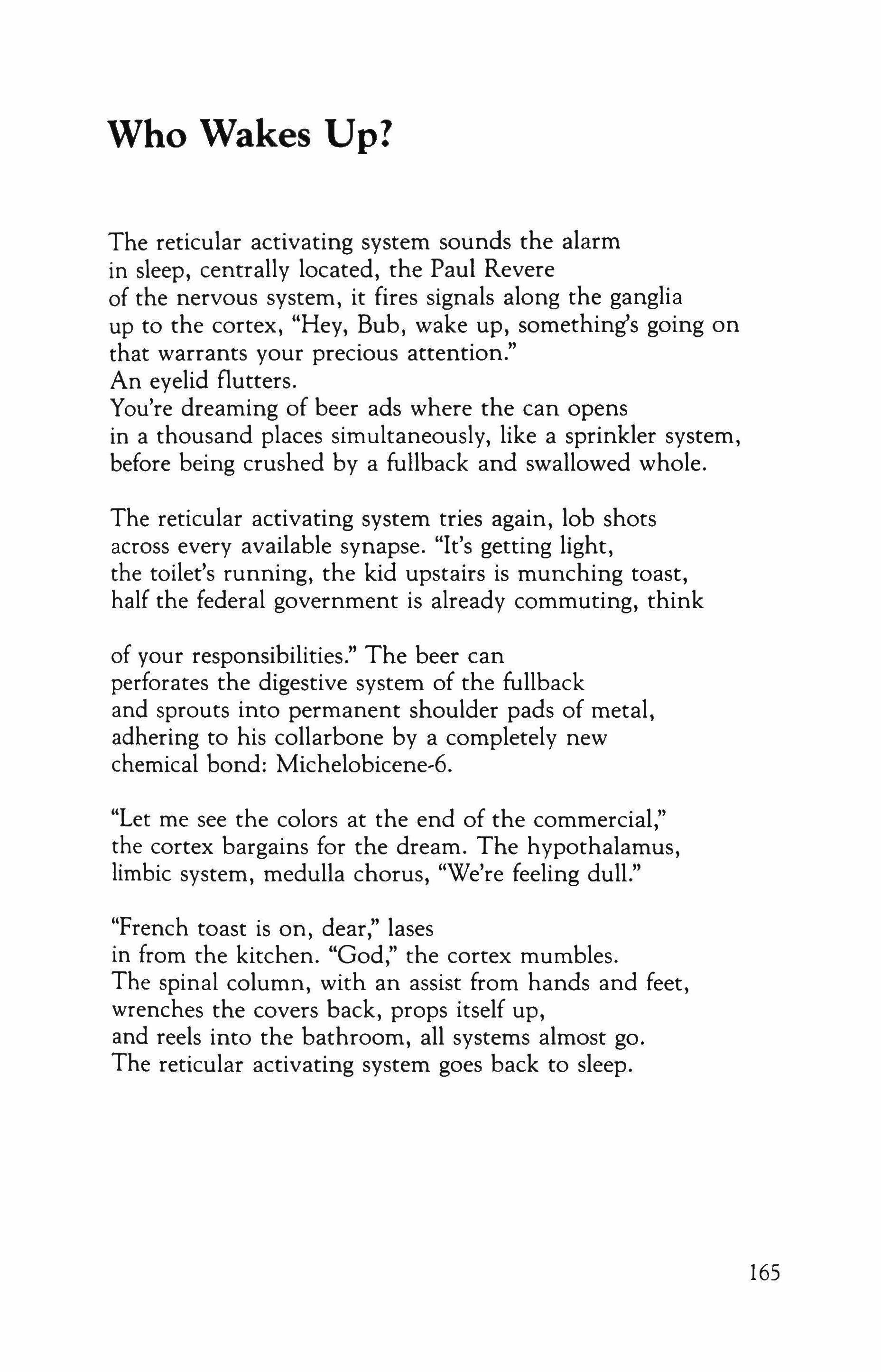
The reticular activating system sounds the alarm in sleep, centrally located, the Paul Revere of the nervous system, it fires signals along the ganglia up to the cortex, "Hey, Bub, wake up, something's going on that warrants your precious attention." An eyelid flutters. You're dreaming of beer ads where the can opens in a thousand places simultaneously, like a sprinkler system, before being crushed by a fullback and swallowed whole.
The reticular activating system tries again, lob shots across every available synapse. "It's getting light, the toilet's running, the kid upstairs is munching toast, half the federal government is already commuting, think
of your responsibilities." The beer can perforates the digestive system of the fullback and sprouts into permanent shoulder pads of metal, adhering to his collarbone by a completely new chemical bond: Michelobicene-S.
"Let me see the colors at the end of the commercial," the cortex bargains for the dream. The hypothalamus, limbic system, medulla chorus, "We're feeling dull."
"French toast is on, dear," lases in from the kitchen. "God," the cortex mumbles. The spinal column, with an assist from hands and feet, wrenches the covers back, props itself up, and reels into the bathroom, all systems almost go. The reticular activating system goes back to sleep.
165

Two Poems
Campbell McGrath
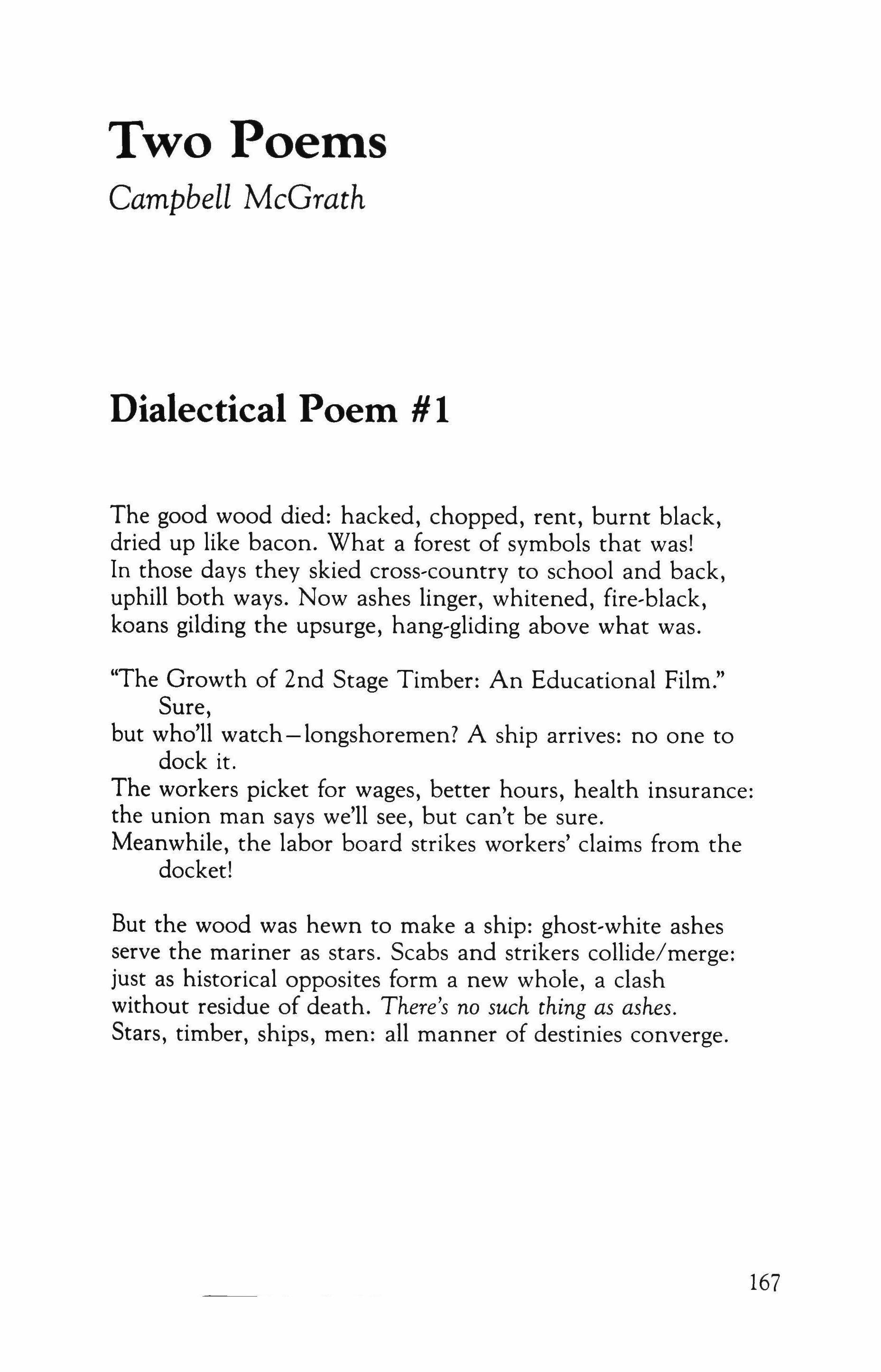
Dialectical Poem # 1
The good wood died: hacked, chopped, rent, burnt black, dried up like bacon. What a forest of symbols that was! In those days they skied cross-country to school and back, uphill both ways. Now ashes linger, whitened, fire-black, koans gilding the upsurge, hang-gliding above what was.
"The Growth of 2nd Stage Timber: An Educational Film." Sure, but who'll watch-longshoremen? A ship arrives: no one to dock it.
The workers picket for wages, better hours, health insurance: the union man says we'll see, but can't be sure. Meanwhile, the labor board strikes workers' claims from the docket!
But the wood was hewn to make a ship: ghost-white ashes serve the mariner as stars. Scabs and strikers collide/merge: just as historical opposites form a new whole, a clash without residue of death. There's no such ching as ashes. Stars, timber, ships, men: all manner of destinies converge.
167
Capitalist Poem #25

This is the dichotomy: on the one hand something from childhood. For instance, well-Superman. That is: more powerful than a locomotive i faster than a speeding j able to- (this is it)-change the course of mighty rivers. Like the Grand Coulee Dam. And people come from all around to see it, the largest tourist attraction in the Pacific Northwest, families from Seattle, Portland, all the way from Bismarck, North Dakota. And FOR created the CCC, which hired Woody Guthrie to come on up and write some songs about the boys involved in the electrification project, a great building and a damming and a tearing down of trees along the sinuous Columbia choked with logs. And Teddy Roosevelt created the National Parks so you could camp next to the family playing Scrabble in their Winnebago at a reservoir in Utah. And it was Thomas Jefferson who sent out Lewis and Clark in the first place, along the Missouri and across the mountains, and down the same Columbia to the sea. It's a sort of dialectic. Youth and maturity. Man and nature. Childhood or a motorboat in Utah: that's the dichotomy.
As far as I'm concerned, just about anything from TV was a more significant cultural phenomenom of the 60's than Vietnam. "The Flintstones," or "Mission Impossible," or "Lost in Space." I could tell you things about "Lost in Space" you wouldn't believe. The carrot creatures crying "Moisture! Moisture!" The music that signals the invisible bog monster's approach. Uncle Angus covered with tendrils. I don't even know which are real episodes and which ones I made up anymore. I could tell you about the Baltimore Orioles. Roster moves, statistics, a twi-night doubleheader in August when the hot wind curls over the top of the bleachers and Eddie Murray wins the first game with a two-run double in the 8th. Between games the lines for beer and nachos are filled with laughing, smiling people exchanging jokes, weighing the season's prospects, savoring the victory. The second game is a pitching
168

duel, scoreless through nine, until Jim Palmer tires and gives up a run in the top of the IOth and leaves to a standing ovation. As the Orioles come to bat the crowd hums with energy, excited but not at all nervous, certain of victory in fact, because this is the magic summer of 1979 and fate is on the side of Baltimore. Inevitably, the Orioles get two men on, and, with two out, Eddie Murray comes to the plate. Ed and Charlie and I are up screaming, Memorial Stadium chants in unison - "Edd-ie, Edd-ie, Edd-ie" - and when Eddie swings at a 1-1 pitch we know it's gone even before the ball rockets off his bat in a tremendous are, moving slowly and even gently through the air, perfectly visible, stage-lit against the deep green of the grass, the right fielder not moving, just turning his head to watch it go, and it's like the perfect arc of youth, a constellation made up of baseball, booze, girls and loud music, and even at 19 or 22 when the stars have shifted slightly to malt liquor, loud music, women, vandalism and sports in general, that ball is still rising, old age and death are impossibly remote, and anyway those images of hooded figures and the grim reaper with his scythe are impossibly outdated, and now death is a giant incarnation of Fred Flintstone, impossibly huge, skewering passersby on cocktail swords like giggling olives, and he roams the outfield shagging flies, pulling the ball out of the sky in mid-flight, laughing loud as a hyena in the yellow, black-spotted skin he wears like a bathrobe, and even Eddie Murray can't hit one beyond his reach as he lopes across the grass, immense and belligerent and well-intentioned, like America, clubbing his friend Barney Rubble on the head, and even if he were to slip, just once, on loose gravel near the warning track, say, we know the laws of physics, we know the parabola must start downward somewhere, and in the split-second it takes to react to the homerun you see that this is life, a luminous rise and a steady, frictional wearing down, a curve disintegrating in the sure pull of gravity, Eddie Murray dropping his bat and starting the slow trot around the bases, the crowd corning to its feet, the ball finally crashing into the bullpen.
And you're rising up with a great emotional surge swelling inside you. You're standing on the aluminum bench with Ed
169

and Charlie stamping your feet. You're waving your arms wildly in the air. You're looking up, past the glowing towers of lights, at the flood-lit sky. You're yelling like there's no tomorrow.
170
Two Poems
]ohn Dickson
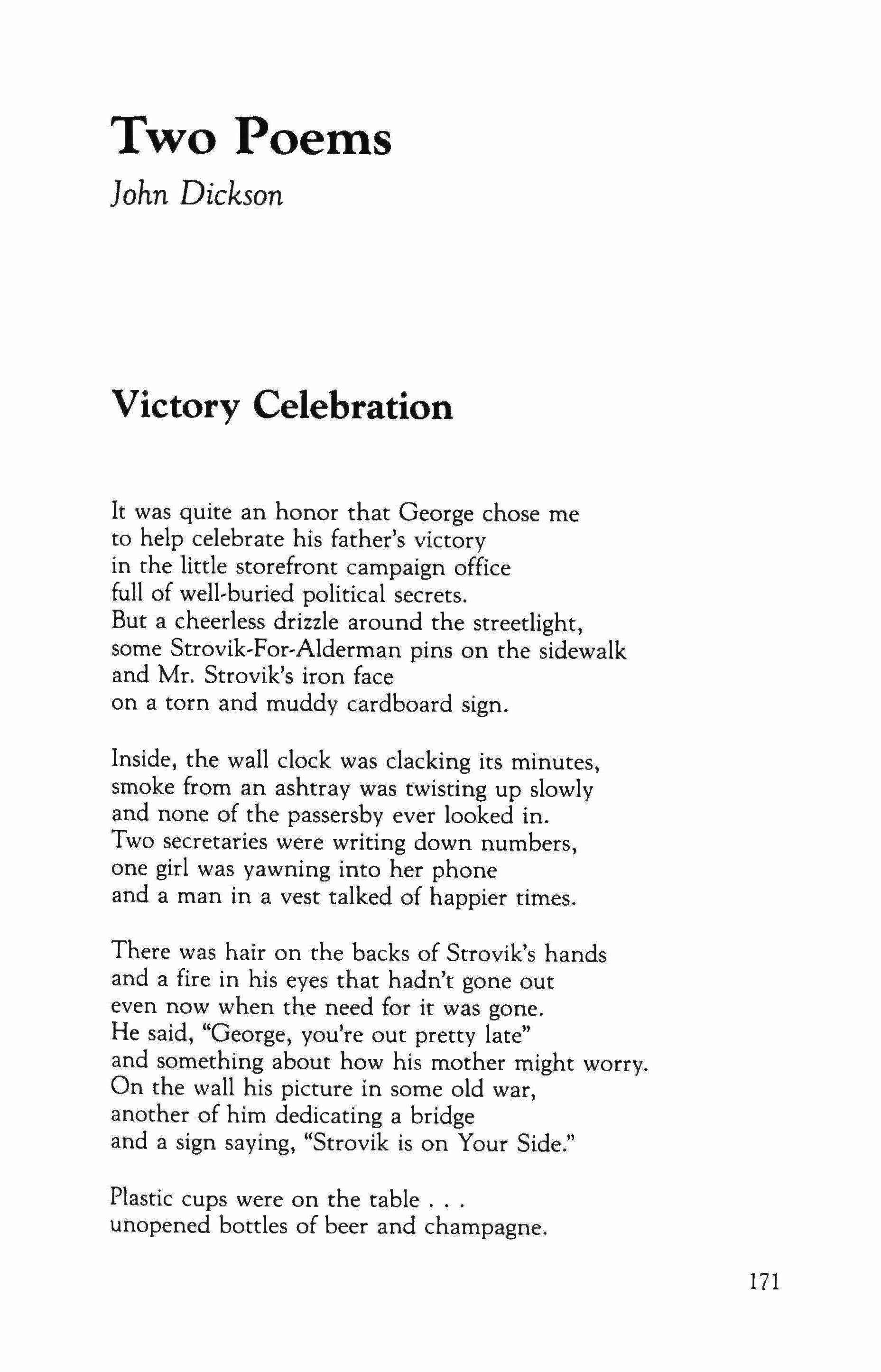
Victory Celebration
It was quite an honor that George chose me to help celebrate his father's victory in the little storefront campaign office full of well-buried political secrets. But a cheerless drizzle around the streetlight, some Strovik-For-Alderrnan pins on the sidewalk and Mr. Strovik's iron face on a torn and muddy cardboard sign.
Inside, the wall clock was clacking its minutes, smoke from an ashtray was twisting up slowly and none of the passersby ever looked in. Two secretaries were writing down numbers, one girl was yawning into her phone and a man in a vest talked of happier times.
There was hair on the backs of Strovik's hands and a fire in his eyes that hadn't gone out even now when the need for it was gone. He said, "George, you're out pretty late" and something about how his mother might worry. On the wall his picture in some old war, another of him dedicating a bridge and a sign saying, "Strovik is on Your Side."
Plastic cups were on the table unopened bottles of beer and champagne.
171
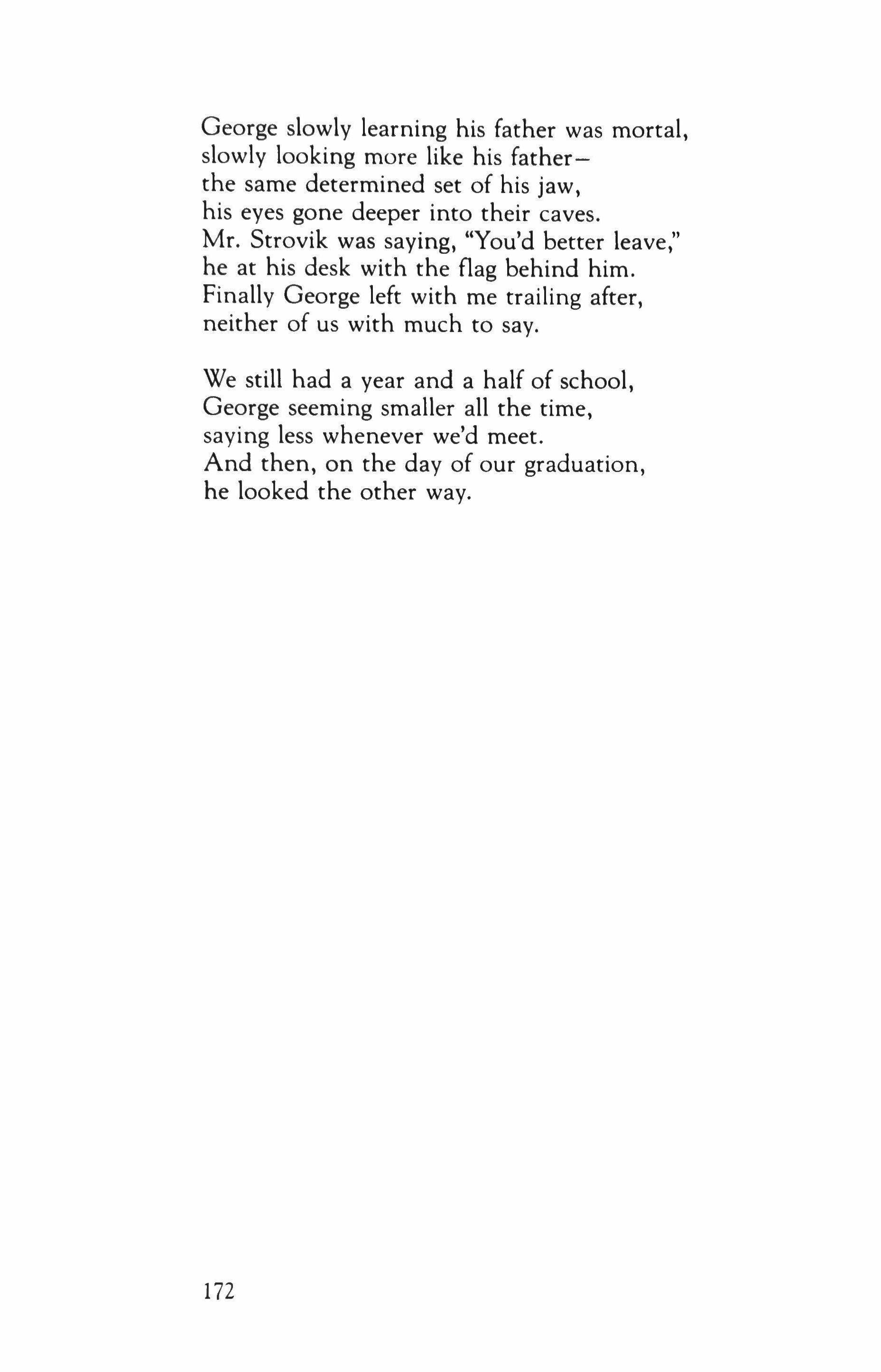
George slowly learning his father was mortal, slowly looking more like his fatherthe same determined set of his jaw, his eyes gone deeper into their caves. Mr. Strovik was saying, "You'd better leave," he at his desk with the flag behind him. Finally George left with me trailing after, neither of us with much to say.
We still had a year and a half of school, George seeming smaller all the time, saying less whenever we'd meet. And then, on the day of our graduation, he looked the other way.
172
Scheherazade
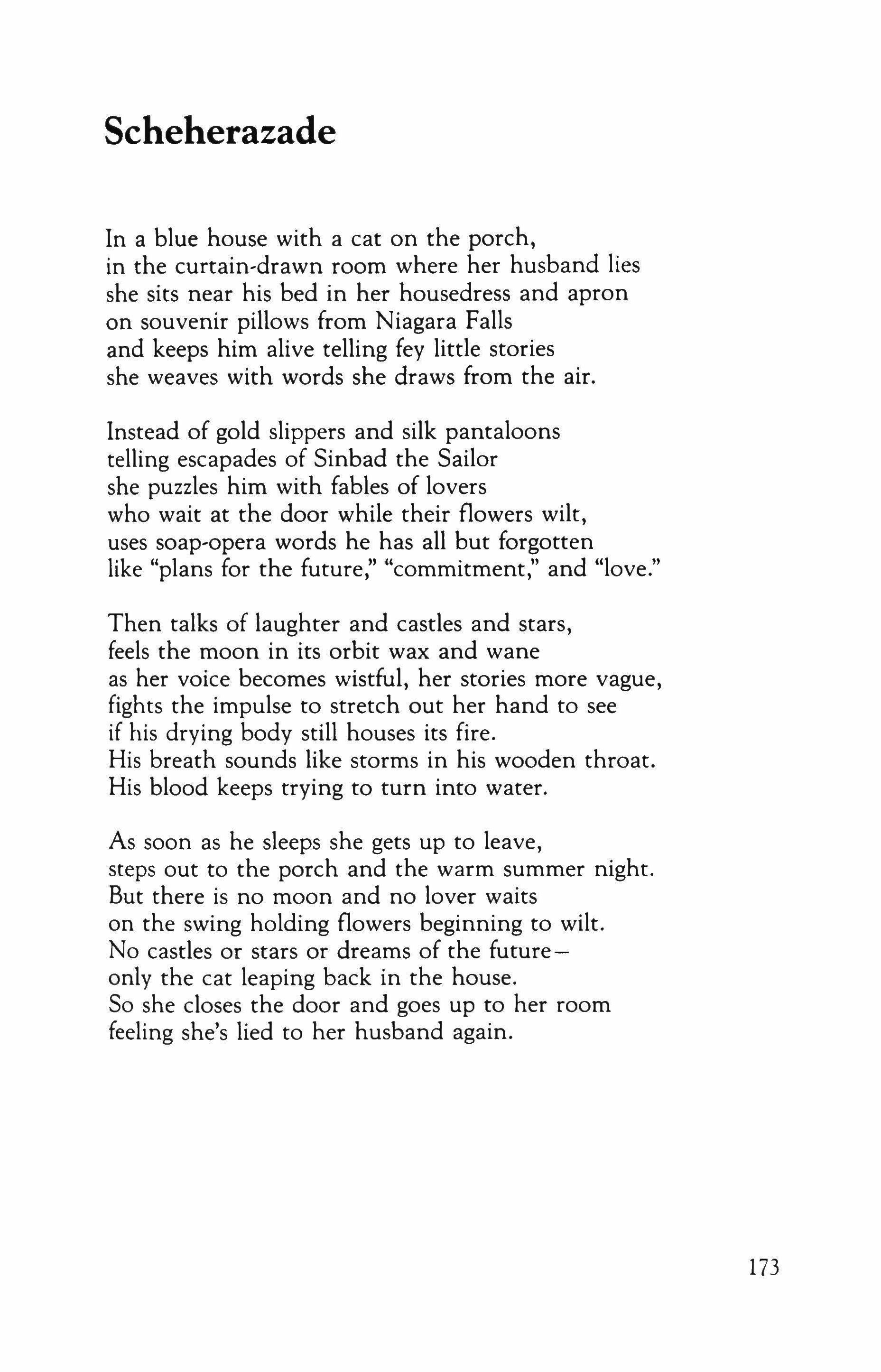
In a blue house with a cat on the porch, in the curtain-drawn room where her husband lies she sits near his bed in her housedress and apron on souvenir pillows from Niagara Falls and keeps him alive telling fey little stories she weaves with words she draws from the air.
Instead of gold slippers and silk pantaloons telling escapades of Sinbad the Sailor she puzzles him with fables of lovers who wait at the door while their flowers wilt, uses soap-opera words he has all but forgotten like "plans for the future," "commitment," and "love."
Then talks of laughter and castles and stars, feels the moon in its orbit wax and wane as her voice becomes wistful, her stories more vague, fights the impulse to stretch out her hand to see if his drying body still houses its fire. His breath sounds like storms in his wooden throat. His blood keeps trying to turn into water.
As soon as he sleeps she gets up to leave, steps out to the porch and the warm summer night. But there is no moon and no lover waits on the swing holding flowers beginning to wilt. No castles or stars or dreams of the futureonly the cat leaping back in the house. So she closes the door and goes up to her room feeling she's lied to her husband again.
173

j,\ I I fh I , t I I ' I. j , I ' I I '/ t .' ,,', ,/1 I "",/,,' _�At.. I ".J.J,_-=-_
Easter
Tony Hoagland

The earth is feeble at winter's end, light thin and heatless above the fields as if the sun were not properly plugged ineven the spruce trees along the road seem to hold their breath as if it would be painful to change position.
In such thin air, one can imagine the reluctance of Jesus to rouse himself from death; how he started up at the sound of his name then felt the chill of the living world and burrowed in again.
The Bible describes the long reabsorption by heaven of earth - how it proceeds in tiny degrees, by inches and feathers. The sparrow which falls is also ascending, and the woman who quiets the weeping child is moving her share of the mountain.
175

When the river stays frozen through a month of bright days, no one talks about the season of refusal. No one praises stubbornness to the face of the farmer whose forehead is ploughed with a frown.
No scripture tells the story of the angel who traveled through light-years of darkness to get to the gate of the appropriate cottage on the prearranged date. But the person inside will not answer. Won't unfold his arms or rise from his chair. He's not finished with winter. Not ready to forgive. Not in the mood for a miracle.
176
Two Chapters from Teiresias
Meredith Steinbach
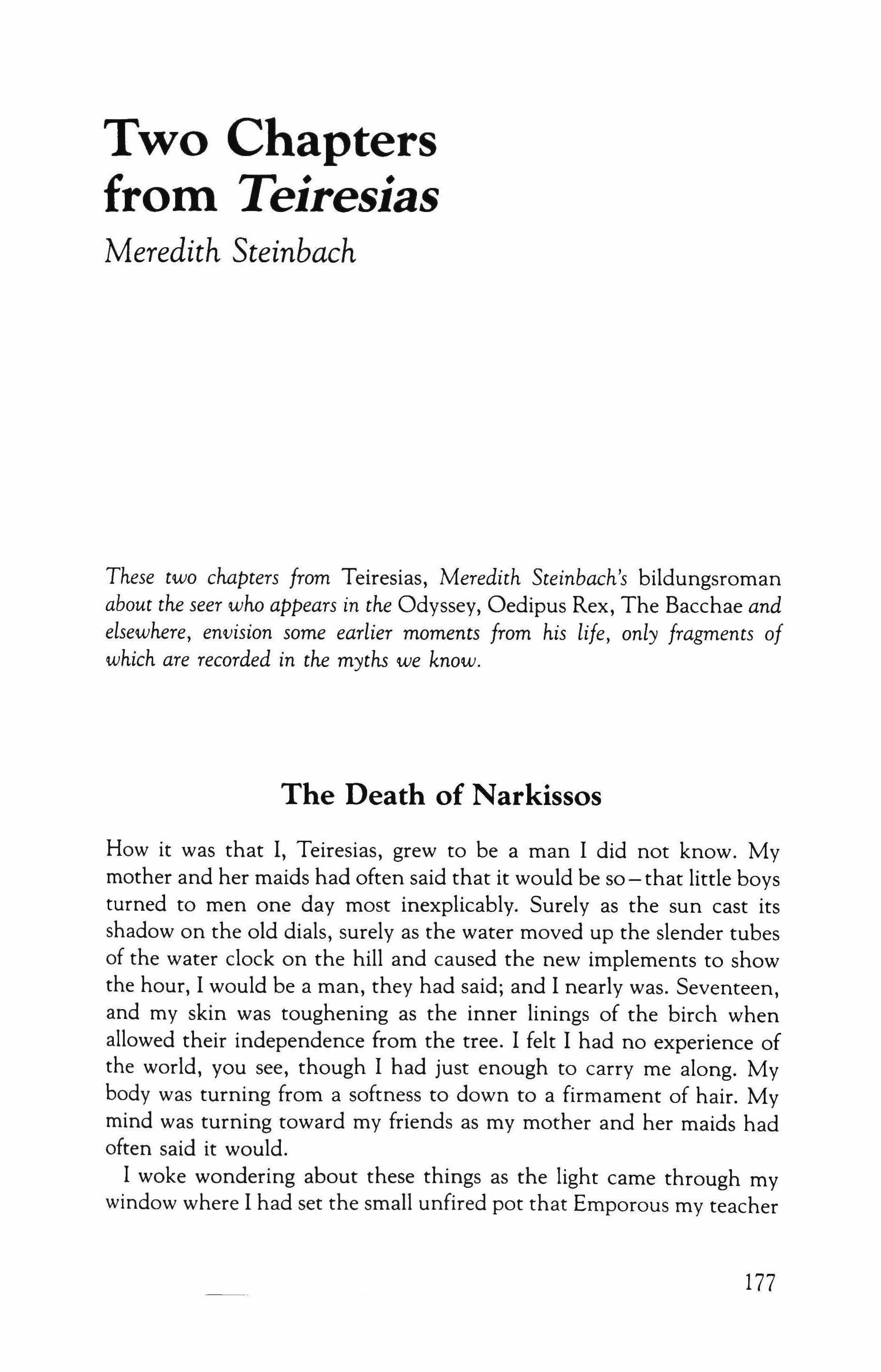
These two chapters from Teiresias, Meredith Steinbach's bildungsroman about the seer who appears in the Odyssey, Oedipus Rex, The Bacchae and elsewhere, envision some earlier moments from his life, only fragments of which are recorded in the myths we know.
The Death of Narkissos
How it was that 1, Teiresias, grew to be a man 1 did not know. My mother and her maids had often said that it would be so - that little boys turned to men one day most inexplicably. Surely as the sun cast its shadow on the old dials, surely as the water moved up the slender tubes of the water clock on the hill and caused the new implements to show the hour, 1 would be a man, they had said; and 1 nearly was. Seventeen, and my skin was toughening as the inner linings of the birch when allowed their independence from the tree. 1 felt 1 had no experience of the world, you see, though 1 had just enough to carry me along. My body was turning from a softness to down to a firmament of hair. My mind was turning toward my friends as my mother and her maids had often said it would.
1 woke wondering about these things as the light came through my window where 1 had set the small unfired pot that Emporous my teacher
177
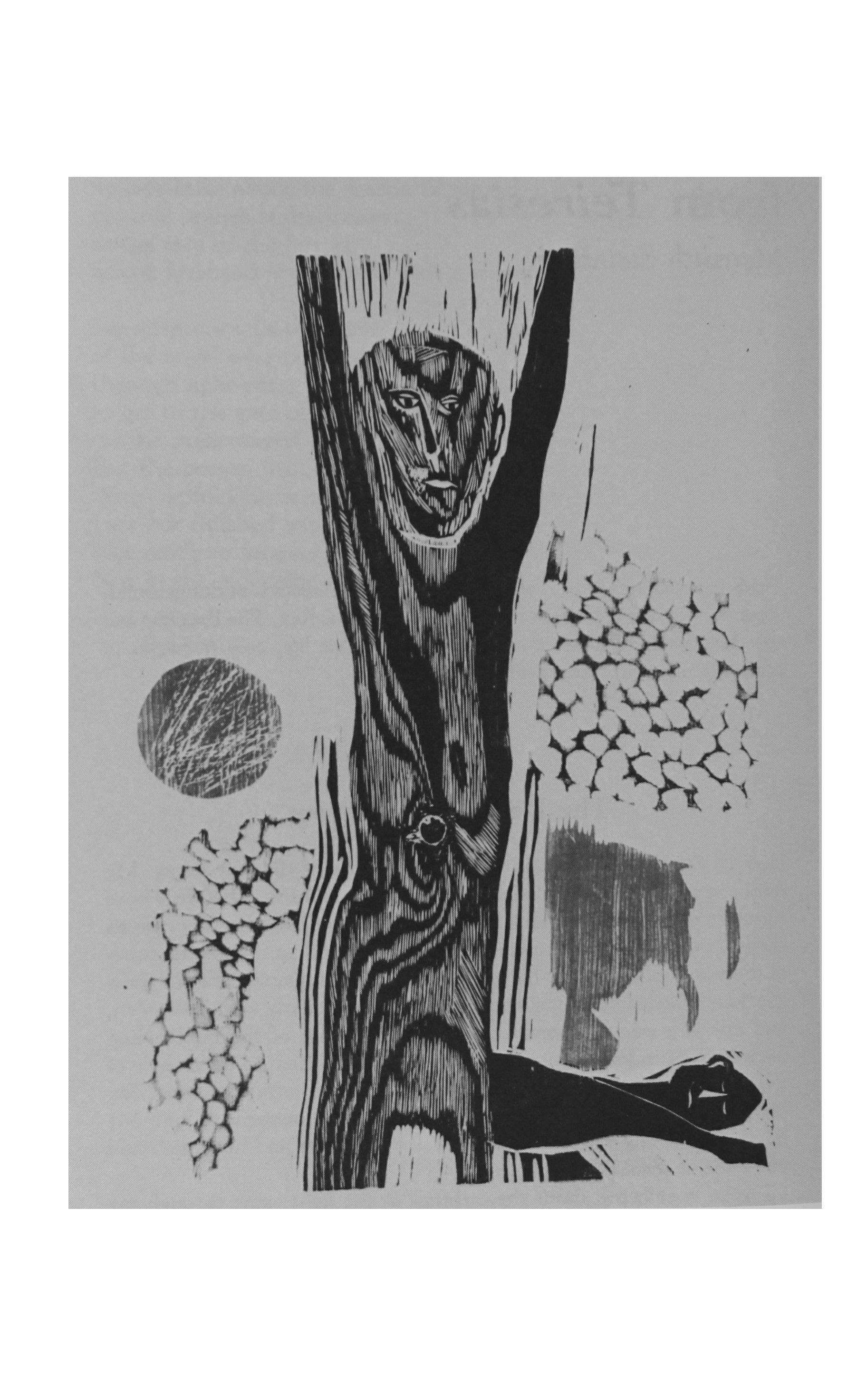
, I I \ , , .\ , ,. �' J ( J • \
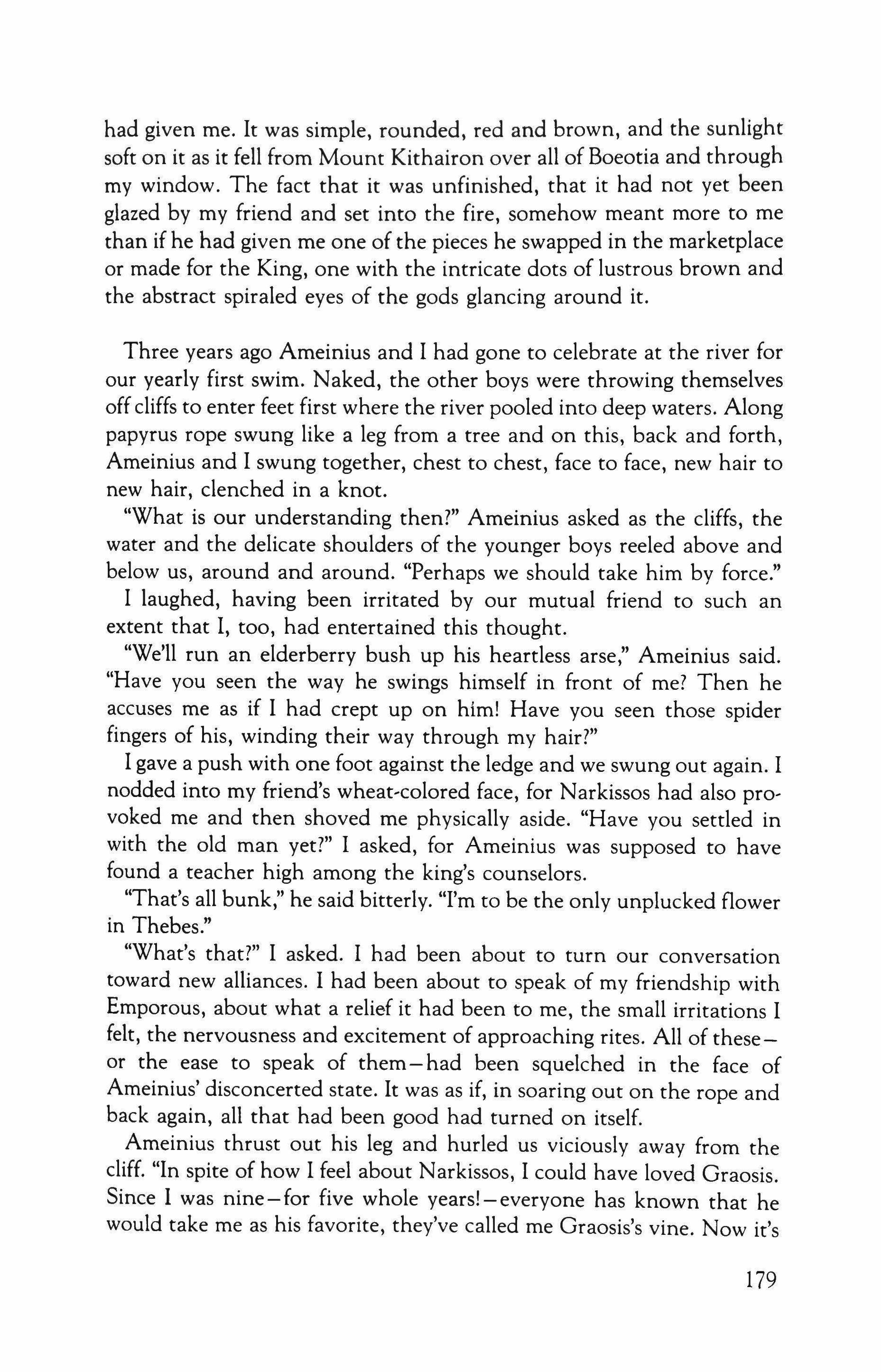
had given me. It was simple, rounded, red and brown, and the sunlight soft on it as it fell from Mount Kithairon over all of Boeotia and through my window. The fact that it was unfinished, that it had not yet been glazed by my friend and set into the fire, somehow meant more to me than if he had given me one of the pieces he swapped in the marketplace or made for the King, one with the intricate dots of lustrous brown and the abstract spiraled eyes of the gods glancing around it.
Three years ago Ameinius and I had gone to celebrate at the river for our yearly first swim. Naked, the other boys were throwing themselves offcliffs to enter feet first where the river pooled into deep waters. Along papyrus rope swung like a leg from a tree and on this, back and forth, Ameinius and I swung together, chest to chest, face to face, new hair to new hair, clenched in a knot.
"What is our understanding then?" Ameinius asked as the cliffs, the water and the delicate shoulders of the younger boys reeled above and below us, around and around. "Perhaps we should take him by force."
I laughed, having been irritated by our mutual friend to such an extent that I, too, had entertained this thought.
"We'll run an elderberry bush up his heartless arse," Ameinius said. "Have you seen the way he swings himself in front of me? Then he accuses me as if I had crept up on him! Have you seen those spider fingers of his, winding their way through my hair?"
I gave a push with one foot against the ledge and we swung out again. I nodded into my friend's wheat-colored face, for Narkissos had also provoked me and then shoved me physically aside. "Have you settled in with the old man yet?" I asked, for Ameinius was supposed to have found a teacher high among the king's counselors.
"That's all bunk," he said bitterly. "I'm to be the only unplucked flower in Thebes."
"What's that?" I asked. I had been about to turn our conversation toward new alliances. I had been about to speak of my friendship with Emporous, about what a relief it had been to me, the small irritations I felt, the nervousness and excitement of approaching rites. All of theseor the ease to speak of them - had been squelched in the face of Ameinius' disconcerted state. It was as if, in soaring out on the rope and back again, all that had been good had turned on itself.
Ameinius thrust out his leg and hurled us viciously away from the cliff. "In spite of how 1 feel about Narkissos, 1 could have loved Graosis. Since 1 was nine-for five whole years!-everyone has known that he would take me as his favorite, they've called me Graosis's vine. Now it's
179
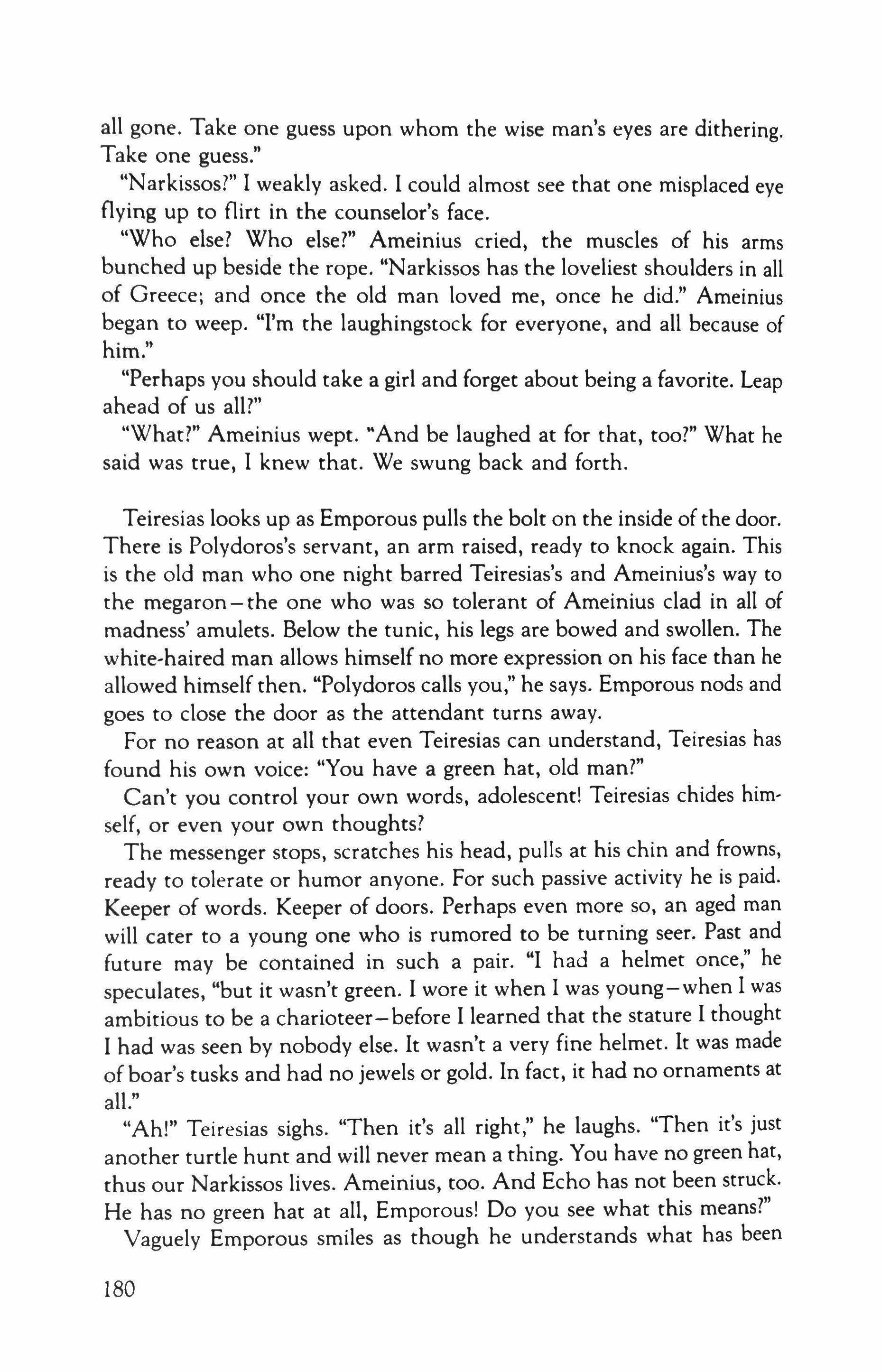
all gone. Take one guess upon whom the wise man's eyes are dithering. Take one guess."
"Narkissos?" I weakly asked. I could almost see that one misplaced eye flying up to flirt in the counselor's face.
"Who else? Who else?" Ameinius cried, the muscles of his arms bunched up beside the rope. "Narkissos has the loveliest shoulders in all of Greece; and once the old man loved me, once he did." Ameinius began to weep. "I'm the laughingstock for everyone, and all because of him."
"Perhaps you should take a girl and forget about being a favorite. Leap ahead of us am"
"What?" Ameinius wept. "And be laughed at for that, too?" What he said was true, I knew that. We swung back and forth.
Teiresias looks up as Emporous pulls the bolt on the inside ofthe door. There is Polvdoros's servant, an arm raised, ready to knock again. This is the old man who one night barred Teiresias's and Ameinius's way to the megaron - the one who was so tolerant of Ameinius clad in all of madness' amulets. Below the tunic, his legs are bowed and swollen. The white-haired man allows himself no more expression on his face than he allowed himself then. "Polydoros calls you," he says. Emporous nods and goes to close the door as the attendant turns away.
For no reason at all that even Teiresias can understand, Teiresias has found his own voice: "You have a green hat, old man?"
Can't you control your own words, adolescent! Teiresias chides himself, or even your own thoughts?
The messenger stops, scratches his head, pulls at his chin and frowns, ready to tolerate or humor anyone. For such passive activity he is paid. Keeper of words. Keeper of doors. Perhaps even more so, an aged man will cater to a young one who is rumored to be turning seer. Past and future may be contained in such a pair. "I had a helmet once," he speculates, "but it wasn't green. I wore it when I was young-when I was ambitious to be a charioteer-before I learned that the stature I thought I had was seen by nobody else. It wasn't a very fine helmet. It was made of boar's tusks and had no jewels or gold. In fact, it had no ornaments at all."
"Ah!" Teiresias sighs. "Then it's all right," he laughs. "Then it's just another turtle hunt and will never mean a thing. You have no green hat, thus our Narkissos lives. Ameinius, too. And Echo has not been struck. He has no green hat at all, Emporous! Do you see what this means?"
Vaguely Emporous smiles as though he understands what has been
180

said, though he cannot now know a thing. He moves to shut the door but the old man does not step back. "I am sorry to say," he offers quietly, looking at them, one after the other, left to right and back again, directly in the face, "though I am not the owner of the hat you've mentioned-these other assumptions do not follow. Polydoros summons you with unfortunate news which, it appears, you have already heard."
How hard suddenly the couch. He has already seen it. They are dead. "What is it?" Emporous asks when the man has left. "Who is dead?"
But the door springs open again.
"It was green! Once I covered my helmet with laurell" This voice precedes the knotted hands between the door and jamb, and then his colorless head pops in. The pink eyes twist up in excitement in his wrinkled linen face. The young Teiresias is wringing his hands. "My new wife and I wrapped laurel all around my helmet until it was nothing but green! It was as if I had sprouted a bush. That is a sort of green hat, isn't it? Perhaps that will mean something to you. It was worn in hilarity-a wild hope for the future-but now, looking back, it's become just a jest." The old man fingered his belt nervously, shifted his stance. "I thought you might have some word, some small news about me, you see. You said you had seen me in this hat, and I realized my denial was not entirely true." Teiresias opened his mouth to speak but this eldest of Kadmos's servants went on, nervously, gathering momentum, suddenly relaxed enough to scuff his feet, first one then the other in the middle of the floor.
"I have heard that the pythia has turned against you," the messenger said. "The stories are so mismatched that one can only rely on one's own good sense to lead the way, if there is a mite of rationale these days in anyone-Believe me, I would never exclude myself from scrutiny since I seem still to be alive, to my complete surprise, in these unpredictable times. And still, and yet, I said to myself, this business of the green hat might be important to the young man some people call a seer. It is true you travel in strange company, but haven't all mammoth men? And doesn't the new king, Polydoros, believe in the weird Teiresias? Forgive me, I am not accustomed to using my own words with anyone outside my private home."
Quietly Emporous sighed and covered his annoyance with his handkerchief, feigned a cough.
"Still that doesn't mean I don't harbor opinions of my own. Polydoros is but temporary on his father's throne; he is not Kadmos, no he is notfortunately fortunately, some people say; and I on some counts must agree. On others, well, that is yet to be seen. Can we judge what will
181
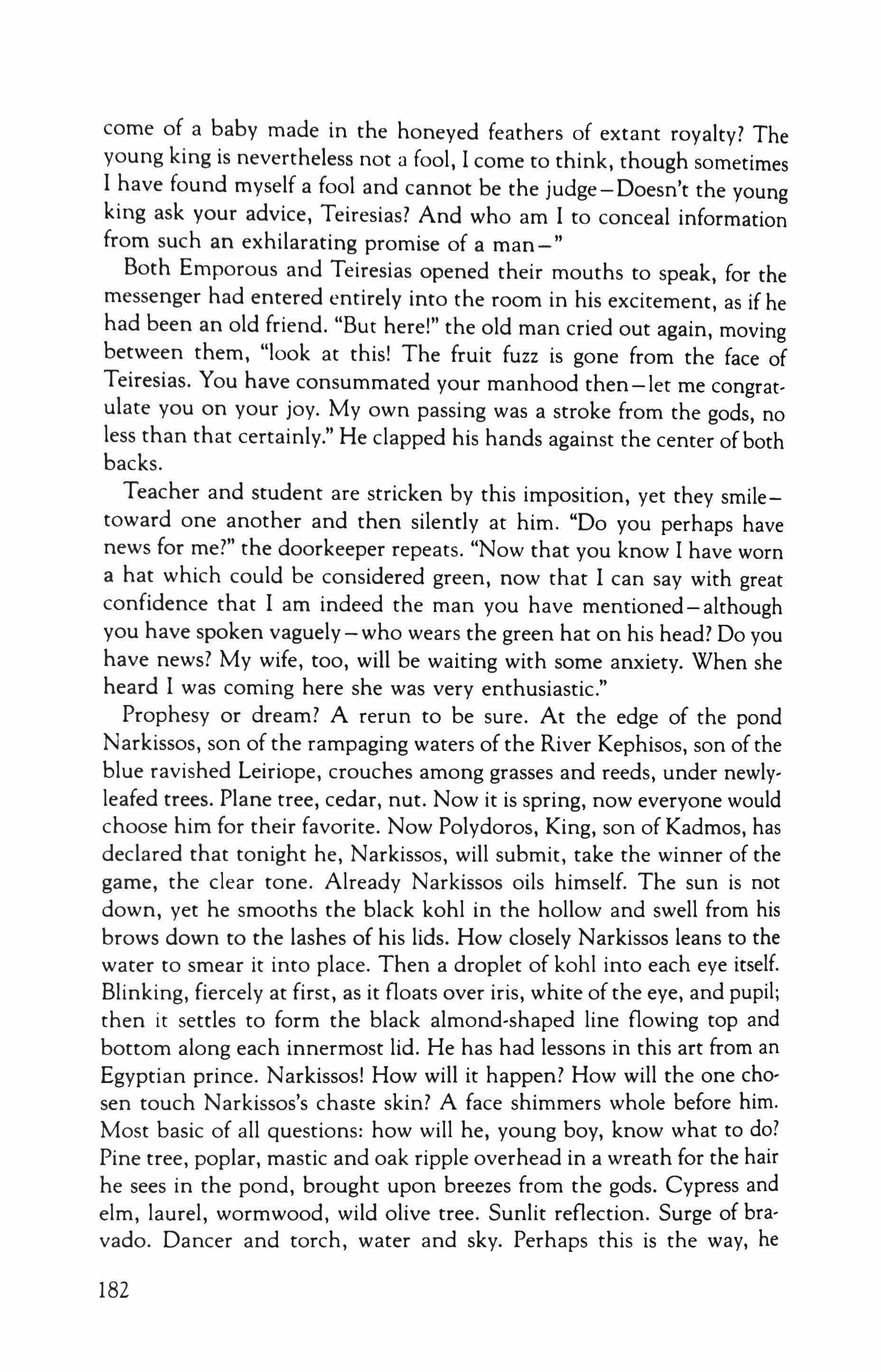
come of a baby made in the honeyed feathers of extant royalty? The young king is nevertheless not a fool, I come to think, though sometimes I have found myself a fool and cannot be the judge - Doesn't the young king ask your advice, Teiresias? And who am I to conceal information from such an exhilarating promise of a man-"
Both Emporous and Teiresias opened their mouths to speak, for the messenger had entered entirely into the room in his excitement, as if he had been an old friend. "But here!" the old man cried out again, moving between them, "look at this! The fruit fuzz is gone from the face of Teiresias. You have consummated your manhood then-let me congratulate you on your joy. My own passing was a stroke from the gods, no less than that certainly." He clapped his hands against the center of both backs.
Teacher and student are stricken by this imposition, yet they smiletoward one another and then silently at him. "Do you perhaps have news for me?" the doorkeeper repeats. "Now that you know I have worn a hat which could be considered green, now that I can say with great confidence that I am indeed the man you have mentioned-although you have spoken vaguely - who wears the green hat on his head? Do you have news? My wife, too, will be waiting with some anxiety. When she heard I was coming here she was very enthusiastic."
Prophesy or dream? A rerun to be sure. At the edge of the pond Narkissos, son of the rampaging waters of the River Kephisos, son of the blue ravished Leiriope, crouches among grasses and reeds, under newlyleafed trees. Plane tree, cedar, nut. Now it is spring, now everyone would choose him for their favorite. Now Polydoros, King, son of Kadmos, has declared that tonight he, Narkissos, will submit, take the winner of the game, the clear tone. Already Narkissos oils himself. The sun is not down, yet he smooths the black kohl in the hollow and swell from his brows down to the lashes of his lids. How closely Narkissos leans to the water to smear it into place. Then a droplet of kohl into each eye itself. Blinking, fiercely at first, as it floats over iris, white of the eye, and pupil; then it settles to form the black almond-shaped line flowing top and bottom along each innermost lid. He has had lessons in this art from an Egyptian prince. Narkissos! How will it happen? How will the one chosen touch Narkissos's chaste skin? A face shimmers whole before him. Most basic of all questions: how will he, young boy, know what to do? Pine tree, poplar, mastic and oak ripple overhead in a wreath for the hair he sees in the pond, brought upon breezes from the gods. Cypress and elm, laurel, wormwood, wild olive tree. Sunlit reflection. Surge of bravado. Dancer and torch, water and sky. Perhaps this is the way, he
182
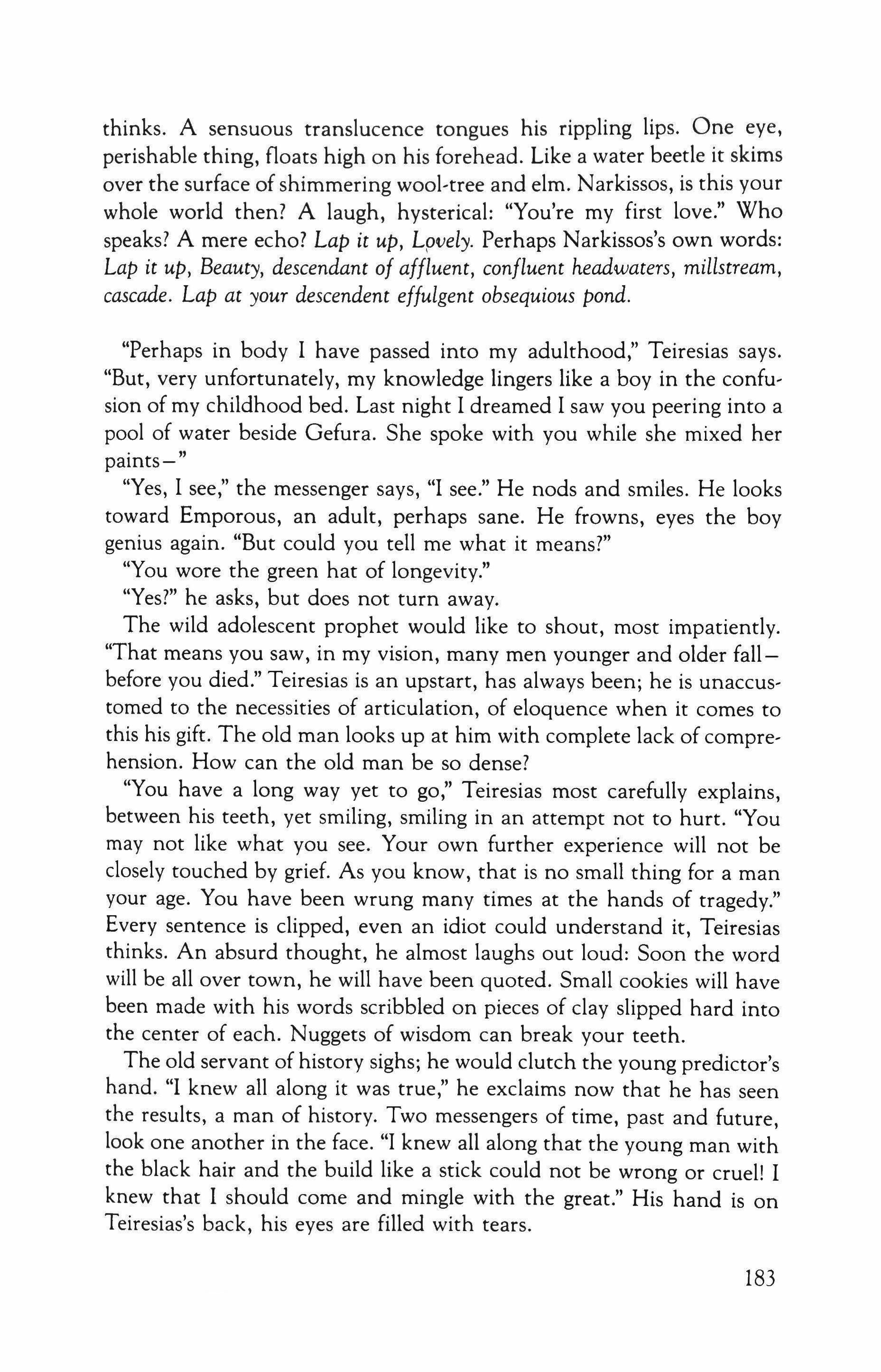
thinks. A sensuous translucence tongues his rippling lips. One eye, perishable thing, floats high on his forehead. Like a water beetle it skims over the surface of shimmering wool-tree and elm. Narkissos, is this your whole world then? A laugh, hysterical: "You're my first love." Who speaks? A mere echo? Lap it up, Lpvely. Perhaps Narkissos's own words: Lap it up, Beauty, descendant of affluent, confluent headwaters, millstream, cascade. Lap at your descendent effulgent obsequious pond.
"Perhaps in body I have passed into my adulthood," Teiresias says. "But, very unfortunately, my knowledge lingers like a boy in the confusion of my childhood bed. Last night I dreamed I saw you peering into a pool of water beside Gefura. She spoke with you while she mixed her paints-"
"Yes, I see," the messenger says, "I see." He nods and smiles. He looks toward Emporous, an adult, perhaps sane. He frowns, eyes the boy genius again. "But could you tell me what it means?"
"You wore the green hat of longevity."
"Yes?" he asks, but does not turn away.
The wild adolescent prophet would like to shout, most impatiently. "That means you saw, in my vision, many men younger and older fallbefore you died." Teiresias is an upstart, has always been; he is unaccustomed to the necessities of articulation, of eloquence when it comes to this his gift. The old man looks up at him with complete lack of comprehension. How can the old man be so dense?
"You have a long way yet to go," Teiresias most carefully explains, between his teeth, yet smiling, smiling in an attempt not to hurt. "You may not like what you see. Your own further experience will not be closely touched by grief. As you know, that is no small thing for a man your age. You have been wrung many times at the hands of tragedy." Every sentence is clipped, even an idiot could understand it, Teiresias thinks. An absurd thought, he almost laughs out loud: Soon the word will be all over town, he will have been quoted. Small cookies will have been made with his words scribbled on pieces of clay slipped hard into the center of each. Nuggets of wisdom can break your teeth.
The old servant of history sighs; he would clutch the young predictor's hand. "I knew all along it was true," he exclaims now that he has seen the results, a man of history. Two messengers of time, past and future, look one another in the face. "I knew all along that the young man with the black hair and the build like a stick could not be wrong or cruel! I knew that I should come and mingle with the great." His hand is on Teiresias's back, his eyes are filled with tears.
183

Emporous steps forward, gently indicating the world beyond the door: There lies still the orange light of early morning on the street. "We'll compose ourselves," Emporous says firmly, "and then we'll be there to speak to our old friend who is now turned king."
"Yes," the old one says eagerly, stepping out. "But you have already had the bad news, so your walk will not be as encumbered as when dread casts about in the imagination of what might actually be. There is some help in that for the bereaved."
I could not wait for an appropriate moment. I excused myself and, once I was around the corner, rushed into the bathing room. There I knelt down on the tiles beside the stone basin in the floor where each morning I squatted to allow the past to pass from me. The lovely breakfast Emporous had set before me I now set before myself again in a terrifying mixture of colors. My hands clung to the floor as if the tiles might cast me up into an existence I could not tolerate. When finally my belly gave up this revolution, I lay for a long time unable to lift my head. I had been sick only three times in my life. This was the third time. And the other two, it had been quite similar. Words had come out of my mouth, and then slowly the understanding of my own impertinence, and finally the sickness. I had spoken in the same way of dear dear Narkissos and he had turned from me in hatred. I had burst out with words for Barbaros, and he had embraced me. I looked up now to lift the latch that would allow these fluids of my understanding to be washed from the basin. There in the midst of what that morning I had devoured with such joy was the eye of the turbot, which we had vied for as we always did, which I had swallowed in thanksgiving. It stared up at me as it rushed round and round under the influence of the water, and then it was gone. I knew then about my friends. The thought did not waver before me on that day; it stood clear as the face of Emporous when I followed his voice into the workroom in that next moment.
Ameinius has fallen at Narkissos's door. Narkissos's mother is the first upon this. It is a moment so grotesque she feels as if she, Blue Leiriope, were struck in the head. Doublet of swords. She has yet to find her own son-little pert one, Narkissos, desired by all, grown rigid as a hedge along the border of his own maturity.
Leiriope moves away from the door most oddly, jerking from room to room, bearing the image of what even now is perched, strange bird, on her front step: the dead naked and perturbed adolescent Ameinius. A pair of swords runs through his smooth finely-haired abdomen and out
184
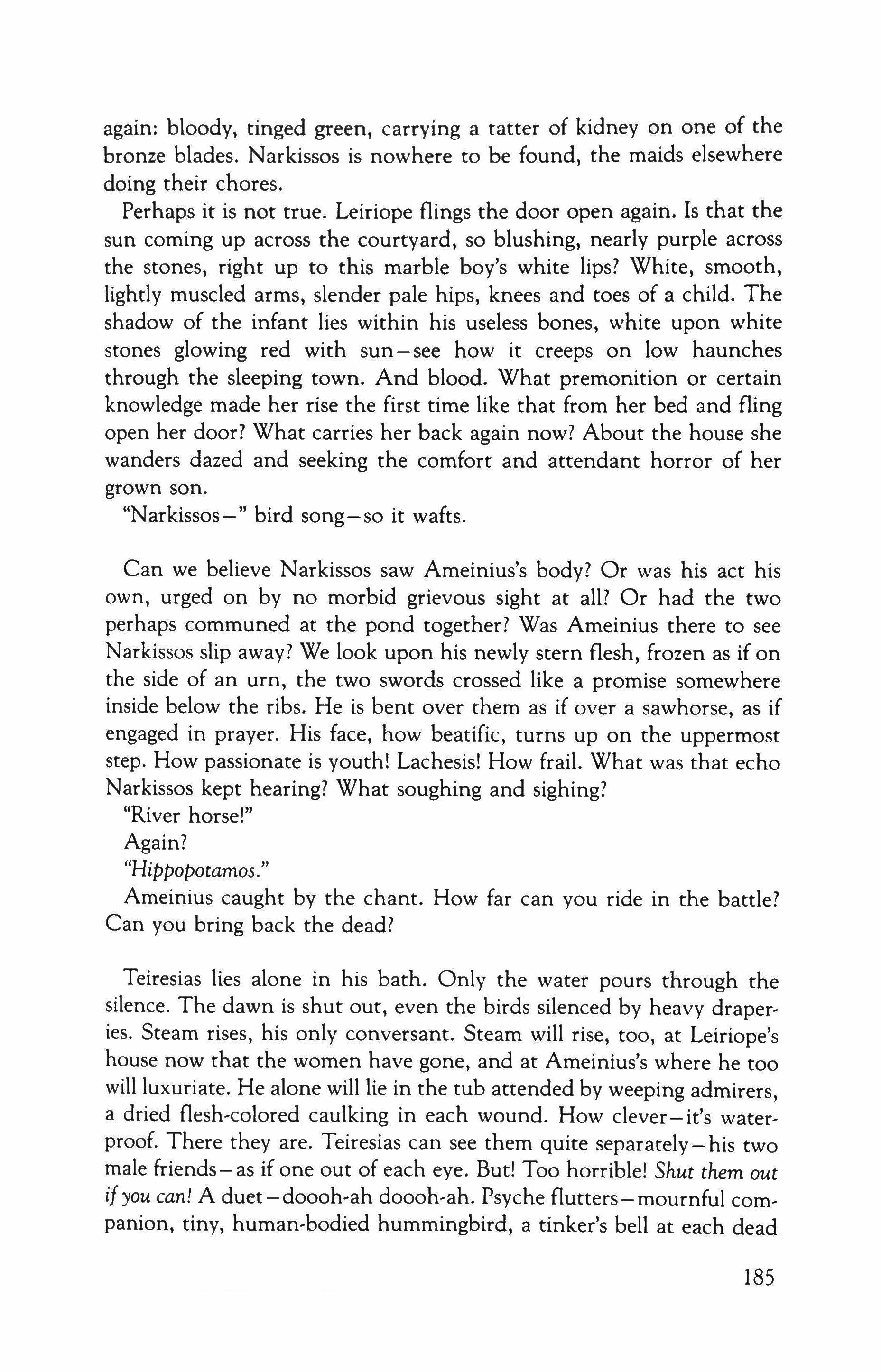
again: bloody, tinged green, carrying a tatter of kidney on one of the bronze blades. Narkissos is nowhere to be found, the maids elsewhere doing their chores.
Perhaps it is not true. Leiriope flings the door open again. Is that the sun coming up across the courtyard, so blushing, nearly purple across the stones, right up to this marble boy's white lips? White, smooth, lightly muscled arms, slender pale hips, knees and toes of a child. The shadow of the infant lies within his useless bones, white upon white stones glowing red with sun-see how it creeps on low haunches through the sleeping town. And blood. What premonition or certain knowledge made her rise the first time like that from her bed and fling open her door? What carries her back again now? About the house she wanders dazed and seeking the comfort and attendant horror of her grown son.
"Narkissos-" bird song-so it wafts.
Can we believe Narkissos saw Ameinius's body? Or was his act his own, urged on by no morbid grievous sight at all? Or had the two perhaps communed at the pond together? Was Ameinius there to see Narkissos slip away? We look upon his newly stern flesh, frozen as if on the side of an urn, the two swords crossed like a promise somewhere inside below the ribs. He is bent over them as if over a sawhorse, as if engaged in prayer. His face, how beatific, turns up on the uppermost step. How passionate is youth! Lachesis! How frail. What was that echo Narkissos kept hearing? What soughing and sighing?
"River horse!"
Again? "Hippopotamos."
Ameinius caught by the chant. How far can you ride in the battle? Can you bring back the dead?
Teiresias lies alone in his bath. Only the water pours through the silence. The dawn is shut out, even the birds silenced by heavy draperies. Steam rises, his only conversant. Steam will rise, too, at Leiriope's house now that the women have gone, and at Ameinius's where he too will luxuriate. He alone will lie in the tub attended by weeping admirers, a dried flesh-colored caulking in each wound. How clever-it's waterproof. There they are. Teiresias can see them quite separately - his two male friends-as if one out of each eye. But! Too horrible! Shut them out if you can! A duet-doooh-ah doooh-ah. Psyche flutters-mournful companion, tiny, human-bodied hummingbird, a tinker's bell at each dead
185

master's head. Echo, too, is gone; her body has not been found, though it has been said by villagers that there was a scream, oddly convoluted, almost a stutter caught deep in her throat. Death rattle, perhaps. Only Ameinius in chin-strap and veils will go to sit in the underworld and only by way of disfigurement. Grievously the soap slips in the bath. There is a dream here of memory retained. Lethe role on.
"I want to see my father."
"What made you think he was here?" The River Styx. "I want to see my father."
The River Lethe: Whoever said, you little boys, that you had such wondrous things?
We lie down again and wait for the tables to be brought. "And, Teiresias-" Emporous asks. "Did you facilitate the quick departure of our guest with this news for him? Or is this to be real in the old man's life?"
Why does he make no mention 0/ what I have said about our friends? I put my face in my hands. "I have only told him what I know. How can I say how I can tell such things?"
Emporous pats my arm. "It won't do him any damage to believe it anyway. He will go home happy to his wife and know that he will not see her die before he does."
Irritably I snap at him. "Yes, haven't I done it well? The old woman will know that she will see him die first. She will be troubled the rest of her life. The fools! Why do they come to me?" How automatically it occurs, down to the insistent whine of self-deprecation in the young ones voice.
"We all want to know what we don't know, Teiresias. Even you."
"Yes, and wish not to know a thing. Not one thing. Last night I saw something horrible and you do not even wish to know what it is. Fine, fine. I do not want to understand it further. Let it pass-like a leaf that falls down in preparation for winter and is trampled into the ground. Let it all pass without acknowledgment. We will prove that I am wrong, and I will be relieved of this. I say this to you! I have witnessed no laurel leaves! All will be well. I will live the most mundane of lives. I will hear nothing, know nothing extraordinary. I will be content."
Our breakfast cools unnoticed, and the woman must carry it out in discouragement. Empty-hearted and with an ache in our bellies, we are starting out. The narrow streets are filled with the morning refuse as the slaves sweep from one end of the city to the other toward the cornrnu-
186

nitv pit. The entire city seems made of these things now: fig stems, fruit rinds, husks of bread. Women's menstrual rags, broken pots and cups along the gutter, metallic scraps from the jeweler's shop. Stone chips, and potters' shards, discarded ribbons, a broken comb, the weaver's balled-up ends of threads. Carcasses of birds, cores of pears, one russet dog dead in its old box bed. Gephura's empty paint pots, shells of eggs pricked and crushed in someone's palm. A bloody bandage there. Specks of hair plucked and shaved from the faces and legs of Kadmeans. The milk-tooth of a child. Old leather cushions worn through, motheaten skins. Half-eaten feast-pig, an apple in its mouth. Broken shoes and dolls. The small blue rags that wipe away the nectar of love. A chariot wheel badly warped. Horse manure. Burnt loaves of bread. The cake that did not rise. Tokens from a lover who never arrived. The halfchewed gristle. Tooth-marks in the fat of life.
Come August the pond will be dry again, as it is each year. Even a pond looks up to see his magnificence. He tongues the lips before him, watery lips. Teiresias keeps seeing it.
"Why did you not think of going directly to Narkissos's house if you were so sure of the disaster?" Polydoros, the young king, shouts.
"It wasn't like that."
"Like what?"
"The place was irrelevant. The event was all-consuming."
Indeed, why had he not? Teiresias asks himself. Why had he not known where? Or exactly how. Had he not thought it already done, the deaths-all of his childhood friends? Hadn't it occurred in the megaron itself while he and Emporous slept? Hadn't the decision already been made?
"You might have been a help to the poor woman-your mother's friend, and yours."
"It wasn't like that."
"When will you accept the responsibility of your gift?"
"It isn't like that."
"You might have stopped them. At least one."
"I'm not a god."
"No, you're certainly not."
The torment of all time, and a holy blessedness: there remain so many things unexplained.
Emporous has made the funeral urn - a meter tall- spinning it with his spider hands. And then he cut it: still damp, with the knife, opened it
187

like a gourd. On the perfectly smooth interior, he painted your best friend's face so that your friend will not be afraid. And on the outside: the glaze over iron-rich clay, highly refined, mixed with water and painted on it the pictures of your loved one's life. The lost one will live here now, will wrap his arms around stiff legs, will rest a cheek on one knee as once was done so long ago, so recently. On the outside of this urn, we live: painting in the early-morning hours, carrying pots and holding up the brushes large and small- we live, as will Ameinius in the underworld, for all we know.
Begin the funeral dance. Gather around in your best clothes, your best fur coats, you who are left. The head of an eagle sits atop Teiresias's head; the giant wings ride his shoulders; and as he walks, bouncing at his waist as if scrabbling, are the feathered curled talons, friendly feet. There proceed on the dusty road, in a lambent twilight, the expressions of grief: animals torn from the fabric of life. Perhaps Zeus is among us, moving off silently now toward the woods on all fours. What are the gestures of reverence we see? Complete skins, and the heads are worn as hats. Such beautiful detailing of nature, a tribute to reality itself. Would that Ameinius had noticed the way these Boeotian plains lift up like the edges of a cup into the crags and grandeur, the whorls of mist. Here go among us noble faces, golden thick mane and hide: the Lion of Achelous. Wild cat lip and fang. A horse's comic toothy face. Fiercely yellow, the Wolf of Oppian. In the eye of that Bear ofTavgetus lives a blue-black glaze. There is a fox-fur stole. There is the cape and hood of our native lynx. The little deer have collected at the eastern gate: dappled, fallow, and the red, the Little Roe of Kithaeron. We hardly see the human legs running underneath. And there our Mvkenaean sheep in long, outspread, corrugated and yellowing horns. There weeps Basilieus's round pink eyes, Chief of Armed Forces in his wild boar's cape, glowering beneath the blunt-nosed, bristling animal snout. Ahead, Krino inside an ibex goat. Xenos, our merchant, wears the head of an ass. Xenos, a man for fads. But what does this matter in our time of grief?
Here are the little ones, the children, in their own fur wraps. Even our tiniest ones. A flying squirrel how darling atop the human infant scalp; there a dormouse grins above yet another baby's face. A little lad in his rabbit suit must prance in the dust at the side of the road. As if at a party. What hilarity. And costumery. What is this sadness though in his mother's face? But what is this pallor over the party? His father is whispering to his mother. "The chief has finally set aside his hedgehog cap for something more appropriate." The prickly helmet of war is
188

reserved for later tonight. Kadmos is coming home. Tomorrow another kind of congregating. For today, the hedgehog helmet may be replaced by the nappy head of the funeral donkey.
The adults are weeping. It is a funeral for three, though Ameinius is the only body. Polydoros has ordered a memorial for the ones whose names will not be mentioned at the rites; lost remnants are too sad for mentioning. Here are the cenotaphs along the way, a stone serna each to stand for Narkissos and Echo. Her body goes unfound, his unretrieved. Narkissos is said to have heard her voice, lithe Echo's lilting tones. Speculations follow the dead; no one will retrieve him, not his would-be lovers, not his mother. Not even Chariclo will wade in deeper and deeper up past her hips, skirts pasted by water reeds to her thighs, swimming then, to grapple with him beneath water, to pull up the son of her friend from such a grave. Not even Chariclo, who has imagined the rescue again and again, will enter the water and take him away. It has been said that Narkissos has found his answer. Did the oracle not say it would be so? Narkissos, it has been said, sacrificed himself to the gods, having mistaken himself for one of their own. Look down. See how his face looks up from the water almost as if it were a reflection. Echo in her own brilliance was revered by gods. Echo turned to parrot the words of those who were infatuated with charm itself. Now she is to tumble endlessly. As if caught in a waterfall. Of timeless utterance. It is the beginning. Polydoros says, from now on it will be this way. Place the statues of the missing, all of them, along the hallowed ground of the thoroughfare. As we travel we will remember. Where are we going? Where have we been? Polydoros and his bride are forbidden to attend the rites of the dead during their nuptial year. They will put it out of their heads, this tragedy, lying down together to conceive a brilliant lively little son they will call sweet Labdakos, lucky father of the one to be named Laios, father-to-be of the one they will call Swollen Foot, Wise One, Oedipos. We pray for his good fortune.
What are the things a little boy sees and hears at such a gathering? Or is he intent completely on pulling away from his mother's fingers, his father's; at leaping hare-like about at the edge of the road beside his friend who plays the dormouse?
A pretty man named Ameinius is coiled in an open jar. See how the hinged urn lies on that stretcher? Look, he wears such thin clay boots, the ones the potter has made for him. And at the heel of each shoe are beautiful wings, papyrus-thin. The dead man wears a new white toga.
189

And something horrible! The dead man's hand, the right one, is held in the curled fingers of his left. The right has been cut off at the wrist. The older boys will explain it. A suicide must carry his own hand into the underworld this way. Precious deadly cargo of a sad man. Secretly we have all wished to have clay boots and wear the wings. We would keep our hands, however; thank you, please.
In the urn, under Ameinius's head, rests a stone. There is a coin in his mouth. The little boys saw his mother place it there. Over and over we turn our own coins in our mouths, very shyly, tasting the acrid metal carefully. Since we were old enough to receive our first allowances, we have carried our small change in our mouths. This dead man, after all, is not so unlike the others. There is a beautiful honey cake for him to eat when the urn is shut. We would like to bite it, we agree. But no one else may sample it.
An old man is speaking now, for we have come to a halt by the stones Polydoros has had us erect. Here gapes the mouth of the cave where others were once, long before our time, in antiquity, sealed away. In his home the workmen will follow Ameinius's parents' wishes; they make a modern resting-place for him. They have moved aside the chairs and the couches; now they dig into the thick wall. The funeral procession will make its way three times around the town, with the urn open still. We can see his features now as every day we saw them. Beside him a little food, and there his favorite chariot toy and doll. Is he not still a boy? But it is not yet time to say goodbye. The old one's voice is strong though not for lack of effort. In it we are not surprised to hear a quavering.
"How can we forget the first wail of this infant, his pinched pale face, the lavendar opalescence of the broad slick cord, our exuberant passion at the sight of his small eyes staring out at us as if we were indeed something to be honored.
"After his first cry, still bloody and covered with his birth wax, he was laid upon the ground in front of the house his grandfather built. The priest cast the scented petals about him in a snow-white flurry. His father chanted to him: Be close in your first moments, Ameinius, to the ground that holds the ones we loved. Be close to your mother's father, and your sister, our Medea, who has gone before you. Be close to my sister, your grandmothers, your great uncle Aries, who walked with a limp and never said an unkind word but who had wisdom We walk but a little while,
190
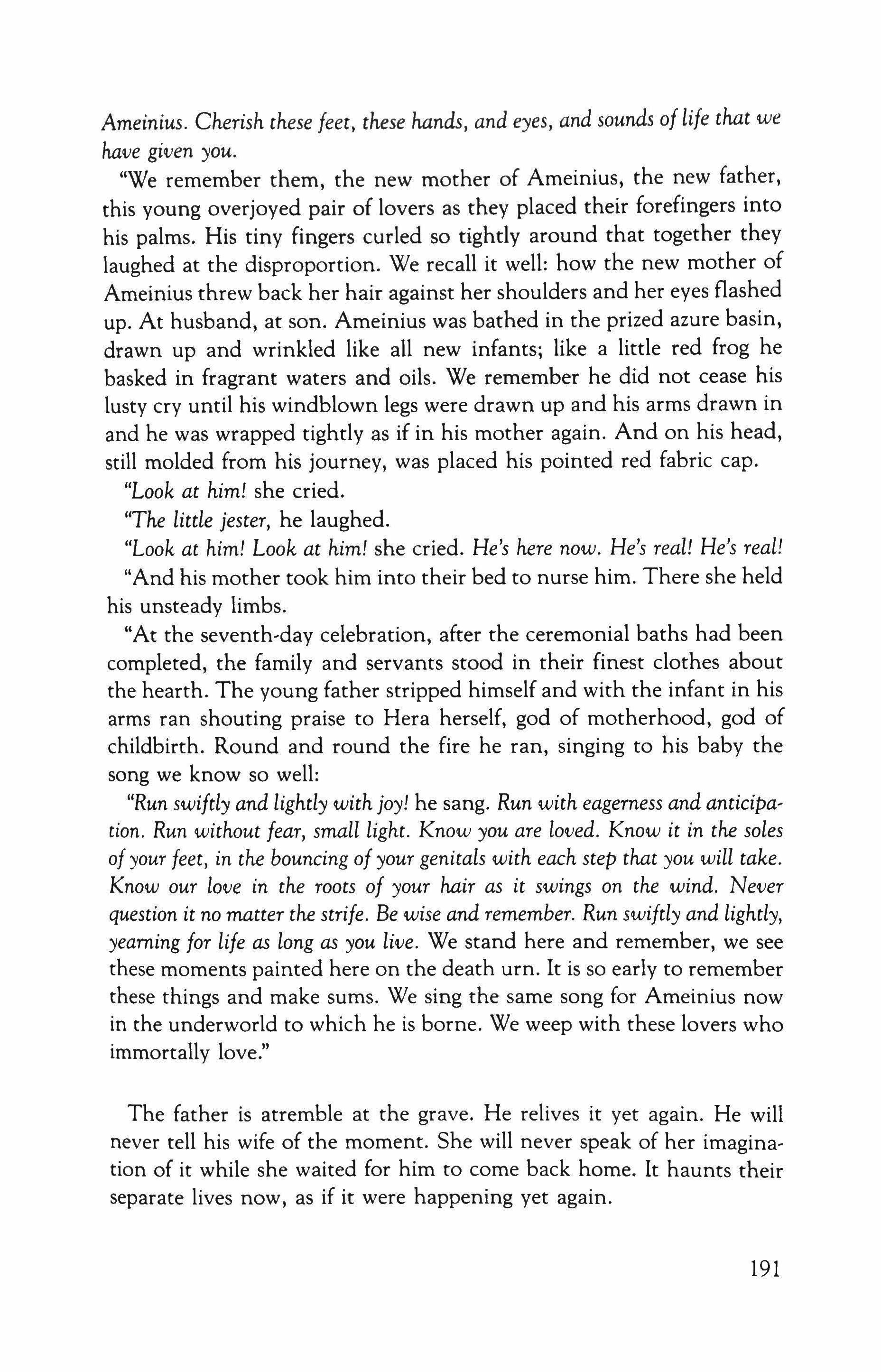
Ameinius. Cherish these feet, these hands, and eyes, and sounds oflife that we have given you.
"We remember them, the new mother of Ameinius, the new father, this young overjoyed pair of lovers as they placed their forefingers into his palms. His tiny fingers curled so tightly around that together they laughed at the disproportion. We recall it well: how the new mother of Ameinius threw back her hair against her shoulders and her eyes flashed up. At husband, at son. Ameinius was bathed in the prized azure basin, drawn up and wrinkled like all new infants; like a little red frog he basked in fragrant waters and oils. We remember he did not cease his lusty cry until his windblown legs were drawn up and his arms drawn in and he was wrapped tightly as if in his mother again. And on his head, still molded from his journey, was placed his pointed red fabric cap.
"Look at him! she cried.
"The little jester, he laughed.
"Look at him! Look at him! she cried. He's here now. He's real! He's real!
"And his mother took him into their bed to nurse him. There she held his unsteady limbs.
"At the seventh-day celebration, after the ceremonial baths had been completed, the family and servants stood in their finest clothes about the hearth. The young father stripped himself and with the infant in his arms ran shouting praise to Hera herself, god of motherhood, god of childbirth. Round and round the fire he ran, singing to his baby the song we know so well:
"Run swiftly and lightly with joy! he sang. Run with eagerness and anticipation. Run without fear, small light. Know you are loved. Know it in the sales of your feet, in the bouncing of your genitals with each step that you will take. Know our love in the roots of your hair as it swings on the wind. Never question it no matter the strife. Be wise and remember. Run swiftly and lightly, yearning for life as long as you live. We stand here and remember, we see these moments painted here on the death urn. It is so early to remember these things and make sums. We sing the same song for Ameinius now in the underworld to which he is borne. We weep with these lovers who immortally love."
The father is atremble at the grave. He relives it yet again. He will never tell his wife of the moment. She will never speak of her imagination of it while she waited for him to come back home. It haunts their separate lives now, as if it were happening yet again.
191

This father must perform the ritual. Indeed he must learn to hate the hand that killed his son. Can it be the little grubby hand of childhood suddenly grown, suddenly so suddenly disowned? The body has been laid out, washed, the women have filled the wounds with clay. Do not let this happen! No one can mistake the wounds for skin, yet how likecolored they are. Ameinius's face is pale yet radiant. How can that be? The arm extended over the bier. His boy's hand upon the wooden cask, waiting. See how the fingers curl. Oh suicide. It is the only act for which one can never ask forgiveness for oneself.
His baby swaddled, he thinks on that. No, not that. He would imagine himself in the woods chopping for the fire. He would take himself elsewhere, backward, backward into the beginnings of their small family, when life was an event of lusciousness, when all was hope and solidity. When to be away from his small son too long was to grieve for him. What is this wilderness of air through which his arms must swing? This is even worse than the worst he had imagined, braced himself fora son lost in battle perhaps, he had feared that, feared his son's body might die before his, go unexplicably unclaimed, a feast for yellow wolves and birds. Can it be he has swung the axe into the air? It is the custom, it is required. How can his own son have done this to him?
Perhaps if these sinners: five fingers, a palm, the tiny rivulets in each knuckle where time has passed through, perhaps if they are all rent from the one they have killed, perhaps the victim can go about his business with his dead friends, perhaps gain some relief at least, some happiness, some rest accompanied by his tiny spirit and theirs in the dampness of the underworld. The wrist waits. The axe falls. A father wails.
Evening and the fluteplayers accompany the mourners of the boy, would-be lover of Narkissos. The soft pelts of creatures, their dazed eyes, are gathered at the pond near the house. Their heads are swaying. There is nothing more desired, more feared than to love Narkissos. Unless it is to be Narkissos. Infatuation, you greatest trickster, you. The women relatives follow the body into the house lest the soul of Ameinius-small as the blossom of a violet, shaped like a man, winged at the shoulder and wild with new free form - might flyaway, might take its lodgings in someone else, someone not of the family, someone alien and yet unborn. A bee with potent sting, a soul not bigoted. The sound of the urn snapping shut echoes from the house. The women are crying, as if birds, in alarm. They would claim him still, gangly unfortunate one, almost a man, who yesterday ate at the table, sang quietly his anticipations, told
192

an off-color joke and apologized most humbly, even sincerely. Together they laughed. Yes to hear that joke right now, to hear it again and again.
the meat the wine afterwards, almost a continuation of the festivities a few nights before.
scratches in the cheeks: channels down which tears may run hair torn like chaff
dawn breaks over Kithaeron and the little winged spirit lifts up, falters a moment, hesitates. And then Ameinius, is away.
193

The Birth of the World As We Know It
In Boeotia, between the time when winter crystalizes the thoughts in one's bones and summer when the climate seethes and roils until the common man's madness is that of the unattuned dog, there comes a moment called spring. On the spur of just such a moment Zeus entered into a blissful relationship with the daughter of Kadmos and Harmonia, sister of Ino, Agaue, Polvdoros and Autonoe. She was called Thyone, otherwise known as Semele.
Now Semele, a young and inexperienced woman, was especially excited by this large and bearded man. When he was in the throes of passion, it seemed to her, he changed his shape. When he was breathing gently beside her face, she would close her eyes tight and there on the backs of her lids she saw him: his tongue hanging out lovely and long and pink between his lower canine teeth, and over them: his nose drawn out narrow and black at the end, furred nearly to the tip. When he rubbed his face against her belly, it was an intricately feathered thing she saw: a dove perhaps, cooing and regally tufted. More than once he had amused her with his animal calls; and she, well- Neither of them had ever been happier. Of all his lovers, it was only with Semele that he took on his human form.
This was exactly what incensed the god Hera: that Zeus, her mate, was with Semele in his human figure, something which Zeus had insisted he would reserve for the sight of the other gods, no matter what the others might practice. "You are everything! You are everything to me!" Semele could be heard crying out - as far away as Mount Olympos. On the mountain the other gods sighed to themselves and studied their feet. They could not look at Hera directly. Sitting in the Great Hall, they crossed their legs in front of the fire. It was as if the lovers' strange ululations had been amplified a thousand times.
When Hera had gone off to her own chambers, the other gods said: Perhaps something astonishing is about to happen. For Zeus had never in the history of the world taken on so many forms with anyone lover, certainly never a human one. So the gods looked at their sandals when Hera came in to join them. There was Hera, the great god of Marriage and Childbirth and Agriculture, chewing on her fingers.
After what seemed years and at the same time only a matter of short moments, the other gods quite suddenly found themselves leaning out from their couches. There below beneath the coals of their comfortable fire they saw what they in unison wished not to witness. First they saw
194

Hera as they usually knew her: in her resplendence, her iridian hair flowing out around her ravishing face, her magical eyes. They heard her melodious voice gone angry, like a great bell ringing, while all the while she beamed up at them. "If the old mule can change forms every which way for his own advantage," Hera called out, "I can certainly use his hijinks-for all our benefits."
There she was: Hera at the door to Semele's compartments in the very ship that was carrying Semele's father, King Kadmos of Thebes of Greece as they knew it, along with the rest of the royal family, home from their travels in Egypt. Hera stood in the exact likeness of Semele's nurse: in the old woman's polished apple face, with the two darting white eyebrows, the plump, very short figure in the slightly shorter purple robe. There was the old woman's voice in her throat. Only a god would have recognized her in the new miniature form.
Lithe Semele was stretched out on her adolescent stomach in the bedclothes, swinging her feet back and forth beneath the porthole. "Nanos," she said seeing the old woman who was nearly short enough to have been considered abnormal, her mind on quite someone else. The sea was not very swollen that day, the waves not much of a problem. There was a pleasant sloshing in the background as if somewhere the gods were drinking coffee.
"Semele, Semele," the Goddess of Childbirth and Marriage said warmly in the voice of another. There was an element of concern that was not entirely hard-hearted, for here was a young prospective mother in need of strong counsel. "Think harder, little Semele, about this." Hera in the form of the loving old nurse pleaded with her as only mothers and nurses can plead in such a situation. She placed her small hand like a starfish on the young girl's back and patted her as she had done from the girl's infancy. "Baby, baby," she said. "Don't hurt yourself."
"He is so good, Nanos."
"Yes," the old woman said, patting the girl on the shoulder with affection. "I know it. He makes you feel like a flower, I know it. But I have heard that very flower howling at night. What is it, Semele, makes a sweet thing like you into a howling of flowers?"
"Don't scowl at me, Nanos," said the innocent and affectionate Semele, sitting up on the bed. She drew her little governess up with her, as often she did, and the tiny woman sat in her lap as if she had been one of Semele's most beloved stuffed playthings. "Please don't scowl at me," she said, for the relationship with her Nanos was more important
195

to her even than that with her own mother. Semele laid her head on the shoulder of the petite governess she was holding.
"Hera will be displeased with you," the round woman said, brushing Semele's hair back where it had fallen out of the barrettes at the side of her face. She pinned the long black tresses. "Please be careful, little bunting. Hera's not someone to trifle with."
Suddenly petulant she shrugged off her nurse's hand. "Hera has nothing to do with this," Semele said, and the old woman withdrew immediately, trundled down off the side of the bed to stand again at the knee of her young, royal charge.
"Hera will lead you when you bear a child. Then you will need not to have alienated her. There's still time to turn back, sweet innocent. Think what it means. He's Hera's husband."
"Nanos, please," Semele whined. "I know what I'm doing. Leave me alone, please."
Firmly the old woman tugged at the sleeve of Semele's nightgown. It was a gentle tug, the same as the old woman had been delivering since Semele had learned her first words. To Semele it meant, You are going too far.
"I am everything to him. Everything. And he is Zeus; he's chosen me, think what that means."
The old woman tapped at her sleeve. "He's been with others, many others."
"They didn't mean anything to him," Semele whimpered in an adolescent voice. "He told me. I am the only one who has ever meant a thing to him."
"Words. He has said it before. Certainly Hera has had more." The pitch on the boat had begun to smell again as it often did when the air was just so. And looking out the porthole window, standing now on the stool and looking out, away from her darling girl, the governess looked toward the eye of Ra painted on the blue bow. "Like a serving maiden, you eat only when others have eaten. You are only a small part of a pessoi game to him. If he saw someone else, or someone challenged him, or he just grew weary with himself-don't you see?"
"You've never believed in me," she cried out against her Nanos in the way of all young human beings. "You don't believe I could get someone extraordinary like that. There is no one above him. He chooses me and he is a god. A god chooses me, Nanos, he chooses me to be with."
"You are the only one who doesn't believe in yourself. That's why he
196

preys on you, because you will think just what you have just said. You are going to ruin everything you have."
"You are jealous," the very young woman said. "You have never had a god for a lover and you are old."
"Zeus imagines he is the only one of importance," Hera said. "He grows more ludicrous day by day. Many think so, more and more."
"Stop it!" Semele cried, thrusting her hands to her ears. "Stop it! No one who isn't a fool can think unkindly of him. He is so hurt by the world, he told me so. He is so pained by it all."
"He says that to everyone, the best ploy of all. Poor sad manipulator of all."
"You don't even know how important he is to me. You have no way of knowing and you tell me what to do." Then Semele-involuntarily, certainly - glanced for just a second down at the front of her nightdress.
"You're pregnant now," Hera said. "Now you are pregnant."
Semele stared with her rich brown eyes at her Nanos, quite startled.
"Yes, I see," Hera said, turning cold in the old woman's frame, yet there she stood again beside the bed where the young woman sat.
"Oh, Nanos, please don't be mad at me," Semele cried. "I'm to have a baby and I'm so excited about all of it."
But the old woman had pulled away from her. Nanos was shouting at her beloved Semele, and Semele was crying. "You, who have had less than half of everything Hera has had from that fool Zeus, will now have a child from him? Why don't you just ask him to come to you the way he came to Hera? Why don't you see how he will leave you behind when you ask, you and the little baby." And then the old woman also was crying. She sat right down on the bed beside Semele and wept immense tears.
It seems so long ago, their fight. Yet they both remember it:
Zeus is pacing while Hera luxuriates in her bed. "So you're back," she says. "What was it this time? A caterpillar or a snake? A tufted titmouse?" She laughs, gathering speed. "Perhaps a naked mole rat? 'Was there a band of eagles singing overhead?"
She does not say that last night she saw him come in, his beard a hoary extravaganza of tangles, hair tousled to no end. His eyes were jet black coals in his elegant head. She saw him dancing naked then in front of the polished metal mirror, saw the diffused image of him, smiling shyly back at himself only to disintegrate in a perplexed rage. If she had been younger, if he still her brother and not her lover rejected and rejecting so many times over, she would have held his wild head against
197

her chest, wrapped her rainbow hair around him, and cradled his sobs. How beautiful he was, his long limbs swaying before the reflection, his wide shoulders bearing up his portion of the sky.
"Zeus," she says. But she hears a voice.
"Zeus," it says. A taunt?
"Can't we-"
"Can't we-" It is a high-pitched mockery.
Zeus and Hera have shrugged each other off again. She dresses with the help of her maids and goes out to the courtyard. Her hair is braided down her back to give her air, the blue and green intertwined with indigo and violet. Each color makes a plat within the larger braid. They brush against the back of her ankles as she walks. It is so hot even here in the mountains that her peacocks wilt and drag their tails about like rugs, following after her. But what is wrong with this picture? Down below: past the tree-line of conifers, past the ragged rocky slopes where the flatter lands begin, are there not usually the light green tufts of olive trees, the snaggled dark green vines of grapes? It would only take a little effort, Zeus. Where is the rain? The plains are smouldering. Zeus is arguing. And she: what of her pomegranate and apple trees? She will inspire someone to carry water from the stream.
"Women have it better than men in sex," Zeus chides, coming up behind her.
"That is the only thing you haven't managed to turn yourself into, isn't it?"
"I wouldn't degrade myself," Zeus says.
"You wouldn't degrade yourself?" she snarls. "You who have been a slug wouldn't degrade yourself? You, Mr. Thunder, Mr. Rain. Pretty soon the fact that men have a zealish time in sex and women don't will hardly mean a thing."
"Women have every pleasantry. Pampered from morning to night without a pain."
"Is that so?" Hera smiles. "Perhaps you should have a child."
"Perhaps I will."
"That's not bloody likely, now is it? Even for you."
Teiresias is rubbing the astonishment from his eyes with his fists. The gods have called him in to settle an argument, he who at even his young age has reportedly traveled through time, through space, through madness and sanity, through the sensibilities of both sexes and all their sorrows and joys. Zeus puts the question to him: "Who has the most pleasure in sex? Who receives the most-man or woman- Teiresias?"
198
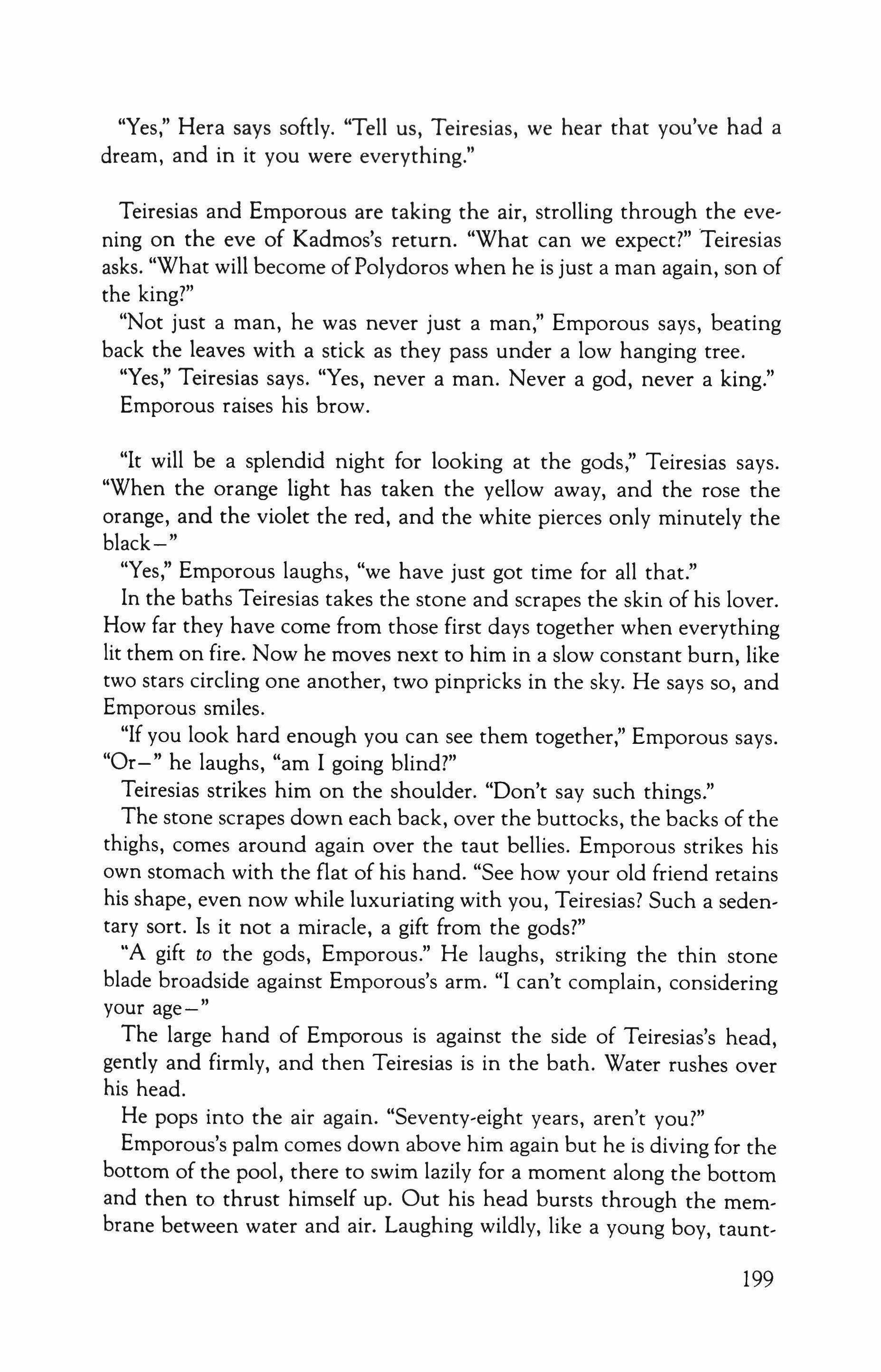
"Yes," Hera says softly. "Tell us, Teiresias, we hear that you've had a dream, and in it you were everything."
Teiresias and Emporous are taking the air, strolling through the evening on the eve of Kadmos's return. "What can we expect?" Teiresias asks. "What will become of Polydoros when he is just a man again, son of the king?"
"Not just a man, he was never just a man," Emporous says, beating back the leaves with a stick as they pass under a low hanging tree.
"Yes," Teiresias says. "Yes, never a man. Never a god, never a king."
Emporous raises his brow.
"It will be a splendid night for looking at the gods," Teiresias says. "When the orange light has taken the yellow away, and the rose the orange, and the violet the red, and the white pierces only minutely the black-"
"Yes," Emporous laughs, "we have just got time for all that."
In the baths Teiresias takes the stone and scrapes the skin of his lover. How far they have come from those first days together when everything lit them on fire. Now he moves next to him in a slow constant burn, like two stars circling one another, two pinpricks in the sky. He says so, and Emporous smiles.
"If you look hard enough you can see them together," Emporous says. "Or-" he laughs, "am I going blind?"
Teiresias strikes him on the shoulder. "Don't say such things."
The stone scrapes down each back, over the buttocks, the backs of the thighs, comes around again over the taut bellies. Emporous strikes his own stomach with the flat of his hand. "See how your old friend retains his shape, even now while luxuriating with you, Teiresias? Such a sedentary sort. Is it not a miracle, a gift from the gods?"
"A gift to the gods, Emporous." He laughs, striking the thin stone blade broadside against Emporous's arm. "I can't complain, considering your age-"
The large hand of Emporous is against the side of Teiresias's head, gently and firmly, and then Teiresias is in the bath. Water rushes over his head.
He pops into the air again. "Seventy-eight years, aren't you?"
Emporous's palm comes down above him again but he is diving for the bottom of the pool, there to swim lazily for a moment along the bottom and then to thrust himself up. Out his head bursts through the membrane between water and air. Laughing wildly, like a young boy, taunt-
199
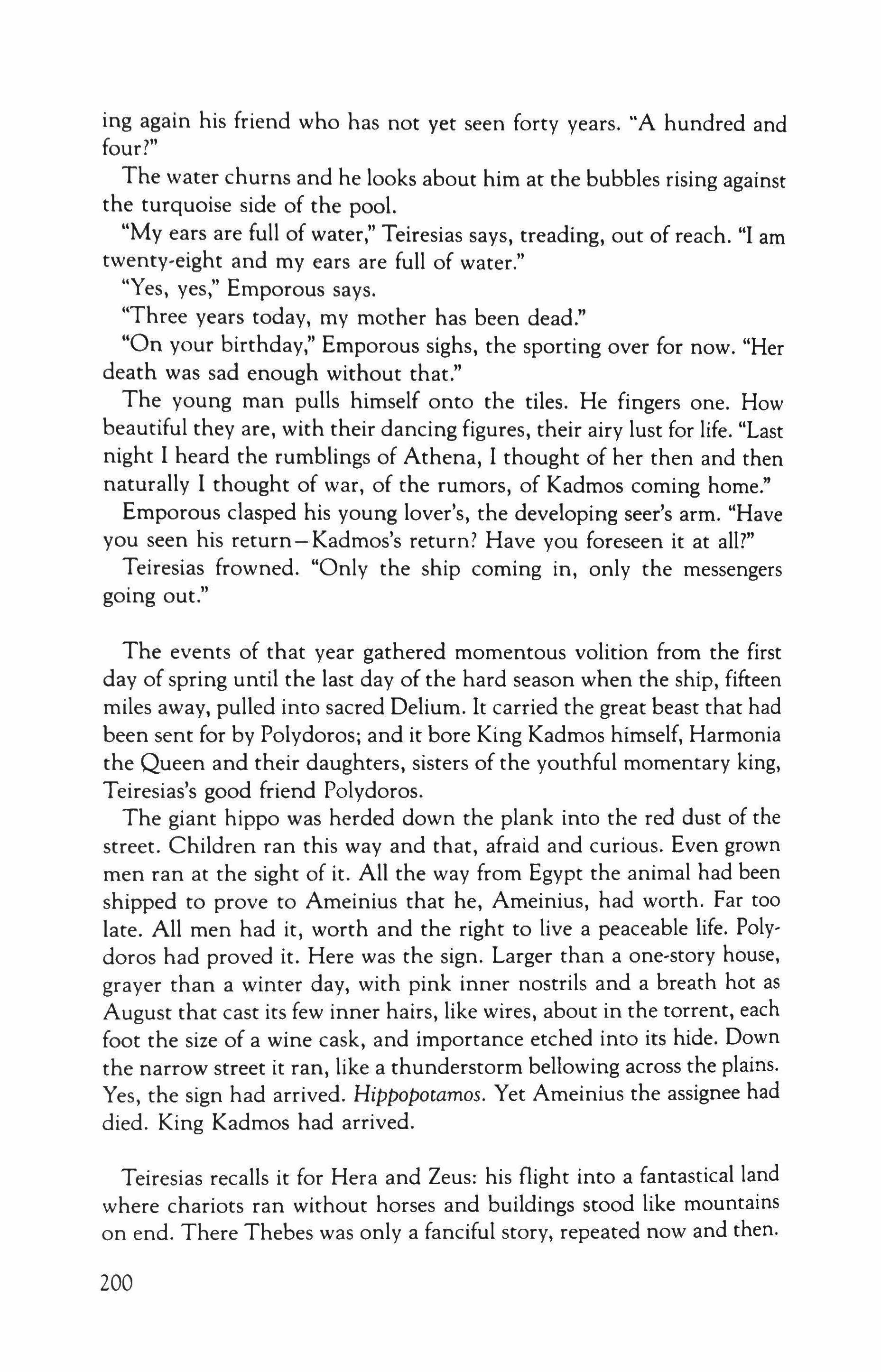
ing again his friend who has not yet seen forty years. "A hundred and four?"
The water churns and he looks about him at the bubbles rising against the turquoise side of the pool.
"My ears are full of water," Teiresias says, treading, out of reach. "I am twenty-eight and my ears are full of water."
"Yes, yes," Emporous says.
"Three years today, my mother has been dead."
"On your birthday," Emporous sighs, the sporting over for now. "Her death was sad enough without that."
The young man pulls himself onto the tiles. He fingers one. How beautiful they are, with their dancing figures, their airy lust for life. "Last night I heard the rumblings of Athena, I thought of her then and then naturally I thought of war, of the rumors, of Kadmos coming home."
Emporous clasped his young lover's, the developing seer's arm. "Have you seen his return-Kadmos's return? Have you foreseen it at all?"
Teiresias frowned. "Only the ship coming in, only the messengers going out."
The events of that year gathered momentous volition from the first day of spring until the last day of the hard season when the ship, fifteen miles away, pulled into sacred Oelium. It carried the great beast that had been sent for by Polvdoros; and it bore King Kadmos himself, Harmonia the Queen and their daughters, sisters of the youthful momentary king, Teiresias's good friend Polydoros.
The giant hippo was herded down the plank into the red dust of the street. Children ran this way and that, afraid and curious. Even grown men ran at the sight of it. All the way from Egypt the animal had been shipped to prove to Ameinius that he, Ameinius, had worth. Far too late. All men had it, worth and the right to live a peaceable life. Polydoros had proved it. Here was the sign. Larger than a one-story house, grayer than a winter day, with pink inner nostrils and a breath hot as August that cast its few inner hairs, like wires, about in the torrent, each foot the size of a wine cask, and importance etched into its hide. Down the narrow street it ran, like a thunderstorm bellowing across the plains. Yes, the sign had arrived. Hippopotamos. Yet Ameinius the assignee had died. King Kadmos had arrived.
Teiresias recalls it for Hera and Zeus: his flight into a fantastical land where chariots ran without horses and buildings stood like mountains on end. There Thebes was only a fanciful story, repeated now and then. 200
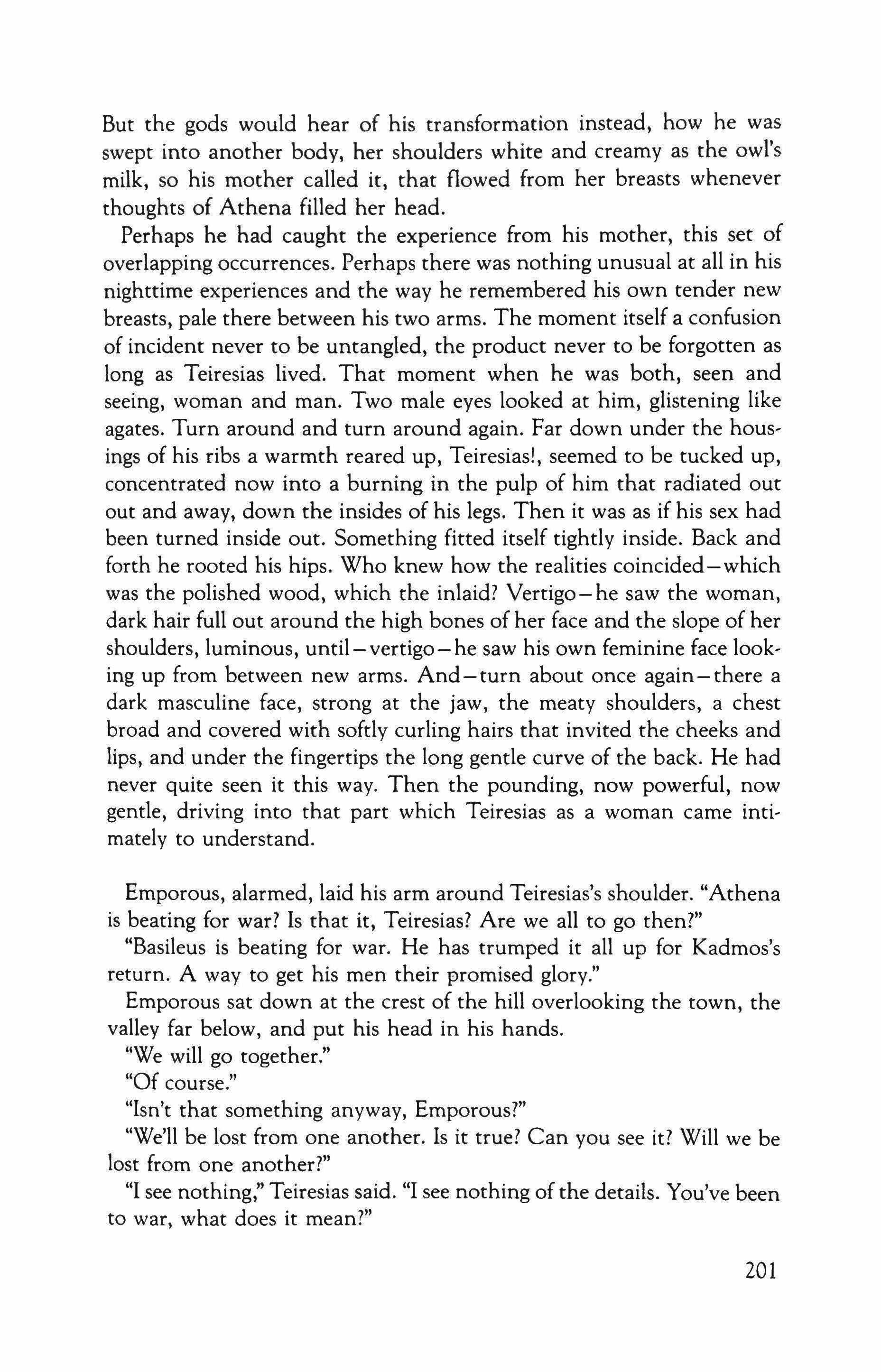
But the gods would hear of his transformation instead, how he was swept into another body, her shoulders white and creamy as the owl's milk, so his mother called it, that flowed from her breasts whenever thoughts of Athena filled her head.
Perhaps he had caught the experience from his mother, this set of overlapping occurrences. Perhaps there was nothing unusual at all in his nighttime experiences and the way he remembered his own tender new breasts, pale there between his two arms. The moment itself a confusion of incident never to be untangled, the product never to be forgotten as long as Teiresias lived. That moment when he was both, seen and seeing, woman and man. Two male eyes looked at him, glistening like agates. Turn around and turn around again. Far down under the housings of his ribs a warmth reared up, Teiresias!, seemed to be tucked up, concentrated now into a burning in the pulp of him that radiated out out and away, down the insides of his legs. Then it was as if his sex had been turned inside out. Something fitted itself tightly inside. Back and forth he rooted his hips. Who knew how the realities coincided-which was the polished wood, which the inlaid? Vertigo-he saw the woman, dark hair full out around the high bones of her face and the slope of her shoulders, luminous, until-vertigo-he saw his own feminine face looking up from between new arms. And-turn about once again-there a dark masculine face, strong at the jaw, the meaty shoulders, a chest broad and covered with softly curling hairs that invited the cheeks and lips, and under the fingertips the long gentle curve of the back. He had never quite seen it this way. Then the pounding, now powerful, now gentle, driving into that part which Teiresias as a woman came intimately to understand.
Emporous, alarmed, laid his arm around Teiresias's shoulder. "Athena is beating for war? Is that it, Teiresias? Are we all to go then?"
"Basileus is beating for war. He has trumped it all up for Kadmos's return. A way to get his men their promised glory."
Emporous sat down at the crest of the hill overlooking the town, the valley far below, and put his head in his hands.
"We will go together."
"Of course."
"Isn't that something anyway, Emporous?"
"We'll be lost from one another. Is it true? Can you see it? Will we be lost from one another?"
"I see nothing," Teiresias said. "I see nothing of the details. You've been to war, what does it mean?"
201

"It means living death. It is the worst of all your possible imaginings. Only the exhilaration of hope will pull you through."
"But I haven't told you -"
"What is it? For the sake of sanity let me have it now."
Teiresias wrung his hands. Sitting there on the cliff of the small hill, looking out. To him it was as if the purple mountains all around the great plain held him for a moment with his friend in Greece's cupped palm. "We're not going together," he faltered. "All the other men and their favorites will march out together. All of them except for us. You have to go alone. I saw it last night. You walked down the road with the spiked cap of the hedgehog on your head. I fell down in the road and wept."
"We will go together," Emporous bellowed in front of him, shaking him by the shoulders so angrily Teiresias felt his neck would snap. "It's a lie," Emporous yelled into his face. "No one goes to war without his favorite. How can anyone keep up his strength without the love of his friend? Without his good friend to protect? He would fall down and die alone and be eaten by dogs." His fierce eyes stared into Teiresias's own while he clasped his hand around Teiresias's upper arm like a metal armband for war. "I will not leave you to pine at home, no matter who orders it; I will not go by myself."
"Sometimes I don't understand my own dreams. Perhaps I'm wrong, very wrong." The two of them sat down together heavily at the crest of the hill. "What rubble!" Teiresias said. "What city once lay here?" He kicked at a stone with his foot. Down the slope it swept, gathering its own speed.
"You are wrong," Emporous shouted. "How long can I live with these obscure futures tatooed to our chests? Why can't you get that straight? You are viciously, cruelly wrong to talk this way when you're not sure."
"Yes," Teiresias whispered. A great bronze moon was rising up over the horizon in the afternoon sky. A complete and pure circle, uncut. He ran his hand over Emporous's heavily muscled back, memorizing him with his fingertips, the thick flesh, the radiant warmth that carried Emporous's own pungent smell.
"I won't go alone," Emporous said bitterly.
"I won't let you go alone, I'm coming along. It was foolishness. We're going together-when the time comes. Soon we will go together to fight in the war."
Emporous's noble head went into his hands; and the back of his neck, his spine, the back of his rib cage, all of him shook as he sobbed.
202
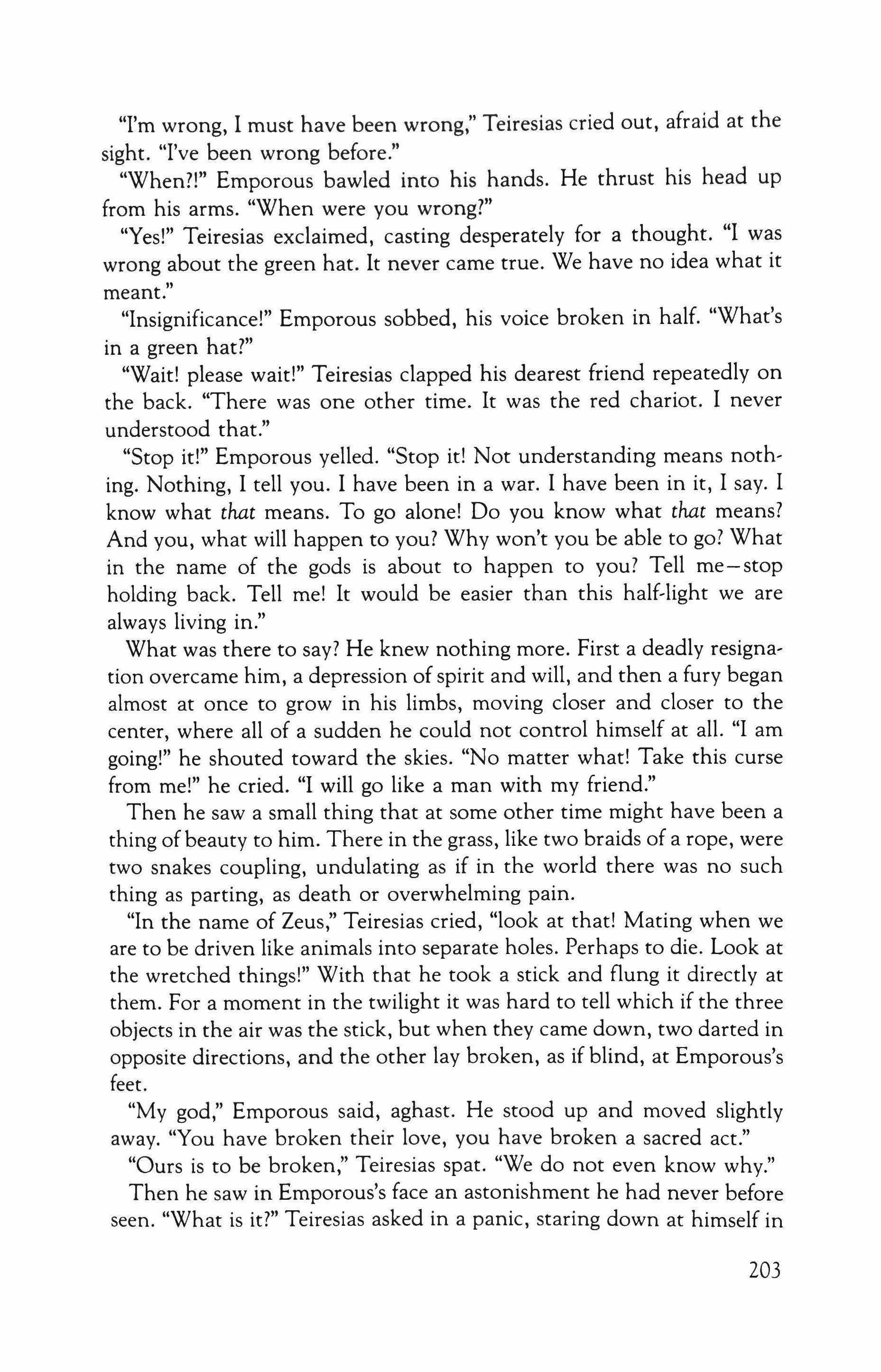
"I'm wrong, I must have been wrong," Teiresias cried out, afraid at the sight. "I've been wrong before."
"When?!" Emporous bawled into his hands. He thrust his head up from his arms. "When were you wrong?"
"Yes!" Teiresias exclaimed, casting desperately for a thought. "I was wrong about the green hat. It never came true. We have no idea what it meant."
"Insignificance!" Emporous sobbed, his voice broken in half. "What's in a green hat?"
"Wait! please wait!" Teiresias clapped his dearest friend repeatedly on the back. "There was one other time. It was the red chariot. I never understood that."
"Stop it!" Emporous yelled. "Stop it! Not understanding means nothing. Nothing, I tell you. I have been in a war. I have been in it, I say. I know what that means. To go alone! Do you know what that means? And you, what will happen to you? Why won't you be able to go? What in the name of the gods is about to happen to you? Tell me-stop holding back. Tell me! It would be easier than this half-light we are always living in."
What was there to say? He knew nothing more. First a deadly resignation overcame him, a depression of spirit and will, and then a fury began almost at once to grow in his limbs, moving closer and closer to the center, where all of a sudden he could not control himself at all. "I am going!" he shouted toward the skies. "No matter what! Take this curse from me!" he cried. "I will go like a man with my friend."
Then he saw a small thing that at some other time might have been a thing of beauty to him. There in the grass, like two braids of a rope, were two snakes coupling, undulating as if in the world there was no such thing as parting, as death or overwhelming pain.
"In the name of Zeus," Teiresias cried, "look at that! Mating when we are to be driven like animals into separate holes. Perhaps to die. Look at the wretched things!" With that he took a stick and flung it directly at them. For a moment in the twilight it was hard to tell which if the three objects in the air was the stick, but when they came down, two darted in opposite directions, and the other lay broken, as if blind, at Emporous's feet.
"My god," Emporous said, aghast. He stood up and moved slightly away. "You have broken their love, you have broken a sacred act."
"Ours is to be broken," Teiresias spat. "We do not even know why."
Then he saw in Emporous's face an astonishment he had never before seen. "What is it!" Teiresias asked in a panic, staring down at himself in 203

search of something to account for Emporous's wonder and horror and glee-perhaps some spectacular gift from the gods resting upon himself, some raiment of gold, a talisman perhaps strung around his neck, a cut in his leg, a spectacular insect, he didn't know what.
Emporous's hand reached out toward him, very cautiously, as if Teiresias might disintegrate at his touch, and Emporous with the tips of his fingers stroked just once the line from Teiresias's newly-formed face to the breasts Teiresias was seeing for the first time, along her waist, to the delicate new cleft, and beyond to the small slender feet that shook with each new softly-voiced word: "Now they will never let you go with me, I will never be able to go with you."
Emporous also wept in their fantastic new embrace.
"So it was that Hera advised Semele to test her lover by asking him to come to her in his true form. She then persuaded Zeus to give Semele whatever she might ask of him. In this way Zeus was tricked into granting a request which he knew would cause Semele's death. His lightning bolts killed her, but made Semele's son immortal. Zeus stitched the unborn child into his thigh, from which the infant was born at full term. As an adult, he descended into Hades and brought Semele back with h·trn.
The fact that Emporous had no children perhaps accounted for much of his interest in my state, but there was also his fantasy that he too might be able to give birth if I could be transformed into a woman and do so. I pointed out that, though it was true that I had become a woman and almost in the same instant I had become pregnant as well, it was yet to be seen whether or not I could give birth. I was altogether frightened and apprehensive about the upcoming delivery.
It was as if a stone had been thrown into a pond - he was the pondthe moment he first felt the baby moving. Until then he had felt a certain fizzing in his inner thigh, as if the naturally bubbling waters of the Spring of Tilphussa had been turned loose there. He had felt, he thought, a certain cell division. But then it was as if a stone had been cast in his leg and he felt it falling, falling. The hollow sound of it washed inside him as though he were the banks and water and bottom. He had never been a pond before. Mammals, yes, birds and reptiles, humans, but never a substance. Not a pond. He scratched his thigh thoughtfully and went about his daily walks, ambling about Mount Olympos rather inconspicuously he thought as an oversized human with an intermittent
204
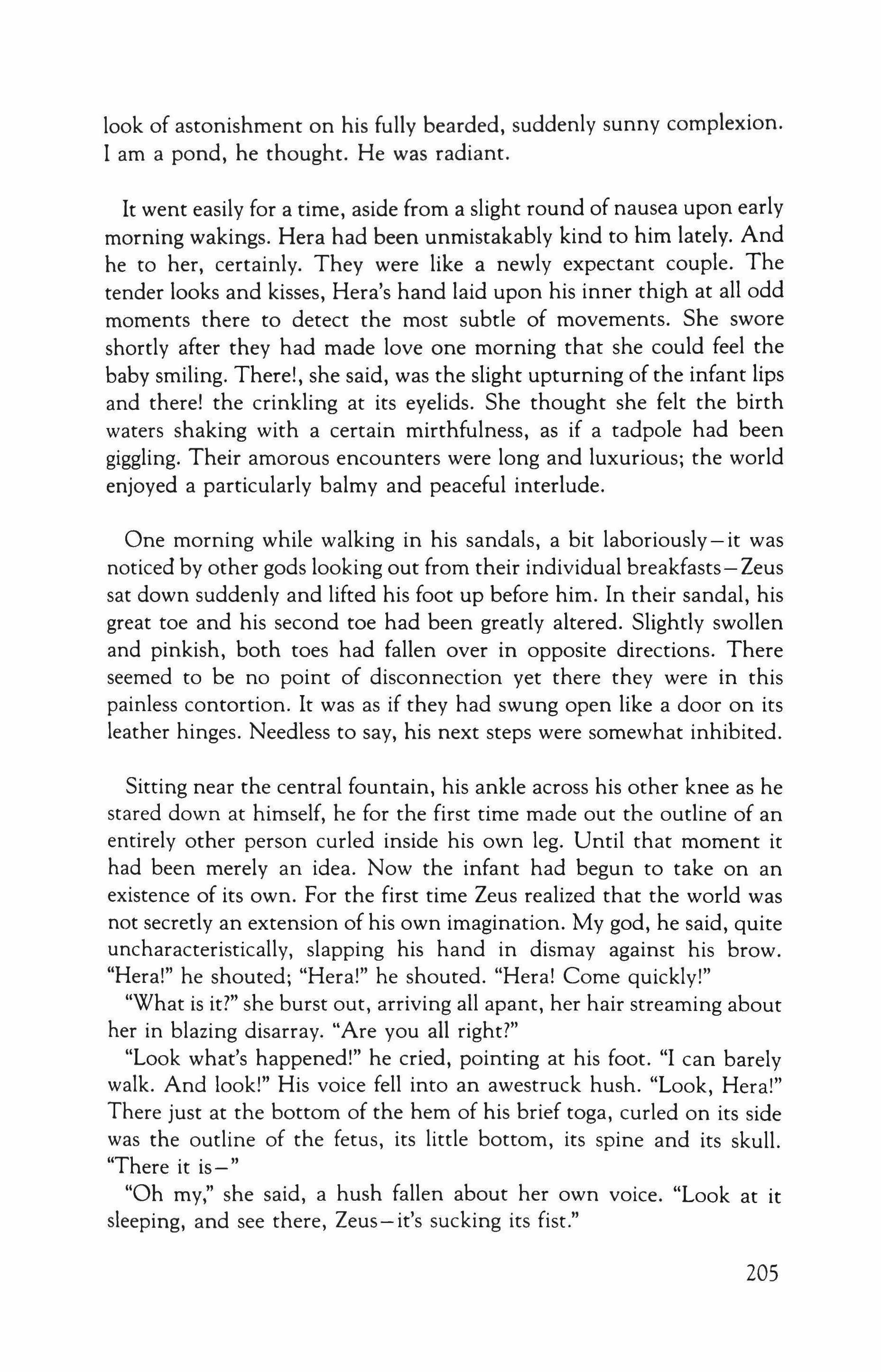
look of astonishment on his fully bearded, suddenly sunny complexion. I am a pond, he thought. He was radiant.
It went easily for a time, aside from a slight round of nausea upon early morning wakings. Hera had been unmistakably kind to him lately. And he to her, certainly. They were like a newly expectant couple. The tender looks and kisses, Hera's hand laid upon his inner thigh at all odd moments there to detect the most subtle of movements. She swore shortly after they had made love one morning that she could feel the baby smiling. There!, she said, was the slight upturning of the infant lips and there! the crinkling at its eyelids. She thought she felt the birth waters shaking with a certain mirthfulness, as if a tadpole had been giggling. Their amorous encounters were long and luxurious; the world enjoyed a particularly balmy and peaceful interlude.
One morning while walking in his sandals, a bit laboriously-it was noticed by other gods looking out from their individual breakfasts-Zeus sat down suddenly and lifted his foot up before him. In their sandal, his great toe and his second toe had been greatly altered. Slightly swollen and pinkish, both toes had fallen over in opposite directions. There seemed to be no point of disconnection yet there they were in this painless contortion. It was as if they had swung open like a door on its leather hinges. Needless to say, his next steps were somewhat inhibited.
Sitting near the central fountain, his ankle across his other knee as he stared down at himself, he for the first time made out the outline of an entirely other person curled inside his own leg. Until that moment it had been merely an idea. Now the infant had begun to take on an existence of its own. For the first time Zeus realized that the world was not secretly an extension of his own imagination. My god, he said, quite uncharacteristically, slapping his hand in dismay against his brow. "Hera!" he shouted; "Hera!" he shouted. "Hera! Come quickly!"
"What is it?" she burst out, arriving all apant, her hair streaming about her in blazing disarray. "Are you all right?"
"Look what's happened!" he cried, pointing at his foot. "I can barely walk. And look!" His voice fell into an awestruck hush. "Look, Hera!" There just at the bottom of the hem of his brief toga, curled on its side was the outline of the fetus, its little bottom, its spine and its skull. "There it is-"
"Oh my," she said, a hush fallen about her own voice. "Look at it sleeping, and see there, Zeus- it's sucking its fist."
205
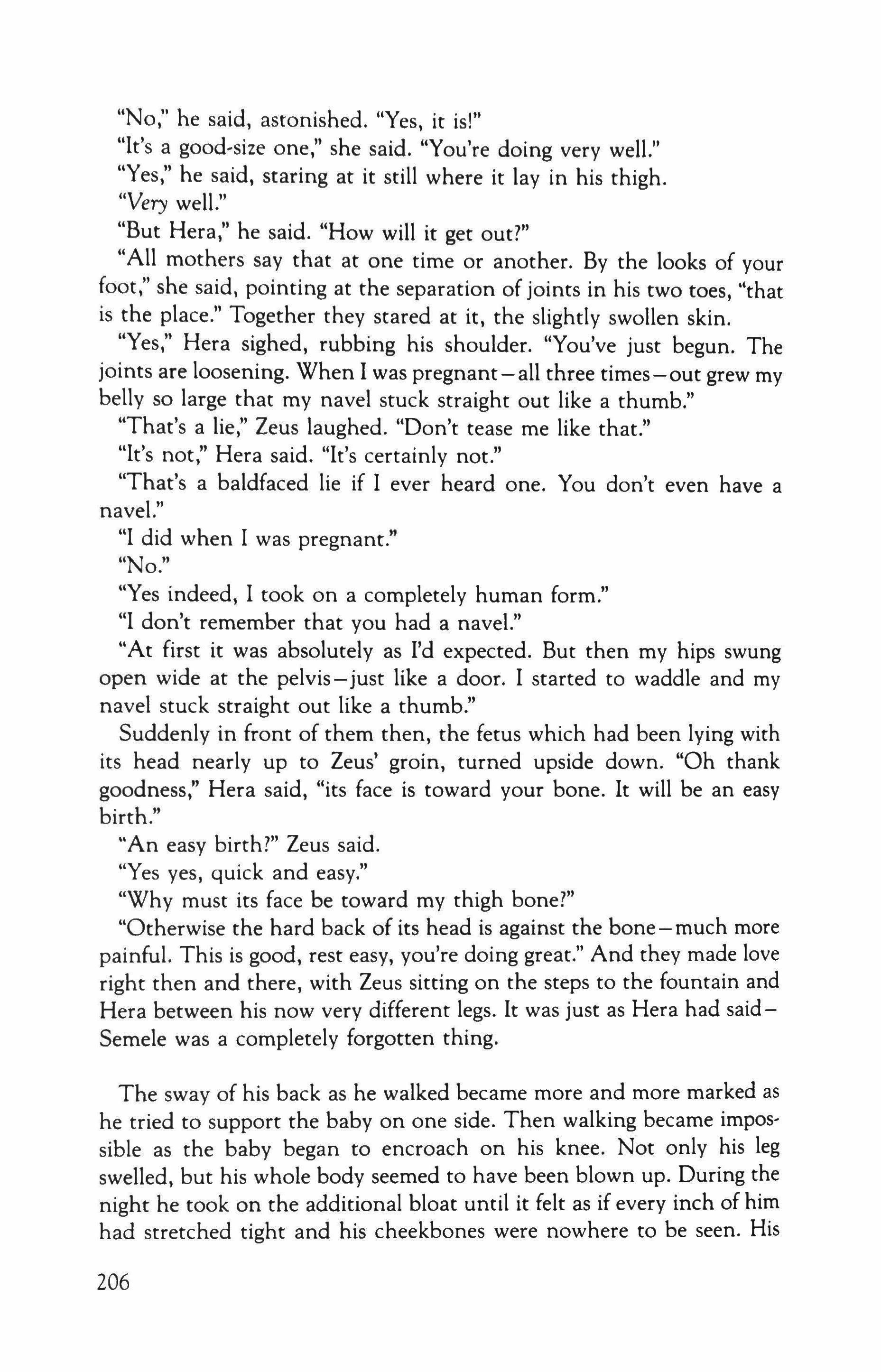
"No," he said, astonished. "Yes, it is!"
"It's a good-size one," she said. "You're doing very well."
"Yes," he said, staring at it still where it lay in his thigh.
"Very well."
"But Hera," he said. "How will it get out?"
"All mothers say that at one time or another. By the looks of your foot," she said, pointing at the separation of joints in his two toes, "that is the place." Together they stared at it, the slightly swollen skin.
"Yes," Hera sighed, rubbing his shoulder. "You've just begun. The joints are loosening. When I was pregnant-all three times-out grew my belly so large that my navel stuck straight out like a thumb."
"That's a lie," Zeus laughed. "Don't tease me like that."
"It's not," Hera said. "It's certainly not."
"That's a baldfaced lie if I ever heard one. You don't even have a navel."
"I did when I was pregnant."
"No."
"Yes indeed, I took on a completely human form."
"I don't remember that you had a navel."
"At first it was absolutely as I'd expected. But then my hips swung open wide at the pelvis - just like a door. I started to waddle and my navel stuck straight out like a thumb."
Suddenly in front of them then, the fetus which had been lying with its head nearly up to Zeus' groin, turned upside down. "Oh thank goodness," Hera said, "its face is toward your bone. It will be an easy birth."
"An easy birth?" Zeus said.
"Yes yes, quick and easy."
"Why must its face be toward my thigh bone?"
"Otherwise the hard back of its head is against the bone - much more painful. This is good, rest easy, you're doing great." And they made love right then and there, with Zeus sitting on the steps to the fountain and Hera between his now very different legs. It was just as Hera had saidSemele was a completely forgotten thing.
The sway of his back as he walked became more and more marked as he tried to support the baby on one side. Then walking became impossible as the baby began to encroach on his knee. Not only his leg swelled, but his whole body seemed to have been blown up. During the night he took on the additional bloat until it felt as if every inch of him had stretched tight and his cheekbones were nowhere to be seen. His
206

beard looked like a piece of goat's wool glued onto a bowl with two slits above painted for eyes and a flat monstrous thing stuck on for a nose. His face lost all godly definition. The same was true for his neck and his arms; his torso was worse if that was possible. He felt like an urn with a rounded, tippy bottom. He was miserable-he had never been known as pudgy in his life. And now there was no escape-not into any person or thing-for he had sworn to see this through without distraction. He would be what he would become and he would deliver what would be. Inside of his own being was another, growing most rapidly-today tiny fingers, tomorrow the thin translucent lids for the eyes. Following that, the eyes would open peering about in the dark. Perhaps the light would flow in from the room through the layers of his thigh through ichor and tissue in some muted reassuring way. He wanted most to be reassuring to this new being who would come into the world innocent of what could be done to one, what could come of innocent action and delay. The very last of his pregnancy did not go along quite so pleasantly as he had anticipated, though, as Hera said, there was nothing disastrous, nothing even abnormal or worrisome about it. It bothered him so much he did not even wish to think about it even as it was happening. "My god what is it!" he cried. "What if it turns out to be a hyena trapped inside, laughing at me?" he said one moment. And then, the next: "Oh the splendid little rabbit is nibbling, I fear, at my insides-pretty little girl or a boy, it might be either one-" And even Zeus, a god, had to wait, having failed to look in that moment when he plucked the babe from its poor dead mother and plunged it into his own thigh.
Not until the waters of labor gushed out of his foot did he allow himself a moment to think about the most recent previous experiences of his pregnancy, and then only as a kind of relief for his fright at what was taking place. He was lying in bed with his foot propped on a pillow, the foot itself over the edge of the mattress, when the water broke. Out between large toe and second, through the tiny slit no bigger than two inches came a flood of hot water. Out onto the floor it sprang like a hot shower, in a cascade. The sound of it was as if whole buckets had been poured through his leg.
"It's coming!" he shouted. "The baby, the baby-it's coming out."
Hera, Mother of Earth and Childbirth, did not stand away from him. "Don't worry," she said. "Tell me exactly when the first pain begins, it might not be until morning."
It was as if he was a chicken again thinking only of his own long skinny, lightly feathered neck. In an unfortunate moment he'd chosen
207
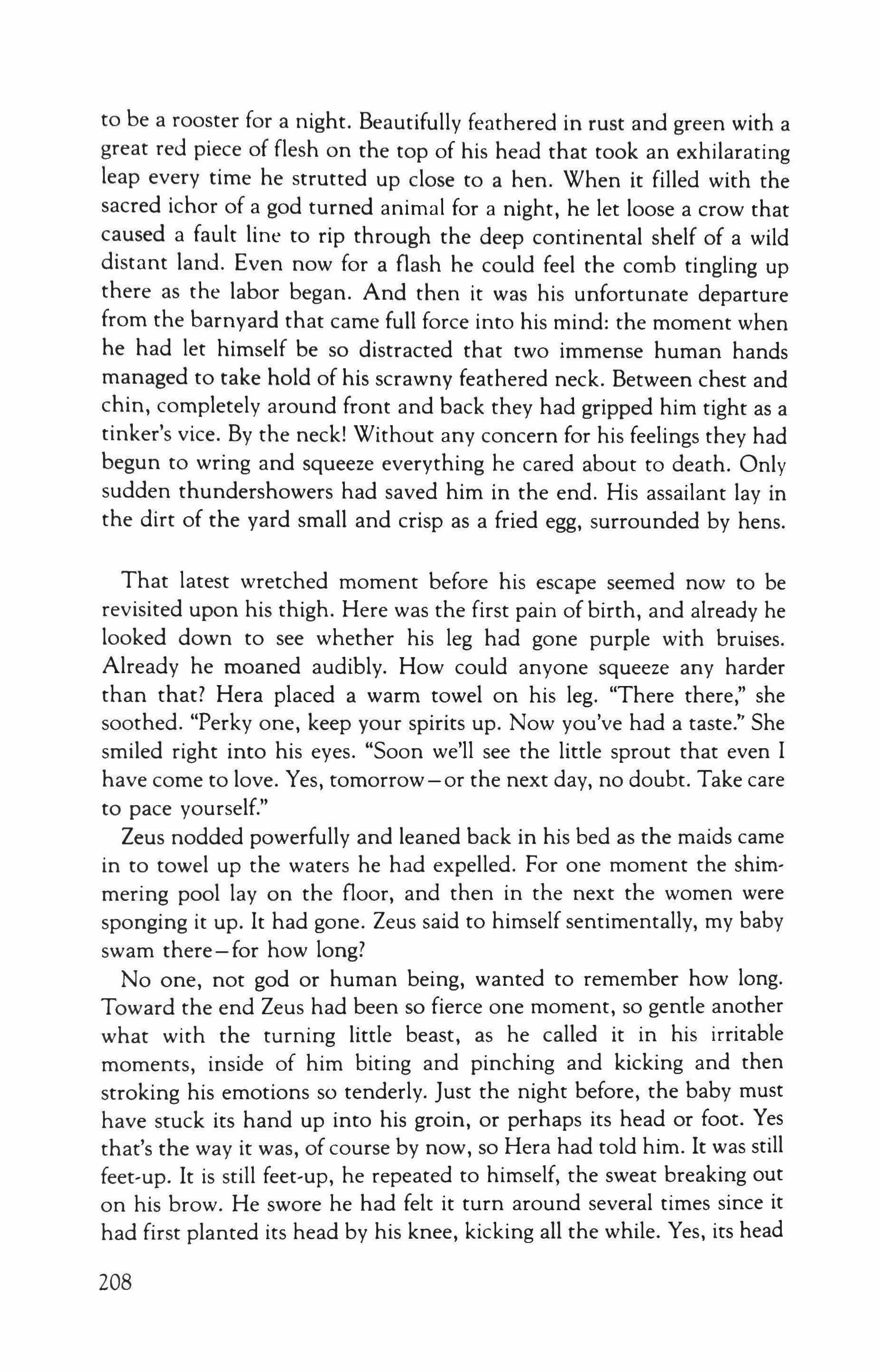
to be a rooster for a night. Beautifully feathered in rust and green with a great red piece of flesh on the top of his head that took an exhilarating leap every time he strutted up close to a hen. When it filled with the sacred ichor of a god turned animal for a night, he let loose a crow that caused a fault line to rip through the deep continental shelf of a wild distant land. Even now for a flash he could feel the comb tingling up there as the labor began. And then it was his unfortunate departure from the barnyard that came full force into his mind: the moment when he had let himself be so distracted that two immense human hands managed to take hold of his scrawny feathered neck. Between chest and chin, completely around front and back they had gripped him tight as a tinker's vice. By the neck! Without any concern for his feelings they had begun to wring and squeeze everything he cared about to death. Only sudden thundershowers had saved him in the end. His assailant lay in the dirt of the yard small and crisp as a fried egg, surrounded by hens.
That latest wretched moment before his escape seemed now to be revisited upon his thigh. Here was the first pain of birth, and already he looked down to see whether his leg had gone purple with bruises. Already he moaned audibly. How could anyone squeeze any harder than that? Hera placed a warm towel on his leg. "There there," she soothed. "Perky one, keep your spirits up. Now you've had a taste." She smiled right into his eyes. "Soon we'll see the little sprout that even I have come to love. Yes, tomorrow-or the next day, no doubt. Take care to pace yourself."
Zeus nodded powerfully and leaned back in his bed as the maids came in to towel up the waters he had expelled. For one moment the shimmering pool lay on the floor, and then in the next the women were sponging it up. It had gone. Zeus said to himself sentimentally, my baby swam there-for how long?
No one, not god or human being, wanted to remember how long. Toward the end Zeus had been so fierce one moment, so gentle another what with the turning little beast, as he called it in his irritable moments, inside of him biting and pinching and kicking and then stroking his emotions so tenderly. Just the night before, the baby must have stuck its hand up into his groin, or perhaps its head or foot. Yes that's the way it was, of course by now, so Hera had told him. It was still feet-up. It is still feet-up, he repeated to himself, the sweat breaking out on his brow. He swore he had felt it turn around several times since it had first planted its head by his knee, kicking all the while. Yes, its head
208

was turned face-down toward the bone. "An easy birth, quick and easy, and then you will see your baby's face."
"Yes," he sighed dreamily, with an imagining of the baby before him, and fell asleep while Hera stroked his face with a cold towel.
Who can imagine sudden and complete darkness with the knowledge that there is to be no reprieve, no ray, no image, no candle, no reflection, no glimmer? He had only to say it and he had their wrath. "If enjoyment in sex is divided into ten parts, then women have nine out of ten." In this darkness, no longer a woman, he'd had to say goodbye to Emporous, his lover, his teacher, his friend and the father of his child. He had listened to the grinding of wheels on the stone roads, the dragging of weapons and supplies, the wailing of the women, the whimpering of his own child, who found her father gone and his mother suddenly very strange.
The day Zeus gave birth to Dionysus, the whole world shook, the great oceans parted, melted rock poured from the earth. Continents broke apart and were set adrift. And for Zeus how was it? Throughout all the ups and downs, the contractions and rests, it seemed as if the peoples of the earth were going at each other in his thigh. A fire burned. Whole populations rushed one way, then the next.
"Excruciation!" he yelped repeatedly. The environment quaked. Down his leg and out his foot between the large toe and the second one, the child had begun to come. Zeus agonized so dreadfully it was said he ground his teeth together until he chipped a tooth.
"There there now," Hera comforted, "it could be even worse. This is so much easier."
"The easy way?!" he yowled. "I'm carrying a baby-in my leg."
"Yes," she whispered fondly, wiping the tears like rain from his cheeks. "It could be coming out somewhere else -"
"What could be worse! The thing is coming out my foot."
"He could come out your most tender part instead," Hera ventured. "That's the way others have always done. It could have gone the other way. It could have come out of your sex instead. A woman's sex is no less tender than yours."
Zeus looked down at his mammoth leg, his foot swollen as a womb might have done. It was ten times its normal size with the head of the infant butting against the ball of his foot, pushing toward the swollen opening between his large toe and the next. He looked then at the small
209
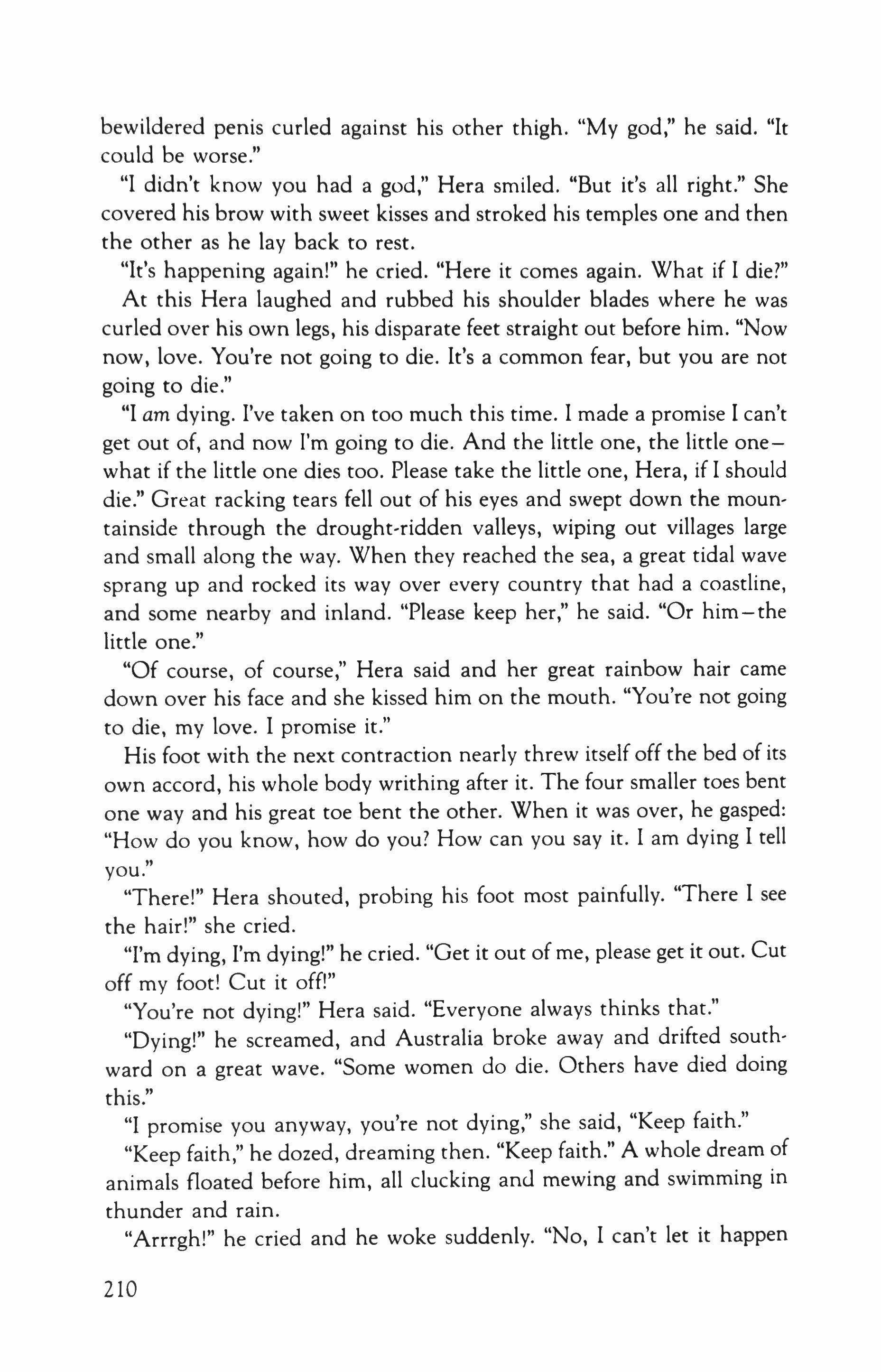
bewildered penis curled against his other thigh. "My god," he said. "It could be worse."
"I didn't know you had a god," Hera smiled. "But it's all right." She covered his brow with sweet kisses and stroked his temples one and then the other as he lay back to rest.
"It's happening again!" he cried. "Here it comes again. What if I die?"
At this Hera laughed and rubbed his shoulder blades where he was curled over his own legs, his disparate feet straight out before him. "Now now, love. You're not going to die. It's a common fear, but you are not going to die."
"I am dying. I've taken on too much this time. I made a promise I can't get out of, and now I'm going to die. And the little one, the little onewhat if the little one dies too. Please take the little one, Hera, if I should die." Great racking tears fell out of his eyes and swept down the mountainside through the drought-ridden valleys, wiping out villages large and small along the way. When they reached the sea, a great tidal wave sprang up and rocked its way over every country that had a coastline, and some nearby and inland. "Please keep her," he said. "Or him-the little one."
"Of course, of course," Hera said and her great rainbow hair came down over his face and she kissed him on the mouth. "You're not going to die, my love. I promise it."
His foot with the next contraction nearly threw itself off the bed of its own accord, his whole body writhing after it. The four smaller toes bent one way and his great toe bent the other. When it was over, he gasped: "How do you know, how do you? How can you say it. I am dying I tell " you.
'There!" Hera shouted, probing his foot most painfully. "There I see the hair!" she cried.
"I'm dying, I'm dying!" he cried. "Get it out of me, please get it out. Cut off my foot! Cut it off!"
"You're not dying!" Hera said. "Everyone always thinks that."
"Dying!" he screamed, and Australia broke away and drifted southward on a great wave. "Some women do die. Others have died doing this."
"I promise you anyway, you're not dying," she said, "Keep faith."
"Keep faith," he dozed, dreaming then. "Keep faith." A whole dream of animals floated before him, all clucking and mewing and swimming in thunder and rain.
"Arrrgh!" he cried and he woke suddenly. "No, I can't let it happen
210

again. I'm going to change," he screamed. "I'm going to change into someone else, into something."
"It's too late for that." Hera massaged the anklebone where the infant still lay curled: its bottom there, the back of its head bulging like a large gourd in his arch. "You're lucky," she said, "you're lucky its face is against your bone rather than the back of its head. And," she said, "it's rightside-up, head-down. An easy delivery. Keep thinking that: an easy delivery. You're doing very well."
"My god:' he cried, and she just smiled. "My god, I'm going to throw up."
"Lean over," she said, "and let it come. Let it come now, don't hold back. I'll put a cold cloth on the back of your neck."
Out it came and out it came, fiery and hot, flowing down the mountainside and out to sea. Down along the bottom of the ocean it ran, there to spring up again and again, dotting the water with boiling spots of molten rock hundreds of miles across.
"You'll feel a little better now," Hera said. "Now the hard part starts."
Nothing came out of him but a breath then, long and moaning and low. He closed his eyes and stared at the insides of his lids.
"Keep thinking it," she said. "A quick and easy birth. And it will come very soon."
Anyone could have seen that he had gotten very pale.
"Breathe deeply now: in and hold. Now push," she said. "Push like a god."
"I'm dead soon," Zeus said.
"Stop it," she said. "Gods don't die. Don't give out on us now."
"It could go on for eternity-Hera! Hera! help me. It might never stop. That could happen to me. I've made a horrible mistake-think of what'shis-name rolling that rock up the hill over and over again, or what's-hisname getting his liver eaten out by a bird. And I caused some of that. That was what I did."
"Stop it," she said, "and pay attention. We need all your attention now."
"I've gone too far. I'm the first male god to give birth and I'll be the first god to really die. I can't do this; I can't do it! It takes over my whole mind."
"That's good," she said. "Show a little concentration. That's good. It won't be long now. Cooperate, don't lose hope, push for goodness' sake."
All the muscles up and down it began to writhe like the boa constrictors he'd imported for amusement from warmer climates. "It's death," he bellowed, "growing in my leg."
211
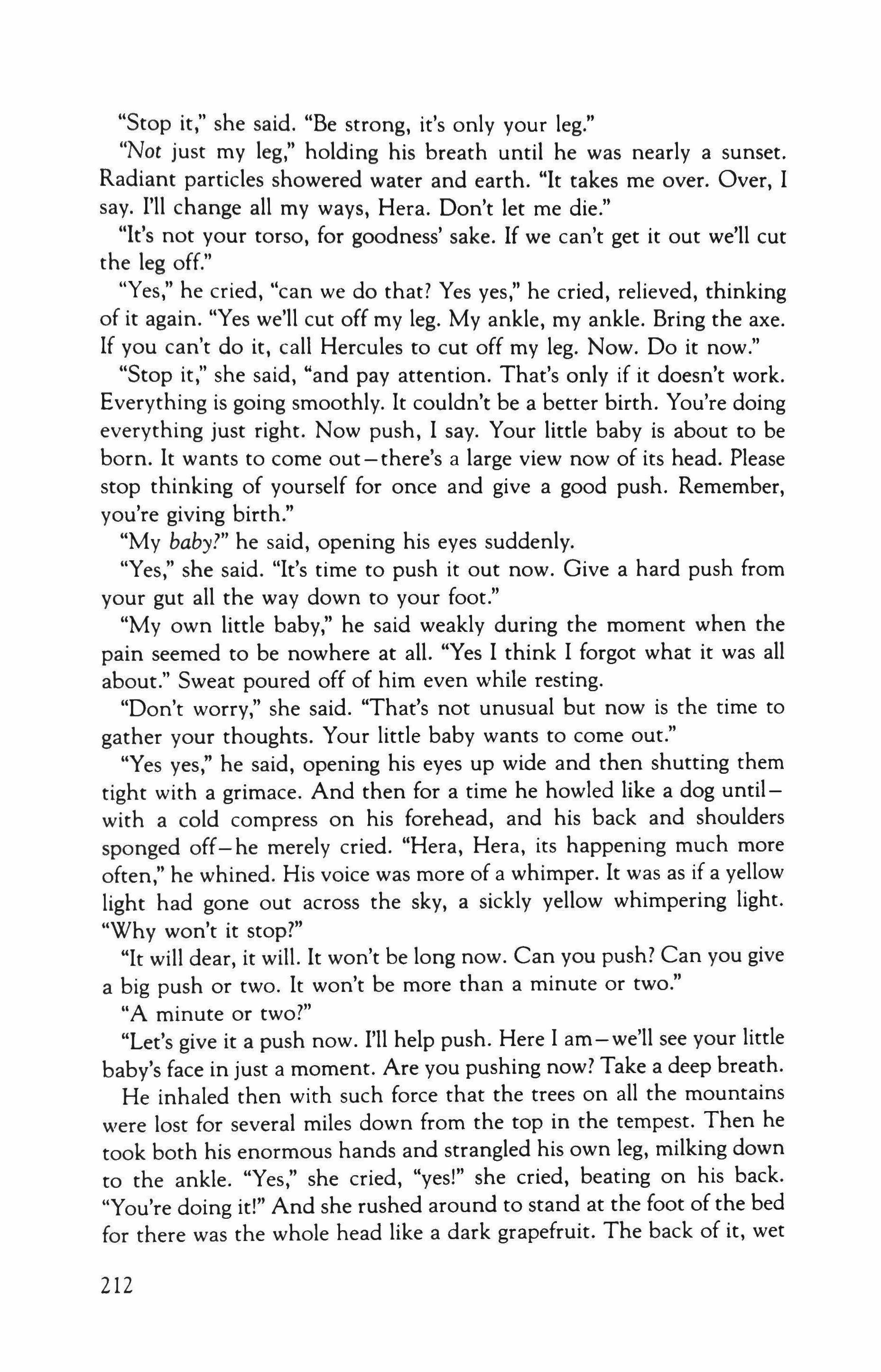
"Stop it," she said. "Be strong, it's only your leg."
"Not just my leg," holding his breath until he was nearly a sunset. Radiant particles showered water and earth. "It takes me over. Over, I say. I'll change all my ways, Hera. Don't let me die."
"It's not your torso, for goodness' sake. If we can't get it out we'll cut the leg off."
"Yes," he cried, "can we do that? Yes yes," he cried, relieved, thinking of it again. "Yes we'll cut off my leg. My ankle, my ankle. Bring the axe. If you can't do it, call Hercules to cut off my leg. Now. Do it now."
"Stop it," she said, "and pay attention. That's only if it doesn't work. Everything is going smoothly. It couldn't be a better birth. You're doing everything just right. Now push, I say. Your little baby is about to be born. It wants to come out-there's a large view now of its head. Please stop thinking of yourself for once and give a good push. Remember, you're giving birth."
"My baby?" he said, opening his eyes suddenly.
"Yes," she said. "It's time to push it out now. Give a hard push from your gut all the way down to your foot."
"My own little baby," he said weakly during the moment when the pain seemed to be nowhere at all. "Yes I think I forgot what it was all about." Sweat poured off of him even while resting.
"Don't worry," she said. "That's not unusual but now is the time to gather your thoughts. Your little baby wants to come out."
"Yes yes," he said, opening his eyes up wide and then shutting them tight with a grimace. And then for a time he howled like a dog untilwith a cold compress on his forehead, and his back and shoulders sponged off-he merely cried. "Hera, Hera, its happening much more often," he whined. His voice was more of a whimper. It was as if a yellow light had gone out across the sky, a sickly yellow whimpering light.
"Why won't it stop?"
"It will dear, it will. It won't be long now. Can you push? Can you give a big push or two. It won't be more than a minute or two."
"A minute or two?"
"Let's give it a push now. I'll help push. Here I am-we'll see your little baby's face in just a moment. Are you pushing now? Take a deep breath. He inhaled then with such force that the trees on all the mountains were lost for several miles down from the top in the tempest. Then he took both his enormous hands and strangled his own leg, milking down to the ankle. "Yes," she cried, "yes!" she cried, beating on his back. "You're doing it!" And she rushed around to stand at the foot of the bed for there was the whole head like a dark grapefruit. The back of it, wet
212
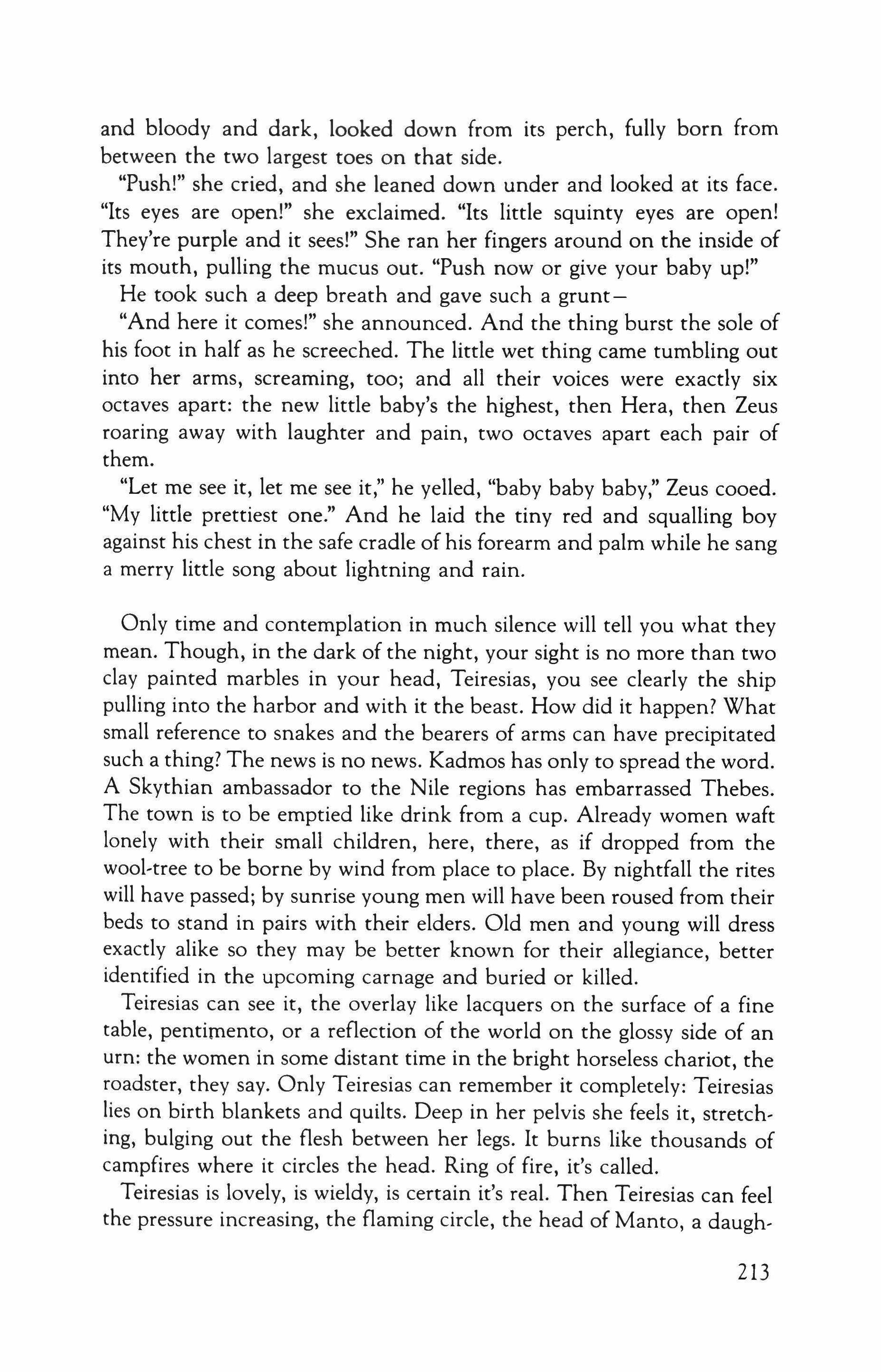
and bloody and dark, looked down from its perch, fully born from between the two largest toes on that side.
"Push!" she cried, and she leaned down under and looked at its face. "Its eyes are open!" she exclaimed. "Its little squinty eyes are open! They're purple and it sees!" She ran her fingers around on the inside of its mouth, pulling the mucus out. "Push now or give your baby up!"
He took such a deep breath and gave such a grunt"And here it comes!" she announced. And the thing burst the sole of his foot in half as he screeched. The little wet thing came tumbling out into her arms, screaming, too; and all their voices were exactly six octaves apart: the new little baby's the highest, then Hera, then Zeus roaring away with laughter and pain, two octaves apart each pair of them.
"Let me see it, let me see it," he yelled, "baby baby baby," Zeus cooed. "My little prettiest one." And he laid the tiny red and squalling boy against his chest in the safe cradle of his forearm and palm while he sang a merry little song about lightning and rain.
Only time and contemplation in much silence will tell you what they mean. Though, in the dark of the night, your sight is no more than two clay painted marbles in your head, Teiresias, you see clearly the ship pulling into the harbor and with it the beast. How did it happen? What small reference to snakes and the bearers of arms can have precipitated such a thing? The news is no news. Kadmos has only to spread the word. A Skythian ambassador to the Nile regions has embarrassed Thebes. The town is to be emptied like drink from a cup. Already women waft lonely with their small children, here, there, as if dropped from the wool-tree to be borne by wind from place to place. By nightfall the rites will have passed; by sunrise young men will have been roused from their beds to stand in pairs with their elders. Old men and young will dress exactly alike so they may be better known for their allegiance, better identified in the upcoming carnage and buried or killed.
Teiresias can see it, the overlay like lacquers on the surface of a fine table, pentimento, or a reflection of the world on the glossy side of an urn: the women in some distant time in the bright horseless chariot, the roadster, they say. Only Teiresias can remember it completely: Teiresias lies on birth blankets and quilts. Deep in her pelvis she feels it, stretching, bulging out the flesh between her legs. It burns like thousands of campfires where it circles the head. Ring of fire, it's called.
Teiresias is lovely, is wieldy, is certain it's real. Then Teiresias can feel the pressure increasing, the flaming circle, the head of Manto, a daugh-
213

ter rushing out in a flood of water and blood, Manto soon to be known as a seer. How far will the little daughter see?
Teiresias can see it, too. Double vision perhaps. There it is in the new baby's eyes: scarves flutter as two women discuss the near escapes of their dreams. In the bright orange car they fly along a stoneless gray road, pulling past a carriage Teiresias will never clearly describe. A long cylindrical object rides on the back of the carriage, as the women pull past it, pull abruptly in front of the cone. And there underneath, just as Emporous has pointed out: a hippopotamus stands at a river.
But what is wrong with this picture? Why has this river dried up? Paint cracks at the side of the urn as a pink sweat rises on the thick harborial hide of the beast. Small hippopotamus ears pivot like lillies on their stalks, each a radar device. What can be heard through the ears of an animal? Generation after generation: sweat moving through flesh. Blood sweat. A sighing of wind. The crying of babies. The night silence of birds.
214
Reviews: Notes on Recent Books
Reginald Gibbons
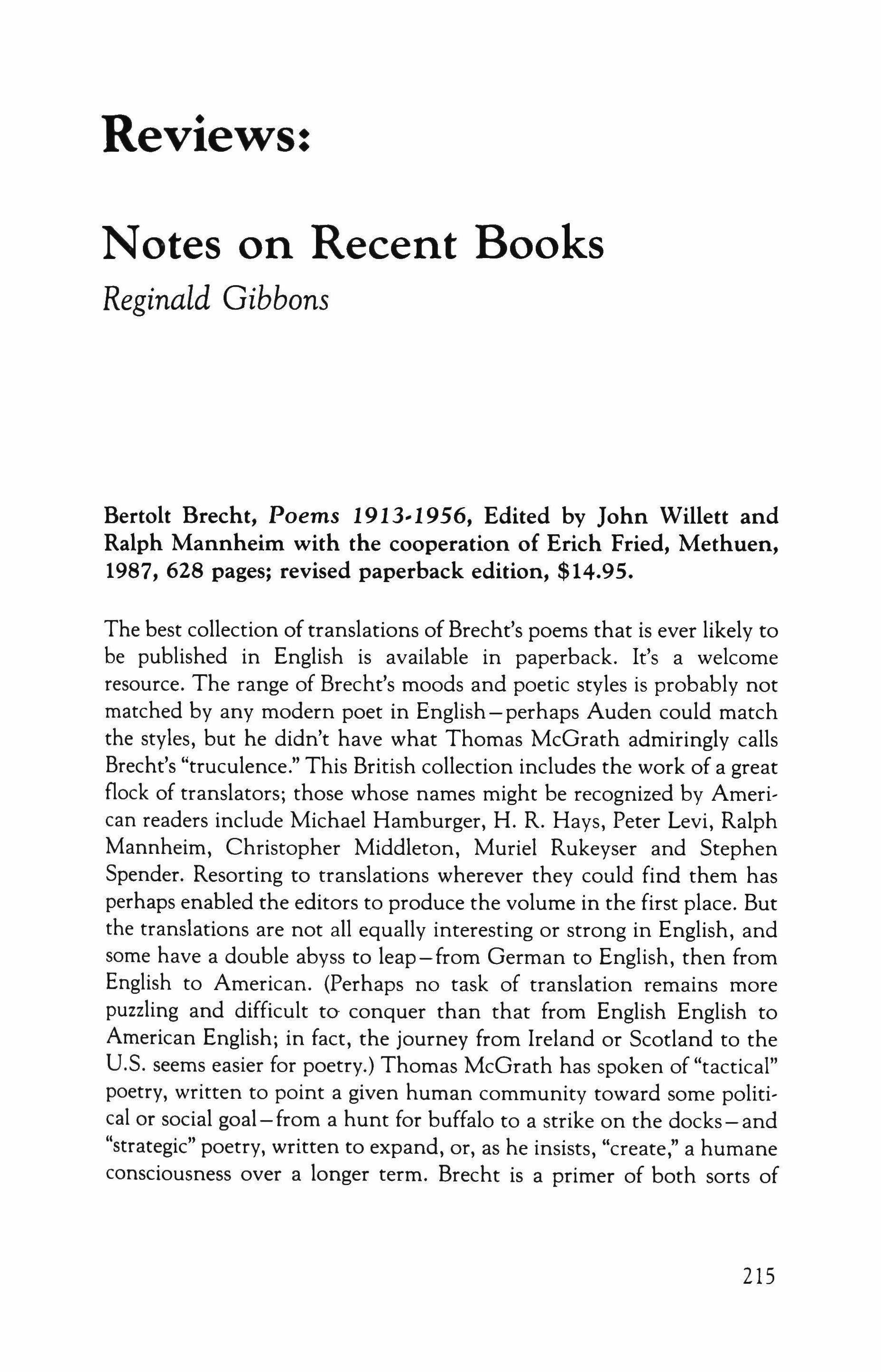
Bertolt Brecht, Poems 1913�1956, Edited by John Willett and Ralph Mannheim with the cooperation of Erich Fried, Methuen, 1987, 628 pages; revised paperback edition, $14.95.
The best collection of translations of Brecht's poems that is ever likely to be published in English is available in paperback. It's a welcome resource. The range of Brecht's moods and poetic styles is probably not matched by any modern poet in English - perhaps Auden could match the styles, but he didn't have what Thomas McGrath admiringly calls Brecht's "truculence." This British collection includes the work of a great flock of translators; those whose names might be recognized by American readers include Michael Hamburger, H. R. Hays, Peter Levi, Ralph Mannheim, Christopher Middleton, Muriel Rukeyser and Stephen Spender. Resorting to translations wherever they could find them has perhaps enabled the editors to produce the volume in the first place. But the translations are not all equally interesting or strong in English, and some have a double abyss to leap-from German to English, then from English to American. (Perhaps no task of translation remains more puzzling and difficult to conquer than that from English English to American English; in fact, the journey from Ireland or Scotland to the U.S. seems easier for poetry.) Thomas McGrath has spoken of "tactical" poetry, written to point a given human community toward some politicalor social goal-from a hunt for buffalo to a strike on the docks - and "strategic" poetry, written to expand, or, as he insists, "create," a humane consciousness over a longer term. Brecht is a primer of both sorts of 215
poetry, and even diluted in English, offers a lot to think about. The introduction and notes to this edition make it useful for scholars as well as readers of poetry, if it manages to find its way through the labyrinth of commercial book distribution from Methuen Inc. to American bookstores.
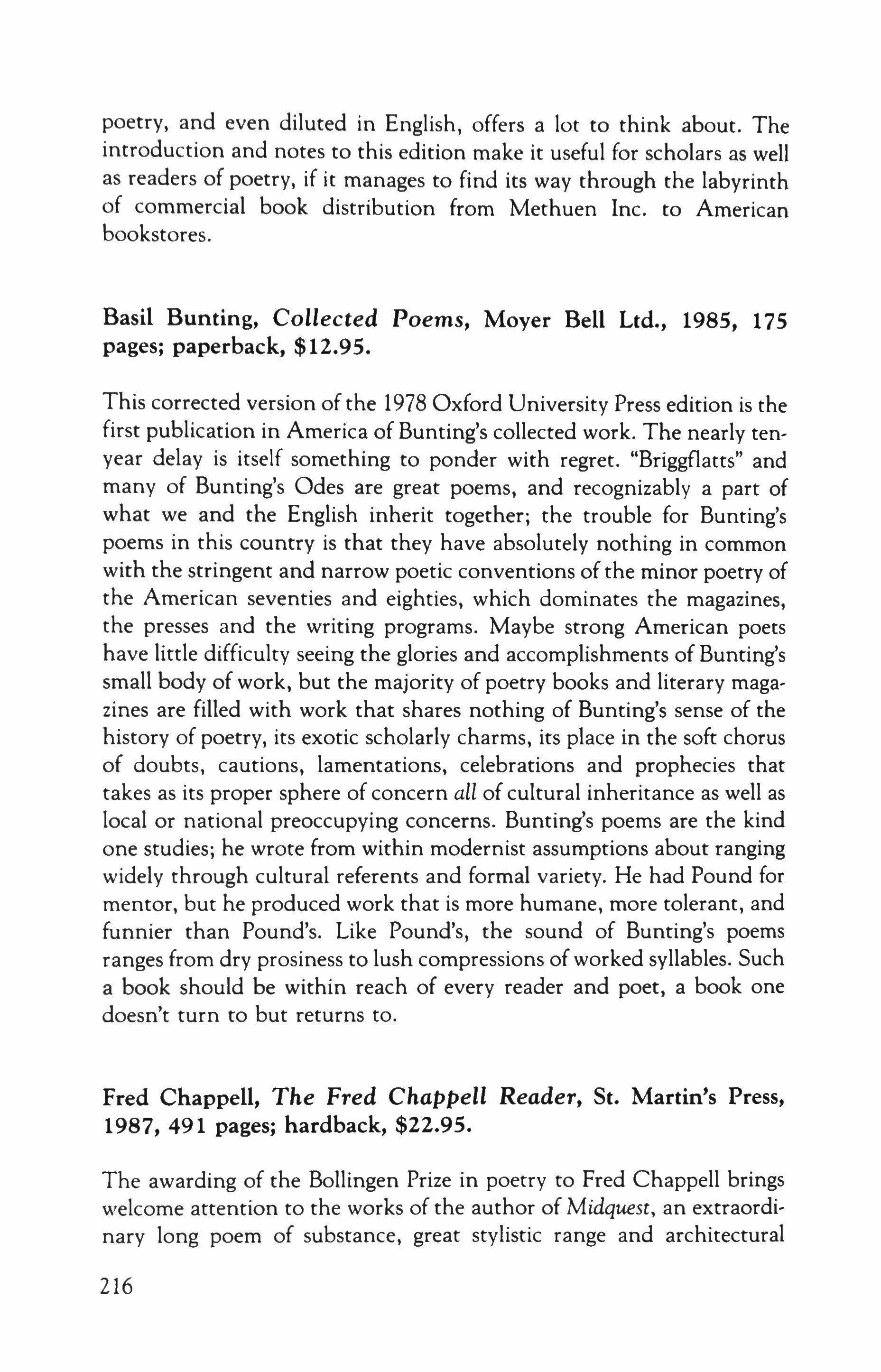
Basil Bunting, Collected Poems, Moyer Bell Ltd., 1985, 175 pages; paperback, $12.95.
This corrected version of the 1978 Oxford University Press edition is the first publication in America of Bunting's collected work. The nearly tenyear delay is itself something to ponder with regret. "Briggflatts" and many of Bunting's Odes are great poems, and recognizably a part of what we and the English inherit together; the trouble for Bunting's poems in this country is that they have absolutely nothing in common with the stringent and narrow poetic conventions of the minor poetry of the American seventies and eighties, which dominates the magazines, the presses and the writing programs. Maybe strong American poets have little difficulty seeing the glories and accomplishments of Bunting's small body of work, but the majority of poetry books and literary magazines are filled with work that shares nothing of Bunting's sense of the history of poetry, its exotic scholarly charms, its place in the soft chorus of doubts, cautions, lamentations, celebrations and prophecies that takes as its proper sphere of concern all of cultural inheritance as well as local or national preoccupying concerns. Bunting's poems are the kind one studies; he wrote from within modernist assumptions about ranging widely through cultural referents and formal variety. He had Pound for mentor, but he produced work that is more humane, more tolerant, and funnier than Pound's. Like Pound's, the sound of Bunting's poems ranges from dry prosiness to lush compressions of worked syllables. Such a book should be within reach of every reader and poet, a book one doesn't turn to but returns to.
Fred Chappell, The Fred Chappell Reader, St. Martin's Press, 1987, 491 pages; hardback, $22.95.
The awarding of the Bollingen Prize in poetry to Fred Chappell brings welcome attention to the works of the author of Midquest, an extraordinary long poem of substance, great stylistic range and architectural 216
beauty. This new omnibus collection brings short poems and excerpts from Midquest together with the complete text of the novel Dagon, chapters from other novels and short stories. It adds as an afterword Chappell's autobiographical meditation on how Thomas Mann's Dr. Faustus "could ever come to be the favorite novel of an adolescent boy in a little Appalachian mill town." The piece is chasteningly modest, at the same time that it displays the characteristic sweetness and proportion of Chappell's sentences, although it doesn't show how remarkably he can capture complicated situations whose seriousness is leavened and intensified by gentle comedy. For that one must go to the stories, particularly. Chappell offers this essay, and the collection itself, as the salient points on the trajectory of his development. These points suggest a way of seeing not only his own work but also the course of American fiction during his working life as an artist. Chappell locates the spring of his own inspiration in one of the most intellectually difficult novels of European culture in this century, and this corrects the sly appearance of modest back-country attitudes and concerns in some of his work. He is a writer rich in intentions and gifts, and much deserving of readers and honors.
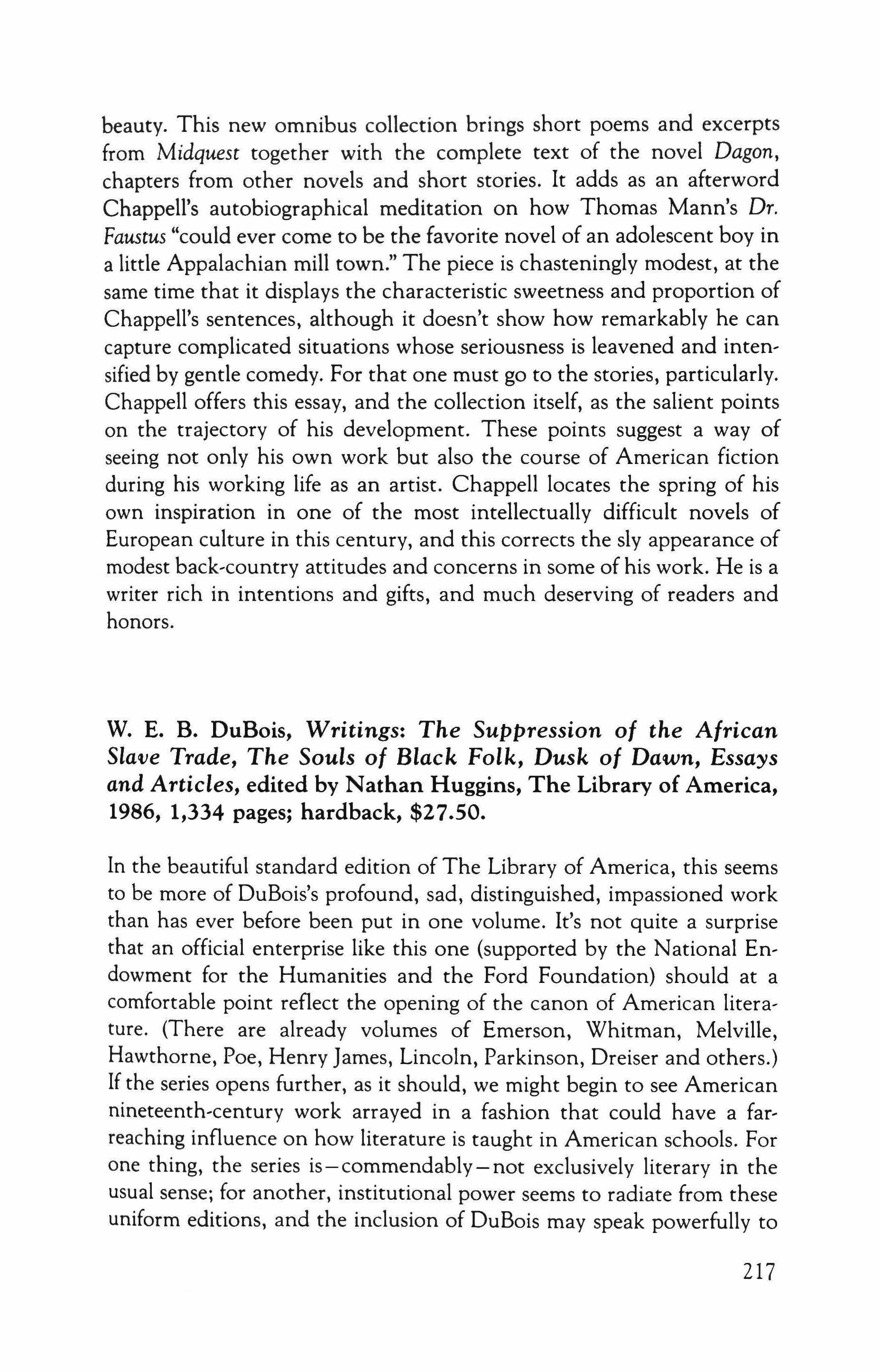
W. E. B. DuBois, Writings: The Suppression of the African Slave Trade, The Souls of Black Folk, Dusk of Dawn, Essays and Articles, edited by Nathan Huggins, The Library of America, 1986, 1,334 pages; hardback, $27.50.
In the beautiful standard edition of The Library of America, this seems to be more of DuBois's profound, sad, distinguished, impassioned work than has ever before been put in one volume. It's not quite a surprise that an official enterprise like this one (supported by the National En, dowment for the Humanities and the Ford Foundation) should at a comfortable point reflect the opening of the canon of American litera' ture. (There are already volumes of Emerson, Whitman, Melville, Hawthorne, Poe, Henry James, Lincoln, Parkinson, Dreiser and others.) If the series opens further, as it should, we might begin to see American nineteenth-century work arrayed in a fashion that could have a far' reaching influence on how literature is taught in American schools. For one thing, the series is-commendably-not exclusively literary in the usual sense; for another, institutional power seems to radiate from these uniform editions, and the inclusion of DuBois may speak powerfully to
217
those who respond to that power, as well as, in a different way, to those who have challenged it. Fitting and right, then, that this prophet and apostate should be given a place alongside other works which, although they have already been fully assimilated into official culture's realm of pious falsity, are also filled with challenges to the conventional understanding of our history and culture. But it will take more surprising volumes, and more that are almost surprising, for this series to become not only a useful standard edition, but itself the powerful restoration or recovery of historical American culture that it has the possibility of being.
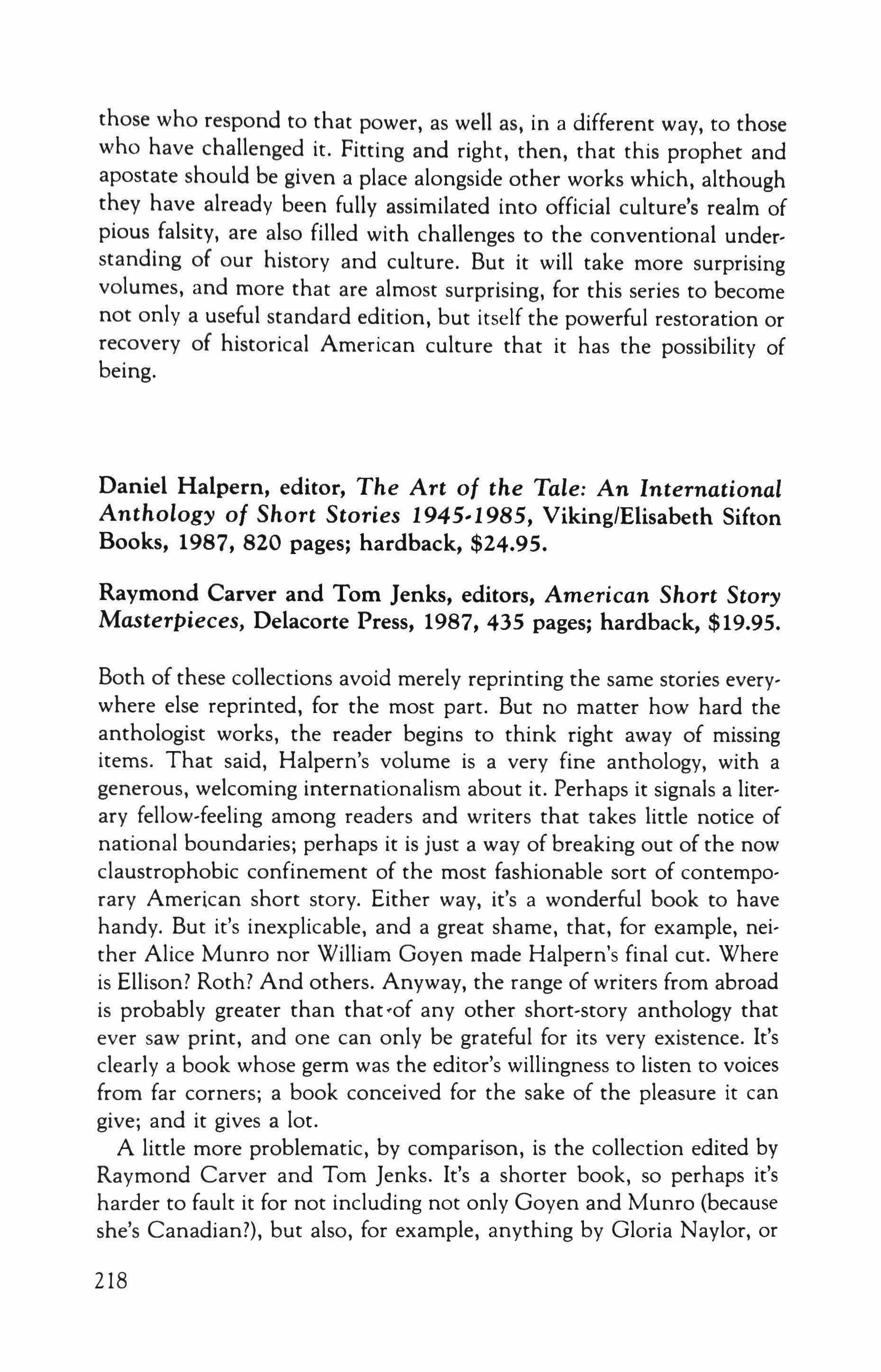
Daniel Halpern, editor, The Art of the Tale: An International Anthology of Short Stories 1945�1985, Viking/Elisabeth Sifton Books, 1987, 820 pages; hardback, $24.95.
Raymond Carver and Tom Jenks, editors, American Short Story Masterpieces, Delacorte Press, 1987, 435 pages; hardback, $19.95.
Both of these collections avoid merely reprinting the same stories everywhere else reprinted, for the most part. But no matter how hard the anthologist works, the reader begins to think right away of missing items. That said, Halpern's volume is a very fine anthology, with a generous, welcoming internationalism about it. Perhaps it signals a literary fellow-feeling among readers and writers that takes little notice of national boundaries; perhaps it is just a way of breaking out of the now claustrophobic confinement of the most fashionable sort of contemporary American short story. Either way, it's a wonderful book to have handy. But it's inexplicable, and a great shame, that, for example, neither Alice Munro nor William Goyen made Halpern's final cut. Where is Ellison? Roth? And others. Anyway, the range of writers from abroad is probably greater than that-of any other short-story anthology that ever saw print, and one can only be grateful for its very existence. It's clearly a book whose germ was the editor's willingness to listen to voices from far corners; a book conceived for the sake of the pleasure it can give; and it gives a lot.
A little more problematic, by comparison, is the collection edited by Raymond Carver and Tom Jenks. It's a shorter book, so perhaps it's harder to fault it for not including not only Goyen and Munro (because she's Canadian?), but also, for example, anything by Gloria Naylor, or
218
Leslie Epstein's "Steinway Quintet," or anything by Guy Davenport or Cyrus Colter or Cynthia Ozick or ? And so on; the last few decades have been extraordinarily rich in short fiction, and this collection comes with the ambition to be authoritative, to be a textbook, but it falls far short of being sufficient. While there is some variety in the included writers and stories, something sits wrong about a book with an aspiration to definitiveness when it should have been as generous, as full of delight and pleasure, as open, as a volume the size of Halpern's, and it isn't. Probably the publisher insisted on cutting costs; whatever the reason, the result, while useful, and while including some genuinely wonderful stories, doesn't seem to be what it should have been. Bedside tables with space for both books will be welcoming at night; and then a shelf nearby can begin to compensate for omissions.
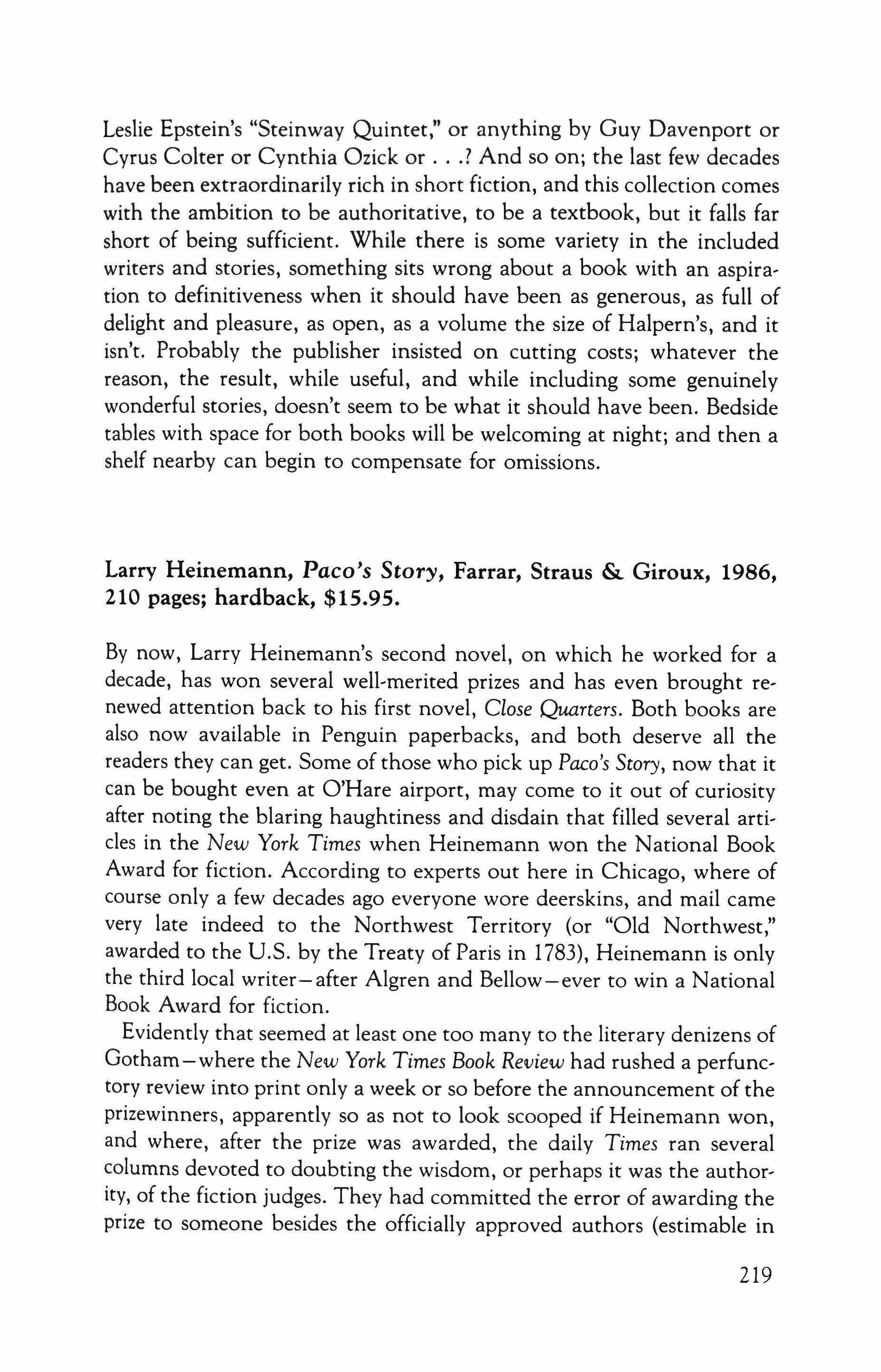
Larry Heinemann, Paco's Story, Farrar, Straus & Giroux, 1986, 210 pages; hardback, $15.95.
By now, Larry Heinemann's second novel, on which he worked for a decade, has won several well-merited prizes and has even brought renewed attention back to his first novel, Close Quarters. Both books are also now available in Penguin paperbacks, and both deserve all the readers they can get. Some of those who pick up Paco's Story, now that it can be bought even at O'Hare airport, may come to it out of curiosity after noting the blaring haughtiness and disdain that filled several articles in the New York Times when Heinemann won the National Book Award for fiction. According to experts out here in Chicago, where of course only a few decades ago everyone wore deerskins, and mail came very late indeed to the Northwest Territory (or "Old Northwest," awarded to the u.S. by the Treaty of Paris in 1783), Heinemann is only the third local writer-after Algren and Bellow-ever to win a National Book Award for fiction.
Evidently that seemed at least one too many to the literary denizens of Gotham-where the New York Times Book Review had rushed a perfunctory review into print only a week or so before the announcement of the prizewinners, apparently so as not to look scooped if Heinemann won, and where, after the prize was awarded, the daily Times ran several columns devoted to doubting the wisdom, or perhaps it was the authority, of the fiction judges. They had committed the error of awarding the prize to someone besides the officially approved authors (estimable in
219
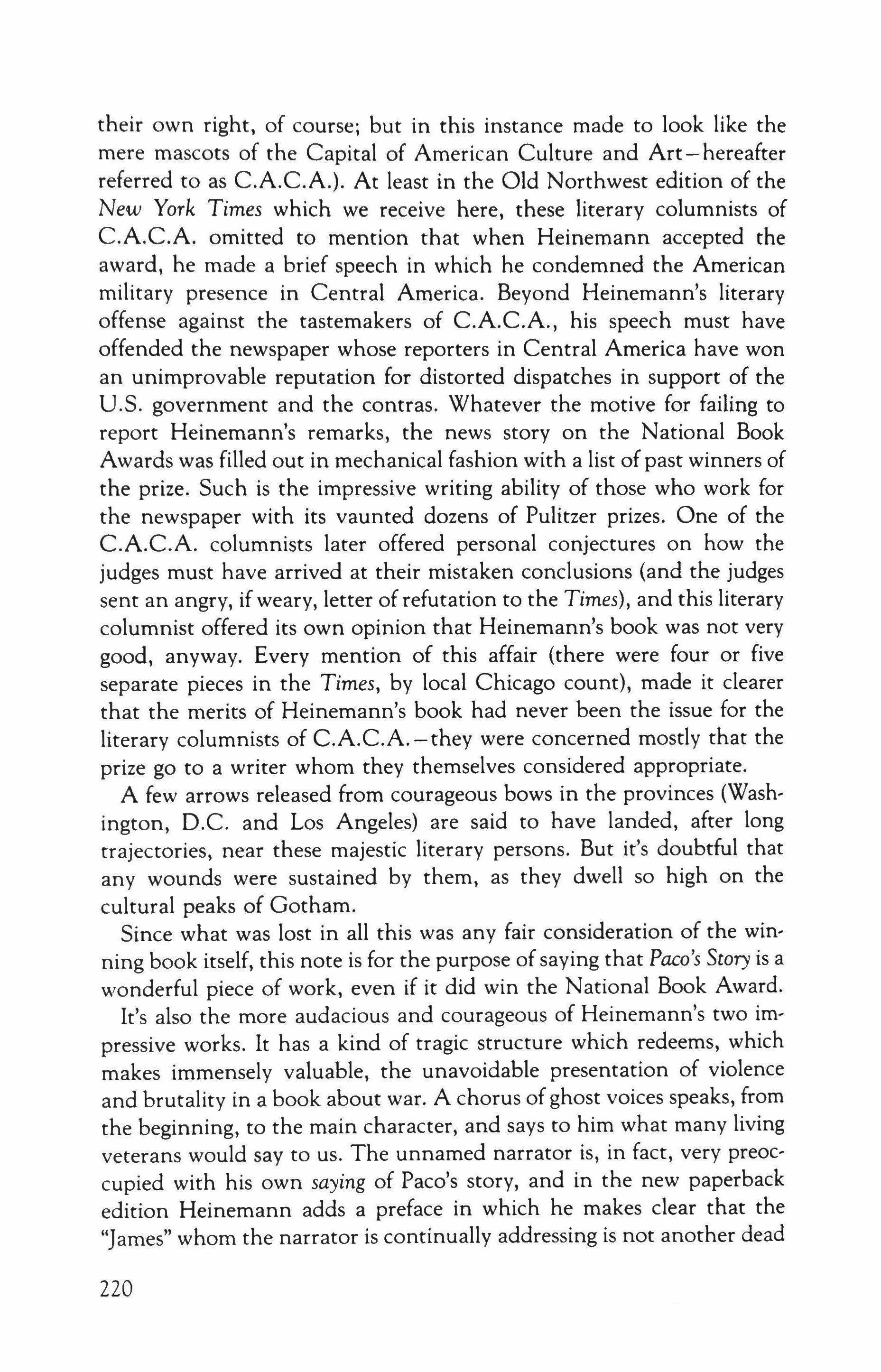
their own right, of course; but in this instance made to look like the mere mascots of the Capital of American Culture and Art-hereafter referred to as c.A.c.A.). At least in the Old Northwest edition of the New York Times which we receive here, these literary columnists of C.A.C.A. omitted to mention that when Heinemann accepted the award, he made a brief speech in which he condemned the American military presence in Central America. Beyond Heinemann's literary offense against the tastemakers of C.A.C.A., his speech must have offended the newspaper whose reporters in Central America have won an unimprovable reputation for distorted dispatches in support of the u.s. government and the contras. Whatever the motive for failing to report Heinemann's remarks, the news story on the National Book Awards was filled out in mechanical fashion with a list of past winners of the prize. Such is the impressive writing ability of those who work for the newspaper with its vaunted dozens of Pulitzer prizes. One of the C.A.C.A. columnists later offered personal conjectures on how the judges must have arrived at their mistaken conclusions (and the judges sent an angry, if weary, letter of refutation to the Times), and this literary columnist offered its own opinion that Heinemann's book was not very good, anyway. Every mention of this affair (there were four or five separate pieces in the Times, by local Chicago count), made it clearer that the merits of Heinemann's book had never been the issue for the literary columnists of C.A.C.A.-they were concerned mostly that the prize go to a writer whom they themselves considered appropriate.
A few arrows released from courageous bows in the provinces (Washington, D.C. and Los Angeles) are said to have landed, after long trajectories, near these majestic literary persons. But it's doubtful that any wounds were sustained by them, as they dwell so high on the cultural peaks of Gotham.
Since what was lost in all this was any fair consideration of the winning book itself, this note is for the purpose of saying that Pace's Story is a wonderful piece of work, even if it did win the National Book Award. It's also the more audacious and courageous of Heinemann's two impressive works. It has a kind of tragic structure which redeems, which makes immensely valuable, the unavoidable presentation of violence and brutality in a book about war. A chorus of ghost voices speaks, from the beginning, to the main character, and says to him what many living veterans would say to us. The unnamed narrator is, in fact, very preoccupied with his own saying of Paco's story, and in the new paperback edition Heinemann adds a preface in which he makes clear that the "James" whom the narrator is continually addressing is not another dead
220
soldier, but that colloquial fiction to whom one turns when, with bitter, too-great knowledge, one wants to say something that should have been obvious already, but just isn't. "Let's begin with the first clean fact, James: This ain't no war story." That's how the book opens.
The ghosts are of the dead from one mortal battle of which Paco is the lone survivor, carrying in his head the consciousnesses of all the rest. Conscience is not quite the issue; and its not being quite the issue is partly what the book is about: by the time Heinemann comes to the inevitable horror- he outdoes Conrad in honesty, partly by facing racism squarely instead of masking it with false ideals-the wretchedness and waste of the deaths of Paco's battlemates have cut through our moral certainties, leaving us almost too wobbly to focus our consciences on the horror those soldiers themselves created when they were alive. But not quiteand that's the novel's most stunning effect, perhaps.
It is a brief book, very intense and controlled. The individual chapters are as beautifully constructed as fugues, the sentences precise and fastidious; and, to greater purpose, the sentences go far toward suggesting how intensely Paco's survival may depend on the careful, ritual repetitions of humble movement and procedure in an act like washing dishes. The novel has the feeling of having been written small piece by piece; it is filled with grief, fierceness and a dignity wrestled continuously out of the grip of the despair and hopelessness that won't ever let go entirely, after those days of violent death, but which books like this oppose and transform into life again.
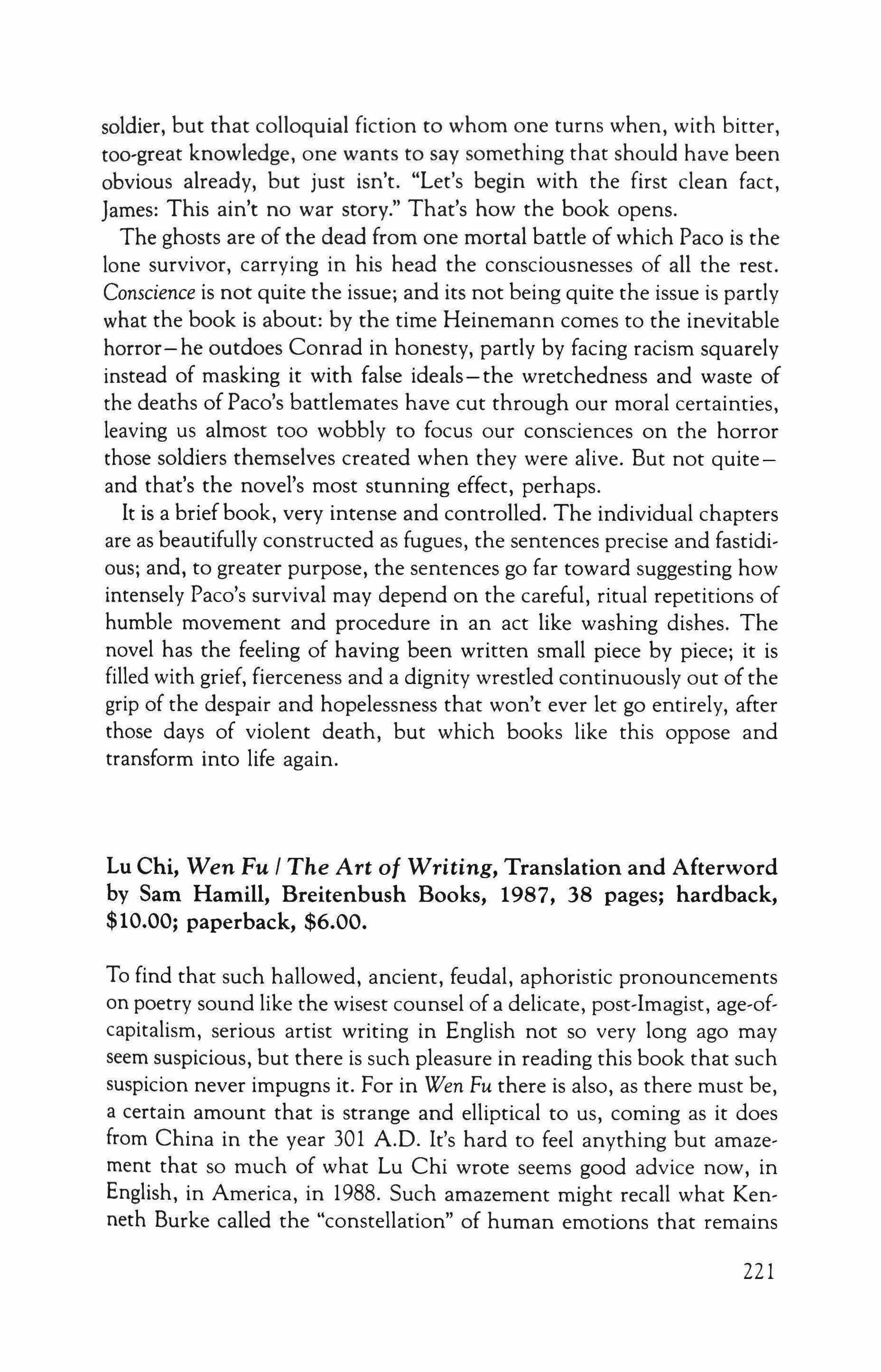
Lu Chi, Wen Fu I The Art of Writing, Translation and Afterword by Sam Hamill, Breitenbush Books, 1987, 38 pages; hardback, $10.00; paperback, $6.00.
To find that such hallowed, ancient, feudal, aphoristic pronouncements on poetry sound like the wisest counsel of a delicate, post-Imagist, age-ofcapitalism, serious artist writing in English not so very long ago may seem suspicious, but there is such pleasure in reading this book that such suspicion never impugns it. For in Wen Fu there is also, as there must be, a certain amount that is strange and elliptical to us, coming as it does from China in the year 301 A.D. It's hard to feel anything but amazement that so much of what Lu Chi wrote seems good advice now, in English, in America, in 1988. Such amazement might recall what Kenneth Burke called the "constellation" of human emotions that remains
221
recognizable from Homer's day to ours, in the West; this constellation could be convincingly corroborated by a kind of composite vade mecum for writers that could be put together from sources as distinct as Horace, Robert Frost and Lu Chi. The book-jacket copy of Wen Fu suggests to the potential buyer that this pamphlet belongs beside the writer's dictionary and his or her Strunk and White; but such advice is really too modest-this little book really belongs beside Garcia Lorca and Pound/ Fenellosa, beside E. M. Forster and Chekhov - beside those very few books that give one the spirit or the spur to plunge back into the struggle to write something clearly, cleanly and memorably. The accessible sensibility revealed in Sam Hamill's graceful translation seems a familiar voice calling across chasms of time and cultural difference, heartening and encouraging. This Wen Fu should be always near at hand, not only because it is wise and helpful, but also because it's a beautiful small book of the sort that you feel you want to have with you wherever you write.

Etheridge Knight, The Essential Etheridge Knight, University of Pittsburgh Press, 1986, 114 pages; hardback, $17.95; paperback, $9.95.
Hard Rock, along with Gerald, Flukum, Shine, Pooky Dee and others, here rise side by side out of Knight's anti-Spoon-River. Some would call the power of Knight's poetry "raw"; it is certainly, on many occasions, "political," in the sense of voicing repeatedly the violence to body and spirit of the history of racism. What a reading of this selection of poems most reveals is that while the feeling in Knight's poems is characteristically strong and uninhibited, his vision of the life he puts into his poems is complicated, and his poetics capacious. His technical prowess ranges from blunt harshness to sudden, very surprising shifts toward rhetorical tropes of subtlety. This is apparent even in the famous "Hard Rock," which blends a compressed representation of street and cell talk with a fourteener couplet:
"01 Hard Rock! man, that's one crazy nigger."
And then the jewel of a myth that Hard Rock had once bit A screw on the thumb and poisoned him with syphilitic spit.
The strength of this is not that Knight may have studied some earlier English poetry and adapted an odd sort of line with historical precedent-like a jazz musician quoting in the midst of the blues a classic
222
and surprising show-tune. It's rather that Knight's work, for all its features that arise from black speech and song, remains open to so many other possibilities of language and therefore of poetry in English. His work is not narrow. And his utilization of poetic precedent is unusualperhaps something that only a black American poet is likely to be able to do. That is, although he has taken freely what he has needed from that Anglo-American poetic tradition as we have it in our available texts, he has not surpressed the language of his own social being.
A very pure example is "For Malcolm, a Year After," which begins, "Compose for Red a proper verse; / Adhere to foot and strict iamb," and ends this way:
Compose a verse for Malcolm man, And make it rime and make it prim.
The verse will die - as all men do
But not the memory of him!
Death might come singing sweet like C, Or knocking like the old folk say, The moon and stars may pass away,
But not the anger of that day.
Knight, like Walcott but from the opposite direction, approaches a place where the full range oflanguage-from the extreme of precedented poetic possibilities to the extreme of colloquialism and the unliterary - is available to the poet. But Walcott and Knight share only this theoretical position; their poetry could hardly be more different. In Knight a passionate vernacular predominates; and with a natural air, Knight's fine musical sense gives his poems melody, dynamic contrasts and powerful cadences. But then, what other American poet began his work while serving a felony sentence in a state prison? (This is mentioned by the University of Pittsburgh Press press release accompanying this book.) Knight's origins, mistakes, maladies, suffering and talent are a peculiar and amazing blend.
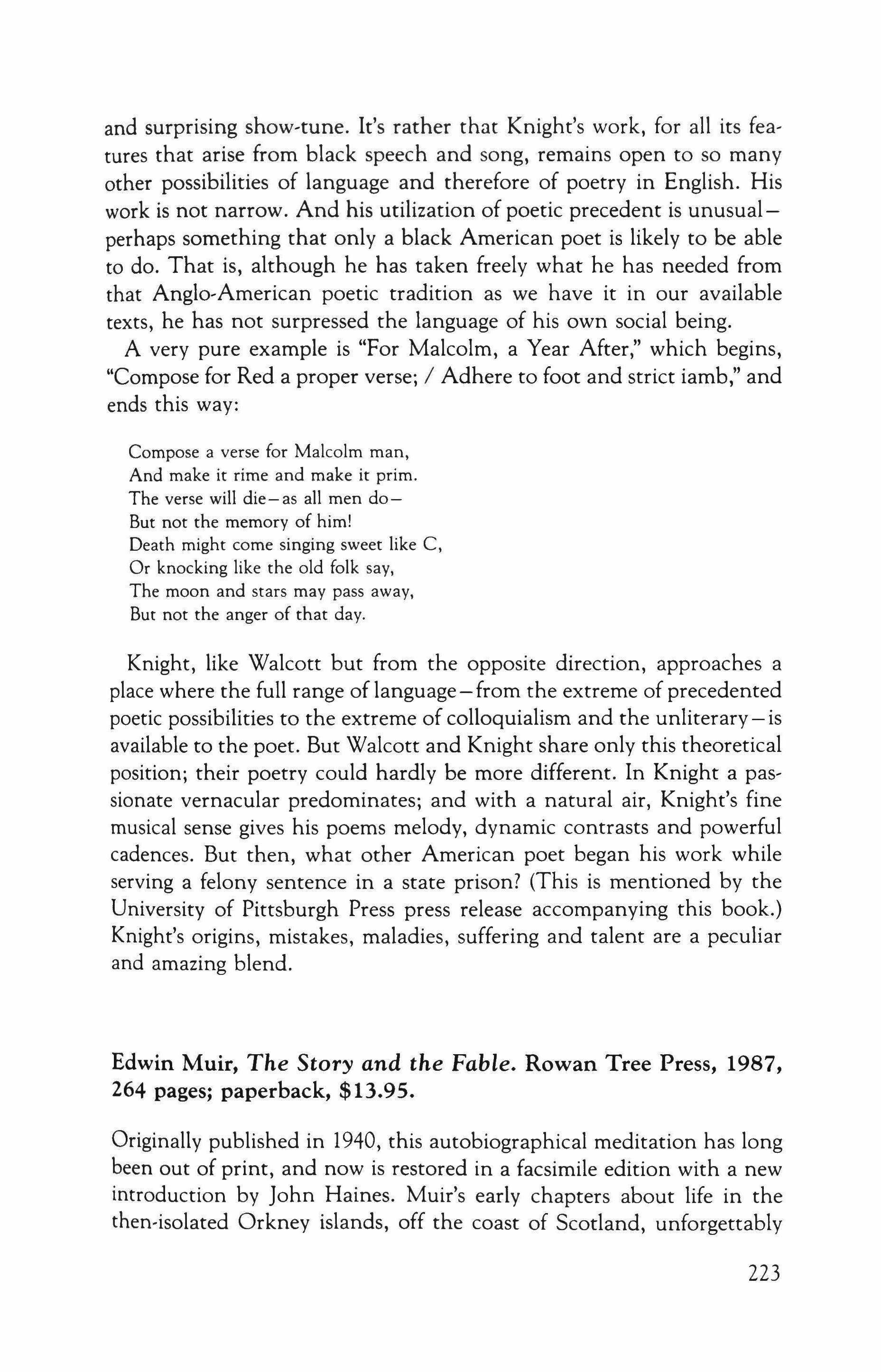
Edwin Muir, The Story and the Fable. Rowan Tree Press, 1987, 264 pages; paperback, $13.95.
Originally published in 1940, this autobiographical meditation has long been out of print, and now is restored in a facsimile edition with a new introduction by John Haines. Muir's early chapters about life in the then-isolated Orkney islands, off the coast of Scotland, unforgettably
223
convey a sensitive child's experience and an adult's understanding of an extraordinary and lost world. The comforting stability of that world with its repeated agricultural cycles forms the basis of Muir's later belief in the potency of fable as opposed to particulars - his fabulous poems, his recounting of dreams, his view of history. Few other writers of his time or any other have had not only his firsthand understanding of rural life both comfortable and hard, but also his experience of family tragedy and of grinding, soulless labor and impoverished urban life. The sweetness and awe in his recollections ofchildhood, and the balance and dignity in his mention of hardship and tragedy, make for a very moving and beautifully written book. More than a memoir, it is also a recounting of his intellectual development through Christian conversion, socialism and Nietzschean fervors, to arrive at the dimmed hopes of the years when he was writing the book: having lived in Germany and Czechoslovakia in the years before World War II (with his wife Willa, his collaborator on the Kafka translations for which he remains better known than for his poems), Muir saw little from which he could draw encouragement about the hopes of the impoverished or the fate of nations. So the memoir itself is a kind of rescue of the world of his childhood and of his beliefs about spirit and society from the closing jaws of destruction. Reading The Story and the Fable, one sees a clear instance of what Kenneth Burke meant by calling writing a "symbolic action." As a poet's autobiography, this one has more than the usual value as a primer of the formation of writerly scruples and imagination; it is a wonderful book, and the opening chapters are the kind of thing one reads and rereads over a lifetime.
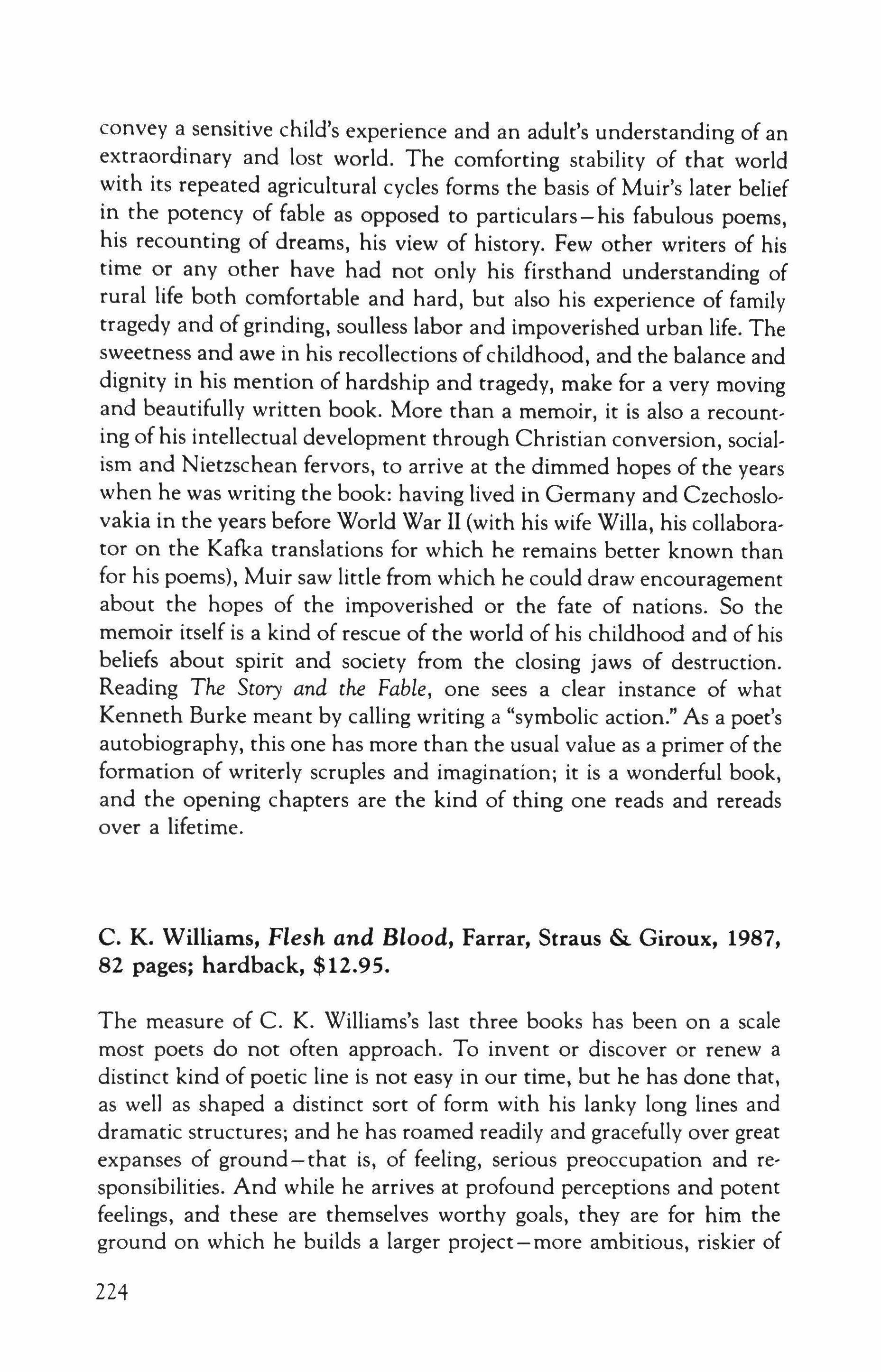
C. K. Williams, Flesh and Blood, Farrar, Straus & Giroux, 1987, 82 pages; hardback, $12.95.
The measure of C. K. Williams's last three books has been on a scale most poets do not often approach. To invent or discover or renew a distinct kind of poetic line is not easy in our time, but he has done that, as well as shaped a distinct sort of form with his lanky long lines and dramatic structures; and he has roamed readily and gracefully over great expanses of ground - that is, of feeling, serious preoccupation and responsibilities. And while he arrives at profound perceptions and potent feelings, and these are themselves worthy goals, they are for him the ground on which he builds a larger project-more ambitious, riskier of
224
failure, and also exhilarating: he produces a profound sense of what we could call our lives-in-language.
The dramatic mechanism of this is his implied portrait of a general cultural craziness and savagery, by sketching precisely certain small moments of defeat and triumph within it. This is most apparent in the new collection, Flesh and Blood, which, using the same poetic format for every poem, reminds one a little of Lowell's Notebooks. But if Lowell, while attempting the same thing, doesn't seem finally to have been scrupulous enough about either his choice of materials or the finish of the individual poems, Williams has managed his smaller form with great responsiveness to incident and idea, and has produced poems of greater finish and at the same time less strainpoems of a greater poetic exuberance.
Part of Williams's success must lie in the care with which he has chosen what Thomas McGrath calls the "representative moments" around which the poems are built. And while Williams's characteristically long line goes about extending the process of our thinking, noticing and feeling as we read, his short form is compressing and eliding all the materials at hand, so that we must, as readers, be agile enough to leap to the heart of the matter when each poem bids us to. Nuances build in the silence surrounding each chosen episode of flesh and blood, and the poems begin to echo each other down their hall the way the great sonnet-sequences do. This collection is at once a wholly natural record of generous and humane responsiveness to life, and also a deliberated artistic shaping of that responsiveness into poems that we are meant to see as intensely formed. And that combination of blood and flesh is rare, wonderful and welcome.

Ellen Bryant Voigt, The Lotus Flowers, W. W. Norton, 1987, 70 pages; hardback, $13.95.
A patient searching for the revealing, conclusive sign marks Voigt's second book, The Forces of Plenty, and this, her third collection. Sometimes, the sign may even appear in the obvious place of the first or the final image in a poem - a tangible thing like a berry, or a more symbolic item like an imagined aeriel view of a house that makes it seem the bull's eye of a target whose concentric circles are lawn and gravel and fence. But wherever it is found in a poem, the sign often seems something rescued from the past. In many of the poems there's a brooding sense of anxiousness over the vulnerability of life to frightening or saddening
225
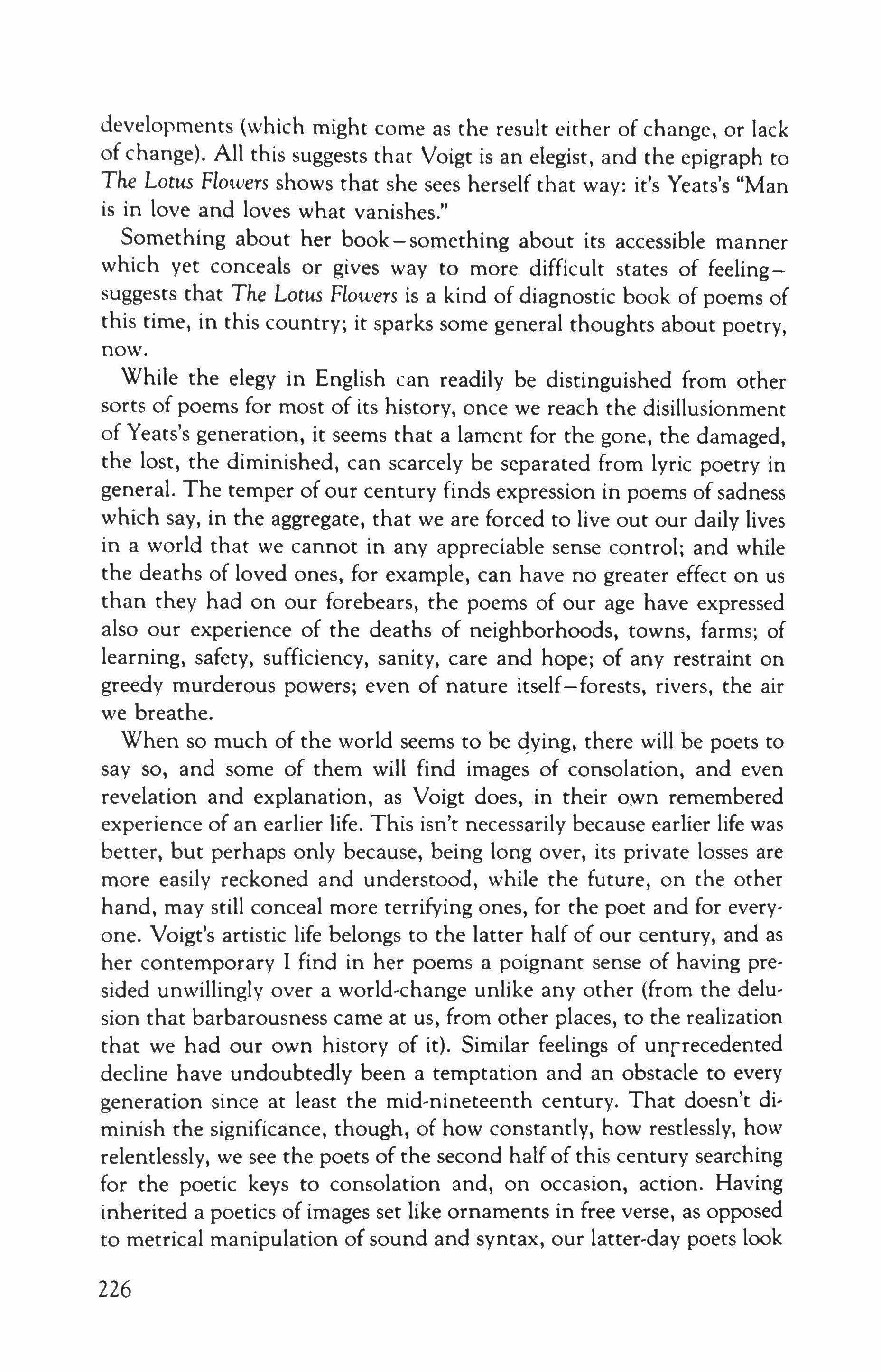
developments (which might come as the result either of change, or lack of change). All this suggests that Voigt is an elegist, and the epigraph to The Lotus Flowers shows that she sees herself that way: it's Yeats's "Man is in love and loves what vanishes."
Something about her book - something about its accessible manner which yet conceals or gives way to more difficult states of feelingsuggests that The Lotus Flowers is a kind of diagnostic book of poems of this time, in this country; it sparks some general thoughts about poetry, now.
While the elegy in English can readily be distinguished from other sorts of poems for most of its history, once we reach the disillusionment of Yeats's generation, it seems that a lament for the gone, the damaged, the lost, the diminished, can scarcely be separated from lyric poetry in general. The temper of our century finds expression in poems of sadness which say, in the aggregate, that we are forced to live out our daily lives in a world that we cannot in any appreciable sense control; and while the deaths of loved ones, for example, can have no greater effect on us than they had on our forebears, the poems of our age have expressed also our experience of the deaths of neighborhoods, towns, farms; of learning, safety, sufficiency, sanity, care and hope; of any restraint on greedy murderous powers; even of nature itself-forests, rivers, the air we breathe.
When so much of the world seems to be dying, there will be poets to say so, and some of them will find images of consolation, and even revelation and explanation, as Voigt does, in their own remembered experience of an earlier life. This isn't necessarily because earlier life was better, but perhaps only because, being long over, its private losses are more easily reckoned and understood, while the future, on the other hand, may still conceal more terrifying ones, for the poet and for everyone. Voigt's artistic life belongs to the latter half of our century, and as her contemporary I find in her poems a poignant sense of having presided unwillingly over a world-change unlike any other (from the delusion that barbarousness came at us, from other places, to the realization that we had our own history of it). Similar feelings of unprecedented decline have undoubtedly been a temptation and an obstacle to every generation since at least the mid-nineteenth century. That doesn't diminish the significance, though, of how constantly, how restlessly, how relentlessly, we see the poets of the second half of this century searching for the poetic keys to consolation and, on occasion, action. Having inherited a poetics of images set like ornaments in free verse, as opposed to metrical manipulation of sound and syntax, our latter-day poets look
226
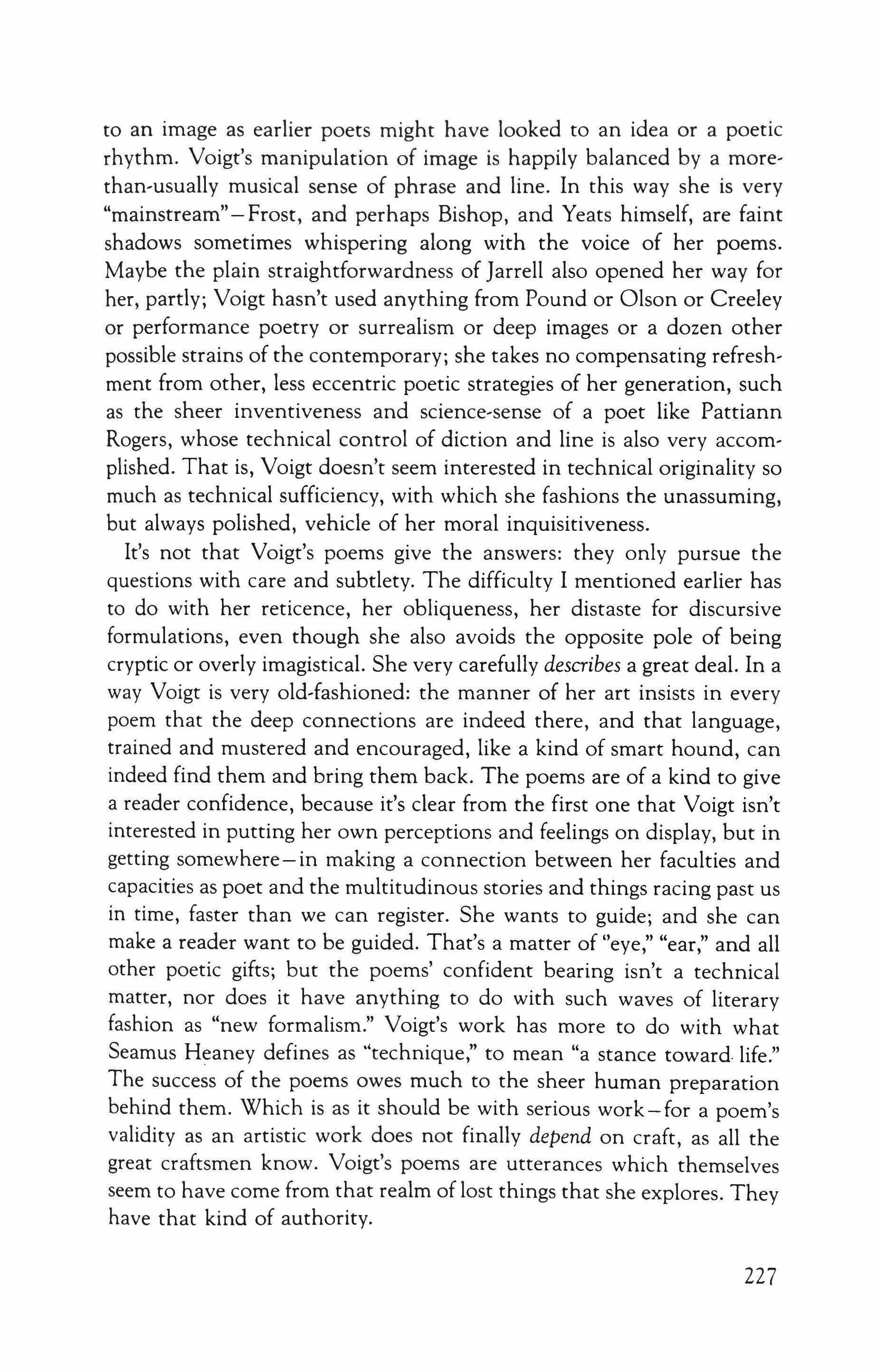
to an image as earlier poets might have looked to an idea or a poetic rhythm. Voigt's manipulation of image is happily balanced by a morethan-usually musical sense of phrase and line. In this way she is very "mainstream" - Frost, and perhaps Bishop, and Yeats himself, are faint shadows sometimes whispering along with the voice of her poems. Maybe the plain straightforwardness of Jarrell also opened her way for her, partly; Voigt hasn't used anything from Pound or Olson or Creeley or performance poetry or surrealism or deep images or a dozen other possible strains of the contemporary; she takes no compensating refreshment from other, less eccentric poetic strategies of her generation, such as the sheer inventiveness and science-sense of a poet like Pattiann Rogers, whose technical control of diction and line is also very accomplished. That is, Voigt doesn't seem interested in technical originality so much as technical sufficiency, with which she fashions the unassuming, but always polished, vehicle of her moral inquisitiveness.
It's not that Voigt's poems give the answers: they only pursue the questions with care and subtlety. The difficulty I mentioned earlier has to do with her reticence, her obliqueness, her distaste for discursive formulations, even though she also avoids the opposite pole of being cryptic or overly imagistical. She very carefully describes a great deal. In a way Voigt is very old-fashioned: the manner of her art insists in every poem that the deep connections are indeed there, and that language, trained and mustered and encouraged, like a kind of smart hound, can indeed find them and bring them back. The poems are of a kind to give a reader confidence, because it's clear from the first one that Voigt isn't interested in putting her own perceptions and feelings on display, but in getting somewhere-in making a connection between her faculties and capacities as poet and the multitudinous stories and things racing past us in time, faster than we can register. She wants to guide; and she can make a reader want to be guided. That's a matter of "eye," "ear," and all other poetic gifts; but the poems' confident bearing isn't a technical matter, nor does it have anything to do with such waves of literary fashion as "new formalism." Voigt's work has more to do with what Seamus Heaney defines as "technique," to mean "a stance toward. life." The success of the poems owes much to the sheer human preparation behind them. Which is as it should be with serious work-for a poem's validity as an artistic work does not finally depend on craft, as all the great craftsmen know. Voigt's poems are utterances which themselves seem to have come from that realm of lost things that she explores. They have that kind of authority.
227

Publishers of books reviewed:
Breitenbush Books
P. O. Box 02137
Portland, OR 97202
Delacorte Press
Dell Publishing Co., Inc.
1 Dag Hammarskjold Plaza
245 East 47th Street
New York, NY 10017
Farrar, Straus & Giroux
19 Union Square West
New York, NY 10003
The Library of America
Literary Classics of the United States
14 East 60th Street
New York, NY 10022
Methuen Inc.
29 West 35th Street
New York, NY 10001
Moyer Bell Limited
Colonial Hill RFD 1 Mt. Kisco, NY 10549
W. W. Norton & Co., Inc.
500 Fifth Avenue
New York, NY 10110
Rowan Tree Press
124 Chestnut Street Boston, MA 02108
St. Martin's Press
175 Fifth Avenue
New York, NY 10010
228
University of Pittsburgh Press
127 N. Bellefield Avenue
Pittsburgh, PA 15260

40 West 23rd Street
New York, NY 10010
Viking Penguin Inc.
229
A Note in Memoriam: Terrence Des Pres

Terrence Des Pres, born on December 26, 1939, died accidentally on November 16, 1987.
One might want to grieve well enough and then go on to the next thing that needs to be done. The trouble with following that advice, for this writer, is that Des Pres was one of those very ones to whom I turned frequently for companionship in both the pleasure and the responsibility of figuring out what it was, exactly, that next needed doing-at least in the circumscribed (and to both of us compelling, even unrenounceable) world of writing. So this brief memorial is offered in personal tribute to Des Pres.
To me he seemed a great spirit, a great conscience, a great lover of poetry for its most potent utterances rather than its most ingrained or wispy, for its signs of trouble rather than its more polished airs. Brilliant but modest, restless and edgy, mordant, intense, reticently loving, angry, generous and always ready to laugh whether with delight or out of grim or bitter rue, he was a great and encouraging companion not only when once in a while we could meet here or there, but also and always in the mind, as a fellow-spirit whom I sensed was there, thinking, walking-with-thought ahead into these times.
He had been struck, I think, into a permanent grief over the horrors of violence against persons in this century, he made no secret of it, and he said to me more than once that he would never get over having gone through the writing of The Survivor: An Anatomy of Life in the Death Camps. I did not distrust that sentiment; I do not consider it to have been expressed, as some would have expressed it, out of a perverse pride in his own suffering. On the contrary, I thought it the measure of a knowledge and compassion greater than I could have welcomed in
230

myself, for fear of it, but which he had discovered in himself and had no choice but to accept. And he never placed his own premonitions, nightmares, obsessions, before the suffering of those whose lives and deaths, whose living against death, he had studied.
Born or raised into such uncommon sensitivity-l don't know whichhe was what he was, and would confess his temperament and gifts as a kind of weakness. And perhaps others who knew him would agree that this made him seem to live at twice the rate we did, burning furiously through thought and feeling in his restless, winning way; tiring of thinking on dark things, certainly, but willing to return to them for more thought, as well as unable not to. He had the authority - not wanted, and almost unwitting-of one who knows too much, and for whom that knowledge is an obstacle, a boulder, needing to be leapt over again and again and again. Or perhaps he was, I feel now, a sort of Sisyphus-not condemned out of fault, but out of vulnerability, out of conscience, to roll that rock ahead of him always. Some persons have to do that and he was one. But what was perhaps most inspiring about him was that with all his knowledge of the suffering of others, he was himself productive, energetic, excited by his reading of poetry. At the time of his death, I think he had never been happier.
But he himself was, until he died, a survivor-ofearly, irrevocable loss. And if he accepted a long turn pushing that stone, studying the survival of others for whom the word was life-saving, he later got past that stone with the extraordinary chapters of Praises and Dispraises, a book which looks back to Hannah Arendt's Men in Dark Times, but chooses only poets for its subjects. (It will be published in the fall by Viking.) And he was already at work on a new book - taking notes and thinking his way into it-about flight; about, as I remember him mentioning it only a few weeks ago, not only the technological reality of flight, but its cultural function as a ceaselessly sought activity both real and symbolic, as we Americans keep flying away from troubles we seem to have no way of solving: nuclear weaponry and all the rest. This was a brilliant opening into which Des Pres could have driven all his alertness and intellectual power. All of his work was of a rare and invaluable kind that one cannot imagine anyone else ever accomplishing in his stead; so his absence now as a writer will not be filled any more than his absence as a person. When we last talked, by telephone, he and I were looking forward to many different things-the publication of Thomas McGrath: Life and the Poem (TQ #70), which we had edited together; the realization of the hopes of others whom we loved; meeting in Chicago in a few weeks. But now he is dead. If there are vocations or missions for any of us at all, and
231
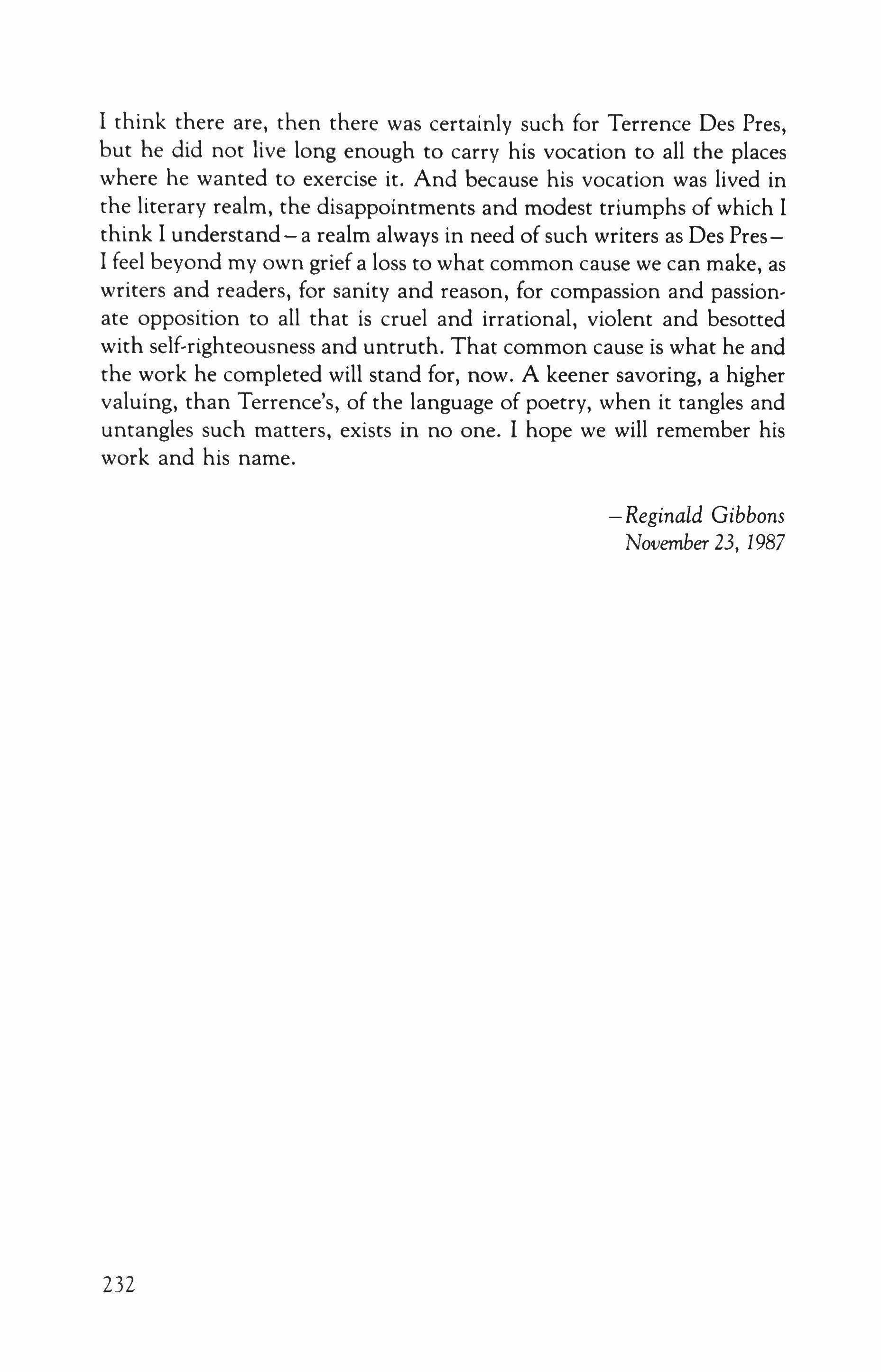
I think there are, then there was certainly such for Terrence Des Pres, but he did not live long enough to carry his vocation to all the places where he wanted to exercise it. And because his vocation was lived in the literary realm, the disappointments and modest triumphs of which I think I understand-a realm always in need of such writers as Des PresI feel beyond my own grief a loss to what common cause we can make, as writers and readers, for sanity and reason, for compassion and passionate opposition to all that is cruel and irrational, violent and besotted with self-righteousness and untruth. That common cause is what he and the work he completed will stand for, now. A keener savoring, a higher valuing, than Terrence's, of the language of poetry, when it tangles and untangles such matters, exists in no one. I hope we will remember his work and his name.
- Reginald Gibbons November 23, 1987
232
Contributors

Sidney Sulkin's stories and poems have appeared in the Kenyon Review, Sewanee Review, Harper's, North American Review and other periodicals. His work has been anthologized in the Best American Stories, the O. Henry Prize Stories and other anthologies. Mr. Sulkin was the winner of a Quarterly Review of Literature poetry prize in 1980 for his verse play, Gate of the Lions. He is the author of a novel, The Family Man (Robert Luce, 1962), and of The Secret Seed, a collection of stories and poems (Dryad Press, 1983).
* * * Marie Luise Kaschnitz was a German writer of poetry, fiction, plays, essays and short prose pieces in which the sensibility and language of fiction and poetry are combined. She died in 1974 at the age of seventy-three.
* * * Katie Trumpener is studying toward a Ph.D. in comparative literature at Stanford University. A fellow at the Stanford Humanities Center, she is writing a dissertation on the historical novel and the institutionalization of folklore in Germany in the eighteenth and nineteenth centuries.
Susan Straight holds an MFA degree in creative writing from the University of Massachusetts. She has published nonfiction in Nuestro and the Los Angeles Herald-Examiner. "Buddah" is her first published story.
* * * Robert S. Nelsen is a student in the Committee on Social Thought at the University of Chicago, where he is completing a Ph.D. dissertation on the short stories ofJames Joyce and Flannery O'Connor. "Something Big" is his first published story. * * * Stephen Dixon's most recent book is his fourth novel, Garbage, published by Cane Hill Press in 1987. A collection of stories, Love & Will, will also be released by Cane Hill Press. "Frog Acts" is part of an interconnected collection of stories entitled Frog, which he has been writing for the past three years.
* * * Timothy Dekin's most recent books of poems are Carnival
233

(R. L. Barth, 1985) and Winter Fruit (Elpenor, 1983). Poems of his have appeared in TQ #64 and #67. "The Curate," a chapter from a novel-inprogress, is his first published fiction. He teaches in the English Department at Northwestern. * * * Susan Kerslake is the author of a volume of stories, Book of Fears (Ragweed Press, 1984), and two novels, Middlewatch (Oberon Press, 1976) and Penumbra (Ava Press, 1984). She lives in Halifax, Nova Scotia, Canada. * * * Mark Costello is the author of The Murphy Stories (University of lllinois Press, 1973), now in its fifth printing. He teaches fiction writing at the University of Illinois at Urbana-Champaign.
Garrett Kaoru Hongo's book of poems, The River of Heaven, was the Lamont Poetry Selection of 1987. It will be published by Knopf in spring 1988. A native of Volcano, Hawaii, Mr. Hongo teaches at the University of Missouri, Columbia. Also a playwright, he was the founding director of the Asian Exclusion Act, a theater company in Seattle. He has received an NEA Fellowship and the Discovery/The Nation Award.
* * * Betty Adcock's two volumes of poetry are Walking Out (1975) and Nettles (1983), both published by Louisiana State University Press. The recipient of an NEA grant in 1984, she is writer-in-residence at Meredith College, in Raleigh, North Carolina, and has completed a third collection of poems. * * * Odysseus Elytis was born in Crete in 1911 and received the Nobel Prize for Literature in 1979. His books of poetry and prose include The Axion Esti, Edmund Keeley and George Savidis, translators (University of Pittsburgh Press, 1979); The Sovereign Sun: Selected Poems, Kirnon Friar, translator (Temple University Press, 1974); and What I Love: Selected Poems, Olga Broumas, translator (Copper Canyon Press, 1985). He lives in Athens, Greece. * * * Jeffrey Carson teaches art history and literature at the Aegean Center for Fine Arts, in Paros, Greece.
John Haines's most recent book is Stories We Listened To (The Bench Press, 1986). He is completing a new volume of poems, and a collection of his essays is to be published by the University of Michigan Press. He lives part of the year in Fairbanks, Alaska. * * * Cai Qi-jiao lives in Fujian, in the People's Republic of China, where he is employed by the Federation of Literary and Arts Circles. His seven collections of poetry include Echo, Sound of the Waves and A Further Collection to Echo, all published during the Hundred Flowers and Anti-Rightist era beginning in the late fifties, when he was criticized for ignoring political ideology. He has published prolifically since the downfall of the so-called "Gang of Four" in the late seventies. * * * Edward Morin is a professor of English at Wayne State University, in Detroit. His translations from 234

modern Greek and Chinese have appeared in several periodicals, and his own poems have been published in the Hudson Review, Ploughshares, Poetry Northwest and other journals. * * * Dennis Ding, whose Chinese name is Ding Ting-sen, is an instructor of English at Guizhou Normal University. He has translated from English to Chinese several works by T. S. Eliot, Ezra Pound, William Carlos Williams and other leading American poets. He was recently a visiting scholar at Oakland University, in Michigan. * * * Mary Kinzie has recently published poems in Salmagundi and Southwest Review. Her essays on contemporary poets and on reading fiction appear in the American Poetry Review, Antaeus and Modern Philology.
Adam Zagajewski, a poet, essayist and novelist now living in Paris, is the most outstanding representative of the "Generation of '68" in Polish literature. His recent books include Tremor: Selected Poems (Farrar, Straus & Giroux, 1985). * * * C. K. Williams is the author of five books of poems: Lies (1969), I Am the Bitter Name (1972) and With Ignorance (1977), all published by Houghton Mifflin; Tar (Random House, 1983); and Flesh and Blood (Farrar, Straus & Giroux, 1987). He took part in The Writer in Our World symposium (TQ #65) and his poems have also appeared in TQ #58 and TQ 20 (#63). * * * Renata Gorcyznski is the translator of Mr. Zagajewski's book, Tremor, and cotranslator of The Separate Notebooks by Czeslaw Milosz (Ecco Press, 1986). She is also the co-author (under the pen name Ewa Czarnecka) of Conversations with Czeslaw Milosz (Harcourt Brace Jovanovich, 1987).
* * * Stanislaw Baranczak is the Alfred [urzykowski Professor of Polish Language and Literature at Harvard. His most recent books include A Fugitive from Utopia: The Poetry of Zbigniew Herbert (Harvard University Press, 1987) and a collection of poems in Polish entitled Atlantis. His work has appeared in A Window on Poland (TQ #57, Volume 1), The Writer in Our World. (TQ #65), and TQ 20 (#63). * * * Wislawa Szymborska is one of the most popular women poets now living in Poland. The poems appearing in this issue were selected from her highly acclaimed volume, The People on the Bridge (1986). * * * Clare Cavanagh is a graduate student at Harvard, writing a dissertation on the poetry of Osip Mandelstam and preparing, in collaboration with Stanislaw Baranczak, an anthology of recent Polish poetry. * * * Artur Miedzvrzecki and Julia Hartwig, a married couple living in Warsaw, are highly esteemed Polish poets and translators of French, Russian and American poetry.
Wiktor Woroszvlski is a poet, novelist, essayist and translator, and one of the major figures of the Polish dissident movement. He spent
235
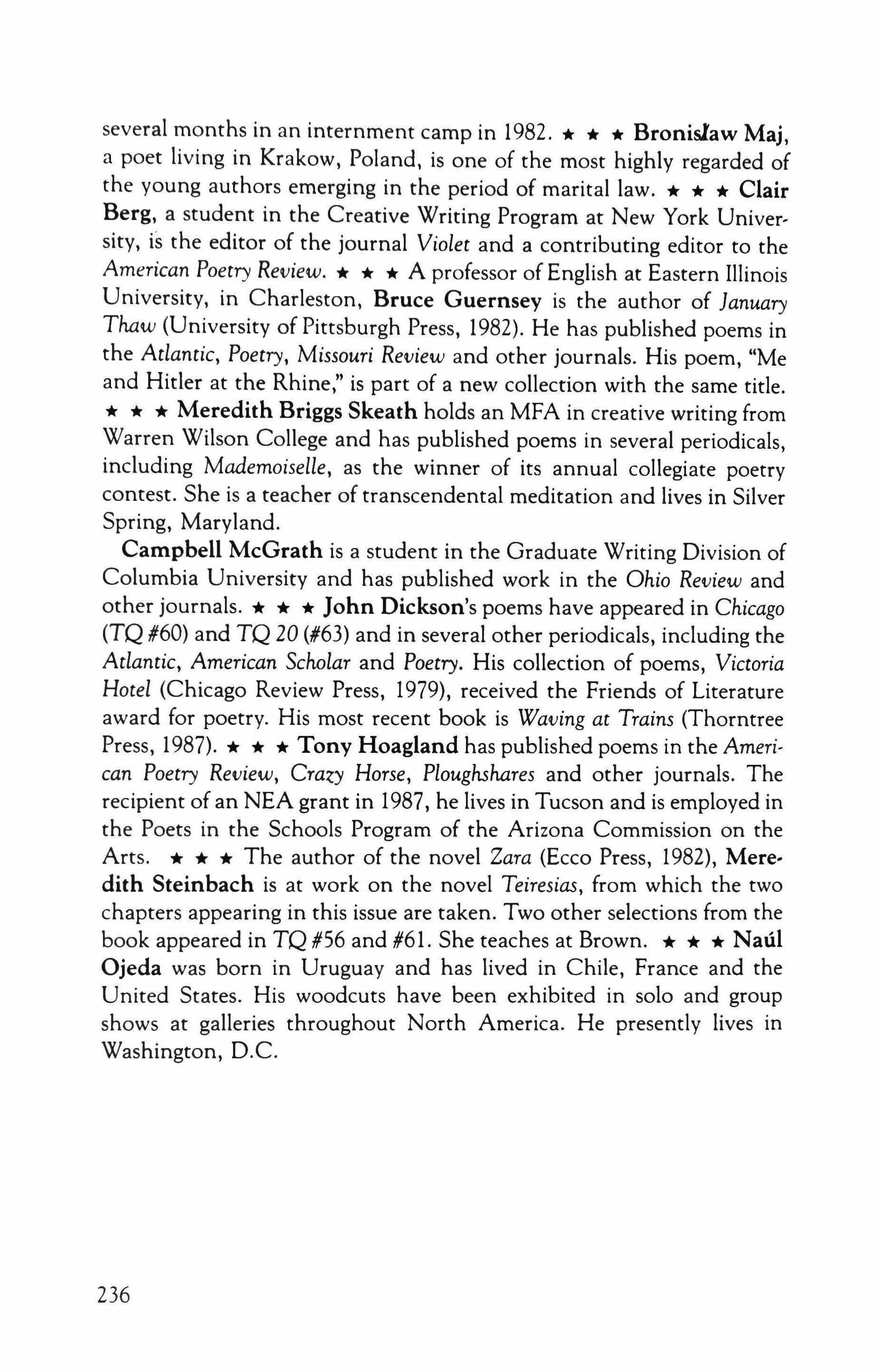
several months in an internment camp in 1982. * * * Bronislaw Maj, a poet living in Krakow, Poland, is one of the most highly regarded of the young authors emerging in the period of marital law. * * * Clair Berg, a student in the Creative Writing Program at New York University, is the editor of the journal Violet and a contributing editor to the American Poetry Review. * * * A professor of English at Eastern Illinois University, in Charleston, Bruce Guernsey is the author of January Thaw (University of Pittsburgh Press, 1982). He has published poems in the Atlantic, Poetry, Missouri Review and other journals. His poem, "Me and Hitler at the Rhine," is part of a new collection with the same title.
* * * Meredith Briggs Skeath holds an MFA in creative writing from Warren Wilson College and has published poems in several periodicals, including Mademoiselle, as the winner of its annual collegiate poetry contest. She is a teacher of transcendental meditation and lives in Silver Spring, Maryland.
Campbell McGrath is a student in the Graduate Writing Division of Columbia University and has published work in the Ohio Review and other journals. * * * John Dickson's poems have appeared in Chicago (TQ #60) and TQ 20 (#63) and in several other periodicals, including the Atlantic, American Scholar and Poetry. His collection of poems, Victoria Hotel (Chicago Review Press, 1979), received the Friends of Literature award for poetry. His most recent book is Waving at Trains (Thorntree Press, 1987).
* * * Tony Hoagland has published poems in the American Poetry Review, Crazy Horse, Ploughshares and other journals. The recipient of an NEA grant in 1987, he lives in Tucson and is employed in the Poets in the Schools Program of the Arizona Commission on the Arts.
* * * The author of the novel Zara (Ecco Press, 1982), Meredith Steinbach is at work on the novel Teiresias, from which the two chapters appearing in this issue are taken. Two other selections from the book appeared in TQ #56 and #61. She teaches at Brown. * * * Naul Ojeda was born in Uruguay and has lived in Chile, France and the United States. His woodcuts have been exhibited in solo and group shows at galleries throughout North America. He presently lives in Washington, D.C.
236
TCQi 20

FOUR TO KEEP
Special is as special does, and from time to time TriQuarterly becomes more special as it alternates its general issues with such specials as the four pictured here, available at the following prices (plus $1.50 per order for postage and handling): #57, in two volumes: A Window on Poland and Prose from Spain, recent writing and graphics from two vital and often beleaguered ·countries, $7.90 (both volumes) #63 (TQ 20): TO's widely-acclaimed twentieth-anniversary issue, a 684-page feast of the very best prose, poetry and art we've published, $12.95 #65 (The Writer in Our World), a symposium featuring Grace Paley, Robert Stone and others, with new work by most participants, $8.95 #69 (From South Africa), perhaps our most important issue, devoted entirely to South African writing, photographs and art, and documents of censorship, over 500 pages, $13.50. Send order to TriQuarter/y, 2020 Ridge Ave., Evanston, IL 60208.
1n
Transferences a novel
by James Twiggs
At the heart of this powerful novel is a middle-aged professor's obsessive love for the young therapist who abandoned him. Each chapter opens with a letter from the professor, Tim Jinks, then switches to the life of Wanda North. As the book progresses, its parallel stories then begin to echo each other in subtle, funny, and always intriguing ways, as the structure of the therapeutic relationship is duplicated in the structure of the novel.
A comedy of manners and offbeat romance, Transferences is above all a dazzling comedy of language and a sophisticated exploration of the dark side of psychotherapy.
816.95 cloth, 0-938626-89-2 89.95 paper, 0-938626-90-6
The University of Arkansas

Check your local bookstore or send orders to The University of Arkansas Press, Fayetteville, AR 72701. For VISA and MasterCard orders, call collect at (501) 575-3246. Please add 81.50 for handling.
P*R*E*S*S
Founded in 1983, the Short Story Review covers issues and developments in the contemporary story through reviews of collections, interviews with writers and editors, and, of course, stories.
SSR has published interviews with Lee K. Abbott, Madison Smartt Bell, Ron Carlson, Carolyn Chute, J. California Cooper, Amy Hempel, 11m O'Brien, Shannon Ravenel, Lynne Sharon Schwartz, Tobias Wolff and others, and stories by Alice Adams, Rudolfo Anaya, Richard Cortez Day, Dagoberto Gilb, H. E. Francis, Molly Giles, Herbert Gold, William Heinesen, Jeanne Schinto, Arturo Vivante, and many others, as well as reviews of story collections and anthologies by major publishers and small presses.
Copy: $2.50
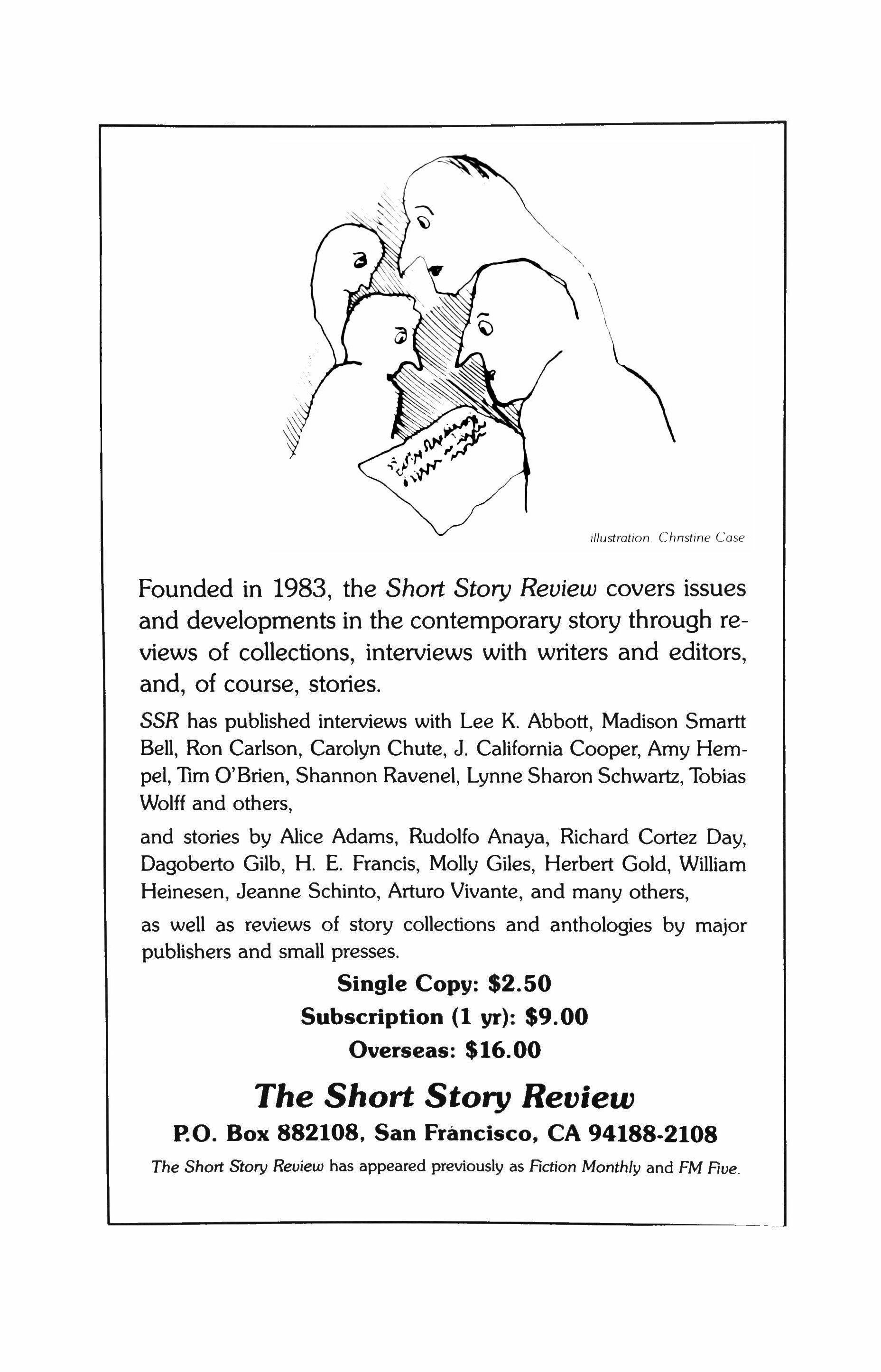
The Short Story Review has appeared previously as Fiction Monthly and FM Five.
\ \
I/lustratlon Chnstine Case
Single
Subscription
yr):
Overseas:
The
Review ao, Box 882108, San Francisco, CA 94188-2108
(1
$9.00
$16.00
Short Story
WINN� R m A 1987 Su » GRAN'I �R()M nil C()ORIlINAIIN(' COllN( II 01 LITERARY MA(,A/IN�'
"Not ,,<,sv, .u any gwen time, to reckon" count of the literary magazines that this nation has the good luck to have such " bounty n]. But It is no problem at all to get .I count of those that matter. Oh, sure, all are splendid in ·that they produce the value ofbleeding the steam of! That's swell-for one would sooner see trees cut down than hearts cut down. But every so often it is time to welcome a new litmag that seems determined to make of itselfsomething rather more than ,I mere additive, a small palliative. Such an enterprise IS Witness. So that's what these sentences of mine are-my witness for Witness."
Gordon Lish

"Witness is one of several excellent new literary and intellectualJournals of the pastfew years that confirms our sense of the variety and scope of the imagtnatiue life in the United States, Its focus upon thematic subjects is particularly valuable."
Joyce Carol Oates
Witness presents nationally known writers, as well as new talent, and highlights the role of the modern writer as witness.
Witness features Rudy Wurlitzer's screenplay Walker in the Winter 1987 issue. Plus Robert Coover, Richard Elman, Carol Ascher, Stephen Dixon, Irene Dische, Lawrence Joseph, Tomislav Longinovic, Jim Daniels, and others.
Witness will present a special Spring/Sumrner 1988 issue on The Sixties.
111111111 ': 3 J()(}O Northwc-tern High« ,II 'lUI(l' 2()U F,Irllllllg(OIl HII"- i\llchlg,11l -ISOIS
Onc vc.ir 516 (-II"U<:',) T\\,() vc.ir-. S2S (S Issue,)
�:�
Copper Canyon
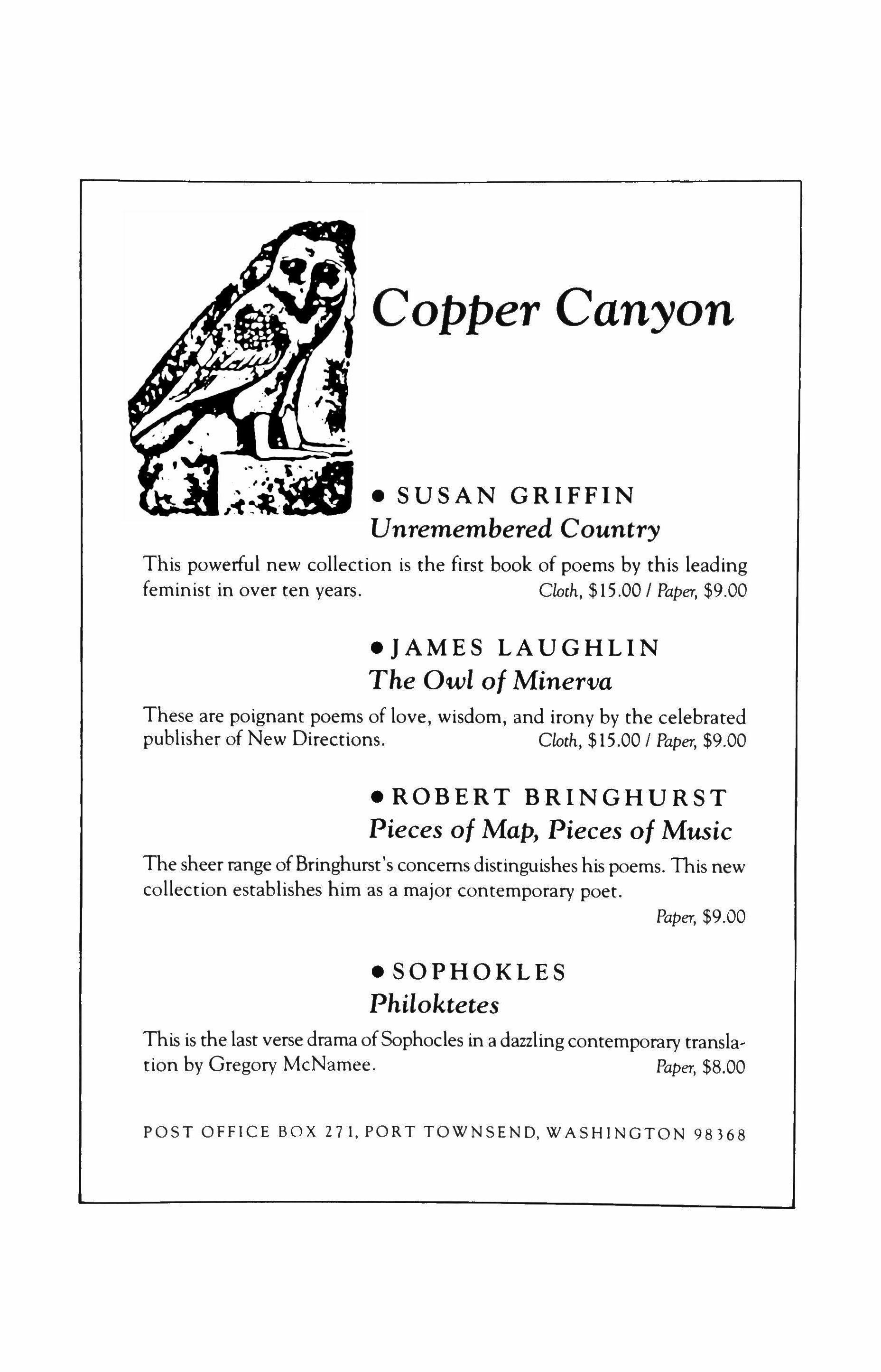
• SUSAN GRIFFIN
Unremembered Country
This powerful new collection is the first book of poems by this leading feminist in over ten years. Cloth, $15.00/ Paper, $9.00
.JAMES LAUGHLIN
The Owl of Minerva
These are poignant poems of love, wisdom, and irony by the celebrated publisher of New Directions. Cloth, $15.00/ Paper, $9.00
• ROBERT BRINGHURST
Pieces of Map, Pieces of Music
The sheer range of Bringhurst's concerns distinguishes his poems. This new collection establishes him as a major contemporary poet. Paper, $9.00
• SOPHOKLES
Philoktetes
This is the last verse drama ofSophocles in a dazzling contemporary translation by Gregory McNamee. Paper, $8.00
POST OFFICE BOX 271, PORT TOWNSEND, WASH 1 NGTON 98368
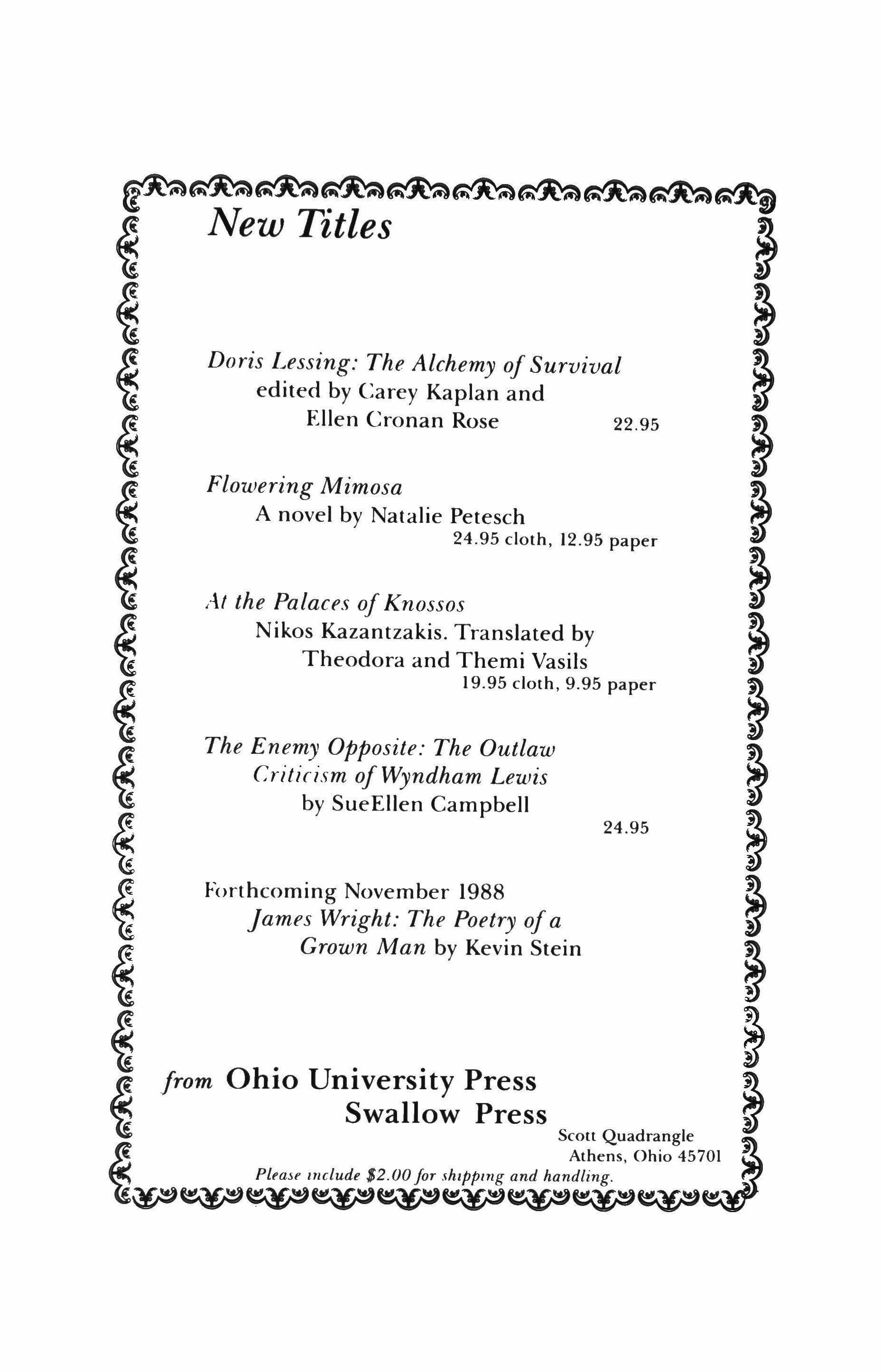
2 Doris Lessing: The Alchemy of Survival
edited by Carey Kaplan and
Ellen Cronan Rose
Flowering Mimosa
A novel by Natalie Petesch 24.95 cloth, 12.95 paper
,�I the Palaces of Knossos
Nikos Kazantzakis. Translated by
Theodora and Themi Vasils
19.95 doth, 9.95 pap«
The Enemy Opposite: The Outlaw
Criticism ofWyndham Lewis
by SueEllen Campbell
Forthcoming November 1988
James Wright: The Poetry of a
Grown Man by Kevin Stein
���������� � New
i � �
� �
'3 �
22.95 � �
�
�
� fj
� �
'3 �
� �
�
'3 f!
� � 24.95 '3 fj
� �
'3 }j
� � rf �� from Ohio University Press t Swallow Press '3 Scott Quadrangle :J }!; Athens, Ohio 45701 �������.��
Titles
The life aclrievement of "an American original"
- Libraryjournal
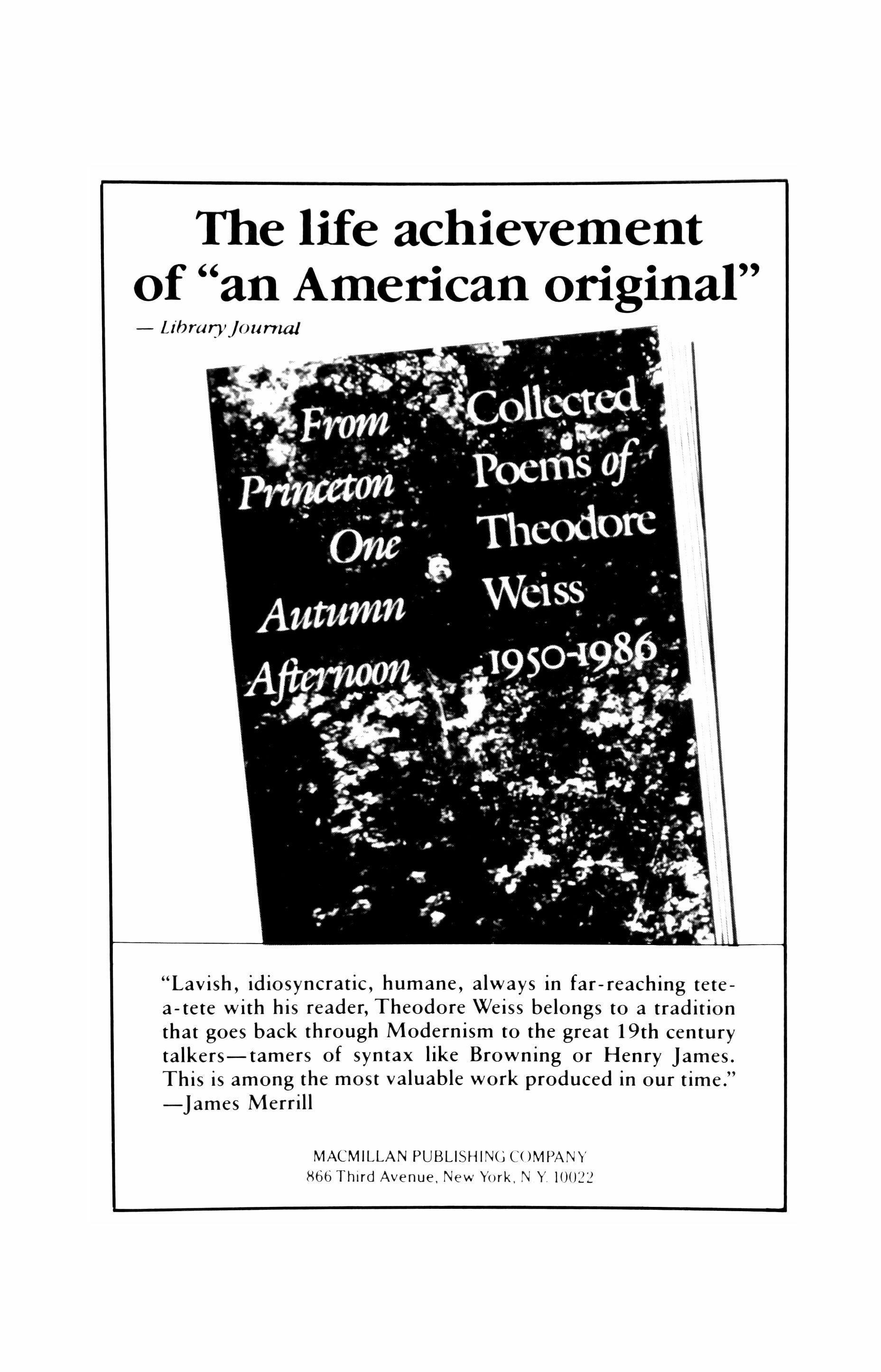
"Lavish, idiosyncratic, humane, always in far-reaching tetea-tete with his reader, Theodore Weiss belongs to a tradition that goes back through Modernism to the great 19th century talkers-tamers of syntax like Browning or Henry James. This is among the most valuable work produced in our time."
-James Merrill
MACMILLAN PUBLISHING COMPANY
H66 Third Avenue. New York. N Y 1002:'>
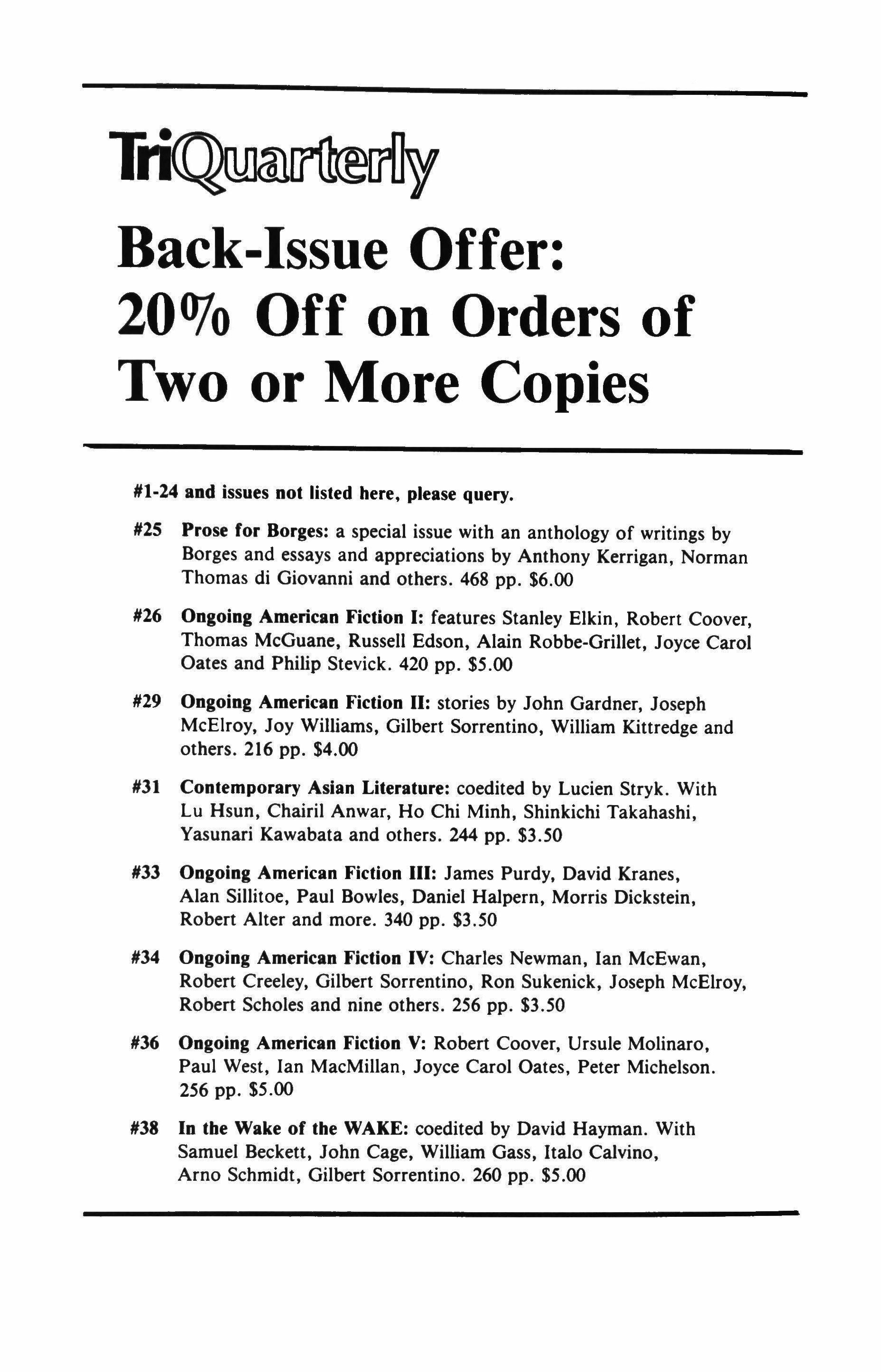
T� Back-Issue Offer:
20070 Off on Orders of
Two or More Copies
#1-24 and issues not listed here, please query.
#25 Prose for Borges: a special issue with an anthology of writings by Borges and essays and appreciations by Anthony Kerrigan, Norman Thomas di Giovanni and others. 468 pp. $6.00
#26 Ongoing American Fiction I: features Stanley Elkin, Robert Coover, Thomas McGuane, Russell Edson, Alain Robbe-Grillet, Joyce Carol Oates and Philip Stevick. 420 pp. $5.00
#29 Ongoing American Fiction II: stories by John Gardner, Joseph McElroy, Joy Williams, Gilbert Sorrentino, William Kittredge and others. 216 pp. $4.00
#31 Contemporary Asian Literature: coedited by Lucien Stryk. With Lu Hsun, Chairil Anwar, Ho Chi Minh, Shinkichi Takahashi, Yasunari Kawabata and others. 244 pp. $3.50
#33 Ongoing American Fiction III: James Purdy, David Kranes, Alan Sillitoe, Paul Bowles, Daniel Halpern, Morris Dickstein, Robert Alter and more. 340 pp. $3.50
#34 Ongoing American Fiction IV: Charles Newman, Ian McEwan, Robert Creeley, Gilbert Sorrentino, Ron Sukenick, Joseph McElroy, Robert Scholes and nine others. 256 pp. $3.50
#36 Ongoing American Fiction V: Robert Coover, Ursule Molinaro, Paul West, Ian MacMillan, Joyce Carol Oates, Peter Michelson. 256 pp. $5.00
#38 In tbe Wake of tbe WAKE: coedited by David Hayman. With Samuel Beckett, John Cage, William Gass, Italo Calvino, Arno Schmidt, Gilbert Sorrentino. 260 pp. $5.00
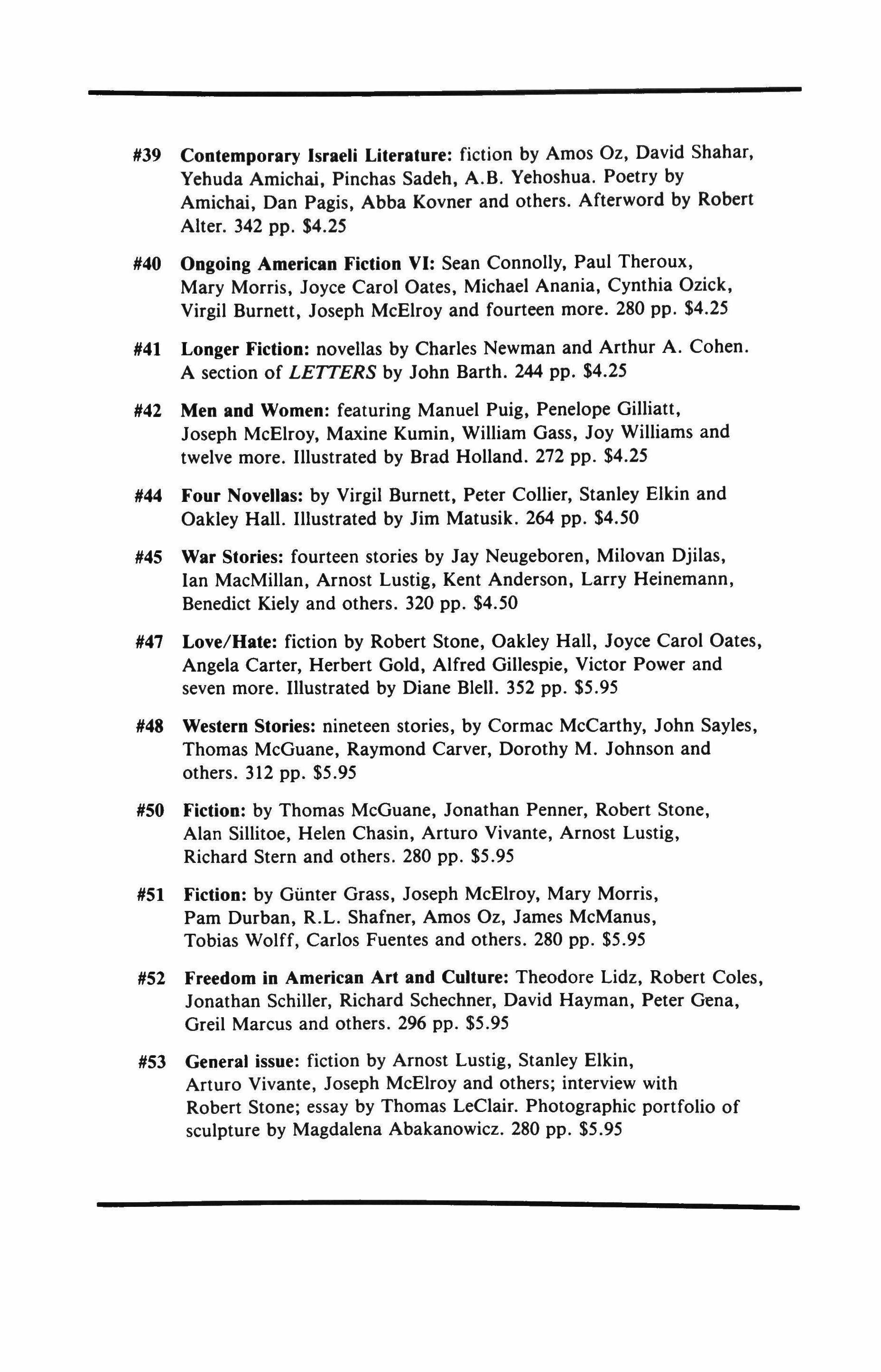
1139 Contemporary Israeli Literature: fiction by Amos Oz, David Shahar, Yehuda Amichai, Pinchas Sadeh, A.B. Yehoshua. Poetry by Amichai, Dan Pagis, Abba Kovner and others. Afterword by Robert Alter. 342 pp. $4.25
1140 Ongoing American Fiction VI: Sean Connolly, Paul Theroux, Mary Morris, Joyce Carol Oates, Michael Anania, Cynthia Ozick, Virgil Burnett, Joseph McElroy and fourteen more. 280 pp. $4.25
1141 Longer Fiction: novellas by Charles Newman and Arthur A. Cohen. A section of LEITERS by John Barth. 244 pp. $4.25
1142 Men and Women: featuring Manuel Puig, Penelope Gilliatt, Joseph McElroy, Maxine Kumin, William Gass, Joy Williams and twelve more. Illustrated by Brad Holland. 272 pp. $4.25
1144 Four Novellas: by Virgil Burnett, Peter Collier, Stanley Elkin and Oakley Hall. Illustrated by Jim Matusik. 264 pp. $4.50
1145 War Stories: fourteen stories by Jay Neugeboren, Milovan Djilas, Ian MacMillan, Arnost Lustig, Kent Anderson, Larry Heinemann, Benedict Kiely and others. 320 pp. $4.50
1147 Love/Hate: fiction by Robert Stone, Oakley Hall, Joyce Carol Oates, Angela Carter, Herbert Gold, Alfred Gillespie, Victor Power and seven more. Illustrated by Diane BleIl. 352 pp. $5.95
1148 Western Stories: nineteen stories, by Cormac McCarthy, John Sayles, Thomas McGuane, Raymond Carver, Dorothy M. Johnson and others. 312 pp. $5.95
1150 Fiction: by Thomas McGuane, Jonathan Penner, Robert Stone, Alan Sillitoe, Helen Chasin, Arturo Vivante, Arnost Lustig, Richard Stern and others. 280 pp. $5.95
1151 Fiction: by Gunter Grass, Joseph McElroy, Mary Morris, Pam Durban, R.L. Shafner, Amos Oz, James McManus, Tobias Wolff, Carlos Fuentes and others. 280 pp. $5.95
1152 Freedom in American Art and Culture: Theodore Lidz, Robert Coles, Jonathan Schiller, Richard Schechner, David Hayman, Peter Gena, Greil Marcus and others. 296 pp. $5.95
1153 General issue: fiction by Arnost Lustig, Stanley Elkin, Arturo Vivante, Joseph McElroy and others; interview with Robert Stone; essay by Thomas LeClair. Photographic portfolio of sculpture by Magdalena Abakanowicz. 280 pp. $5.95

#54 A John Cage Reader: color etchings by Cage plus contributions celebrating his seventieth birthday from Marjorie Perloff, William Brooks, Merce Cunningham and others; fiction by Ray Reno, Arturo Vivante and others; poetry by Teresa Cader, Jay Wright and Michael Collier. 304 pp. $5.95
#55 General issue: fiction by Paul West, Willis Johnson, David Plante and others; poetry by Pamela White Hadas, Roland Flint, Theodore Weiss and others; nonfiction by Janet Lewis, Phyllis Rose and Michael S. Harper; photographs by Steven D. Foster. 240 pp. $5.95
#56 General issue: New work by and an interview with William Goyen plus fiction by Frederick Busch, Amy Hempel, Stephen Dixon, Andrew Fetler and others; poetry by Marvin Bell, Joyce Carol Oates, W.S. Di Piero, Lucien Stryk and others. A selection of The Small Press Book Club. 288 pp. $5.95
#57 A special two-volume set- Vol. 1, A Window on Poland: featuring essays, fiction and poems written during Solidarity and martial law. Konwicki, Brandys and others, with twenty-two photos and graphic works. 128 pp. Vol 2, Prose from Spain, featuring recent fiction and essays, plus an interview with Juan Goytisolo and eight color pages of street murals. 112 pp. $3.95/each vol., $7.90/set
#58 General issue: stories by Fred Chappell, Janet Kauffman and others; poetry by George Starbuck, C.K. Williams, Dave Smith and others; essays by William Goyen and Alan Shapiro; illustrations by Stan Washburn and Matthew Owens. 224 pp. $6.95
#59 Tbe American Blues: sold out.
#60 Cbicago: interviews with Saul Bellow and Norman Maclean; fiction by Lorraine Hansberry, Harry Mark Petrakis, Richard Stern and others; memoirs by Karl Shapiro and Gwendolyn Brooks; poetry by Paul Carroll, Lisel Mueller and others; photographs by Stephen Deutch, Arthur Shay and others. 444 pp. $10.95
#61 General issue: sold out.
#62 General issue: sold out.
#63 TQ 20: twentieth-anniversary issue, with fiction by James T. Farrell, Richard Brautigan, Stanley Elkin, Jorge Luis Borges, Joyce Carol Oates, Vladimir Nabokov, Cynthia Ozick, Raymond Carver, William Goyen, Lorraine Hansberry and others; poetry by Anne Sexton, Howard Nemerov, W. S. Merwin, Jack Kerouac, Marvin Bell and others; interview with Saul Bellow; illustrations and photographs. 684 pp. $12.95
#64 General issue: sold out.
#65 The Writer in Our World: symposium featuring Stanislaw Baranczak, Terrence Des Pres, Gloria Emerson, Leslie Epstein, Carolyn Forche, Michael S. Harper, Ward Just, Grace Paley, Mary Lee Settle, Robert Stone, Derek Walcott and C. K. Williams, with original work by most participants and by symposium moderators Angela Jackson and Bruce Weigl; photographs. 332 pp. $8.95

For orders of two or more books, deduct 201170 from total price. We pay postage on orders of three or more copies. (For orders of one or two books please add $1.00 for postage and handling.)
Note: While supplies last, an index to issues 1-50 is available on request, free of charge, with any order.
TriQuarterly, Northwestern University 2020 Ridge Ave., Evanston, IL 60208
Please send me the following back issues of 1iiQuarterly:
I enclose $,
Signature: Expires:
Name Address City State, Zip
2PLUS 2
A Collection of International Writing
Contributors to 2PLUS2 include:
Manlio Argueta
Kenneth Bernard
Robert Bly
.Jorge Luis Borges
1>aul Bowles
Victor Brornbert
Paul Celan
E.M. Cioran
Amy Clampitt
Stephen Dixon
Sergei Dovlatov
Richard Exner
Ellen Gilchrist
Paavo Haavikko

Michael Hamburger
John Hollander
Miroslav Holub
Friedericke Mayrocker
J.D. McClatchy
'tugenio Montale
Adolf M uschg
Robert Pinget
Joyce Carol Oates
'brenda Marie Osbey
Alberto Rios
laroslav Seifert
'tva Strom
Tomas Transtromer
"One of the most beautiful collections of poetry, fiction, interviews, drama and essays we've seen.
Wnler's Digest
MYLABRIS PRESS LTD.
p. O. Box 207'25
New York, N. Y. 10025
U.S.A.
Case postale 35 1000 Lausanne 25 Switzerland
Podry by
Joseph P. Balaz
Joseph Chadwick
Peter Desy
Richard Morris Dey
David Graham
Richard Hamasaki
Norman Hindley
Roberto Juarroz
Kauraka Kauraka
Arthur Kimball
Ted Lardner
Lyn Lifshin
Jose Lezama Lima
WingTek Lum
Michael McPherson
W. S. Merwin
Kathleen Neuer
Ed Parris
Louis Phillips
Kathryn Takara
Haunani-Kay Trask
Jill Widner
HAWAII REVIEW
c/o Department 01 English 1733 Donaghho Road University 01 Hawaii Honolulu. Hawaii 96822
Volume Six: S15.95 plua S2.50 shipping and handling.
Back Issues: Nos. 1,2,3: s 6.95 Nos. 4,5: $11.75 Plua S 2.50 postage p�r book.
Fiction by
Nora Cobb
Jonathan Hall
Gary Kissick
Ian MacMillan
Gladys Pruitt
David Stroup
Jill Widner
Art by
Santos Barbosa
David Sheskin
-
'11···i =.: :$ §i ,.,,',.:.".,•....•................ :.: ',.:,lS'......•.. ,,:,. $':.: ::::::3". �r:) '. �r <�<.. :,
l!kif-w 20 features
ft4"�
One-Year Subscription, $6.00; single copies, $4.00
welcome; please accompany them with a sell-addressed. stamped envelope.
Manuscripts
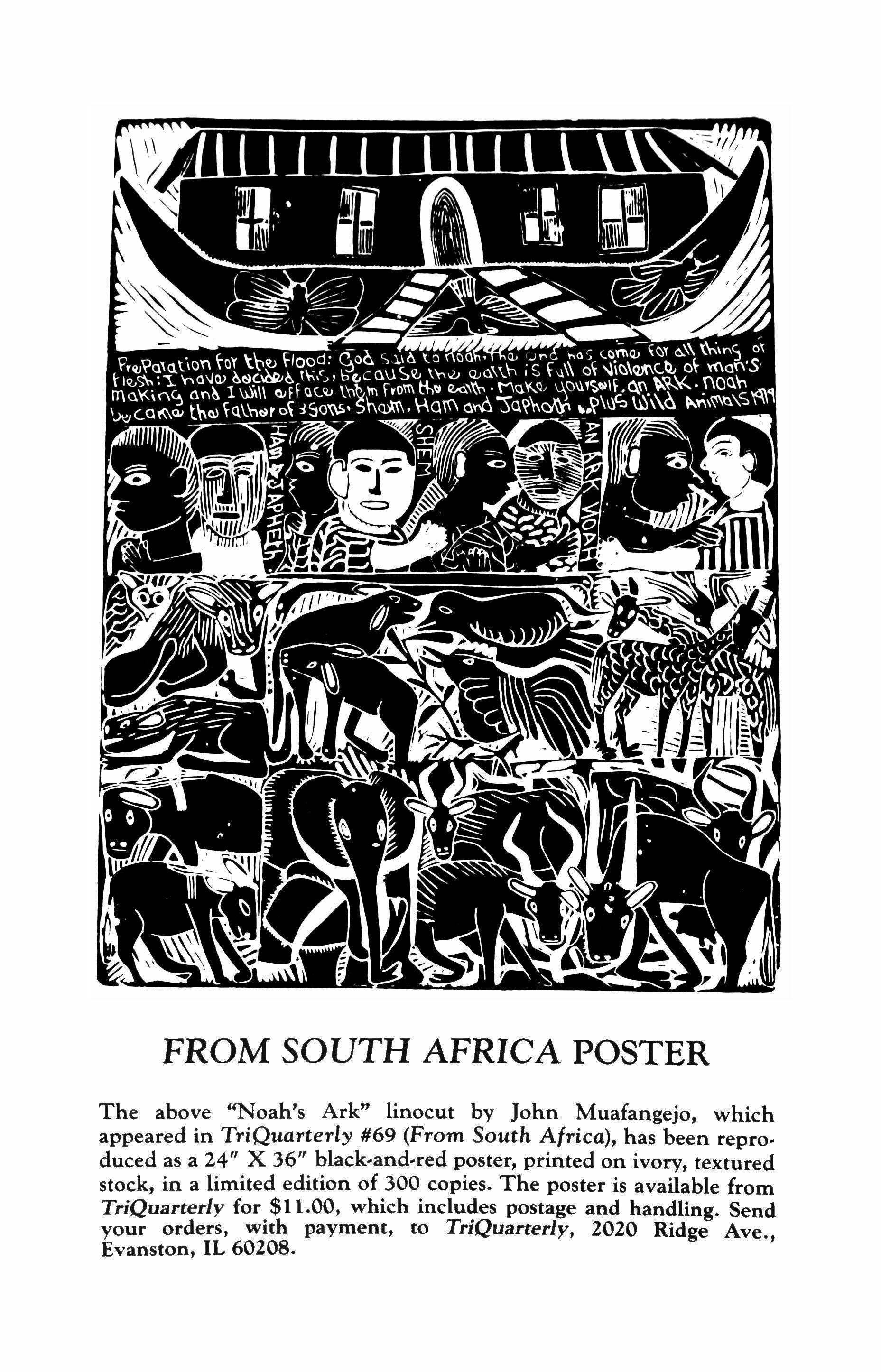
FROM SOUTH AFRICA POSTER
The above "Noah's Ark" linocut by John Muafangejo, which appeared in TriQuarterly #69 (From South Africa), has been reproduced as a 24" X 36" black-and-red poster, printed on ivory, textured stock, in a limited edition of 300 copies. The poster is available from TriQuarterly for $11.00, which includes postage and handling. Send your orders, with payment, to TriQuarterly, 2020 Ridge Ave., Evanston, IL 60208.
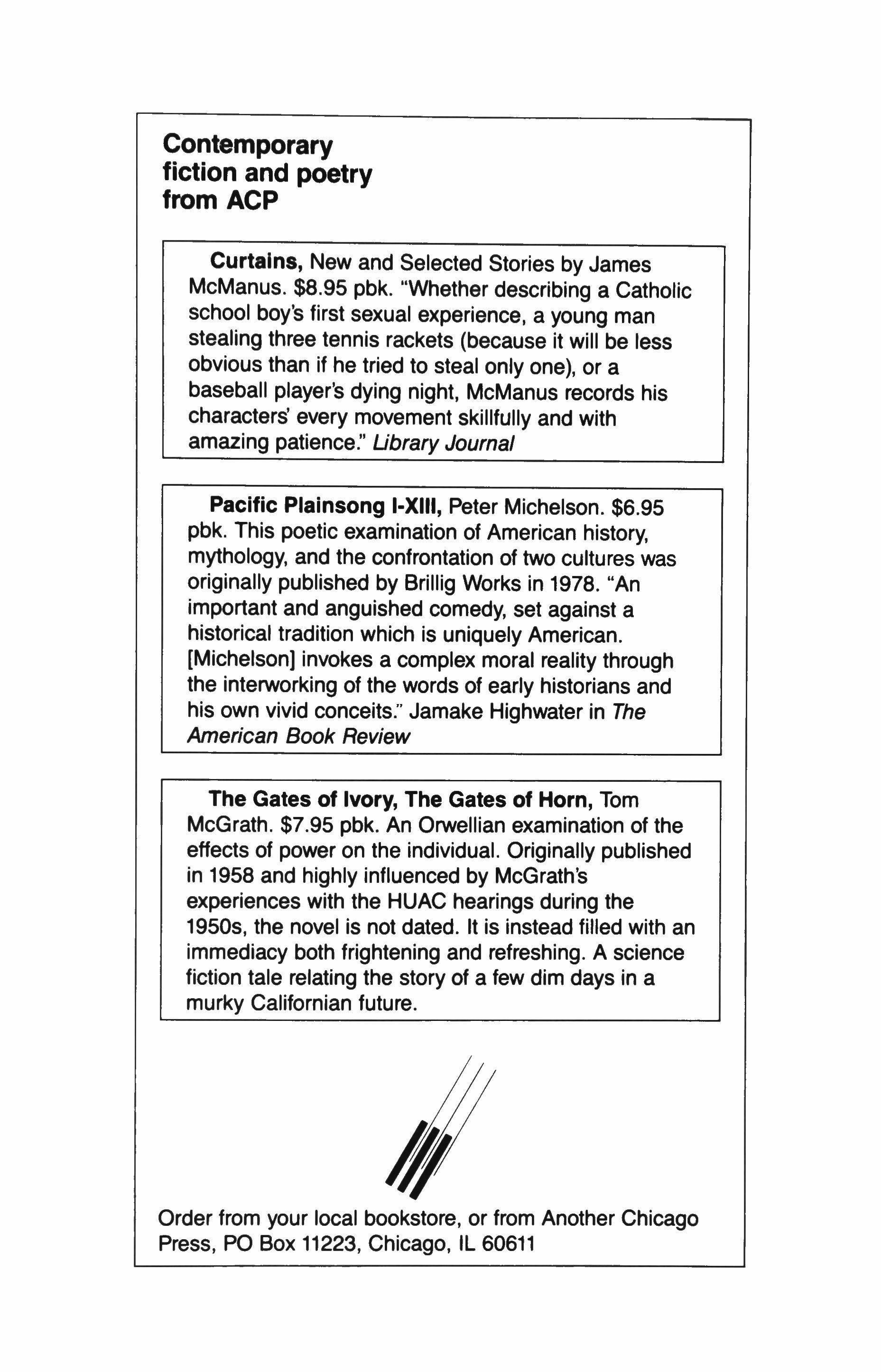
Contemporary
fiction and poetry from ACP
Curtains, New and Selected Stories by James McManus. $8.95 pbk. "Whether describing a Catholic school boy's first sexual experience, a young man stealing three tennis rackets (because it will be less obvious than if he tried to steal only one), or a baseball player's dying night, McManus records his characters' every movement skillfully and with amazing patience:' Ubrary Journal
Pacific Plainsong I-XIII, Peter Michelson. $6.95 pbk. This poetic examination of American history, mythology, and the confrontation of two cultures was originally published by Brillig Works in 1978. "An important and anguished comedy, set against a historical tradition which is uniquely American. [Michelson] invokes a complex moral reality through the interworking of the words of early historians and his own vivid conceits." Jamake Highwater in The American Book Review
The Gates of Ivory, The Gates of Horn, Tom McGrath. $7.95 pbk. An Orwellian examination of the effects of power on the individual. Originally published in 1958 and highly influenced by McGrath's experiences with the HUAC hearings during the 1950s, the novel is not dated. It is instead filled with an immediacy both frightening and refreshing. A science fiction tale relating the story of a few dim days in a murky Californian future.
IOrder from your local bookstore, or from Another Chicago Press, PO Box 11223, Chicago, IL 60611

Subscribe To A Scholarly Journal on Black Women Mrica and the Diaspora Announcing Vol. 3 Number 2 Make checks payable to: SWEP, Inc.lSAGE P.O. Box 42741 Atlanta, Georgia 30311-0741 $lS.00/year individuals $2S.00/institutions
Fiction • Poetry Art • Criticism
Three times a year
The New York Times has called TriQuarterly "perhaps the preeminent journal for literary fiction" in the nation. Chicago magazine describes it as "one of the best, issue after issue." But see for yourself-subscribe now
Recent and forthcoming contributors:
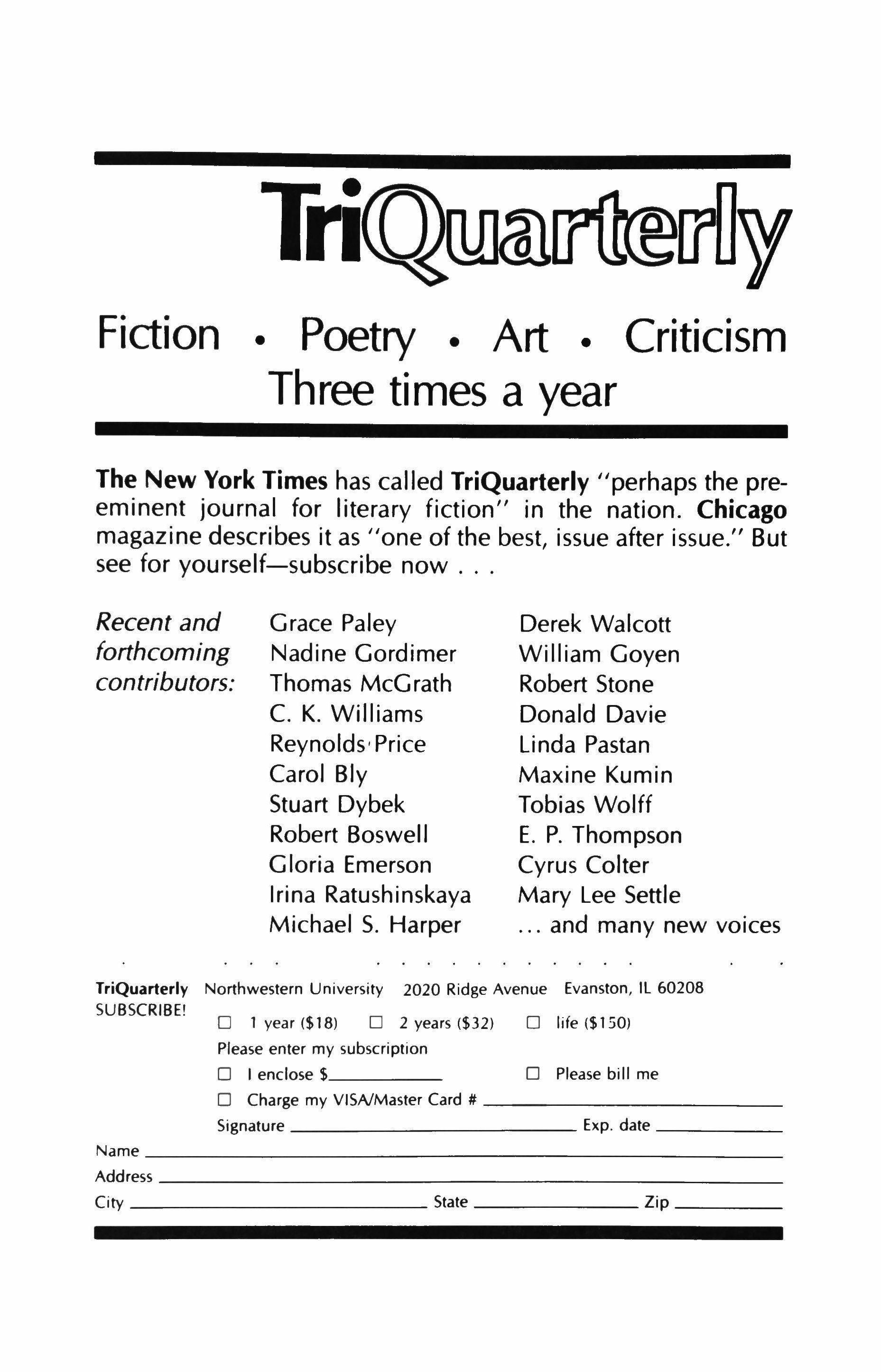
Grace Paley
Nadine Gordimer
Thomas McGrath
C. K. Williams
Reynolds' Price
Carol Bly
Stuart Dybek
Robert Boswell
Gloria Emerson
Irina Ratushinskaya
Michael S. Harper
Derek Walcott
William Goyen
Robert Stone
Donald Davie
Linda Pastan
Maxine Kumin
Tobias Wolff
E. P. Thompson
Cyrus Colter
Mary Lee Settle and many new voices
TriQuarterly Northwestern University 2020 Ridge Avenue Evanston, IL 60208 SUBSCRIBE!
1 year ($18) 0 2 years ($32) 0 life ($150) Please enter my subscription o I enclose $ o Charge my VISNMaster Card #
Signature Exp. date o Please bill me
Name Address City State Zip
o


TriQuarterly thanks the following individual donors and life subscribers:
Mr. and Mn. Solway F. Firestone
Fred S. Novy
Mrs. Larry Shindelman
David C. Abercrombie
Amin Alimard
Lou Ames
Sandy Anderson
Richard H. Anderson
University of Arizona Poetry Center
Gayle Arnzen
Asa Baber
TomG. Bell
Carol Bly
Kay Bonetti
Robert Boruch
Van K. Brock
Gwendolyn Brooks
Timothy Browne
Paul Bundy
Eric O. Cahn
David Cauak
Stephen Chapman
Anthony Chase
Michael Chwe
Andrew Cvr
Kenneth Day
Mark W. DeBtee
Mr. and Mrs. Lorentz de Haas
Alan Distler
Ansti Drake
John B. Elliott
Christopher English
Carol Erickson
Steven Finch
David R. Fine
Paul Fjelstad
Torrence Fossland
Helen and C. Dwight Foster
Mrs. Angela M. Gannon
Kathy M. Gamess
Lawrence J. Gorman
Maxine Groffsky
Rev. Dr. Elliott Hagle
Jack Hagstrom
Ross B. Heath
Charles Hedde
Donald Hey
Donald A. Hillel
Craig V. Hodson
Irwin L. Hoffman
Irwin T. Holtzman
P. Hosier
Charles Huss
Curtis Imrie
Helen Jacob
Del Ivan Janik
Dr. Alfred D. Klinger
Loy E. Knapp
Sydney Knowlton
Mr. and Mrs. Carl A. Kroch
Judv Kunz
Conrad A. Langenberg

Isaac Lassiter
Dorothy Latiak
Patricia W. Linton
Philip Lister
Prof. Kubet Luchterhand
Richard Marmulsrein
James Marquardt
Kevin McCanna
Robert D. McChesney
Charles Gene McDaniel
Robert McMilla
George Meredith
Lois Adele Meyer
C. R. Michel
University of Michigan Hopwood Room
Ralph Miller
Kenneth Monroe
James E. Morrison IV
Max Nathan
Dean Neprud
Catherine Ohs
Paul Peters and Rosemarie Kozdron
Scott Peters
Evelyn Pine
Doyle Pitman
Barbara Polikoff
Alex T. Primm
Richard Prinz, M.D.
Honora Rankine-Galloway
J. M. Reese
Susan Reiners
Don Reynolds
Christopher Richter
Diane Rider
Rivier College
Sam Rosenthal
David Roth, M.D.
Jim Rowe
Patricia Ruby
Joan Rybka
Joel SchiUing
Mrs. H. C. Schmidt
Robert 1. Schneideman
Koji Seki
David A. Selby
Herbert Shore
John Silbersack
Martin Silverman
Dr. Wanda Sorgente
Laurel Speer
Jane M. Starkey
Michael O. Stearns
Ken Stevens
Lawrence D. Stewart
Mr. and Mrs. W. H. Sullivan
Minamilene Treger
University Club of San Francisco
William E. Waechter
Daniel Wegner
Anne R. Whipple
Scott R. White
Eric Wilson
Zeljko Zic
Anthony S. Zummer
Lif� subscriptions are �vailable at the rate of $150 each for individuals and $300 each for institutions, from TrtQuarlerly, 2020 Rldge Ave., Evanston, II. 60208.
















































































































































 Translated by C. K. Williams and Renata Gorcyznski
Translated by C. K. Williams and Renata Gorcyznski



 Translated by the author and Reginald Gibbons
Translated by the author and Reginald Gibbons











 Translated by Stanislaw Baranczak and Clare Cavanagh
Translated by Stanislaw Baranczak and Clare Cavanagh
































































































